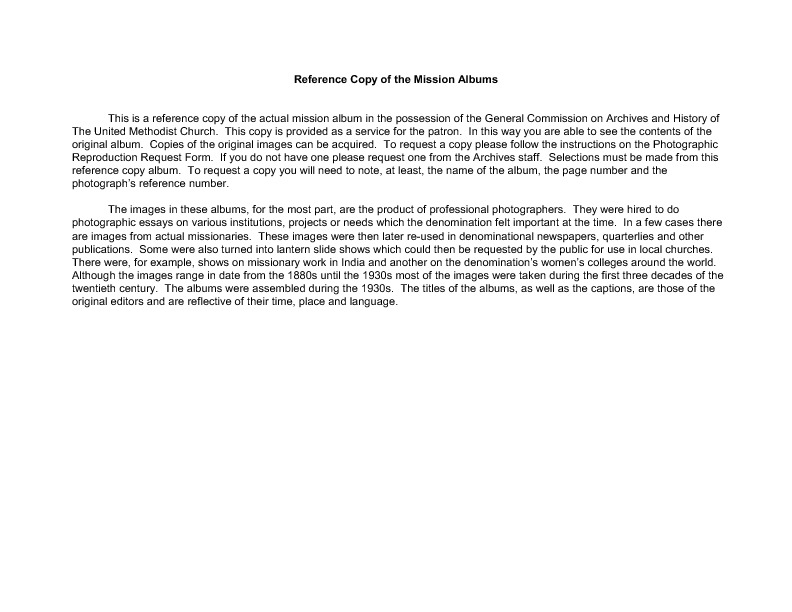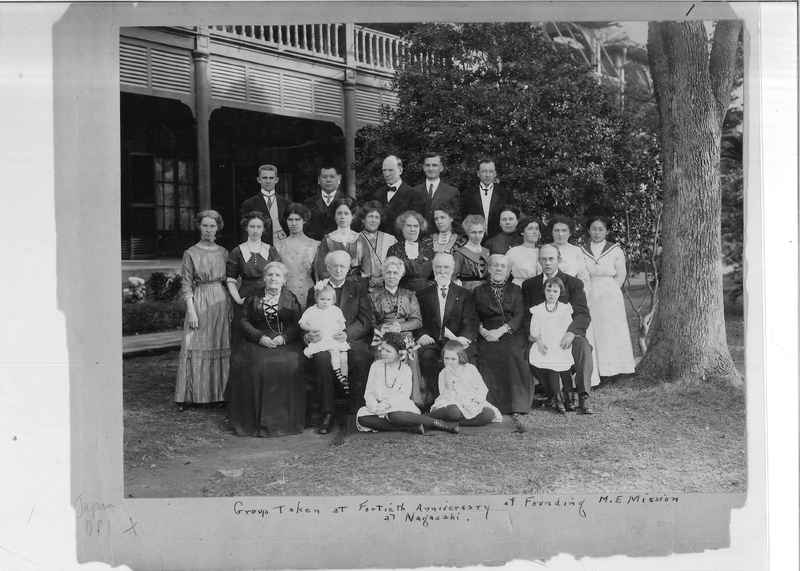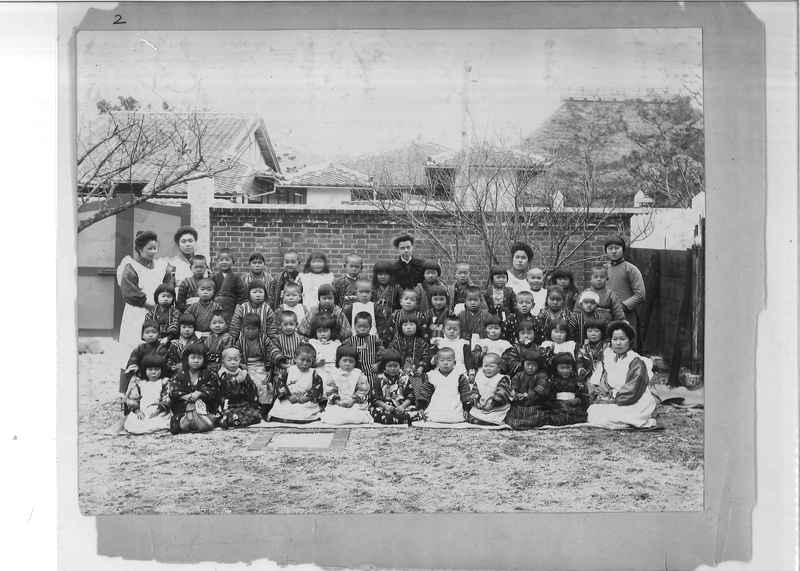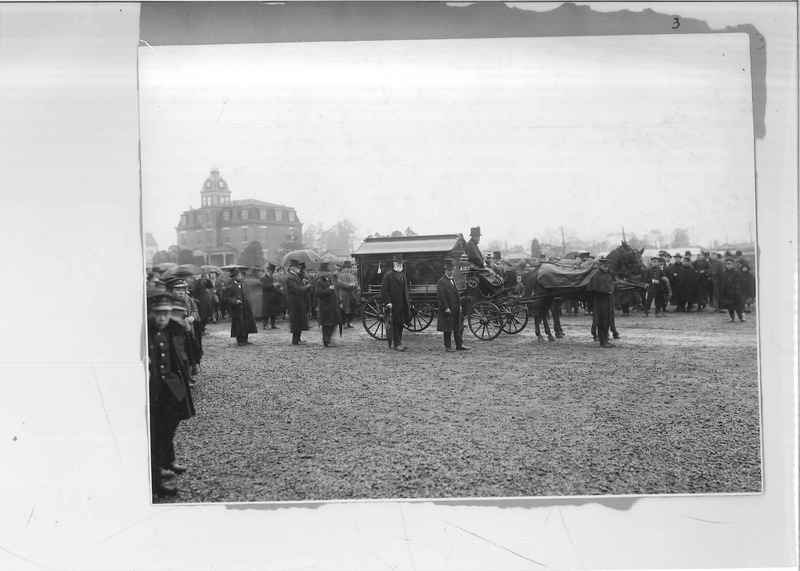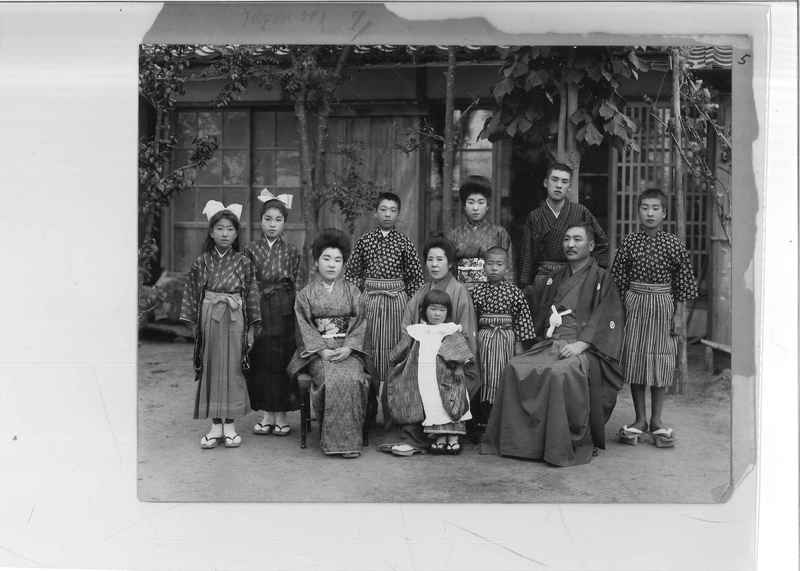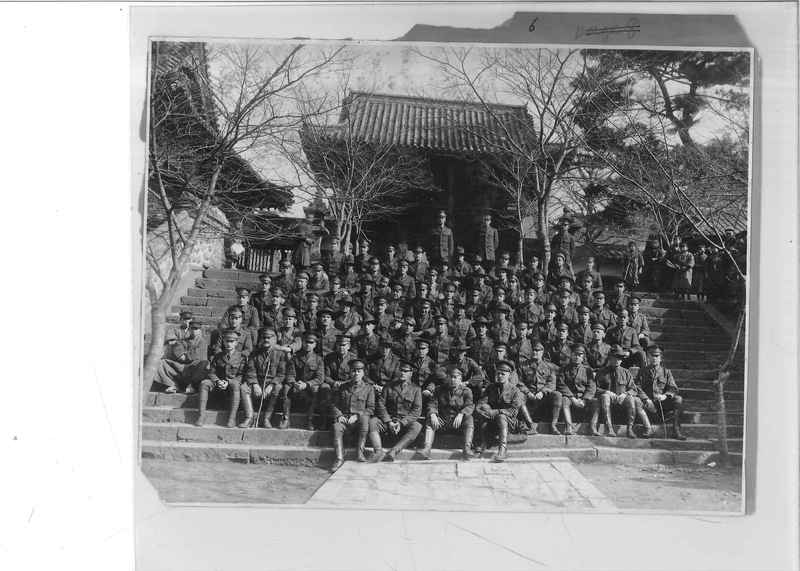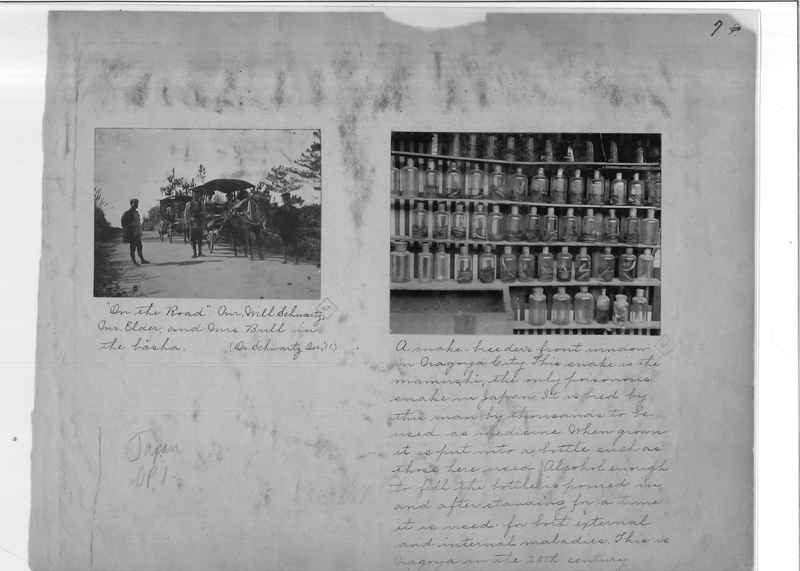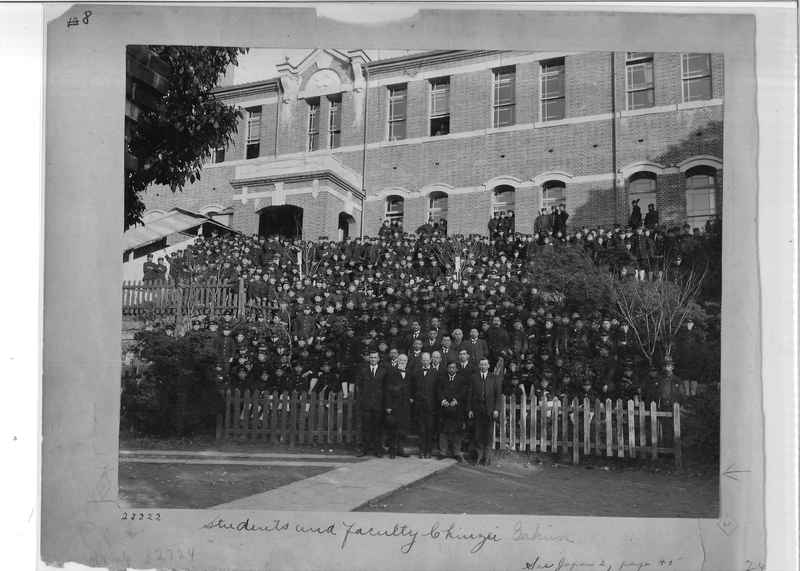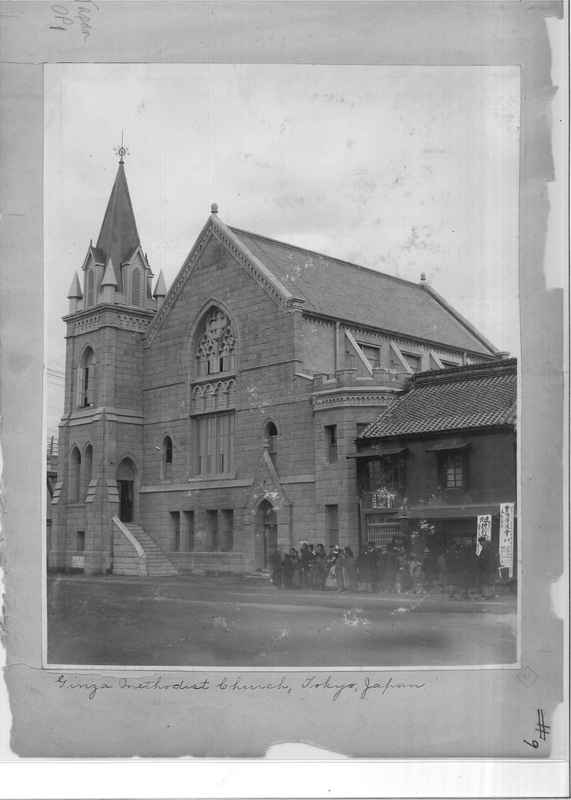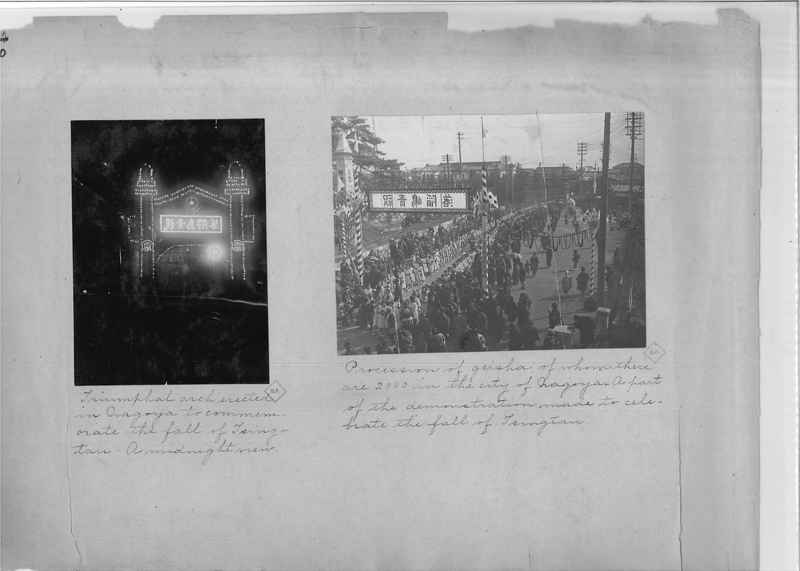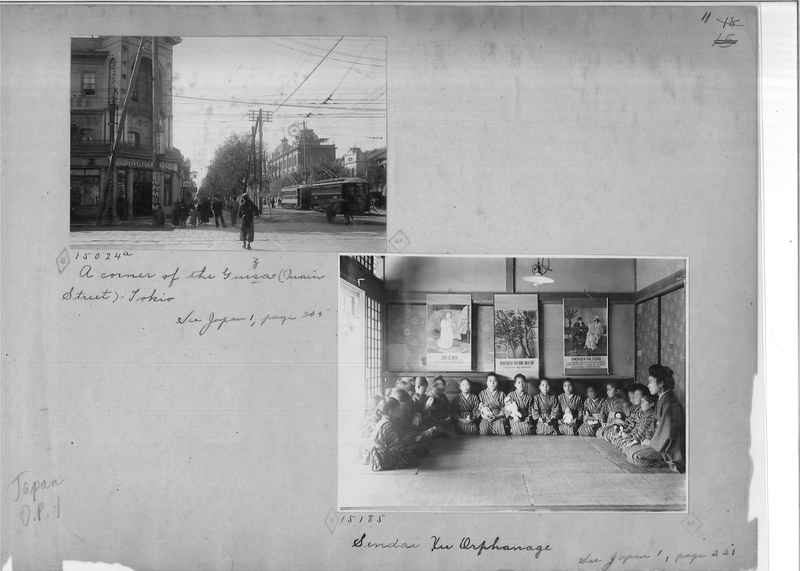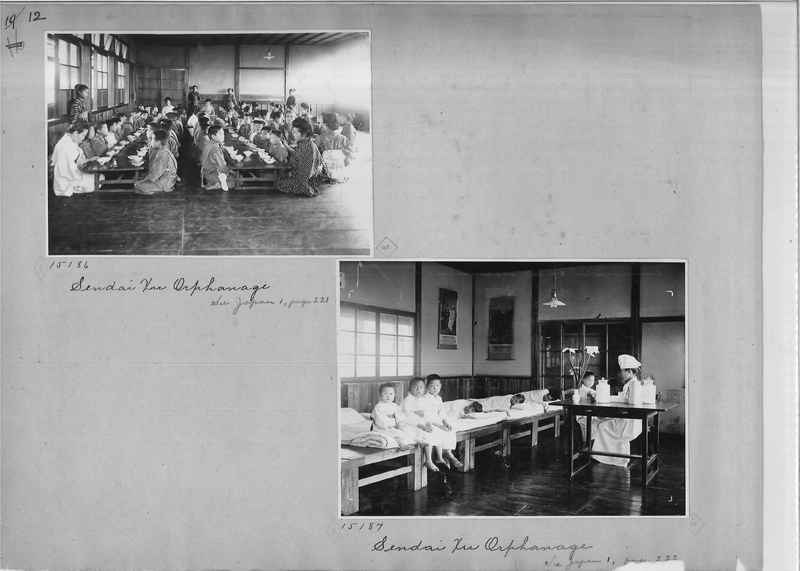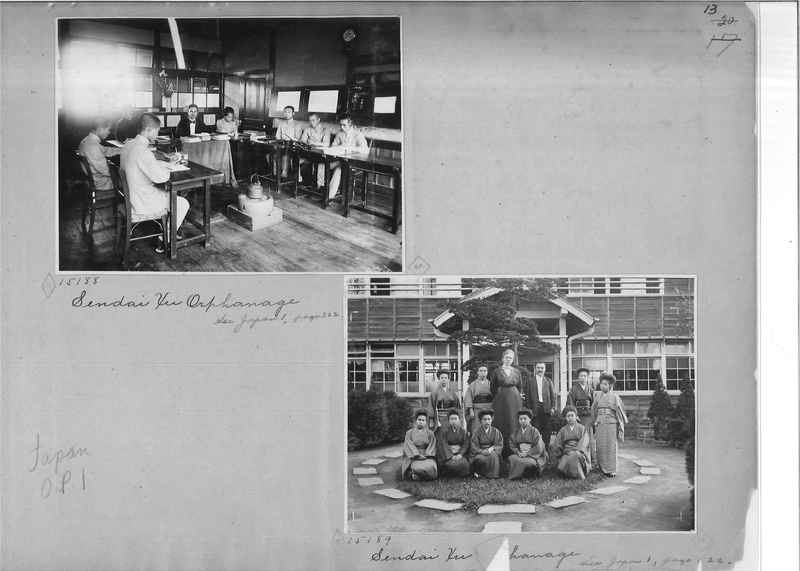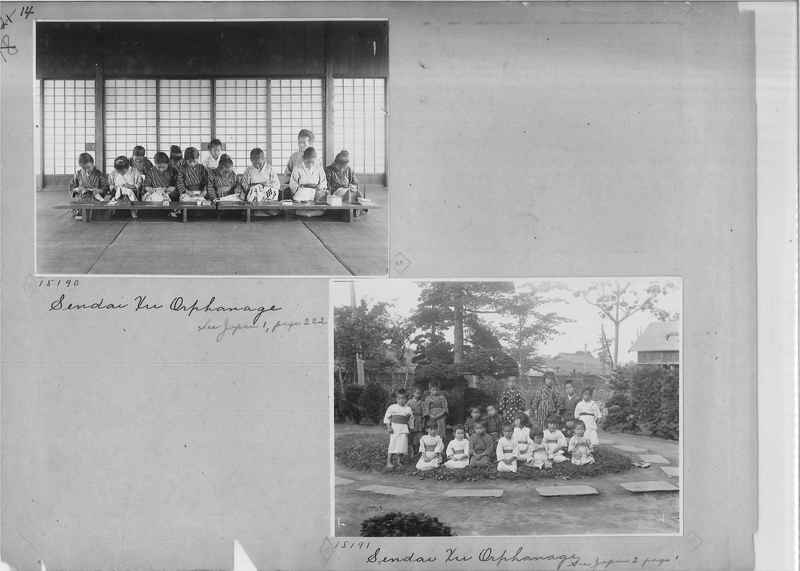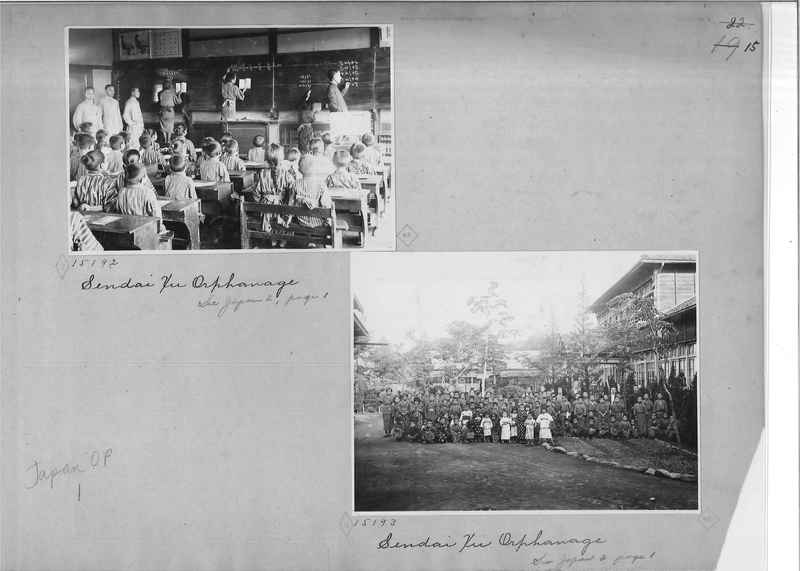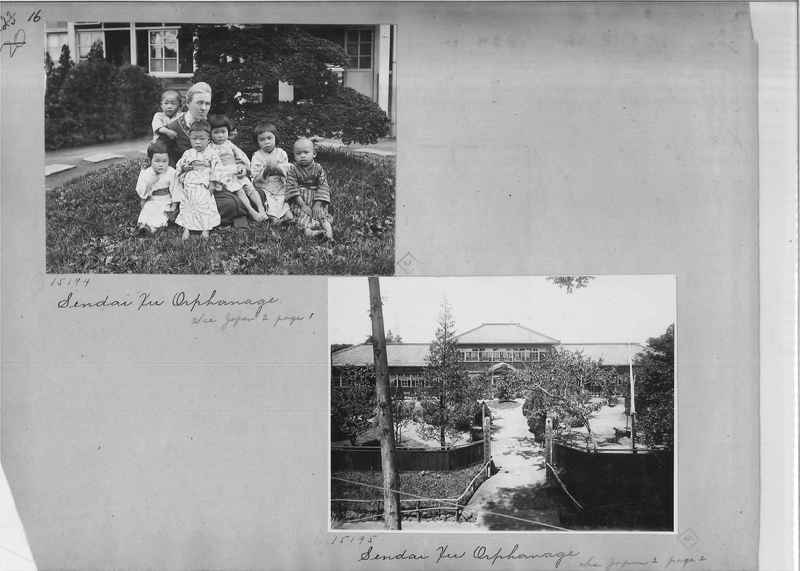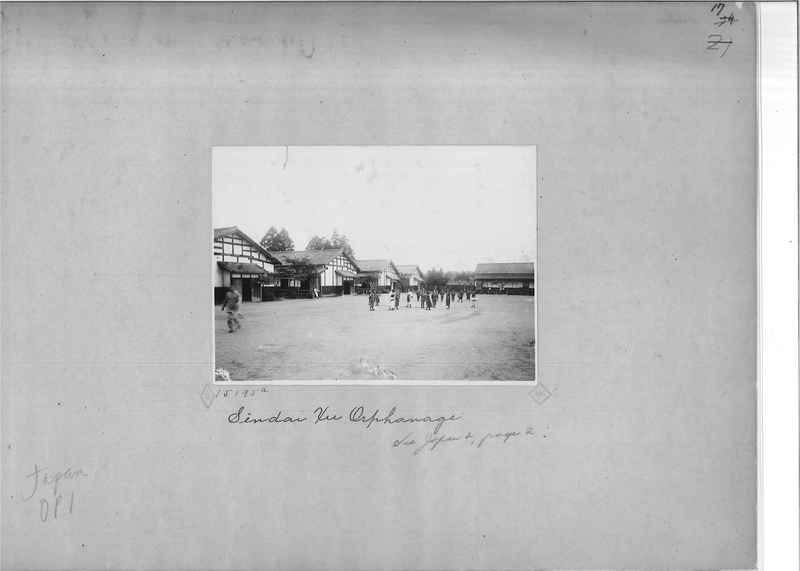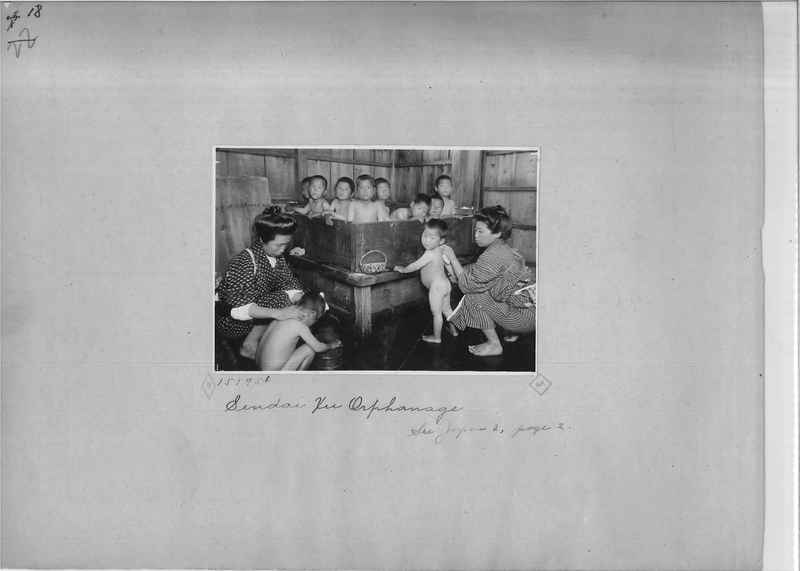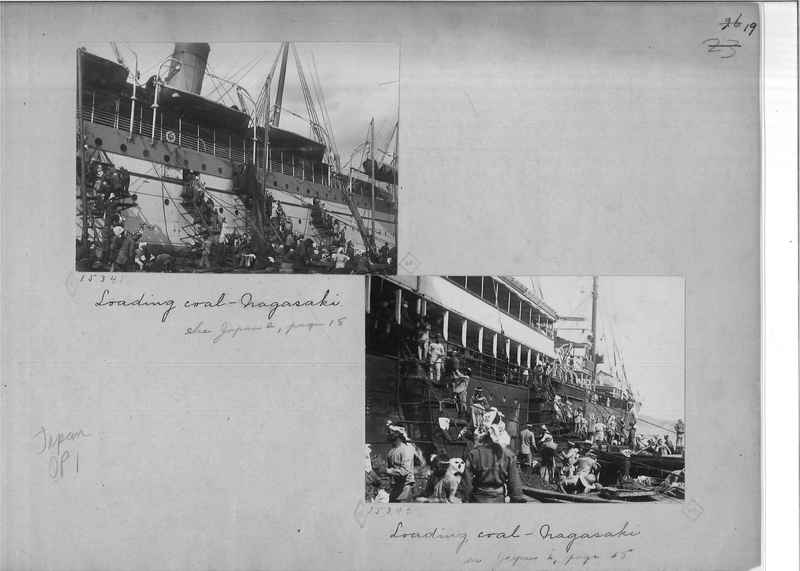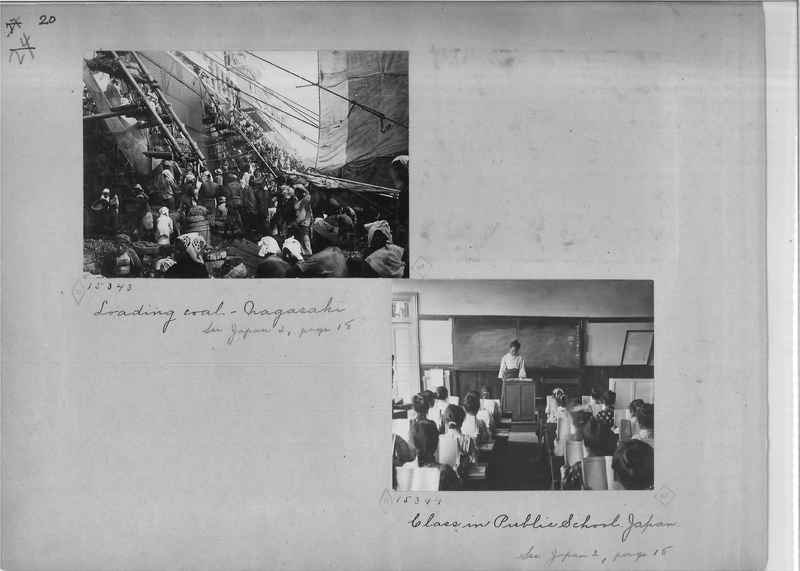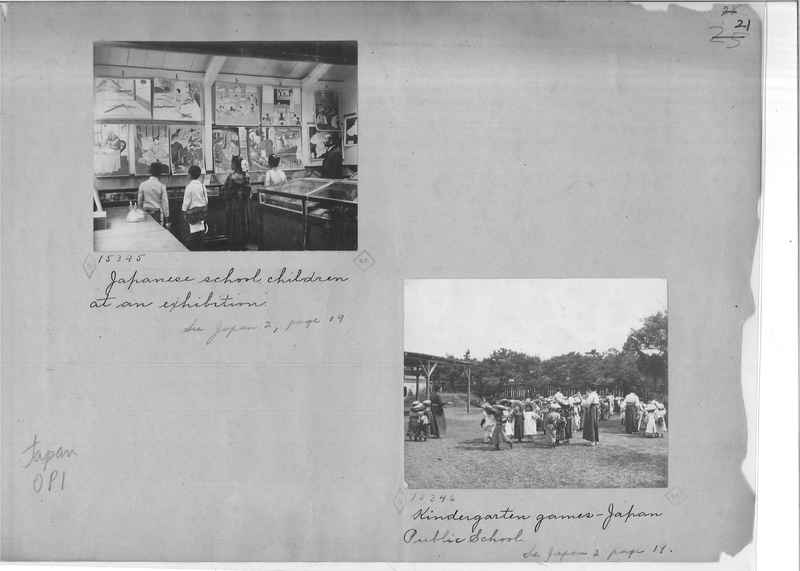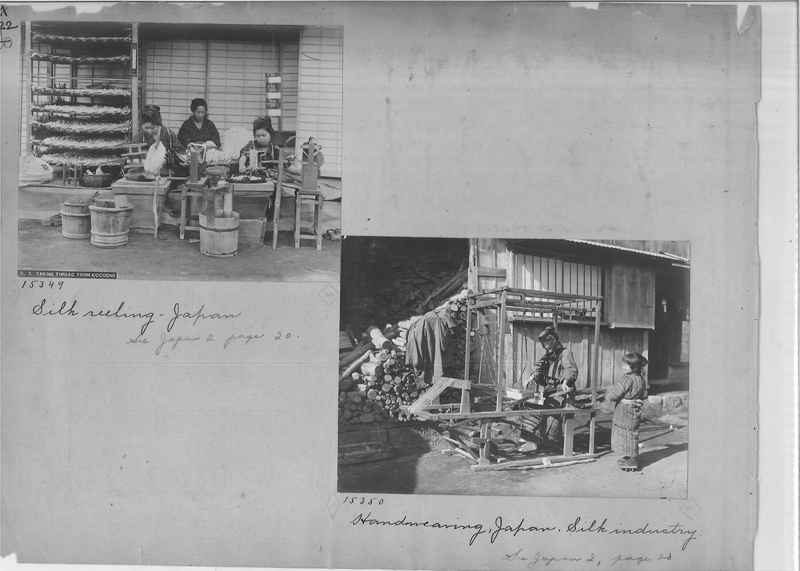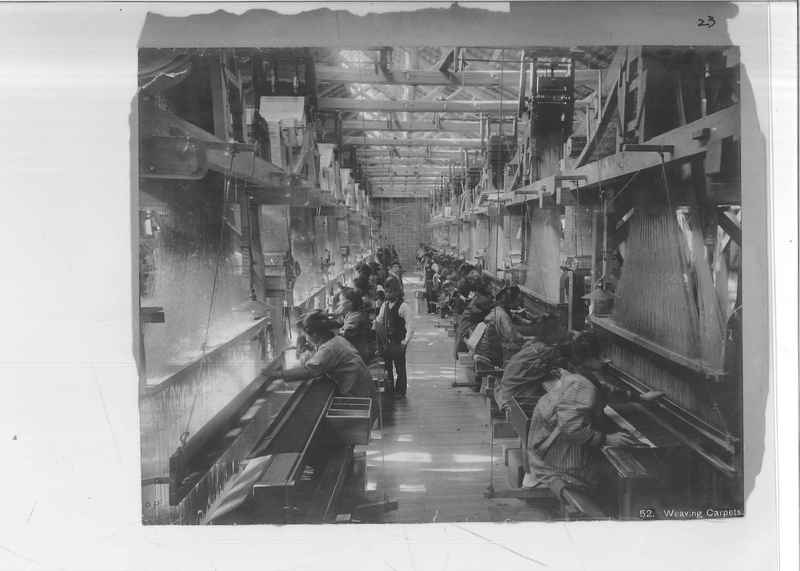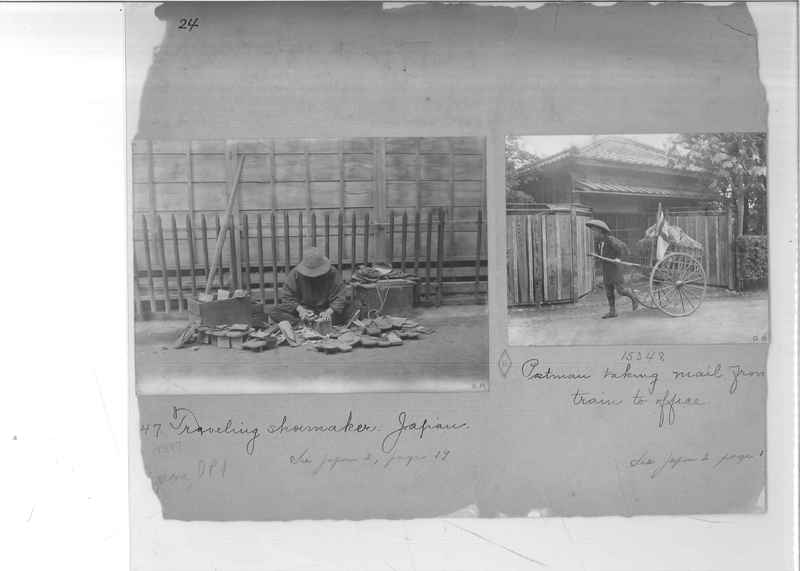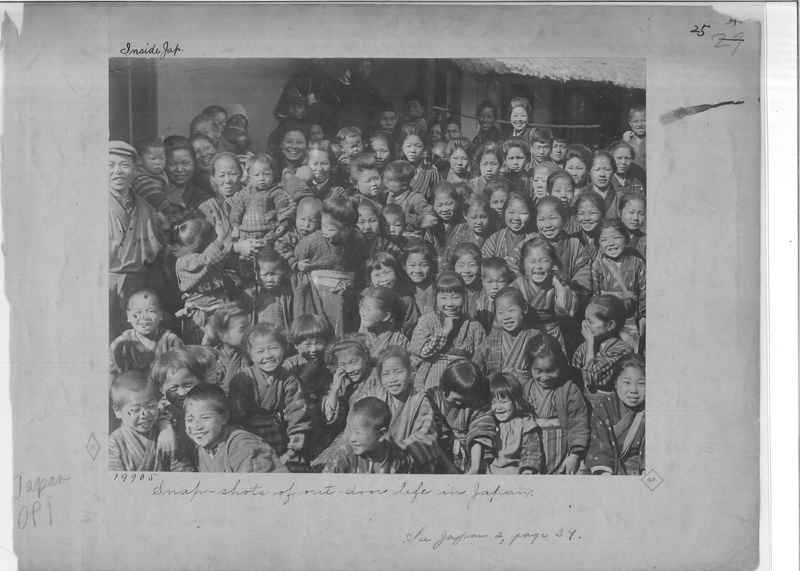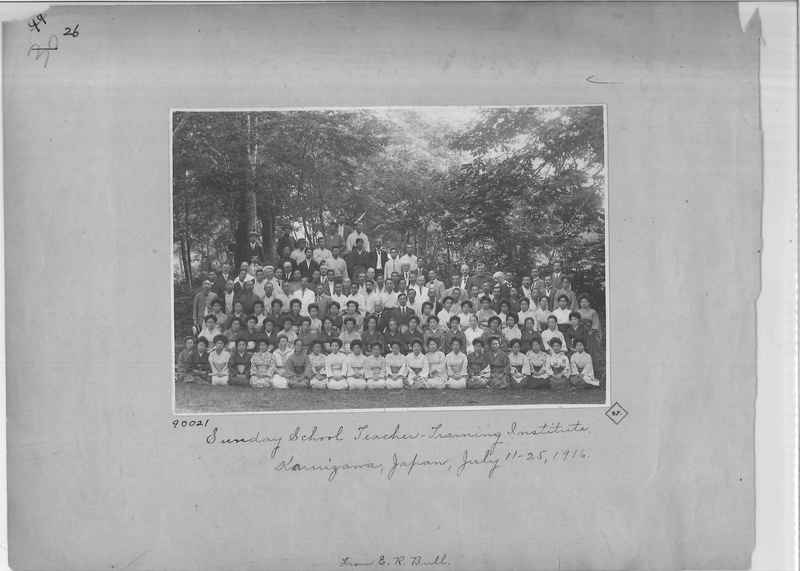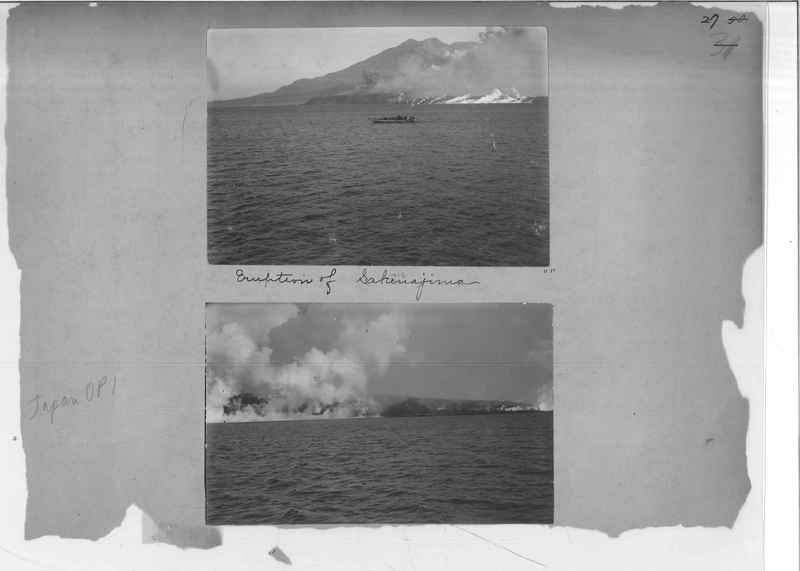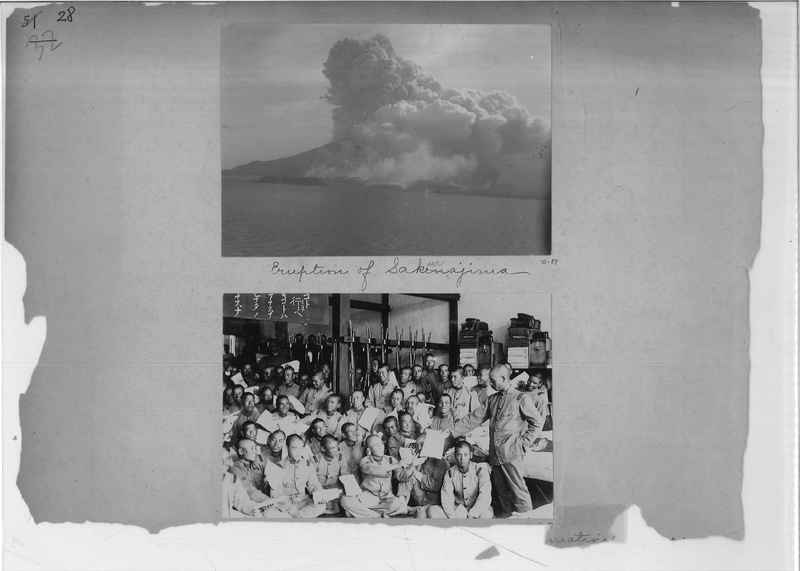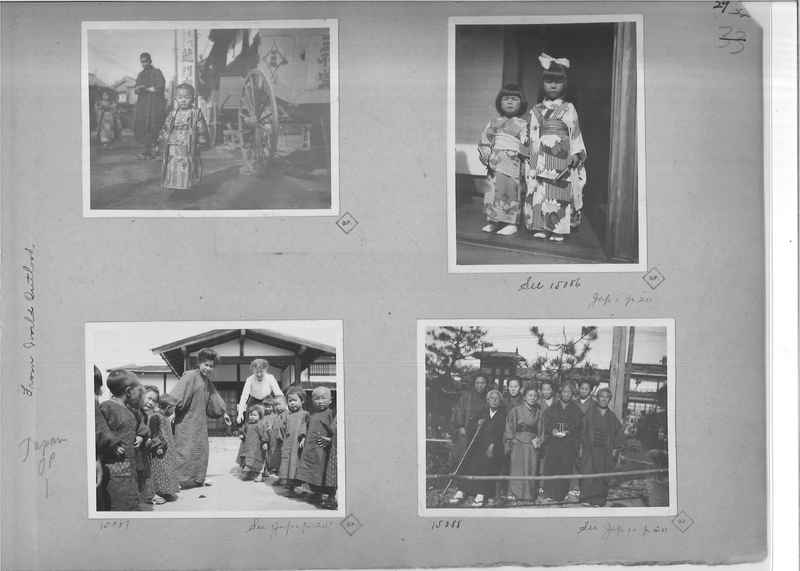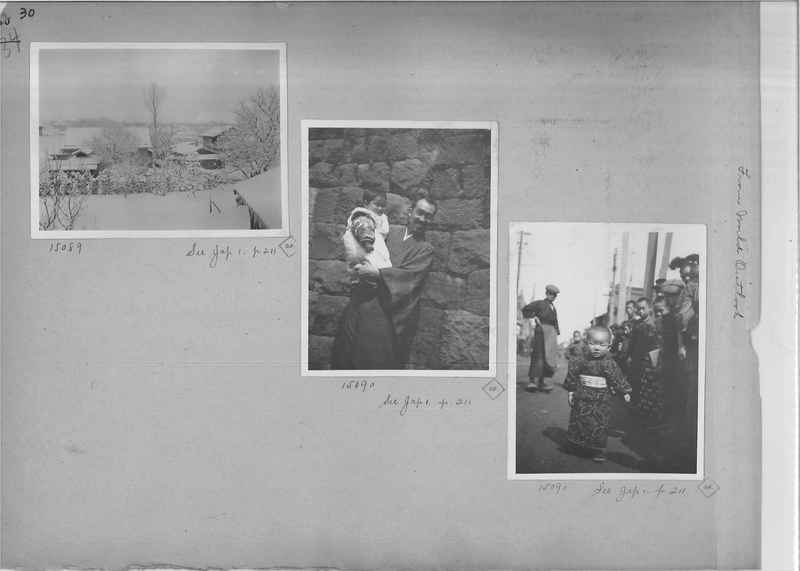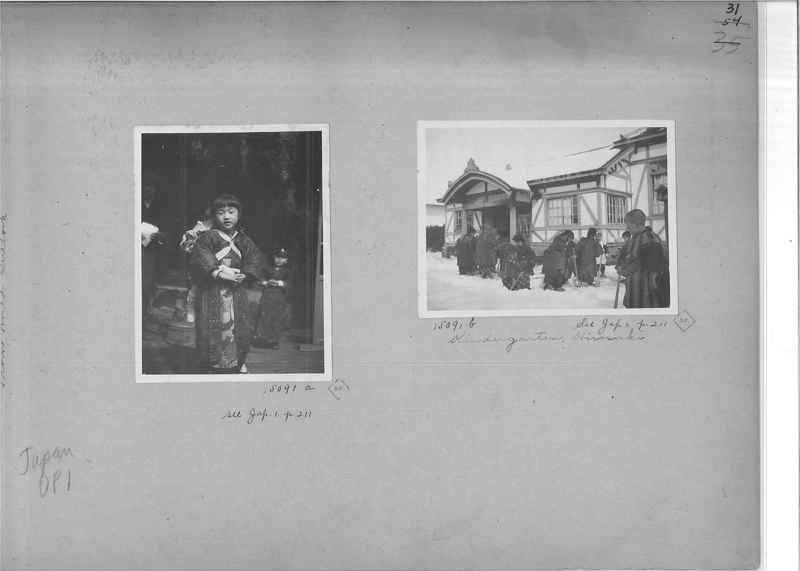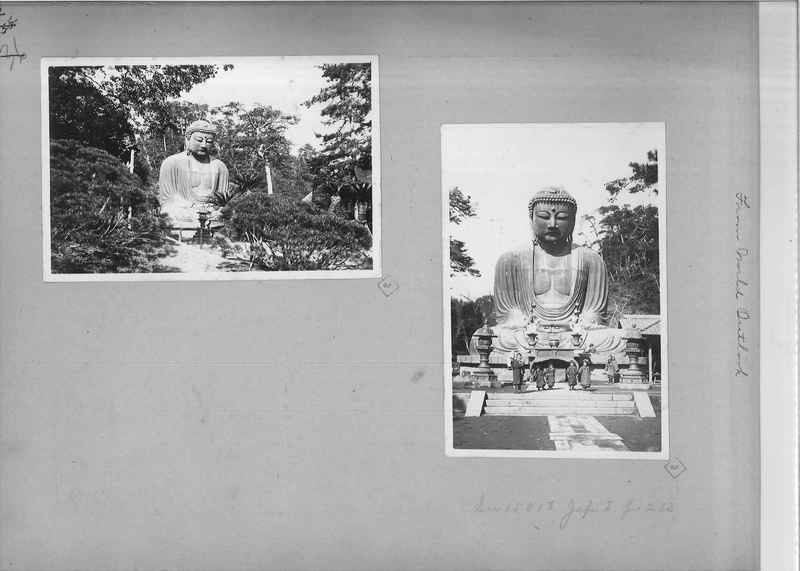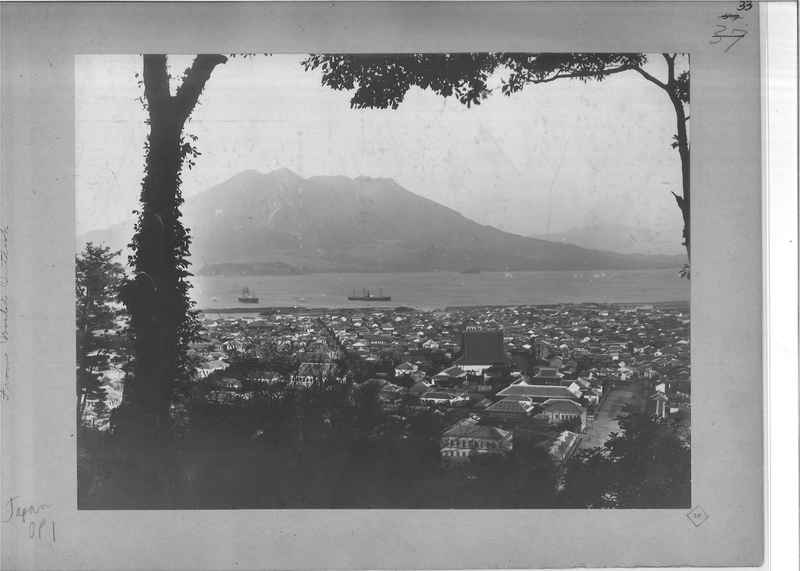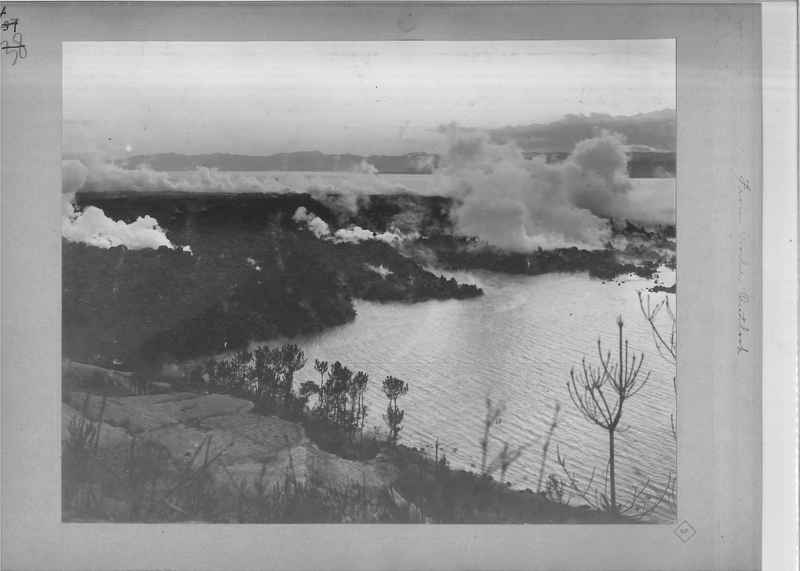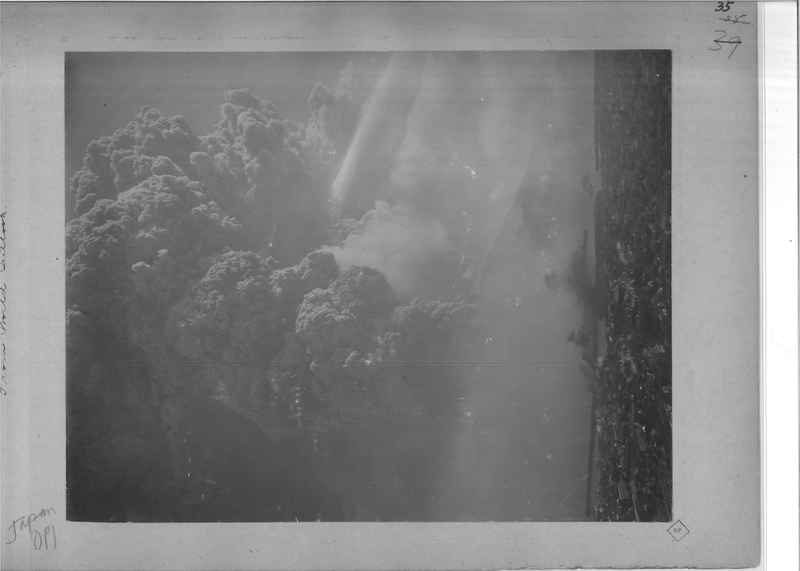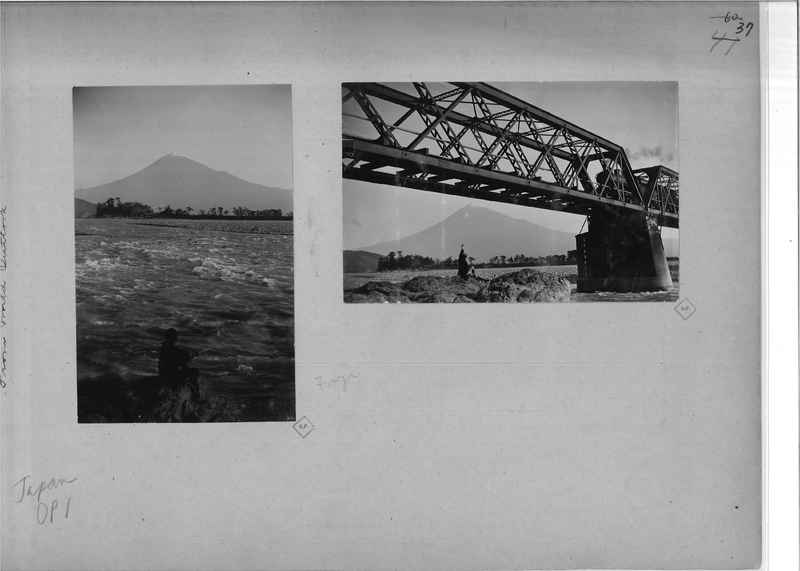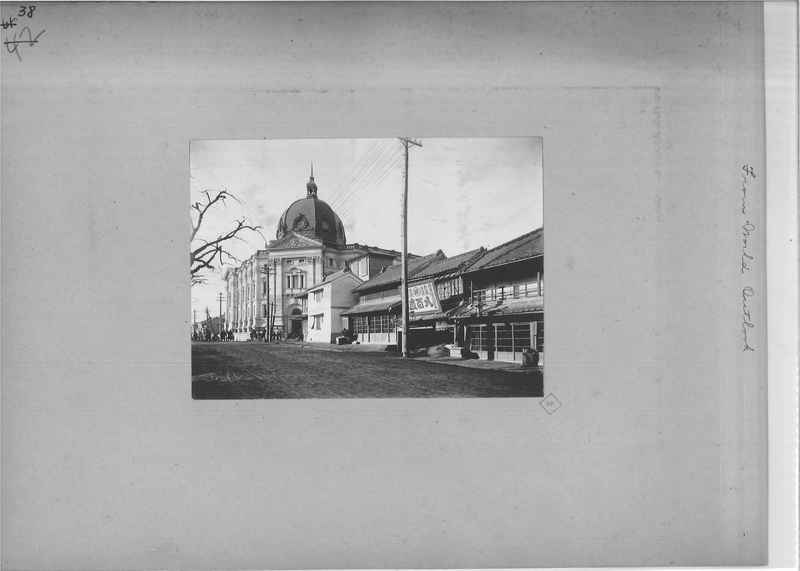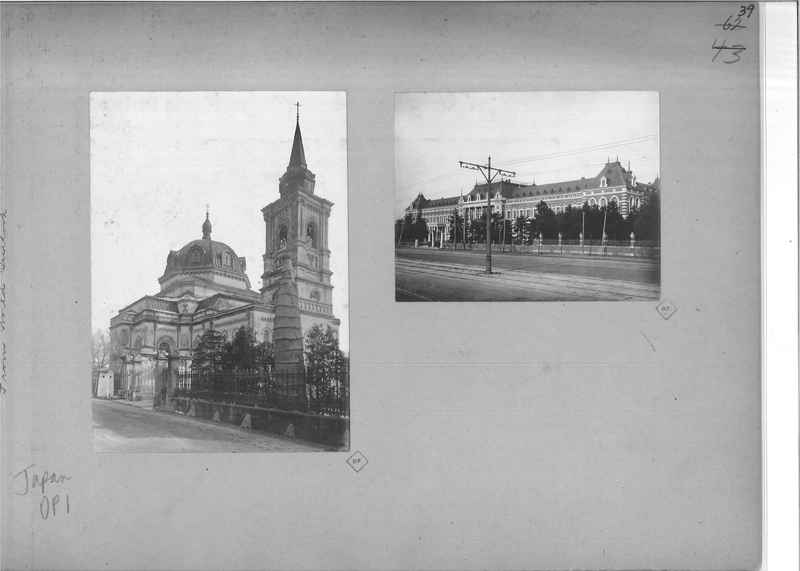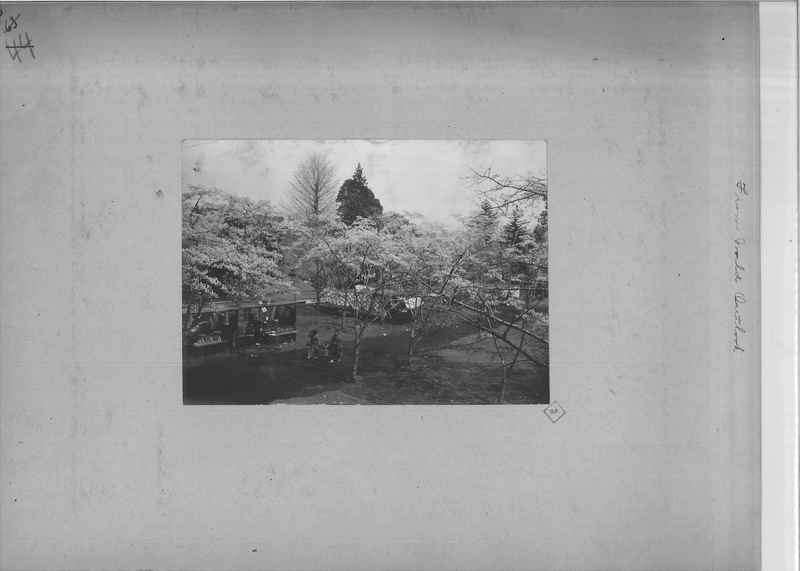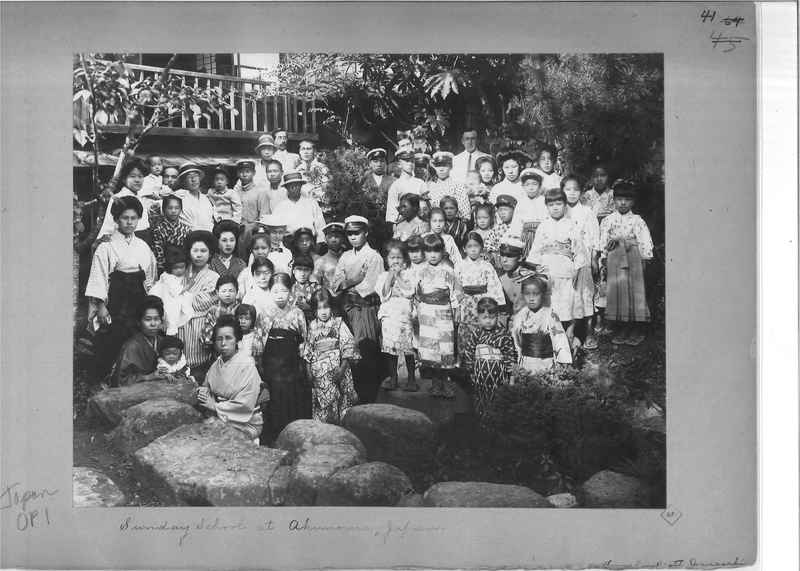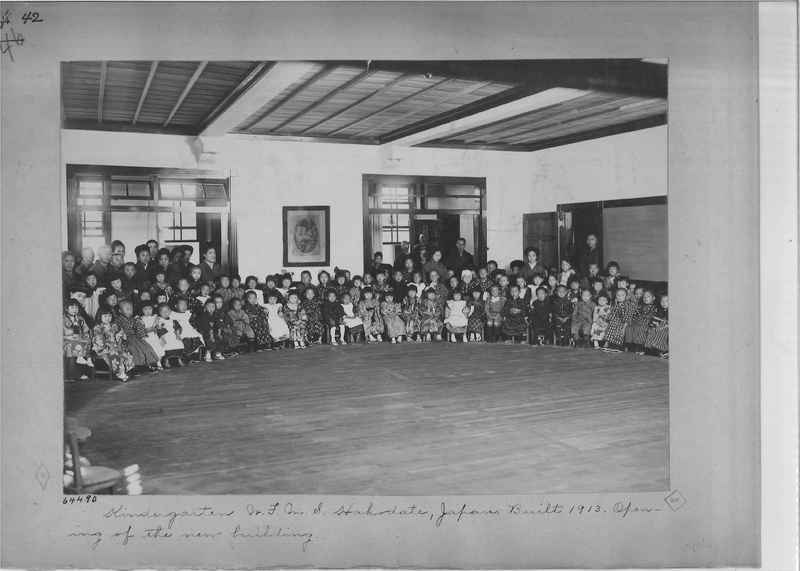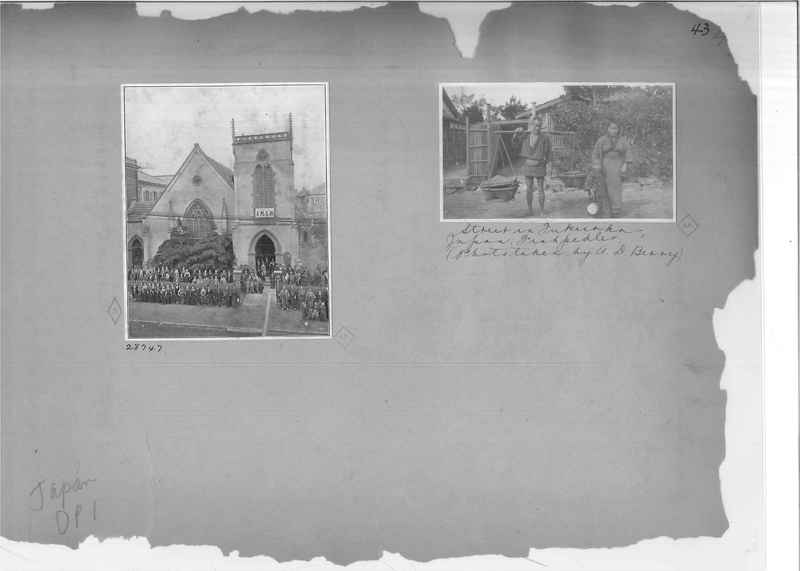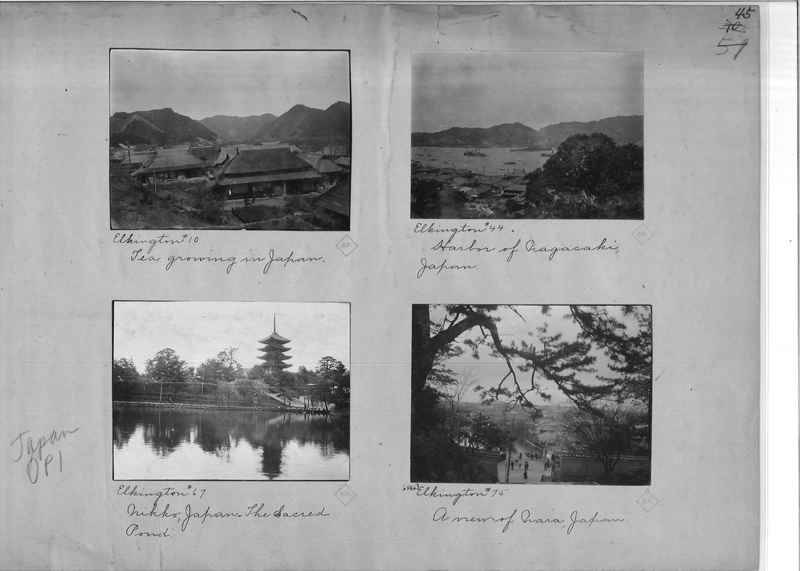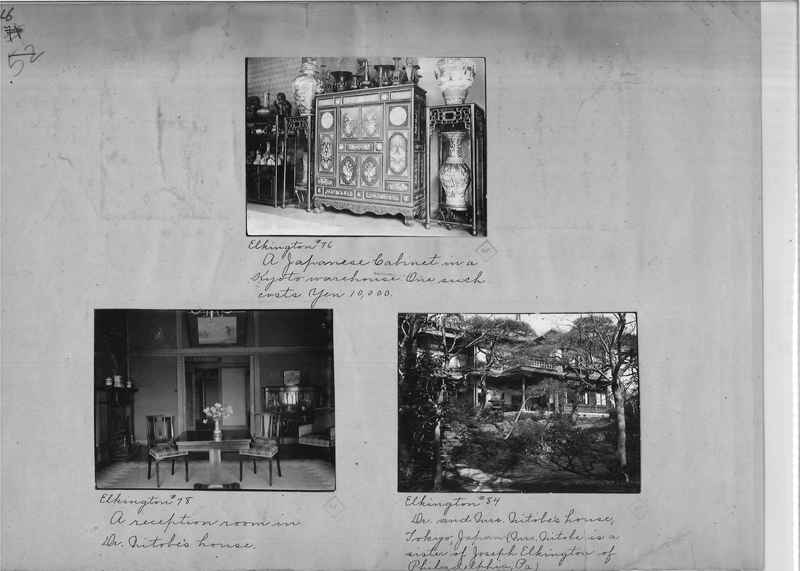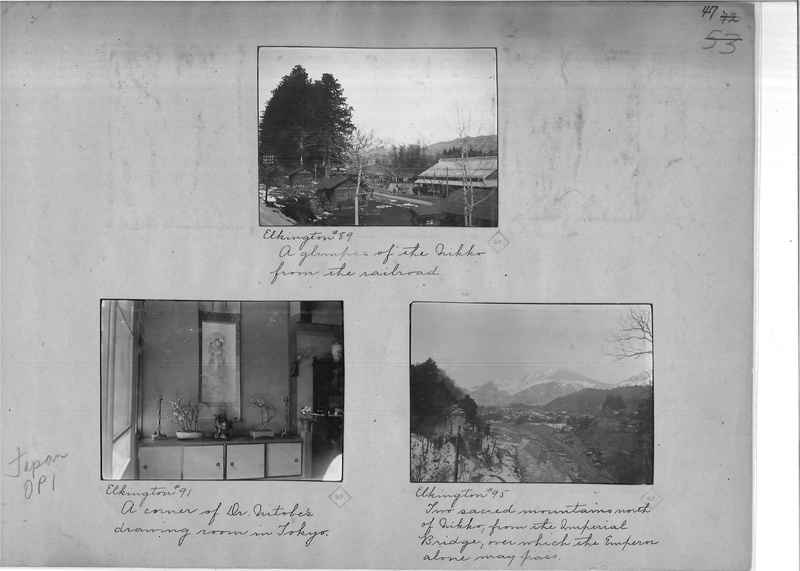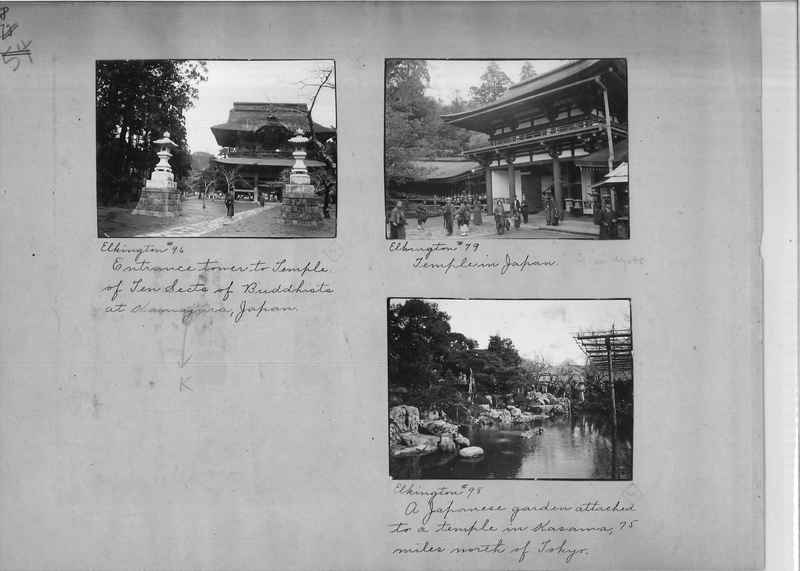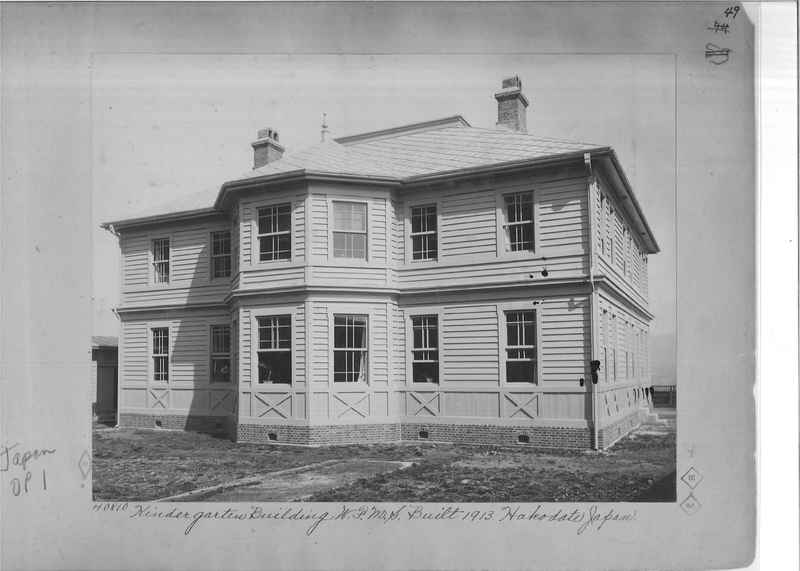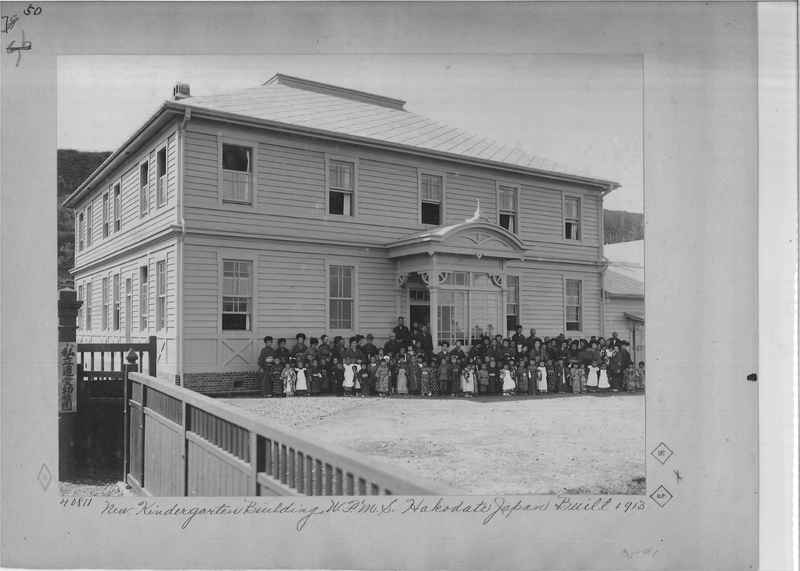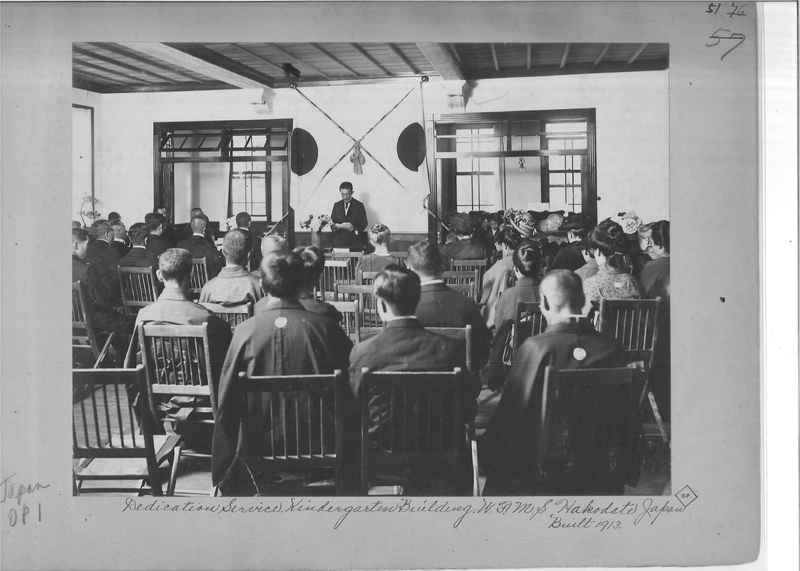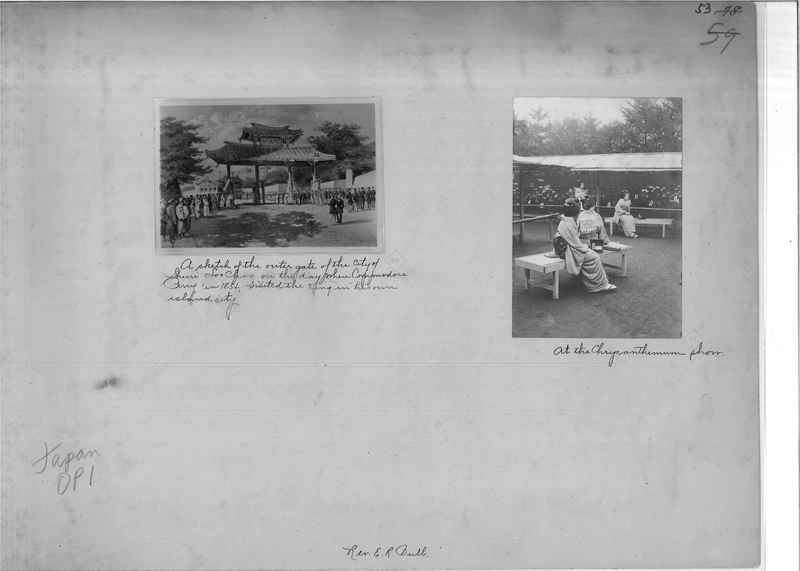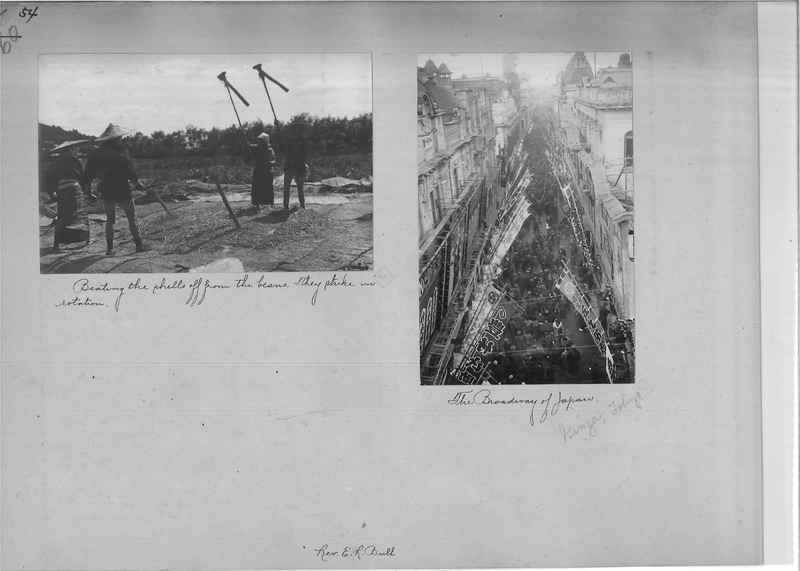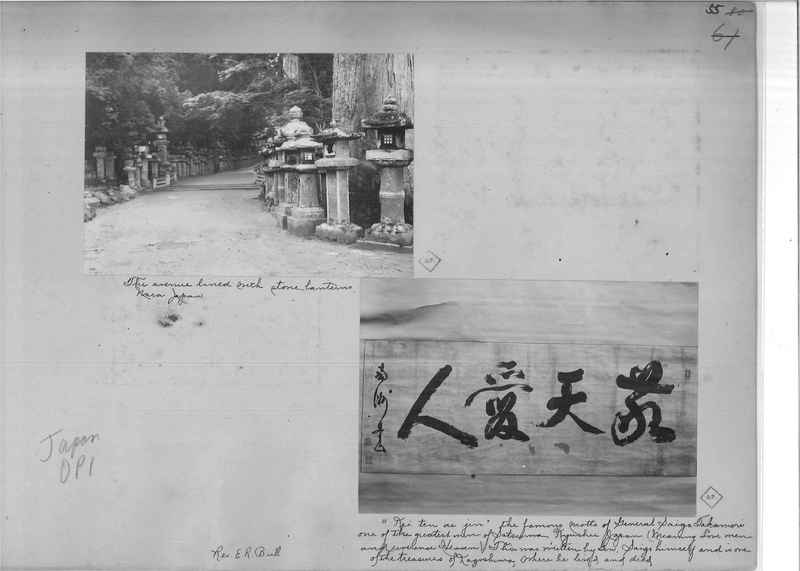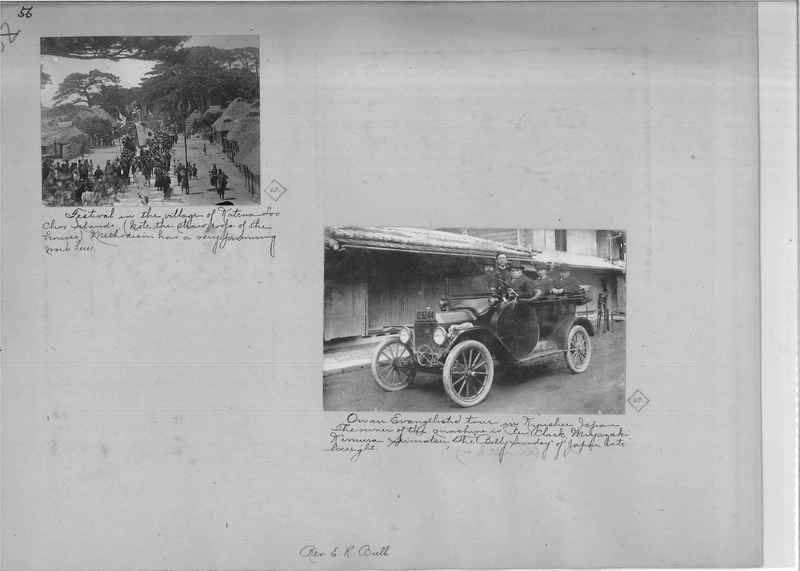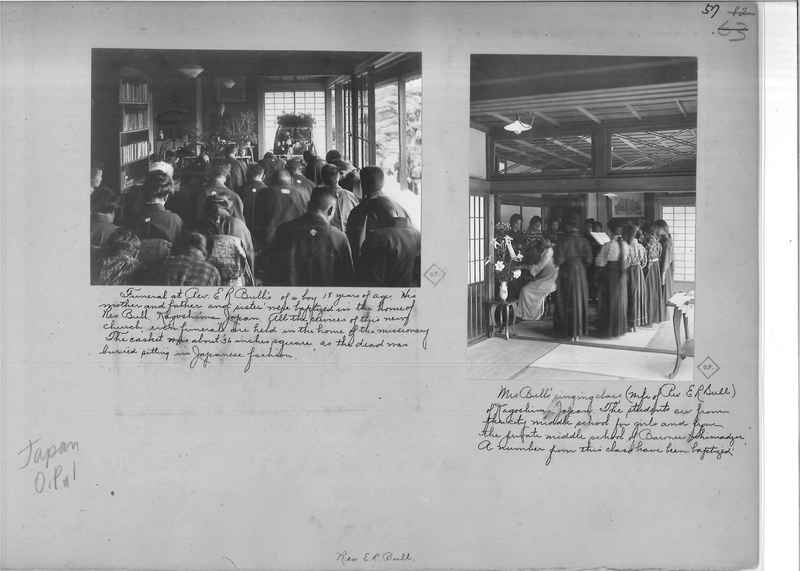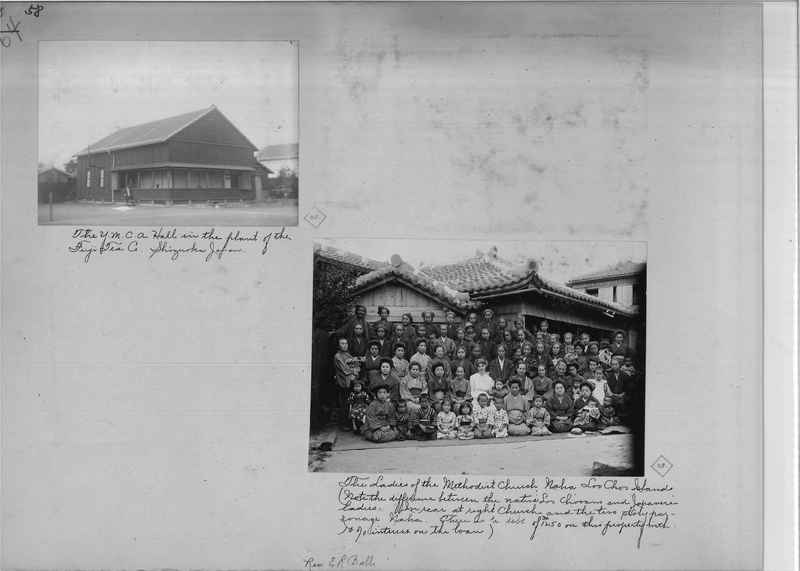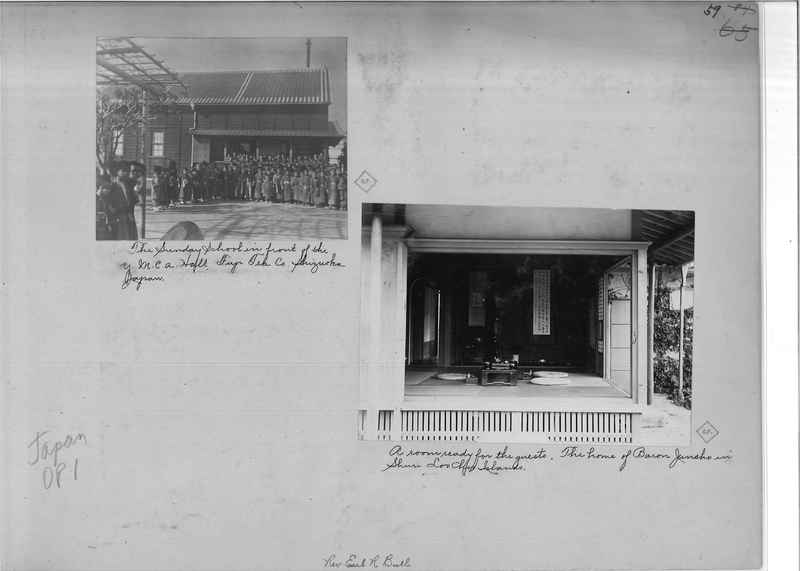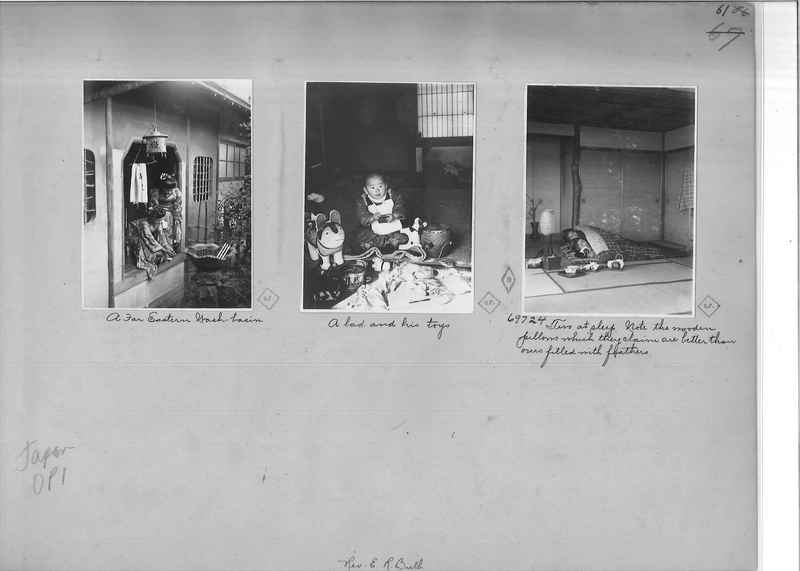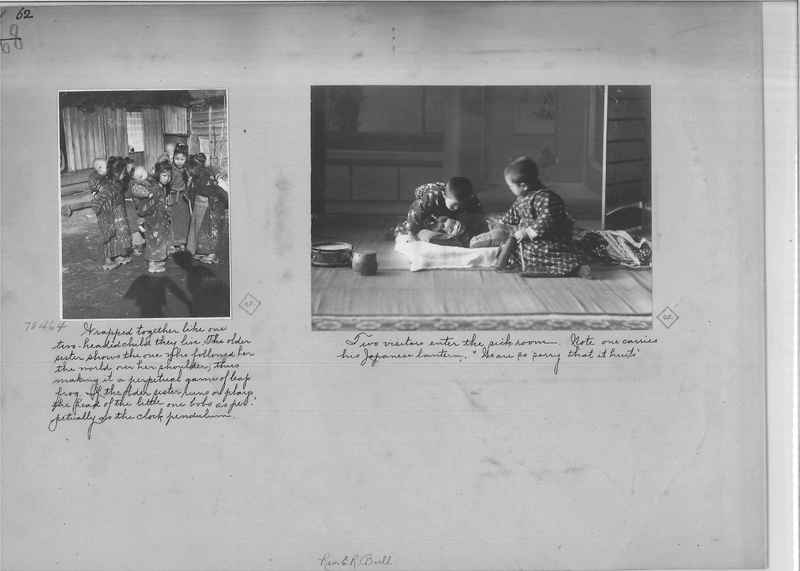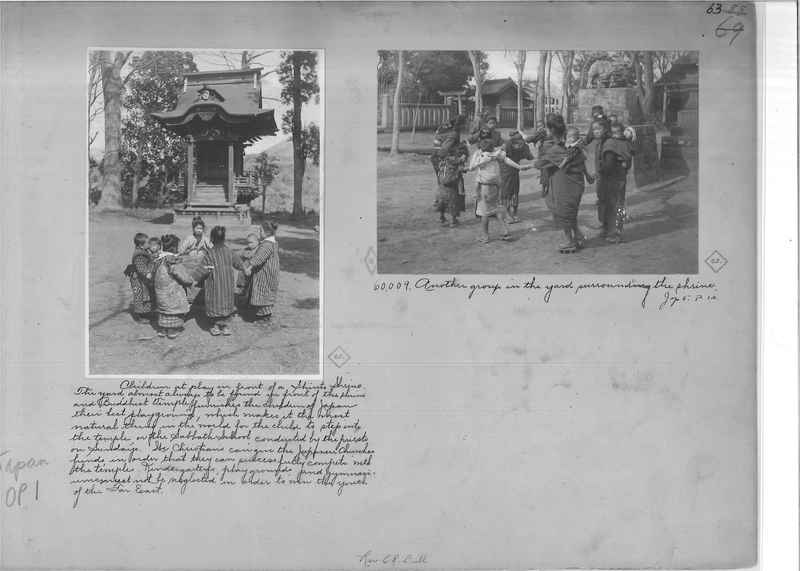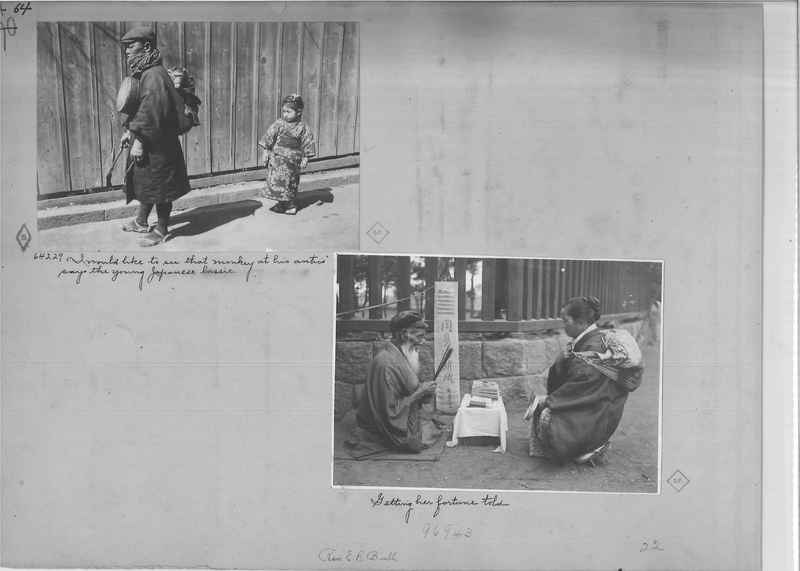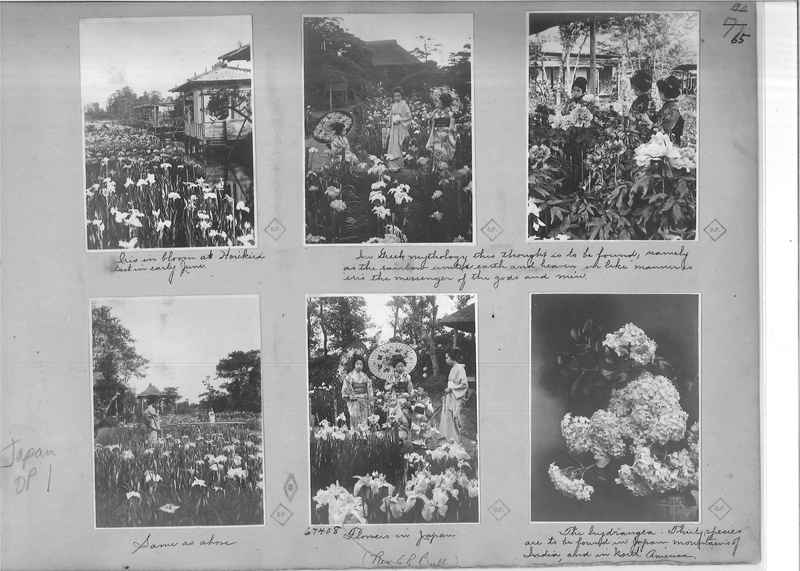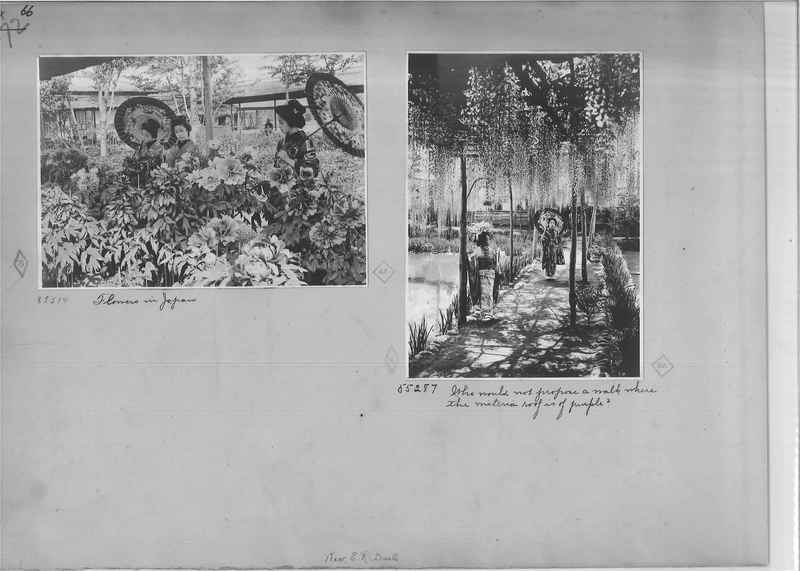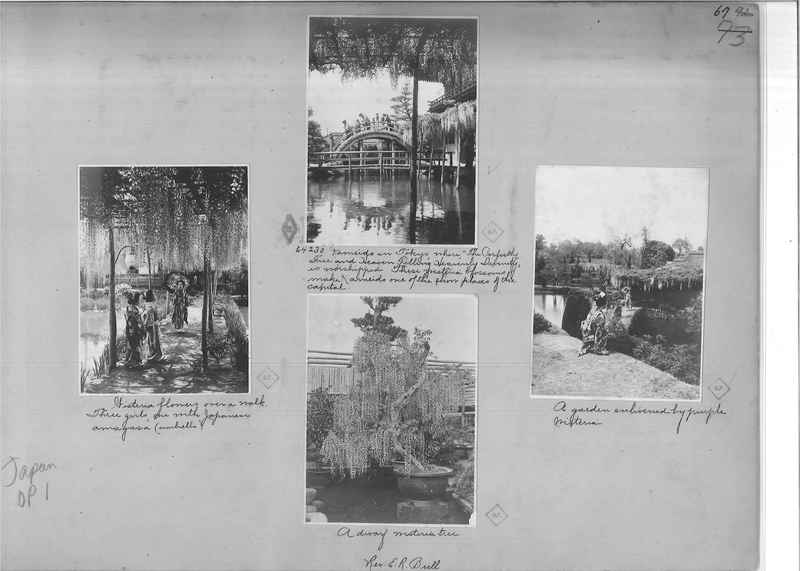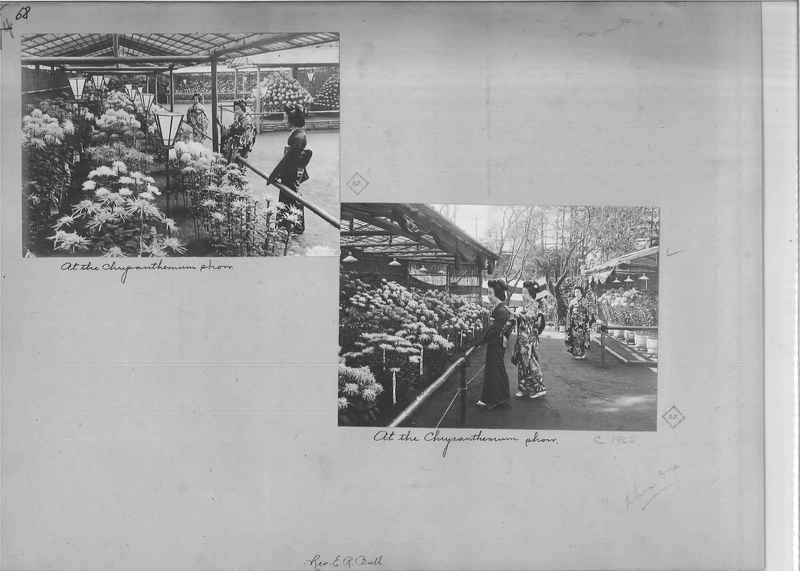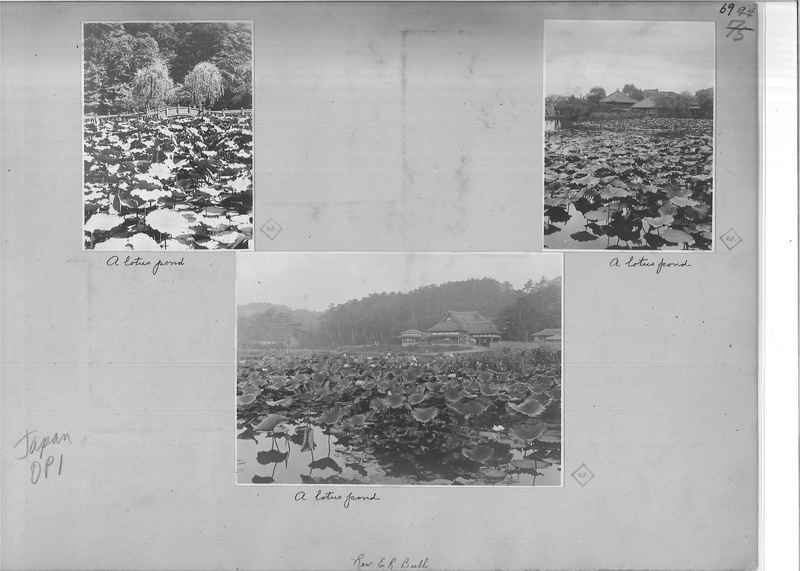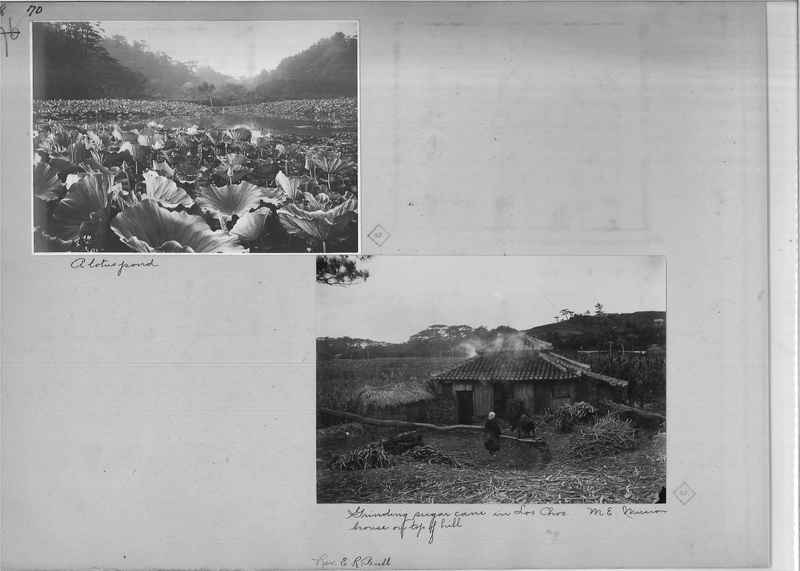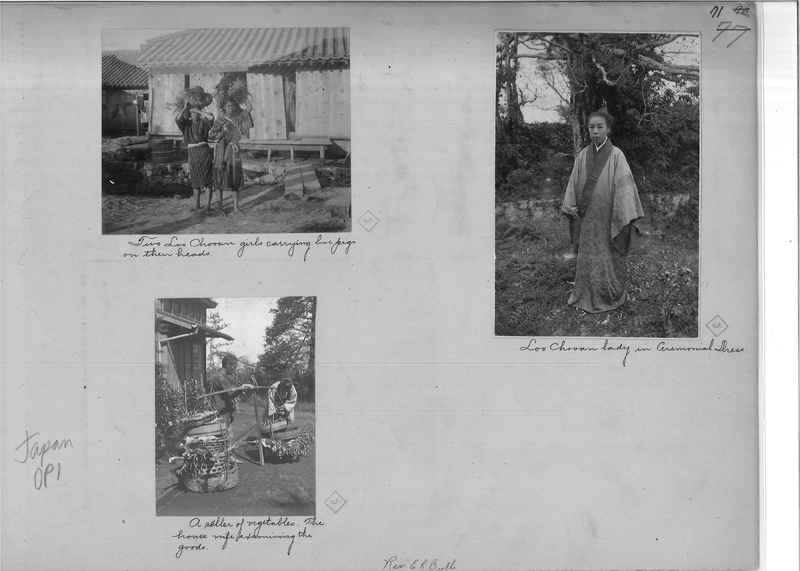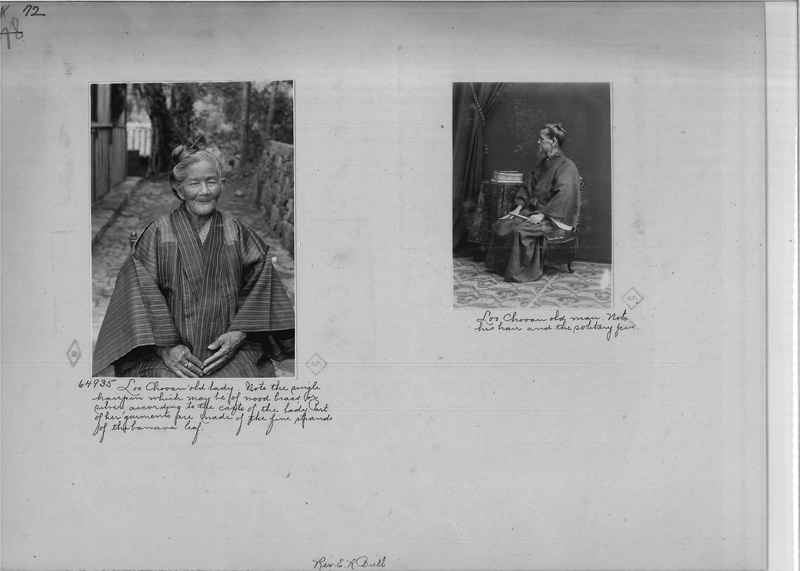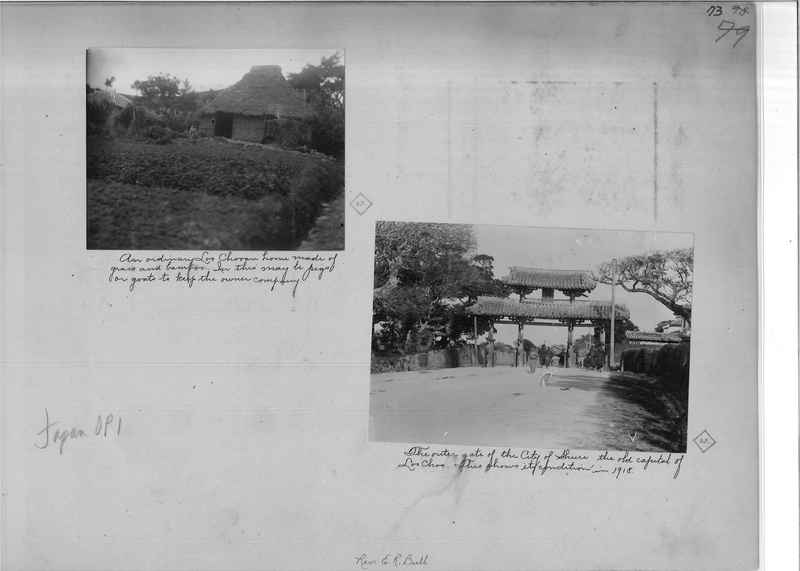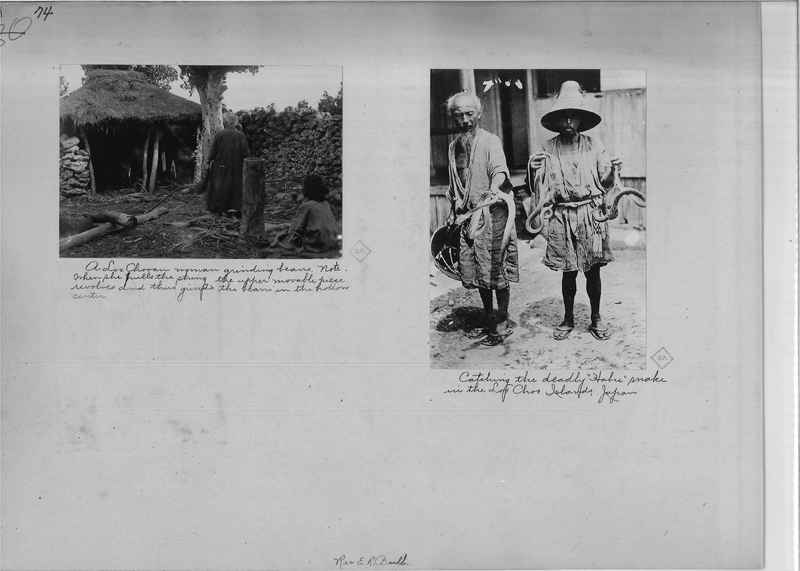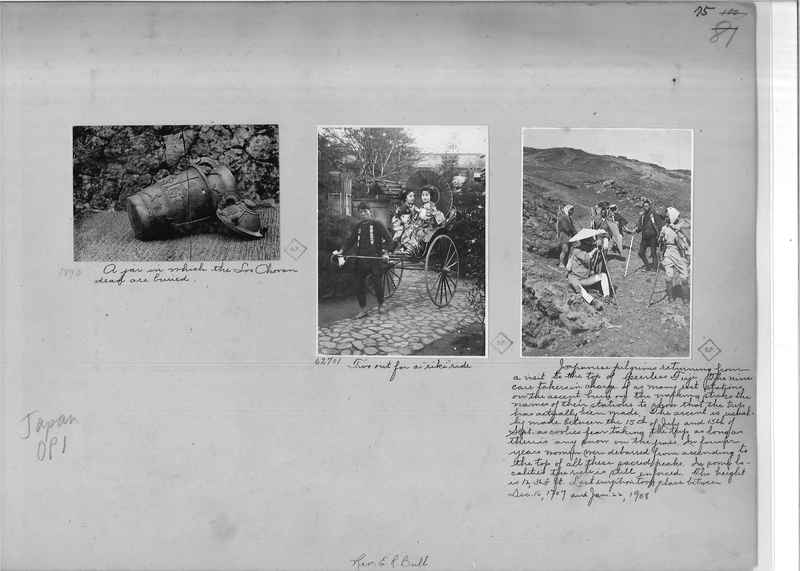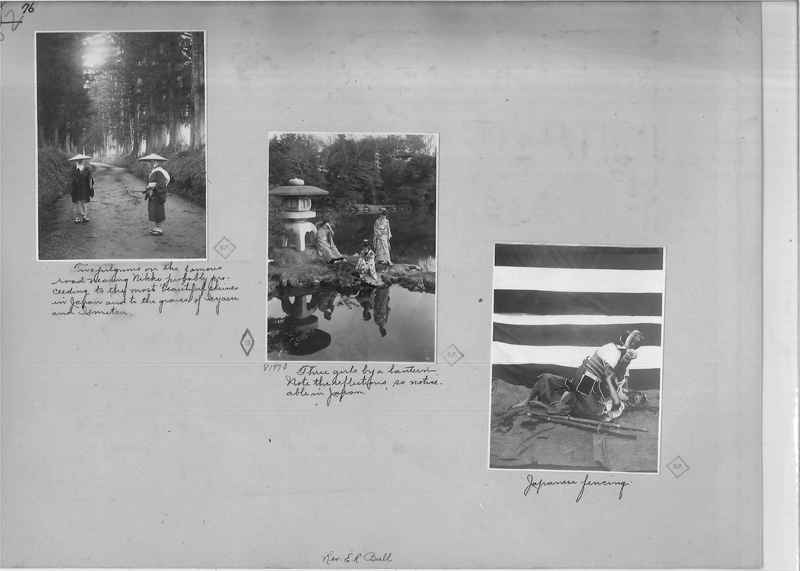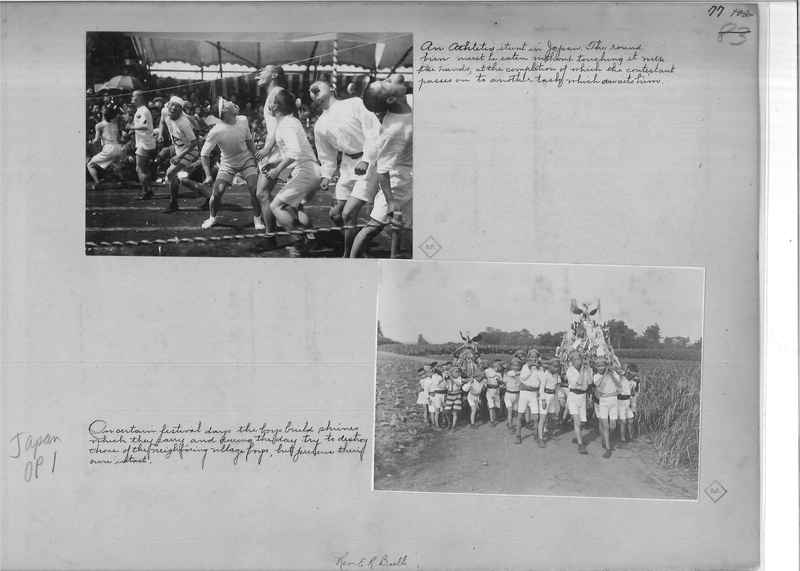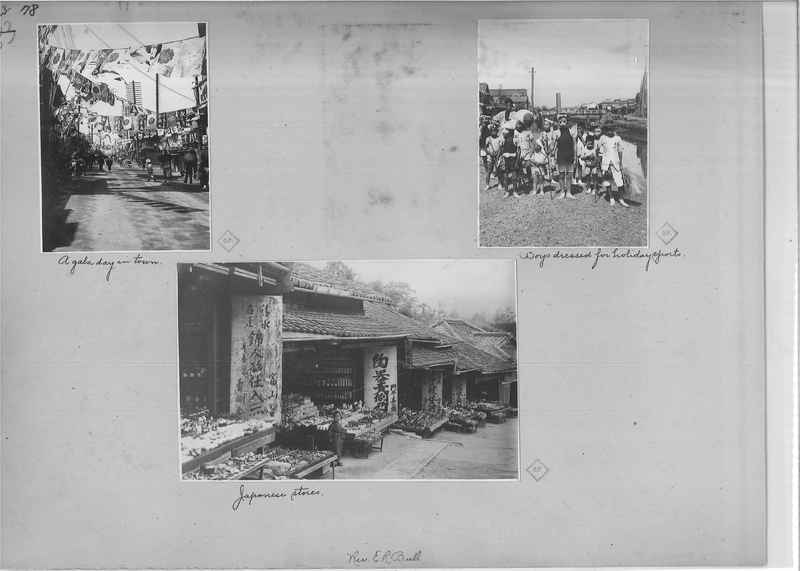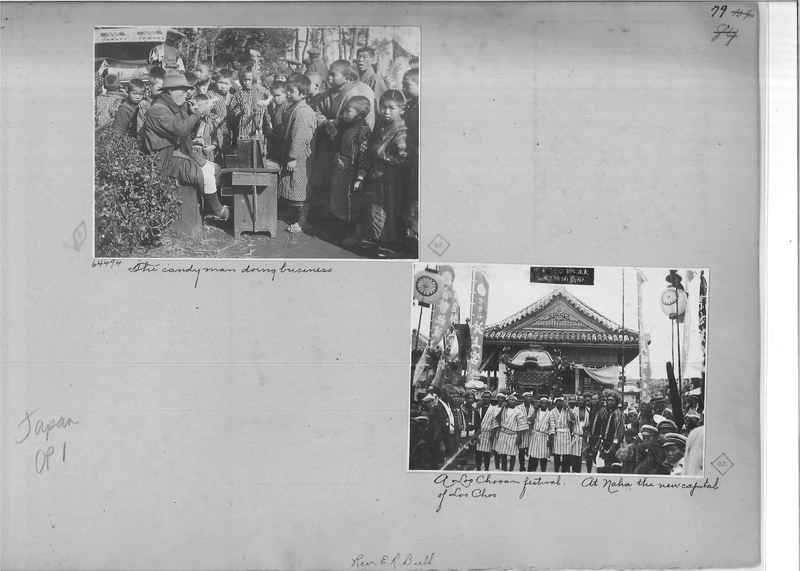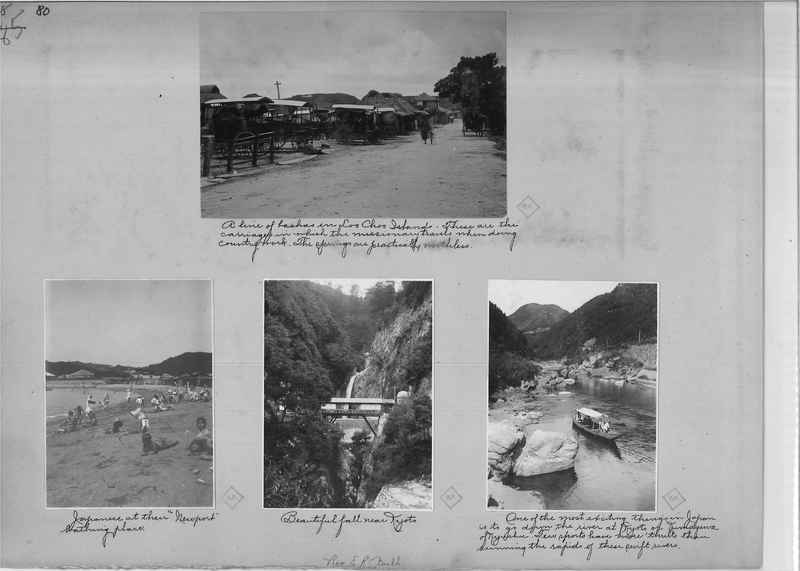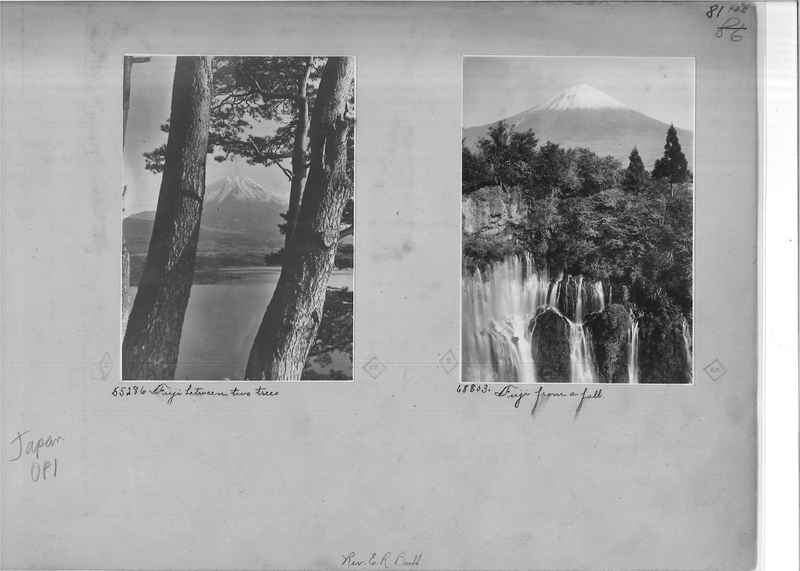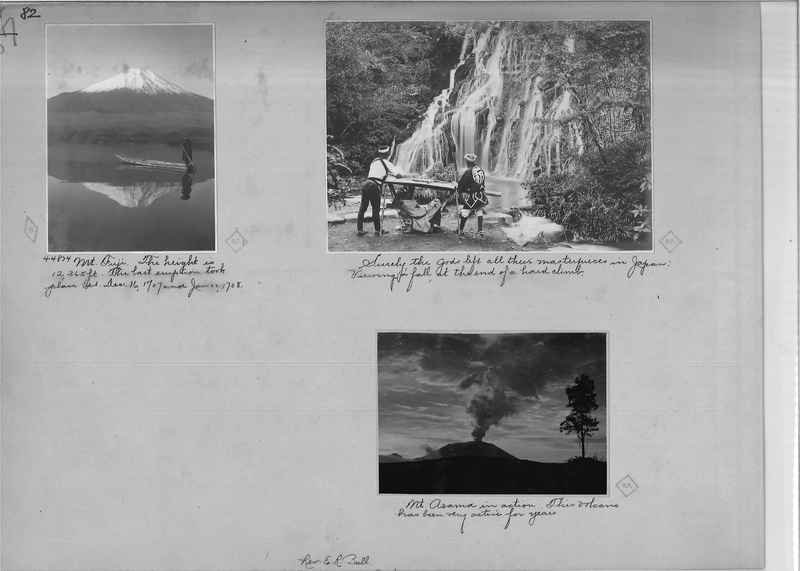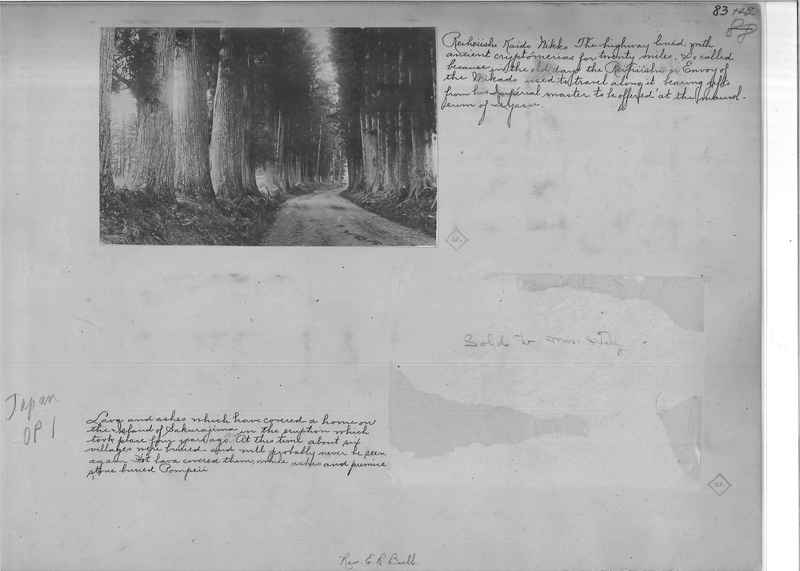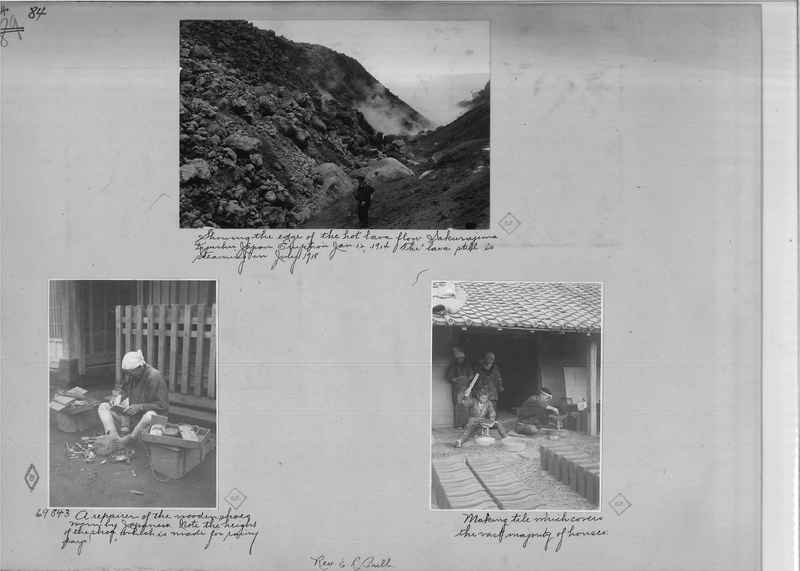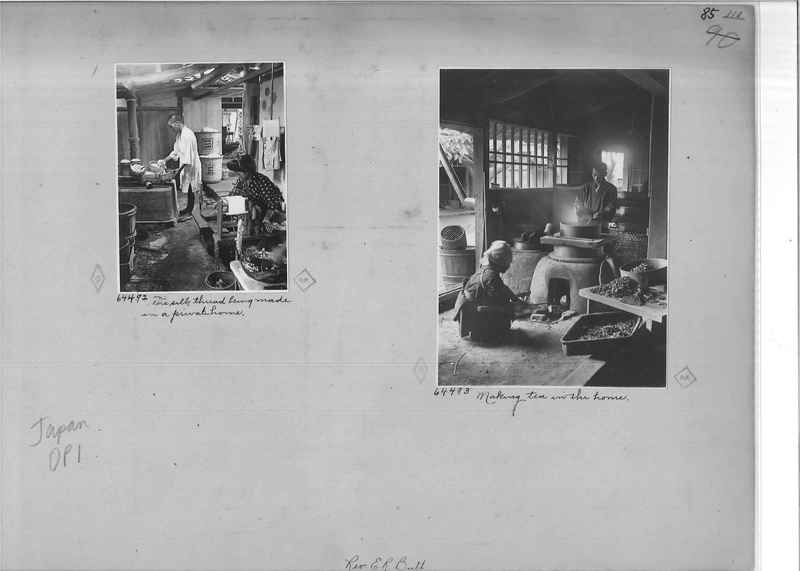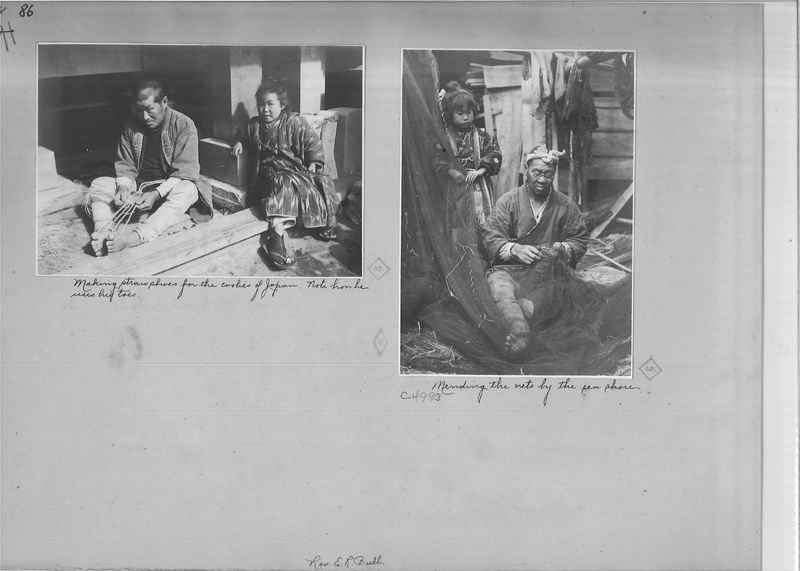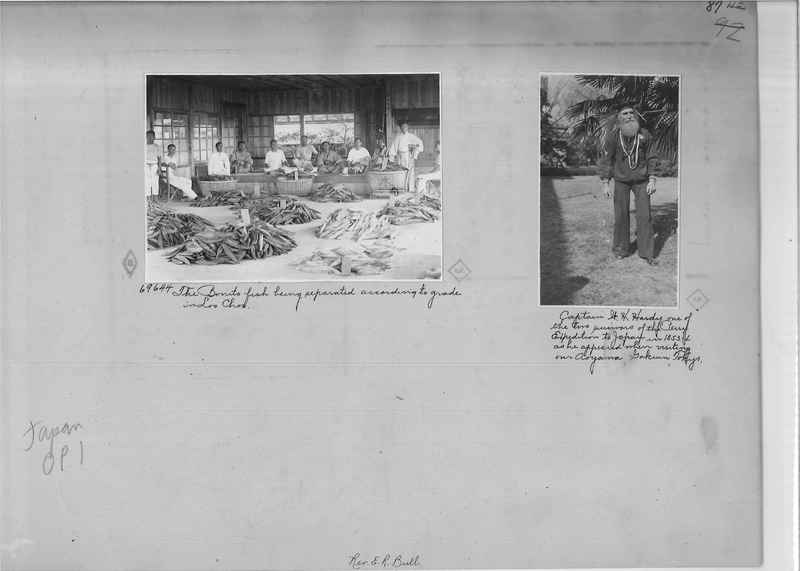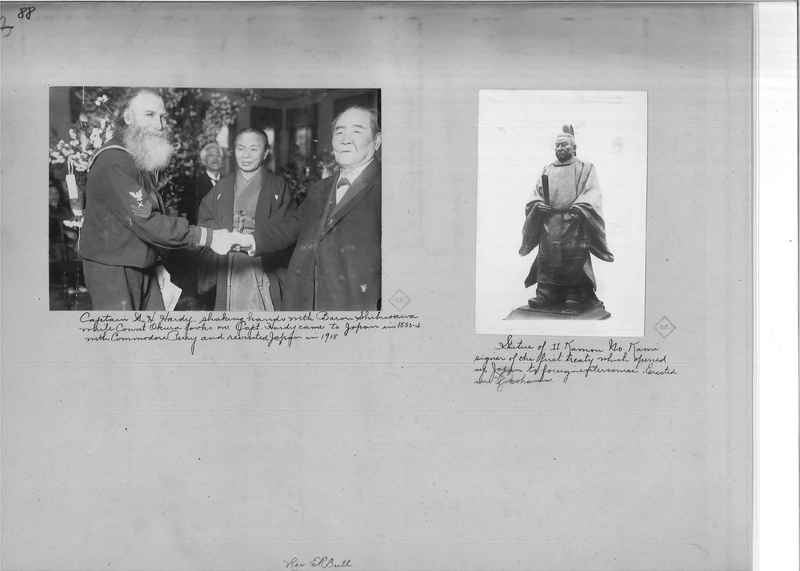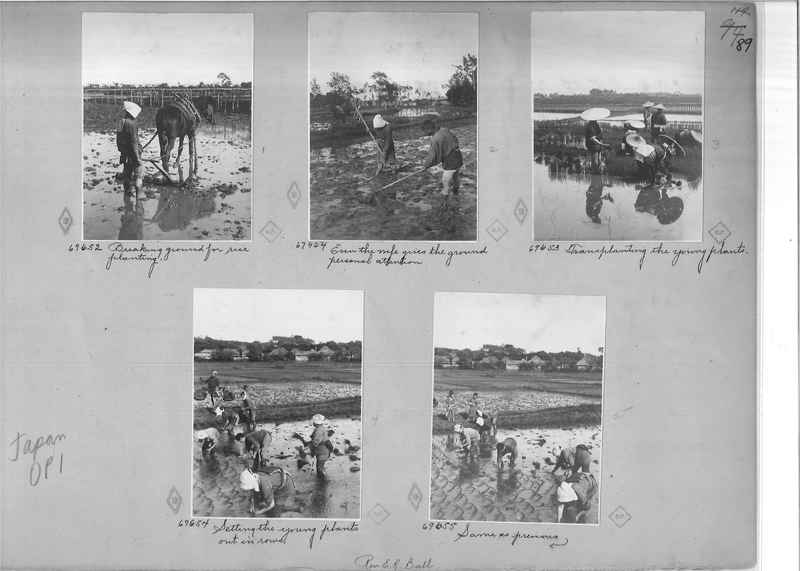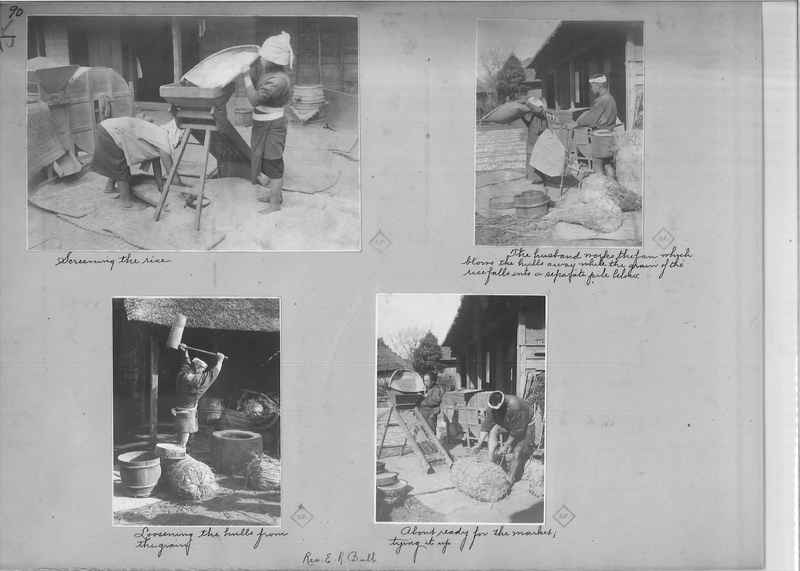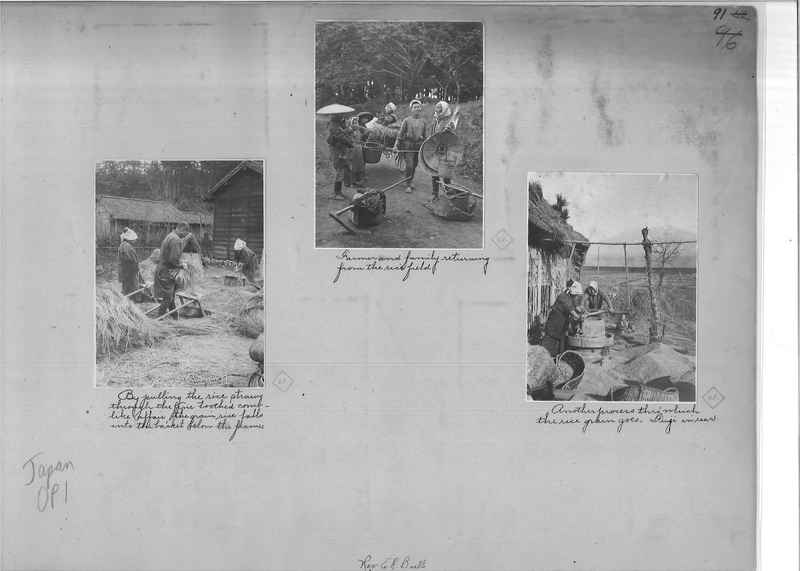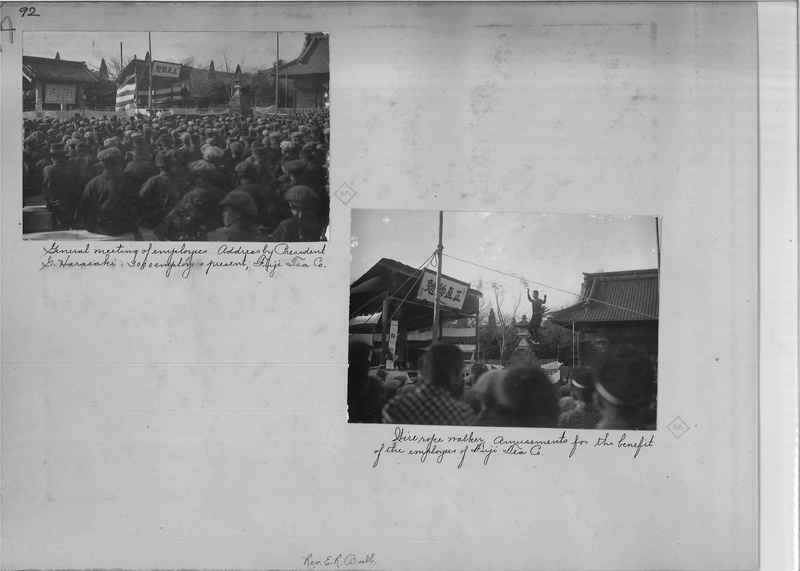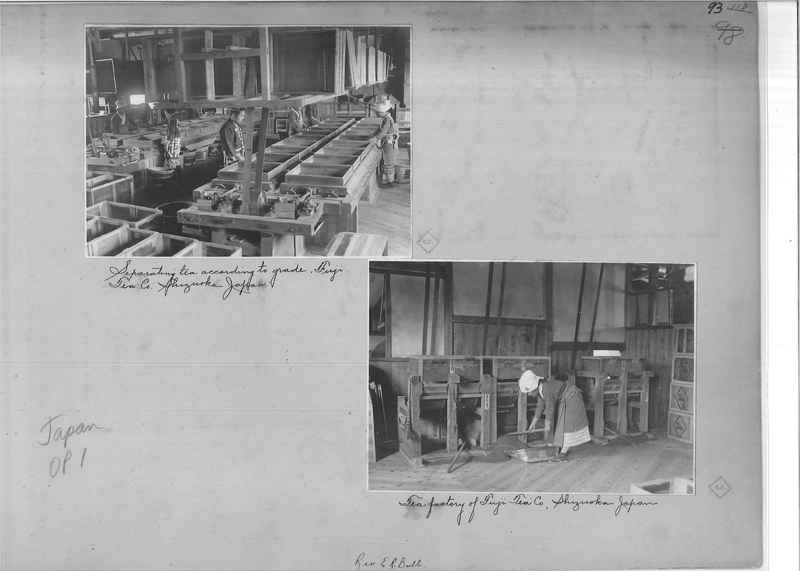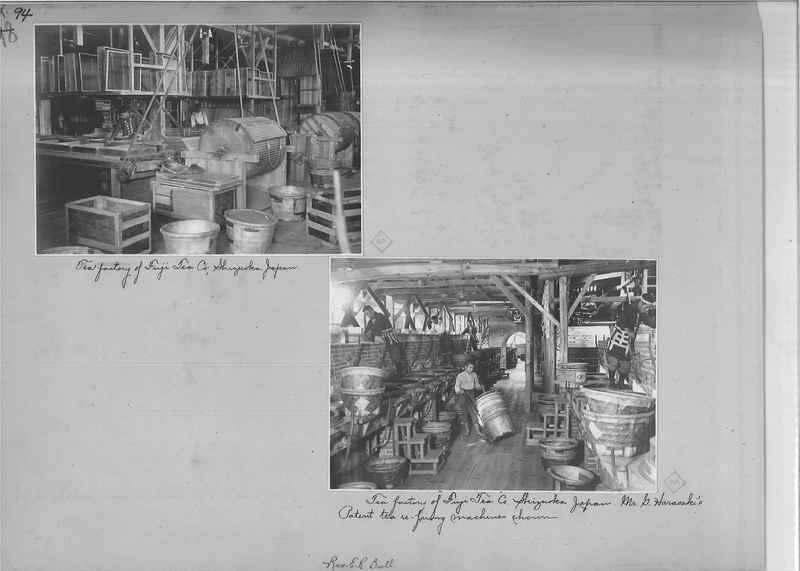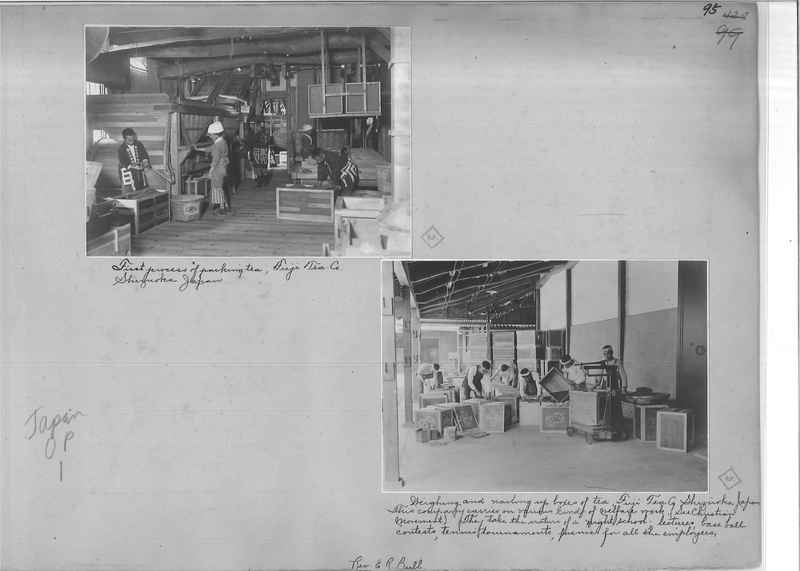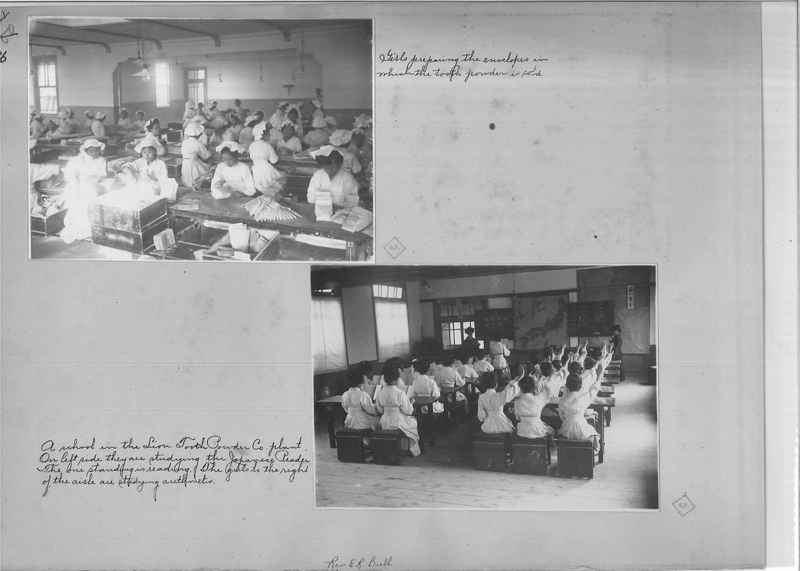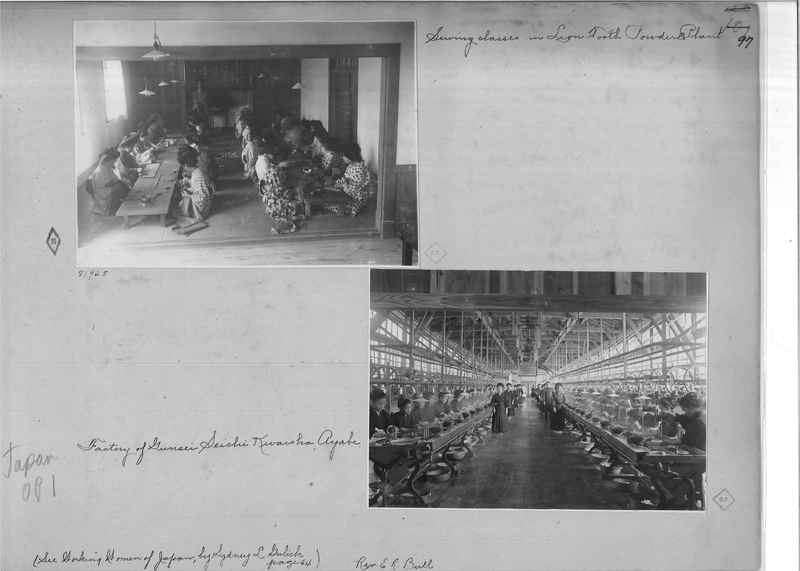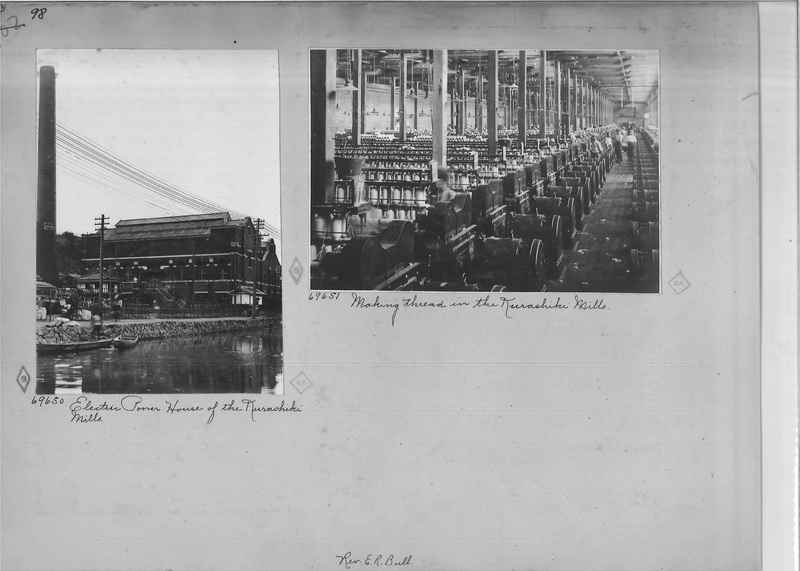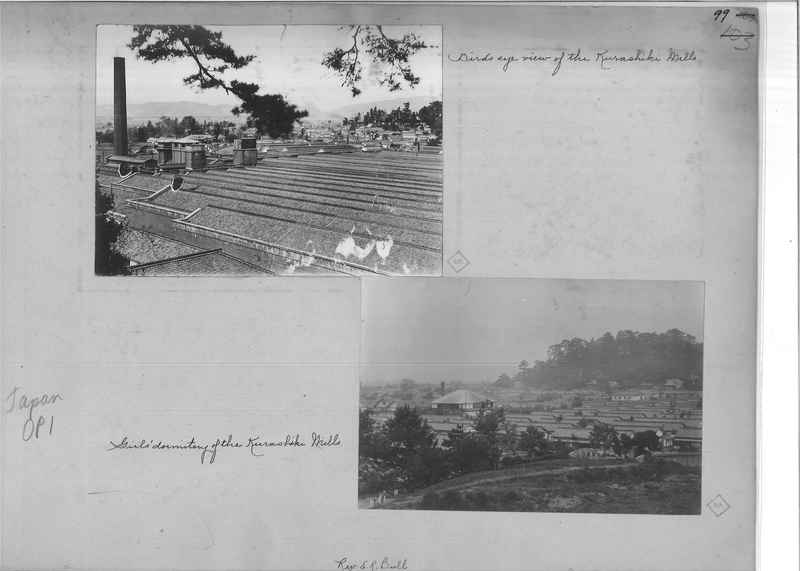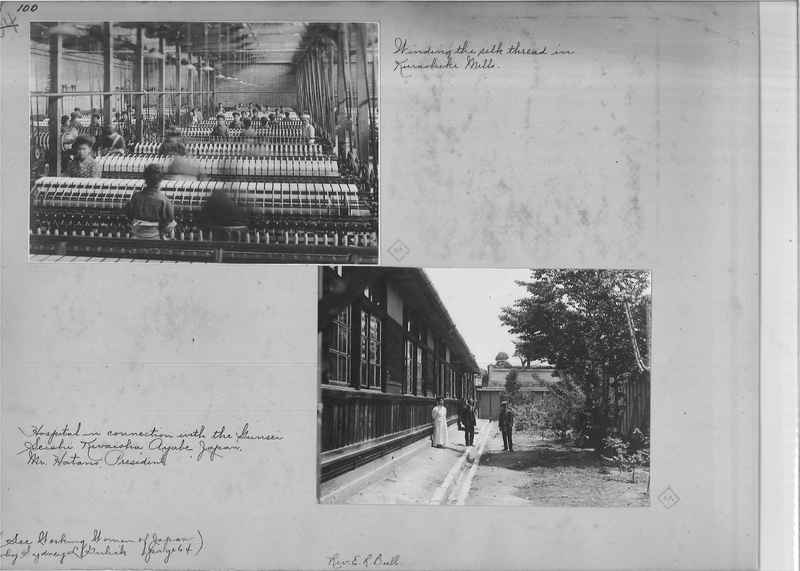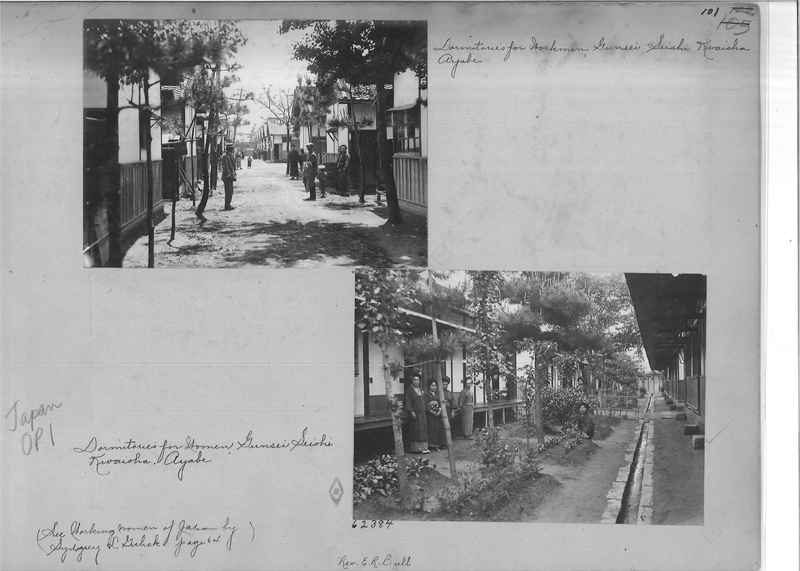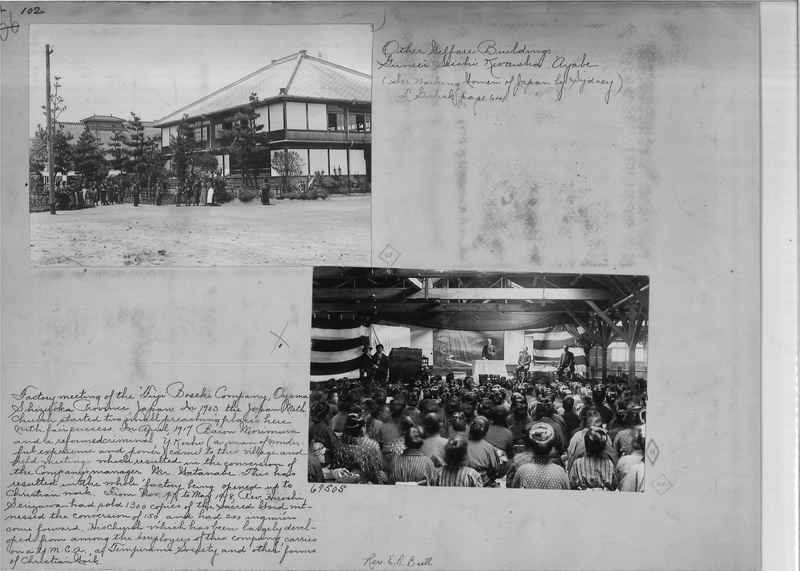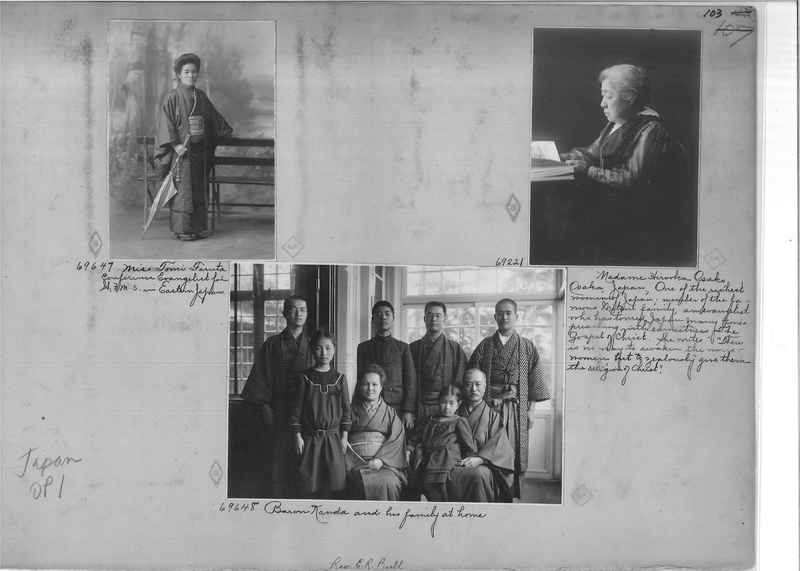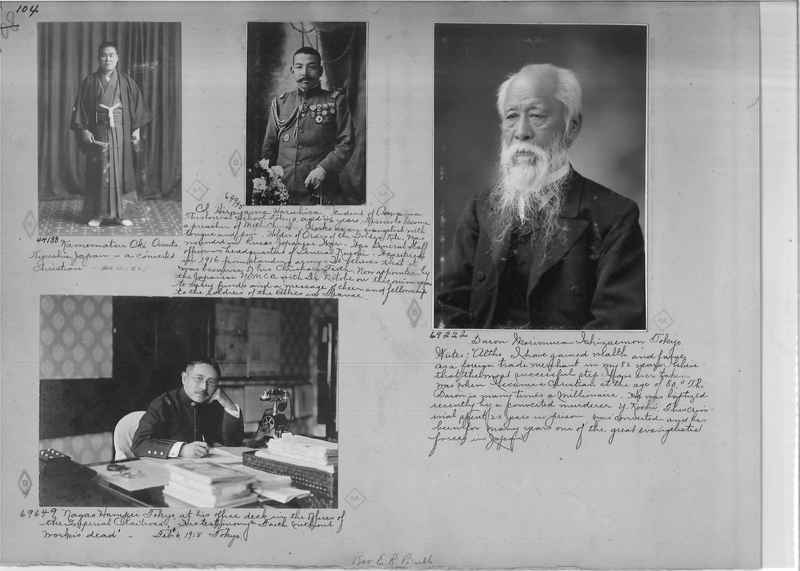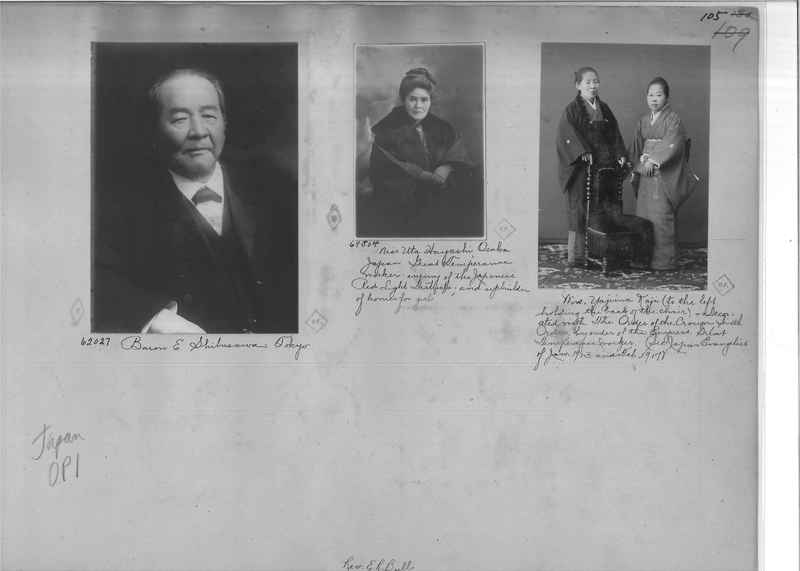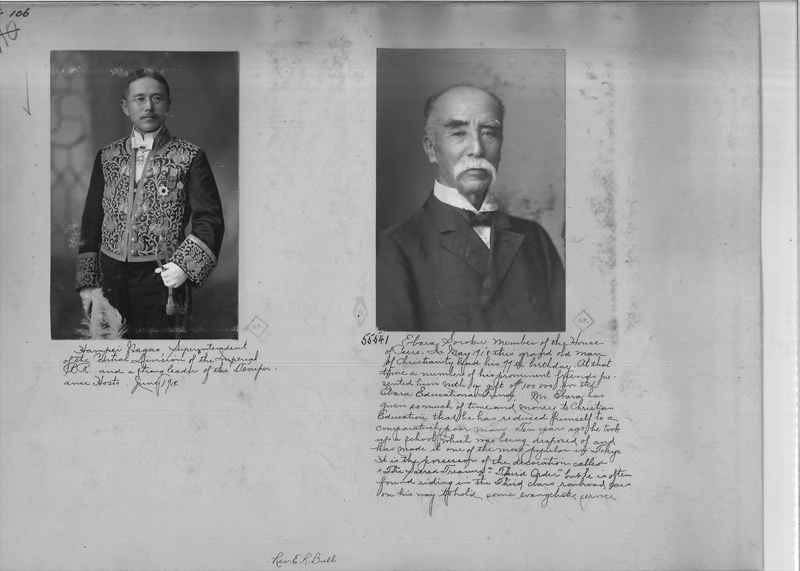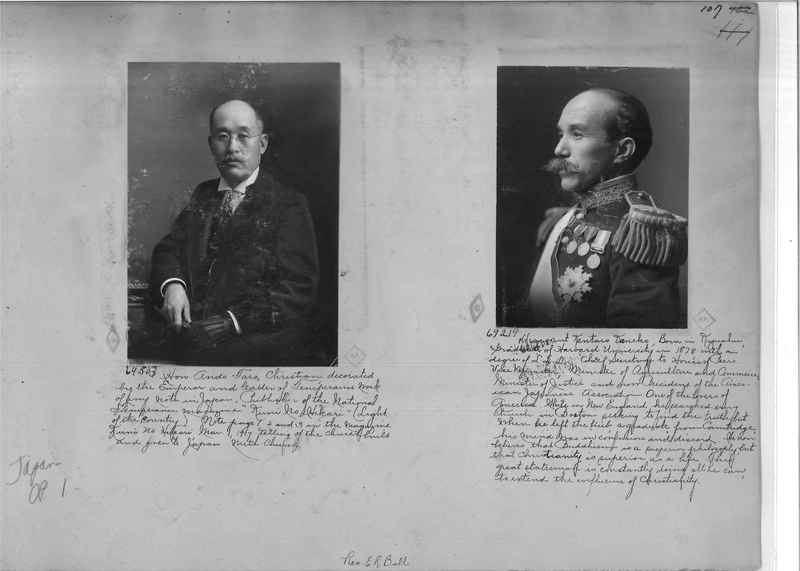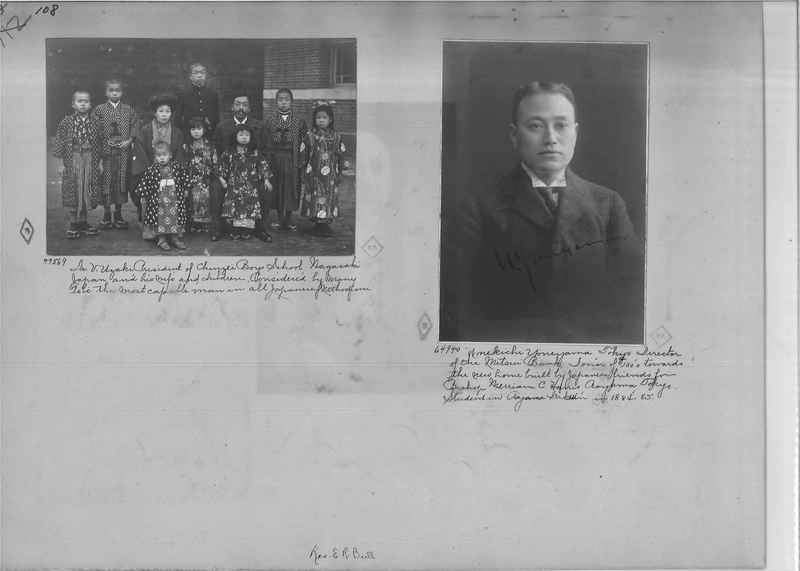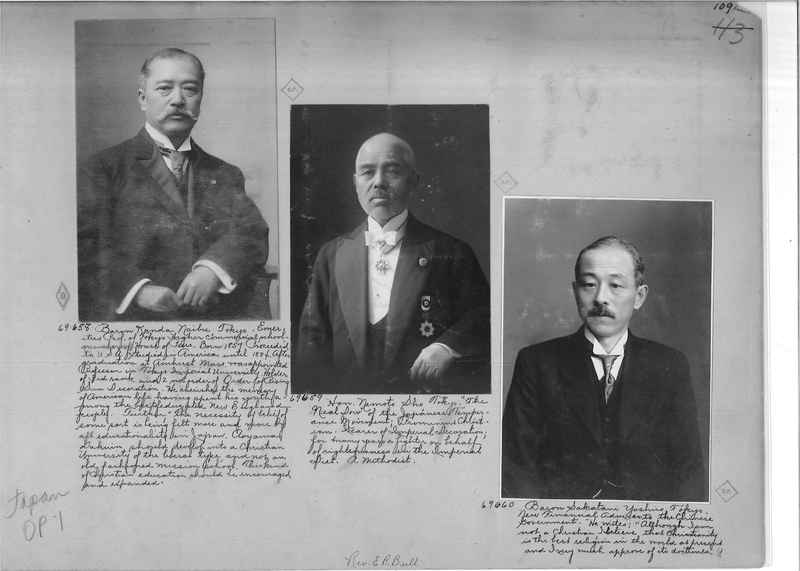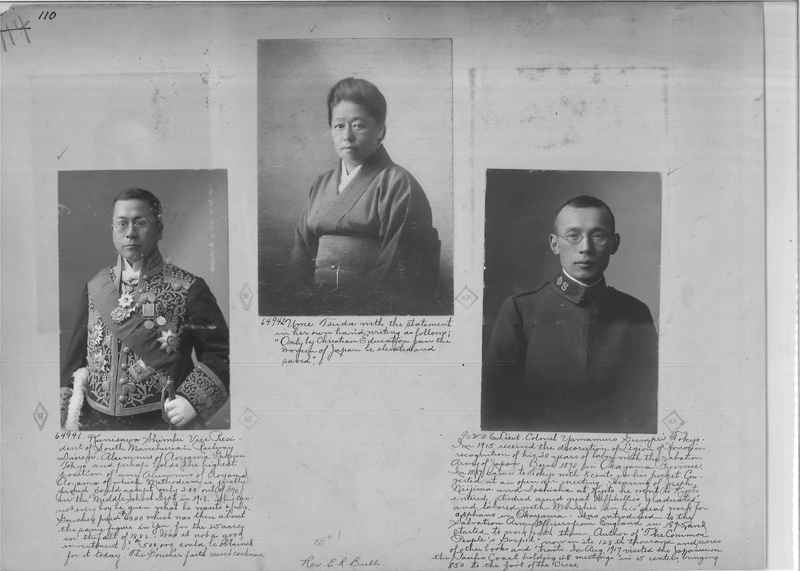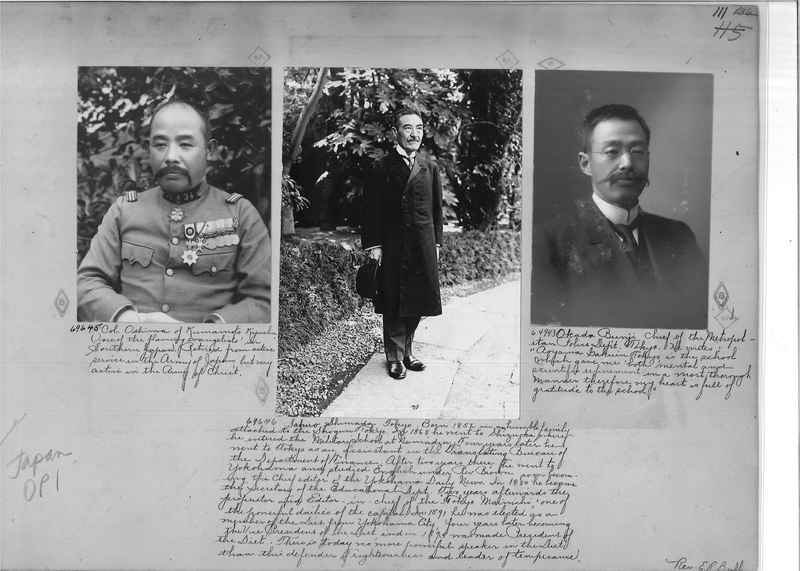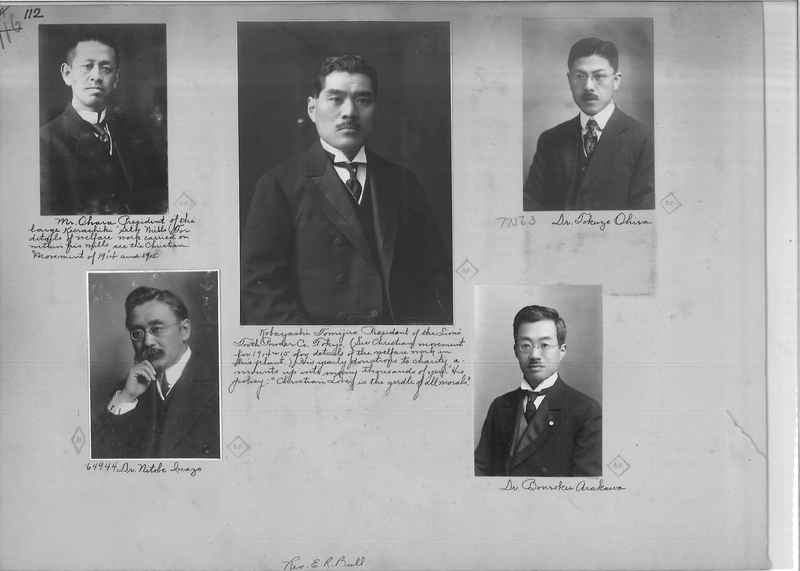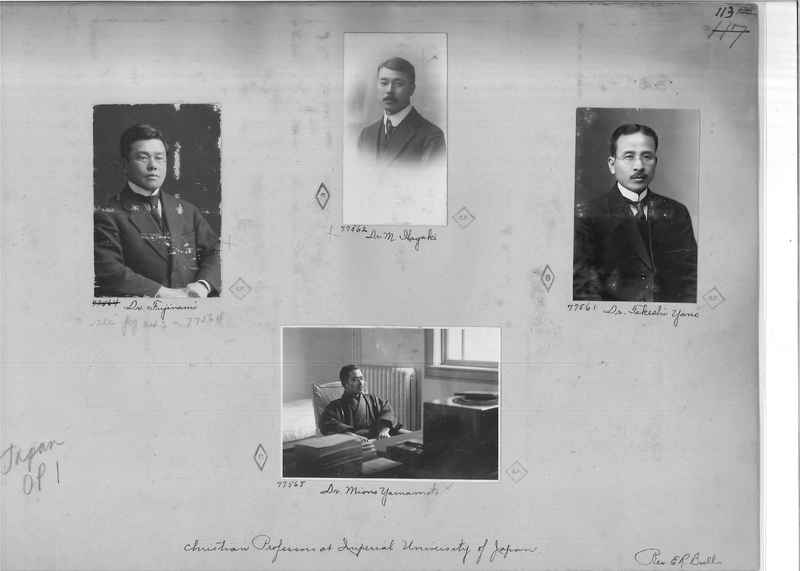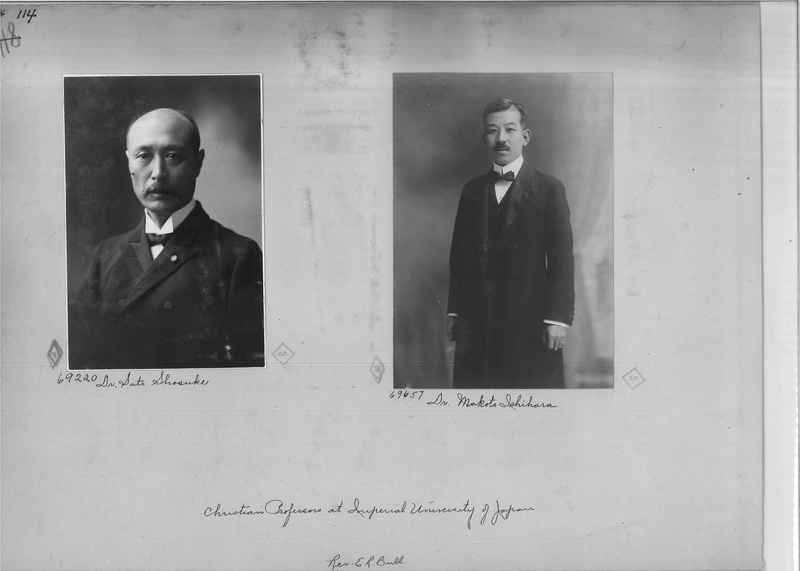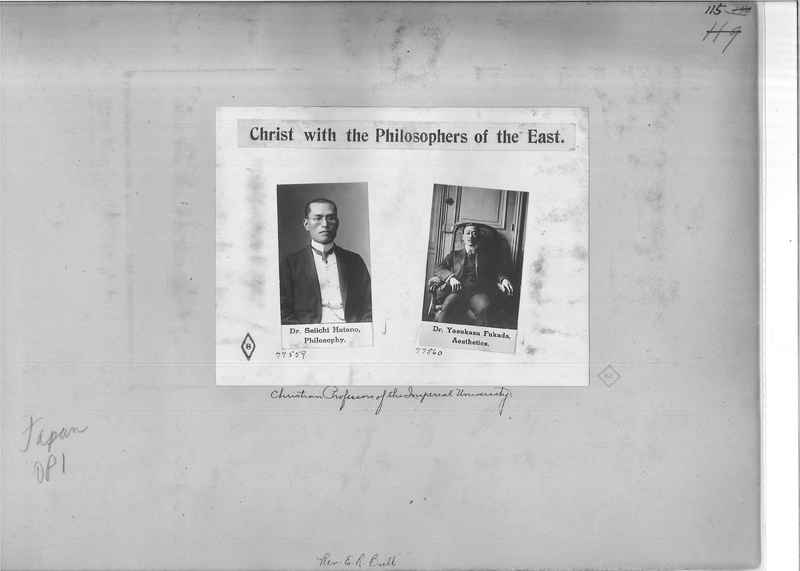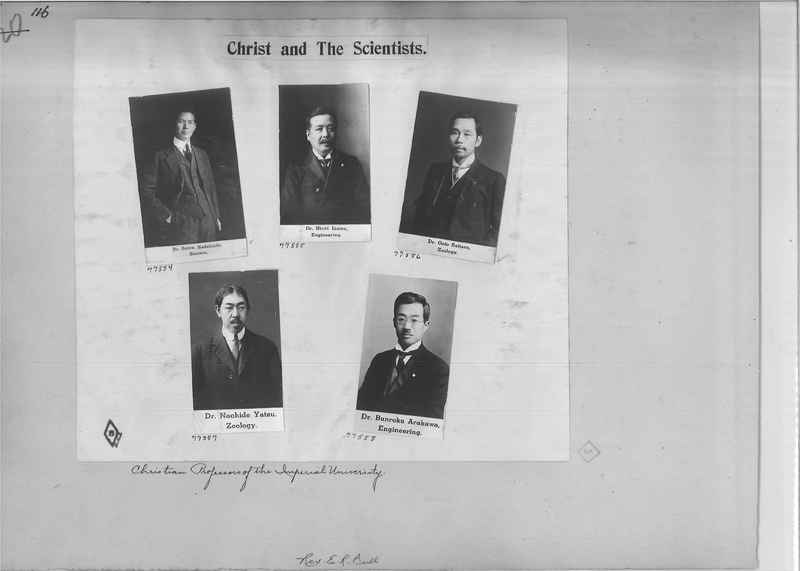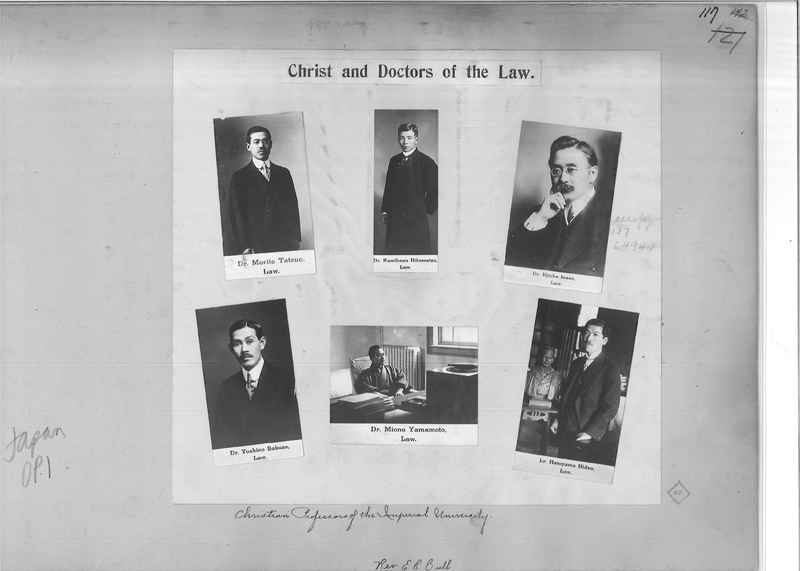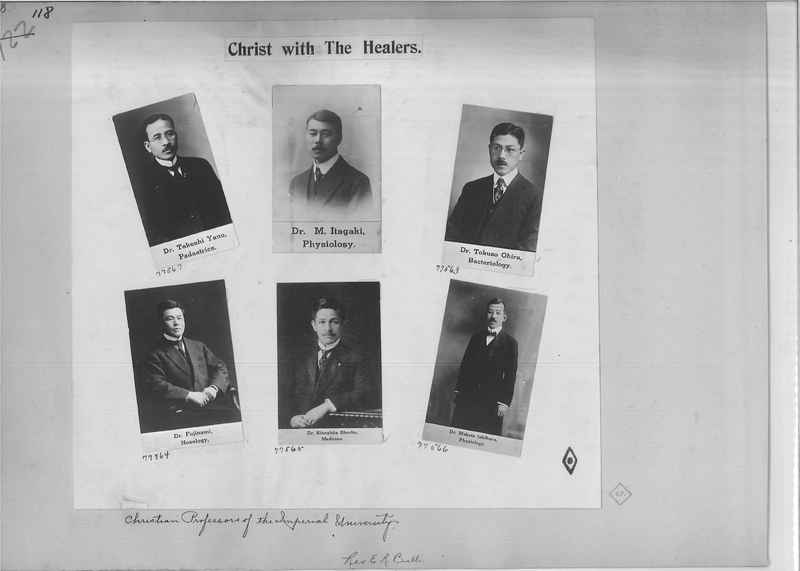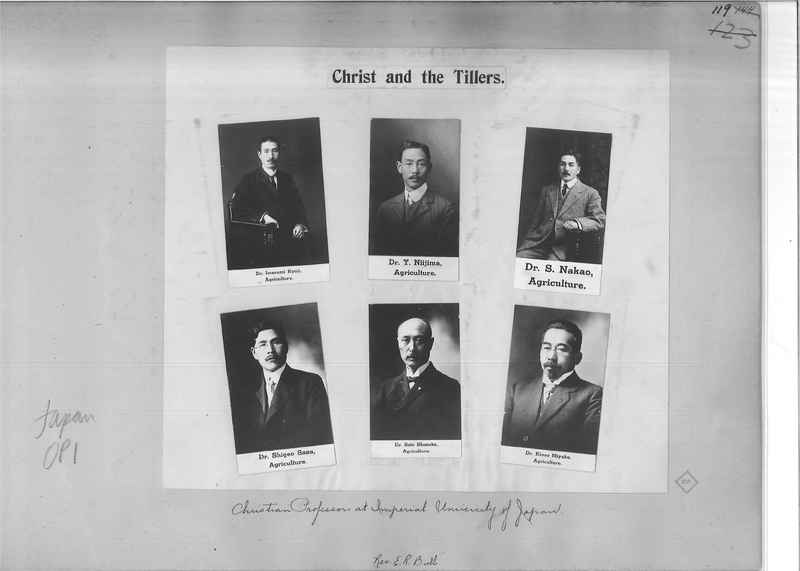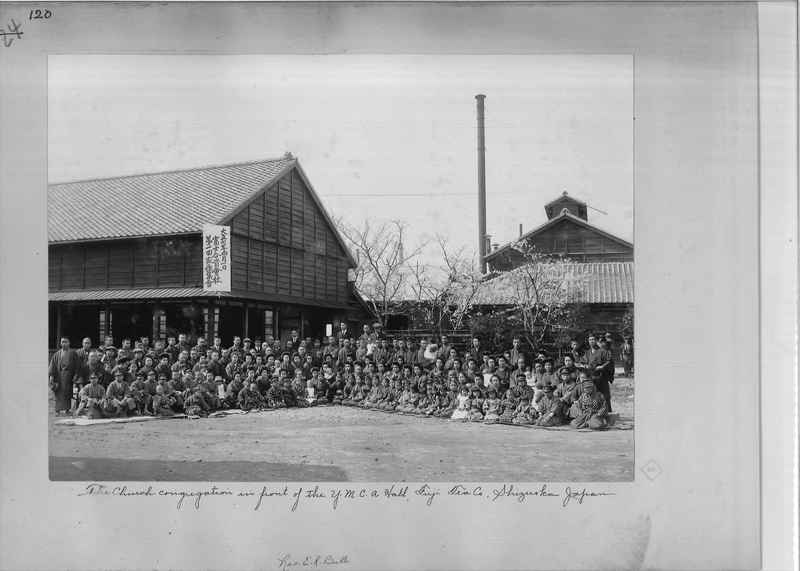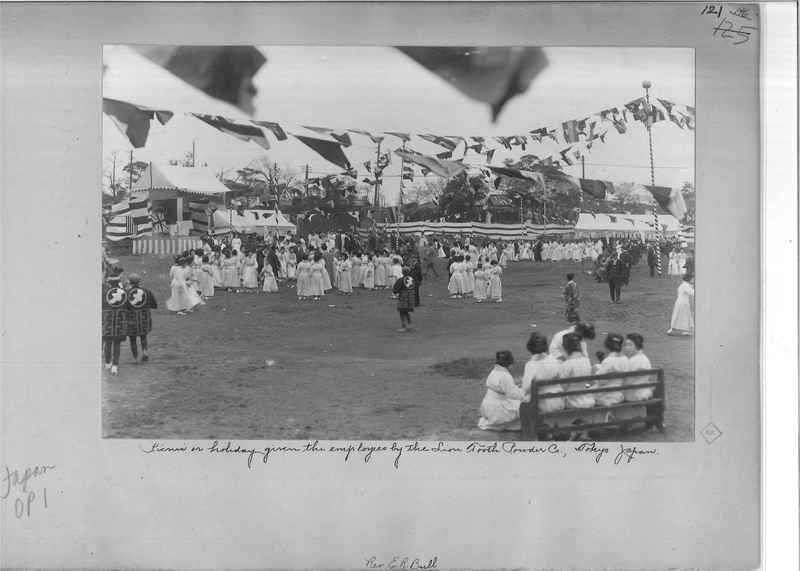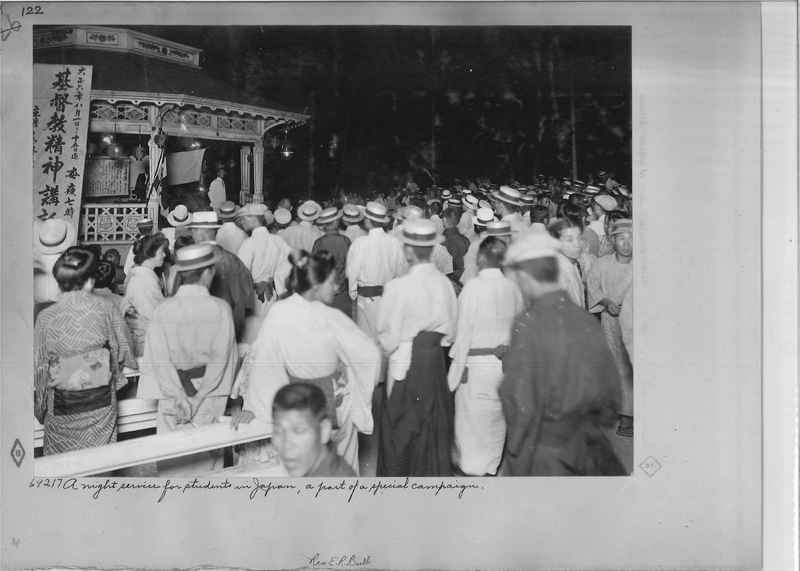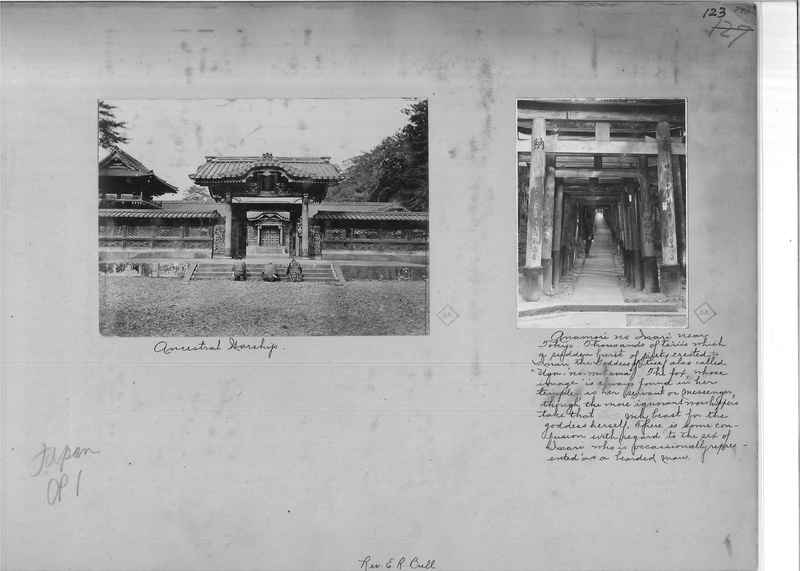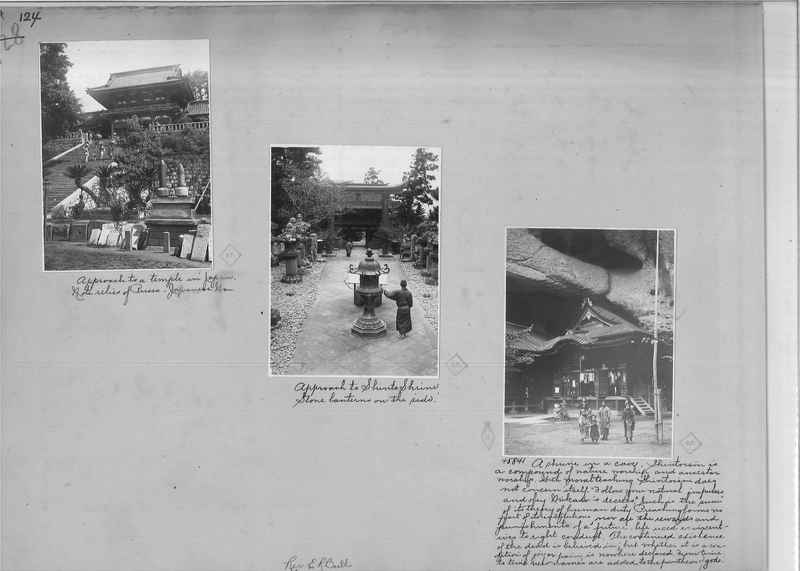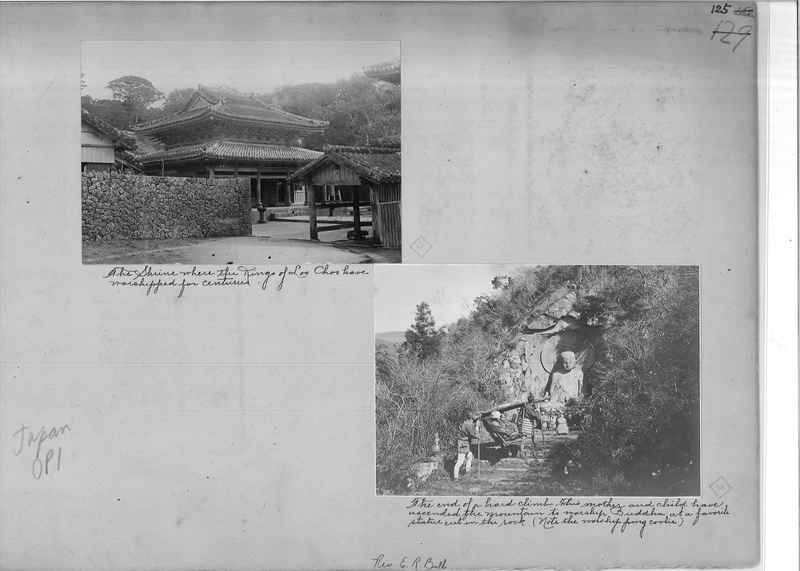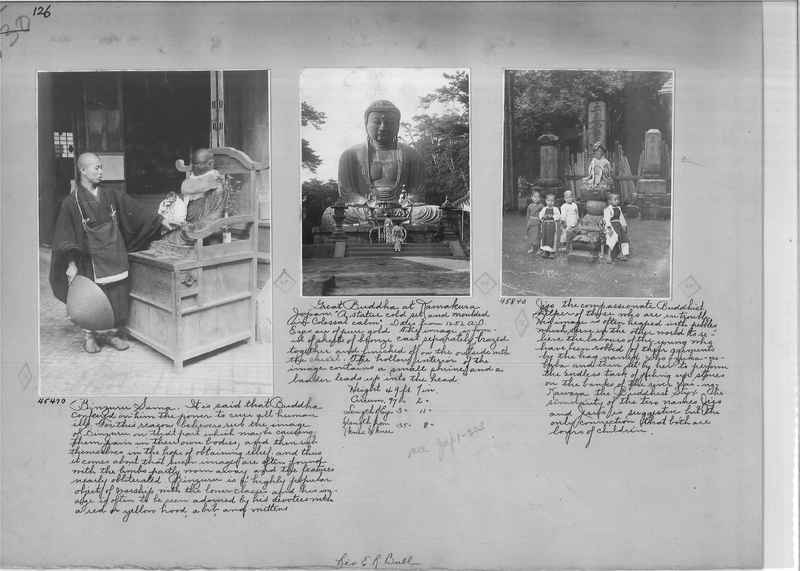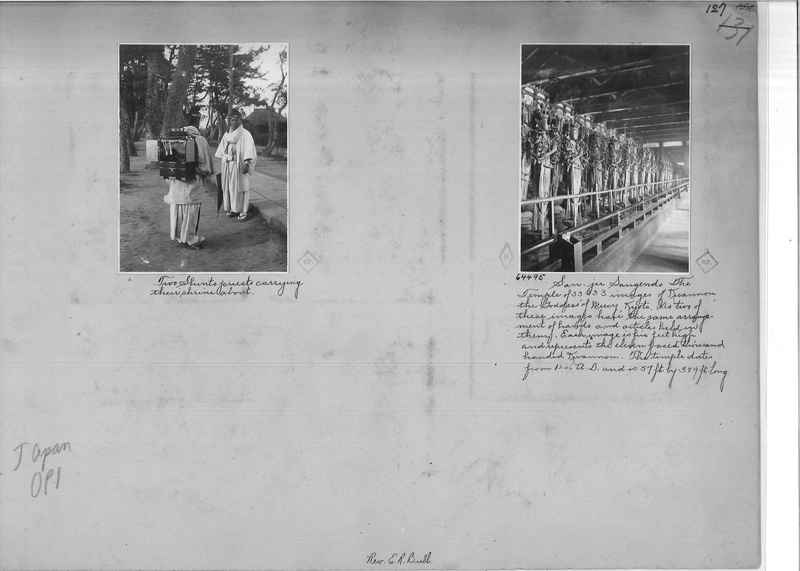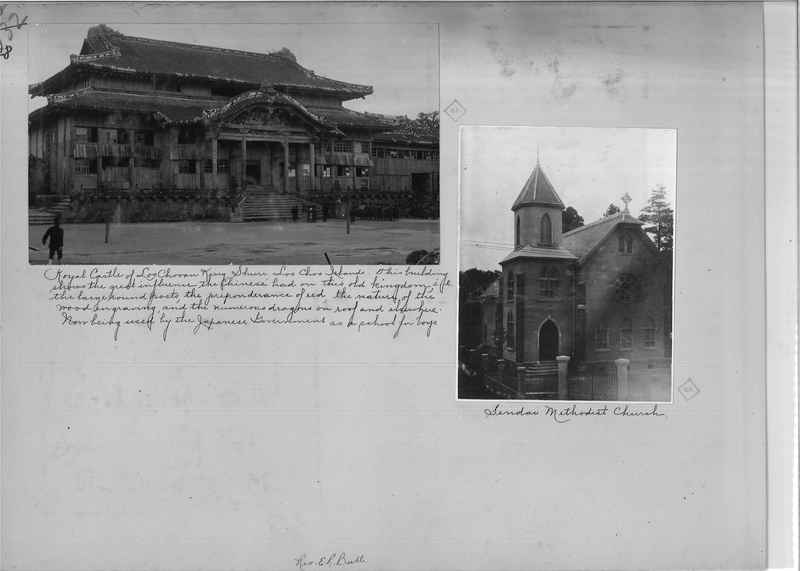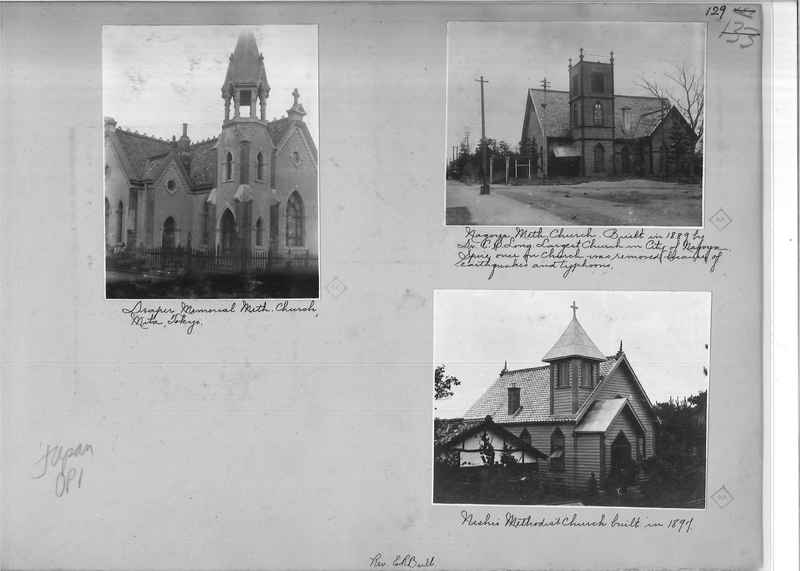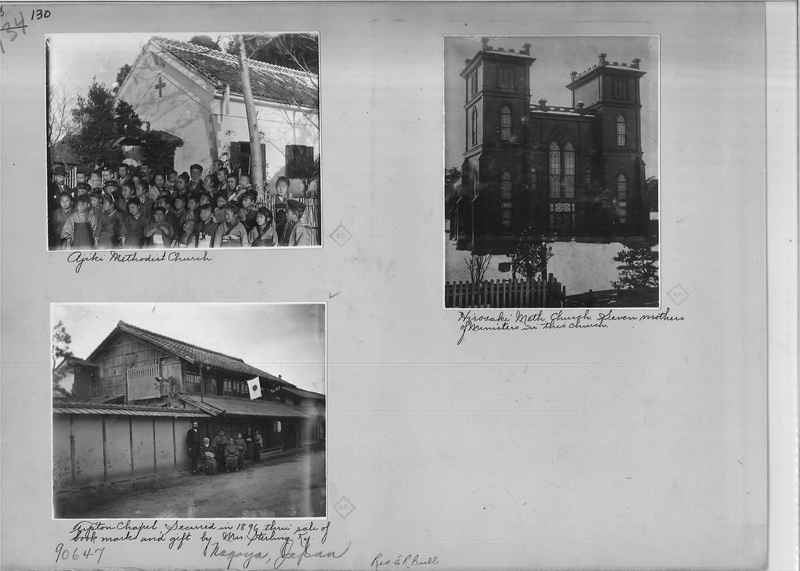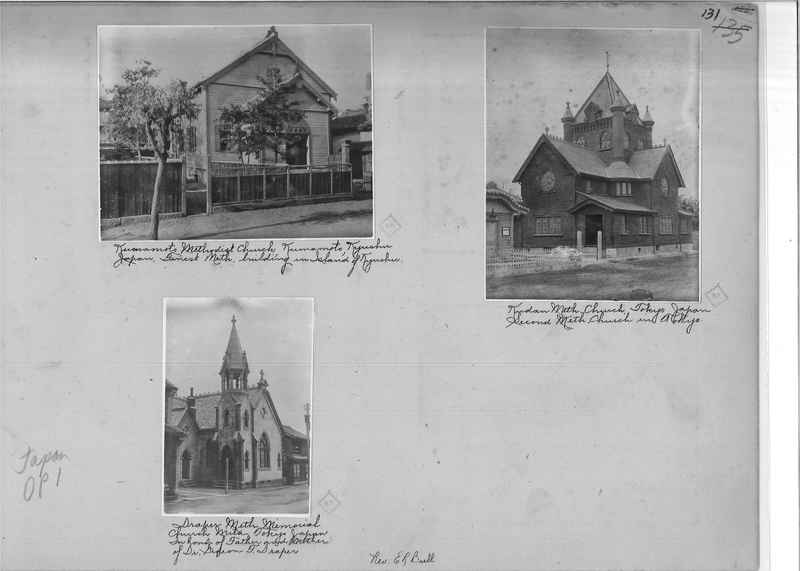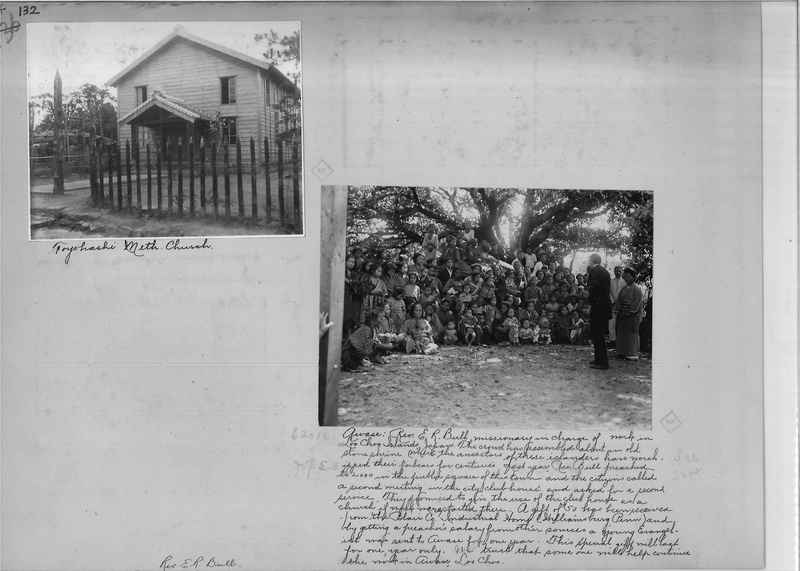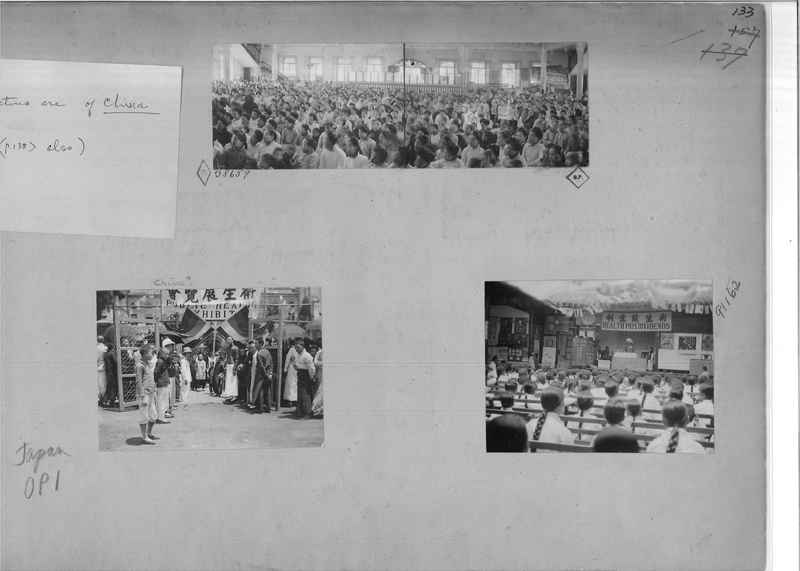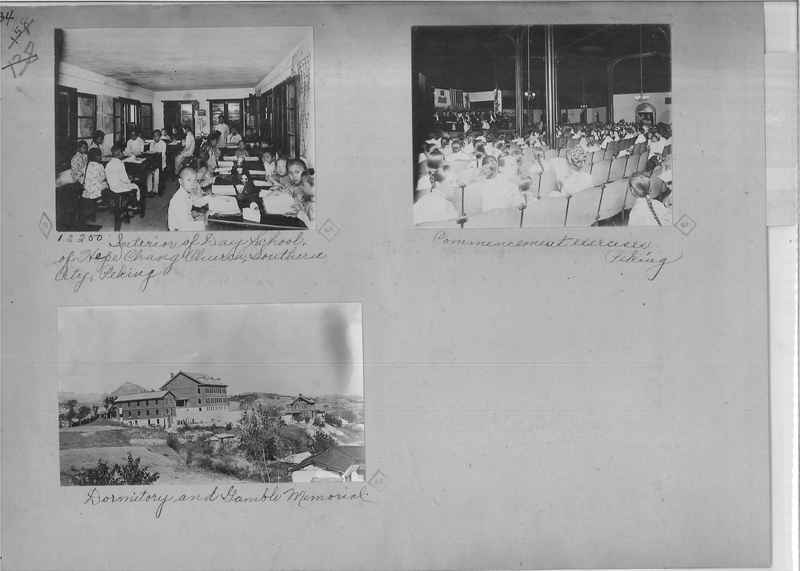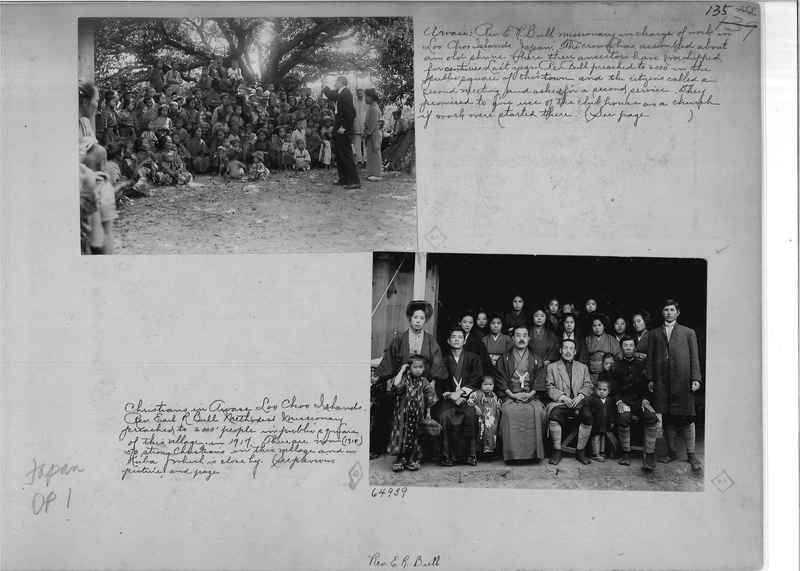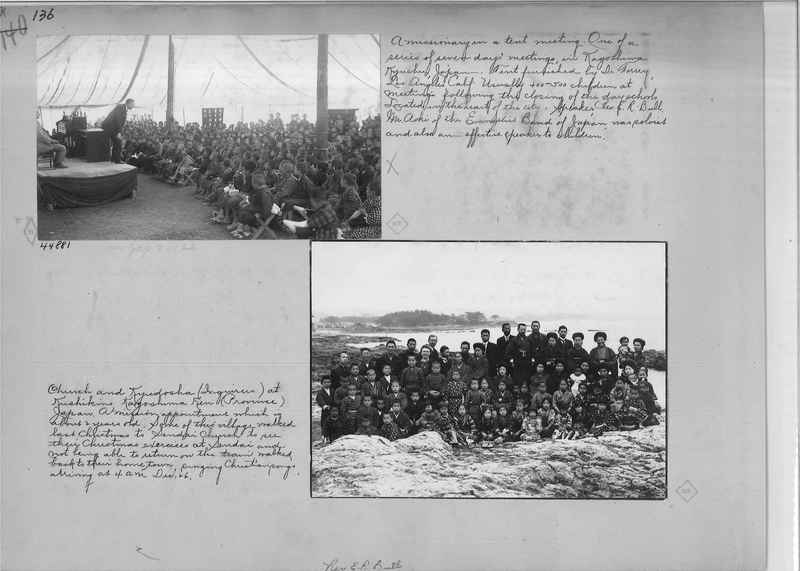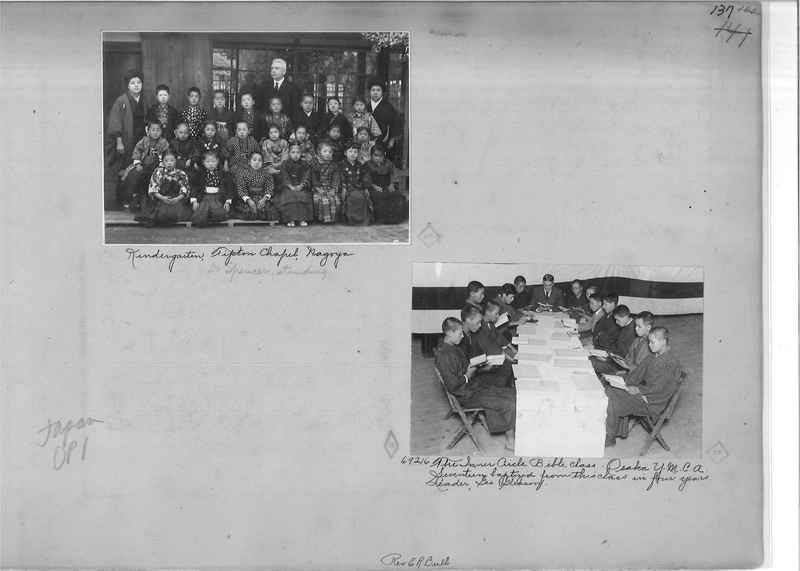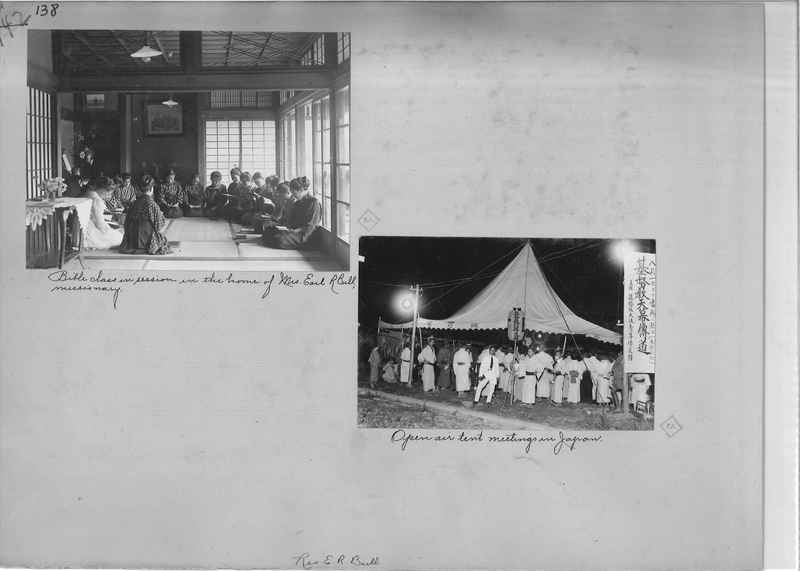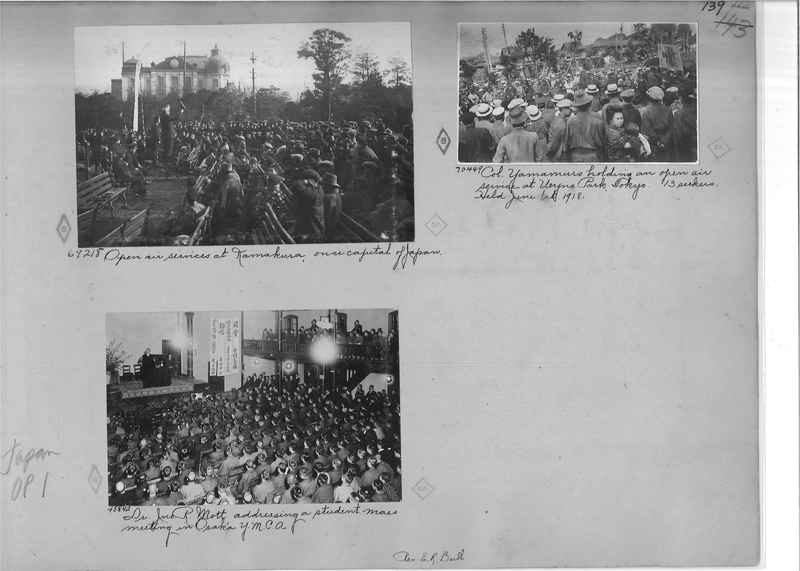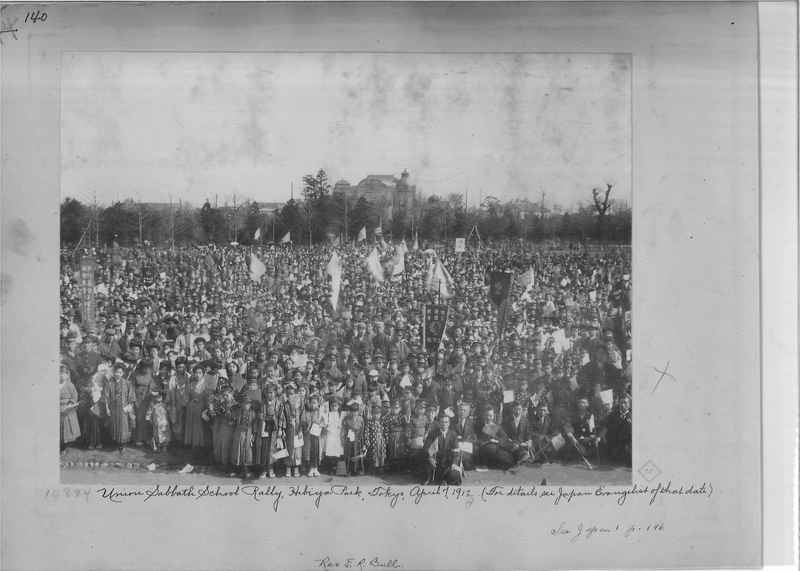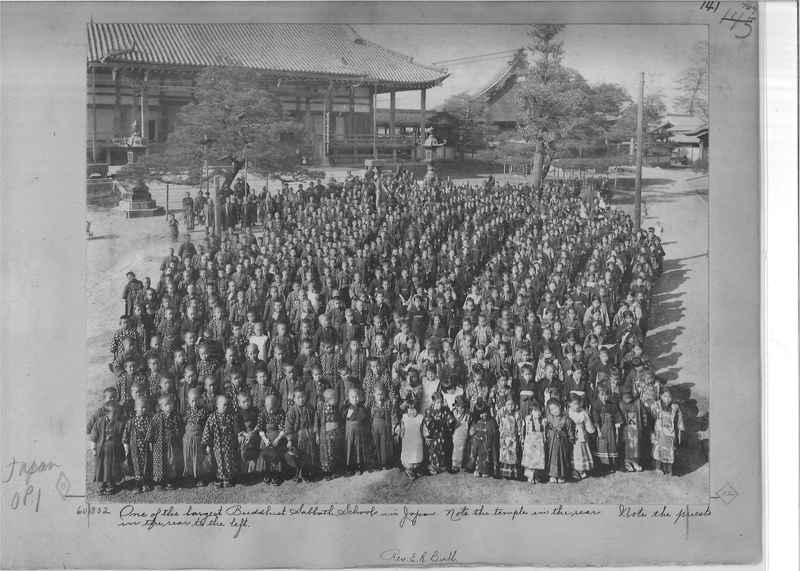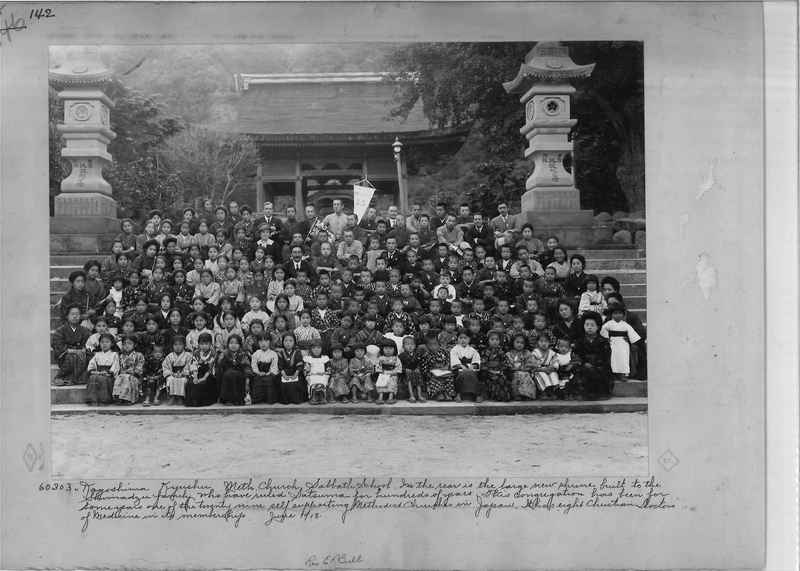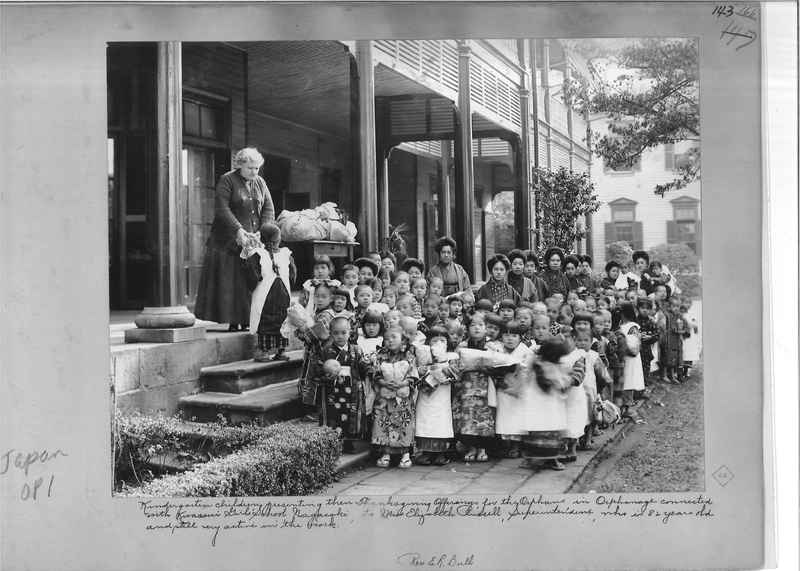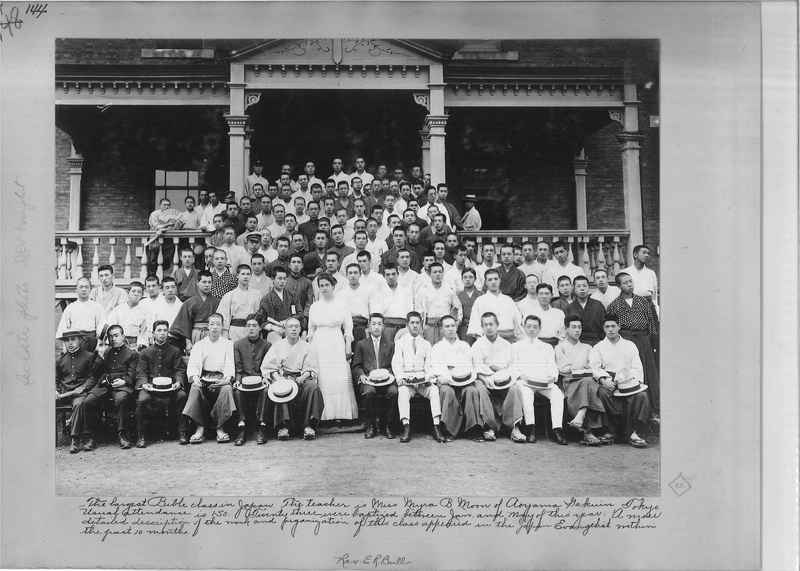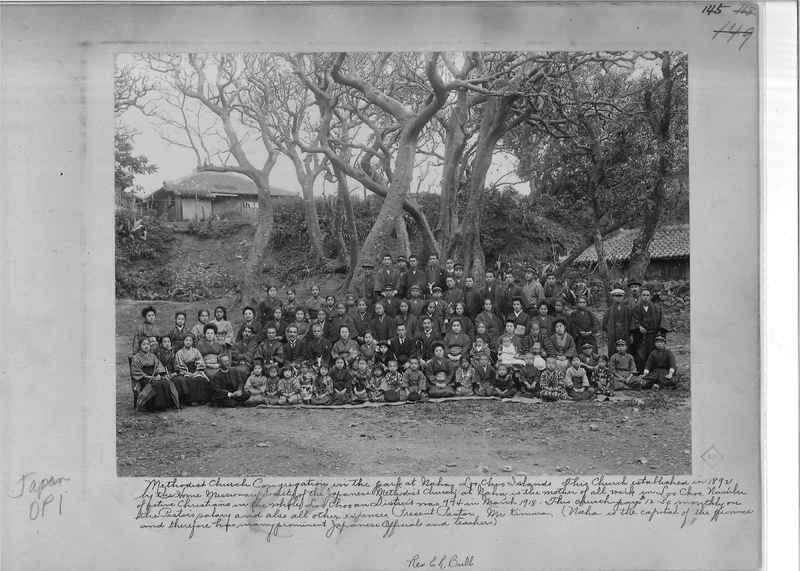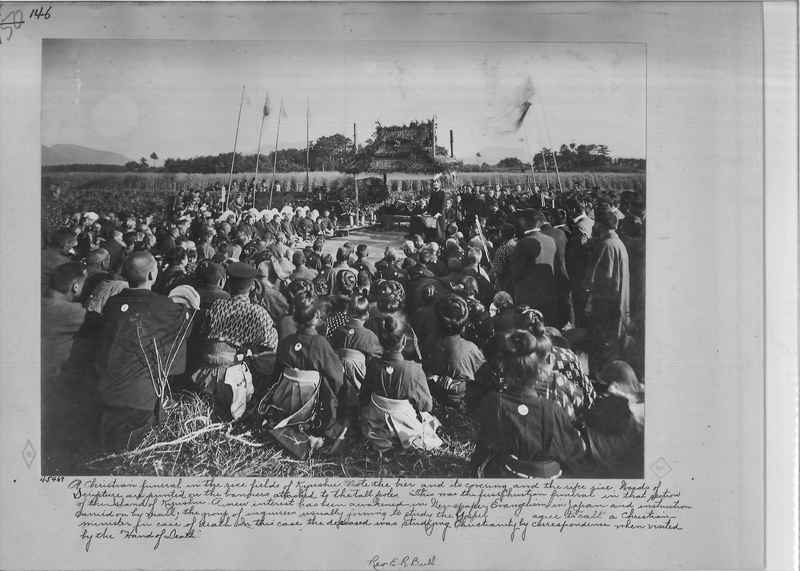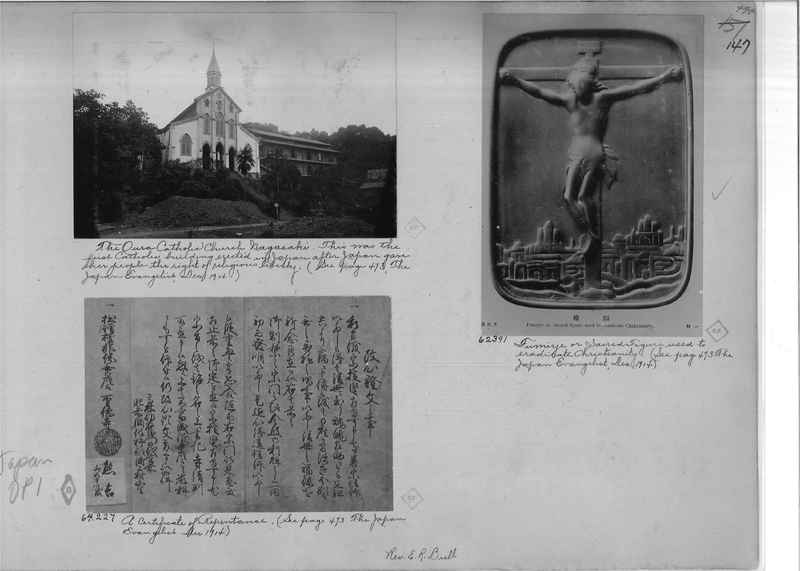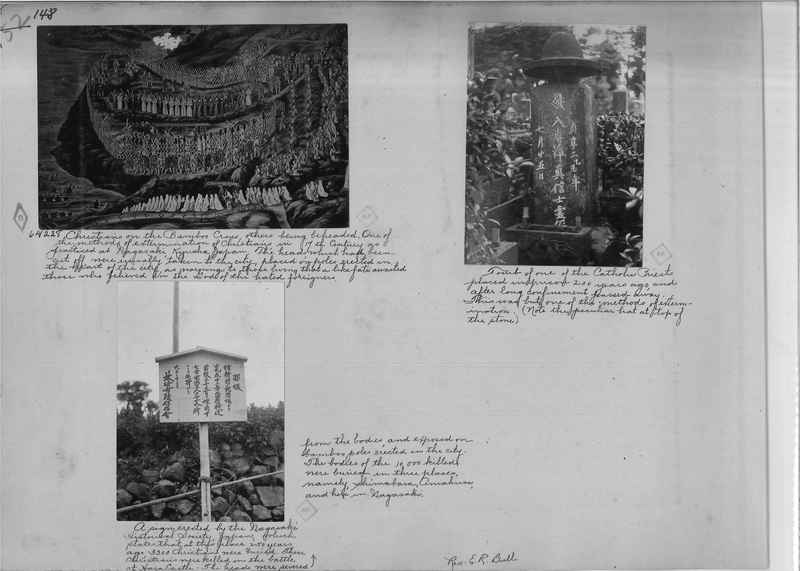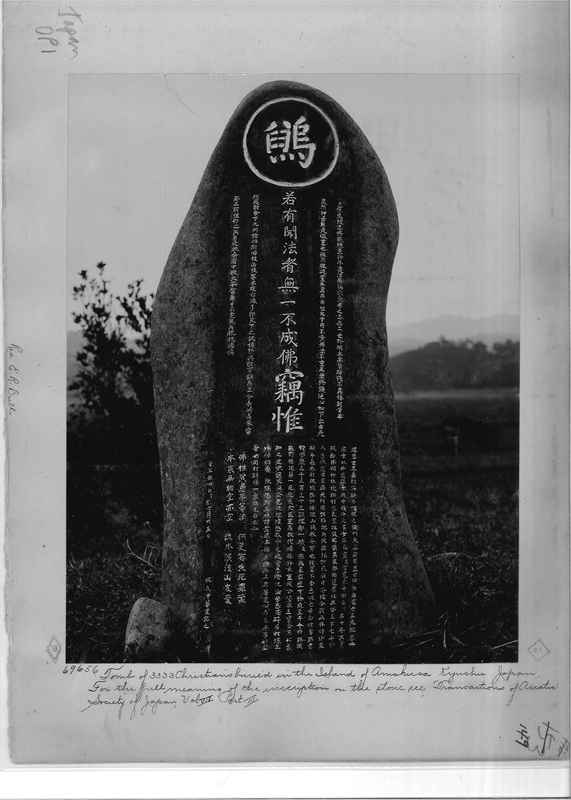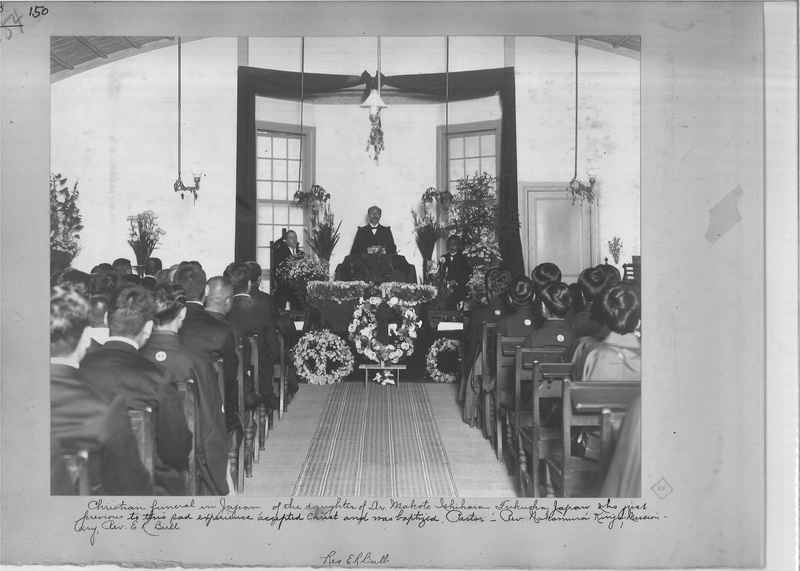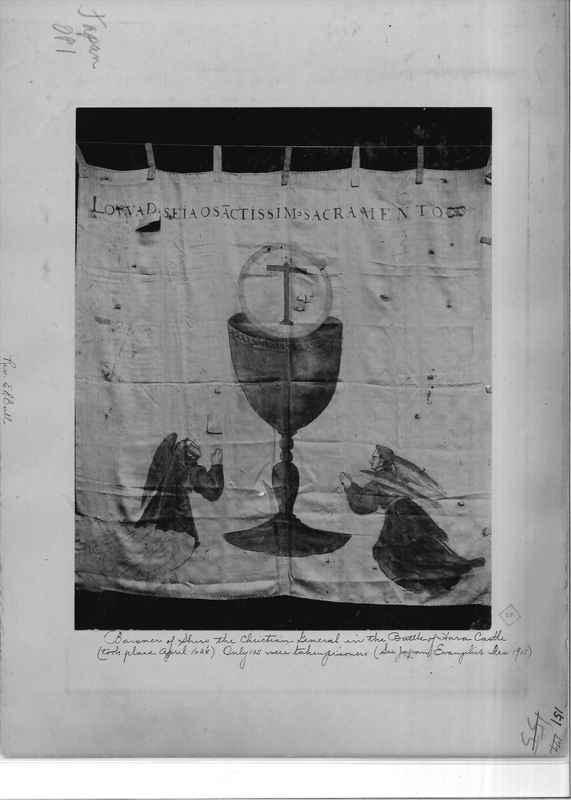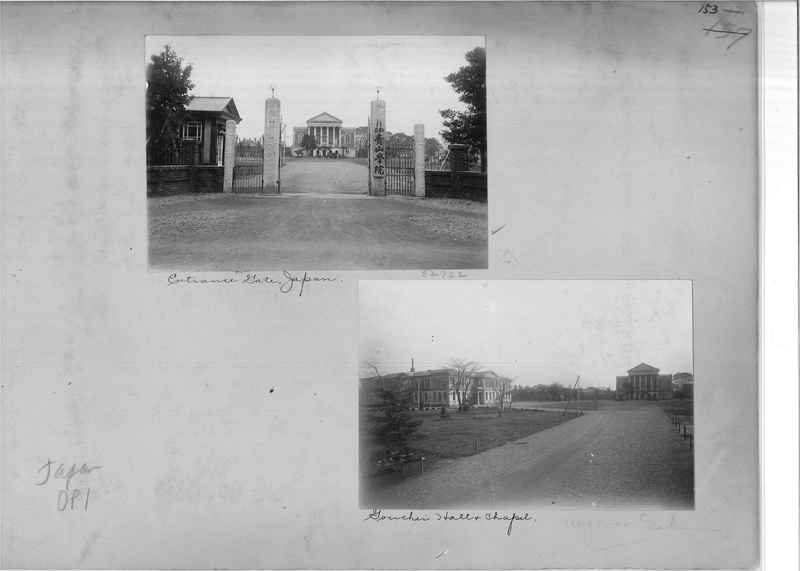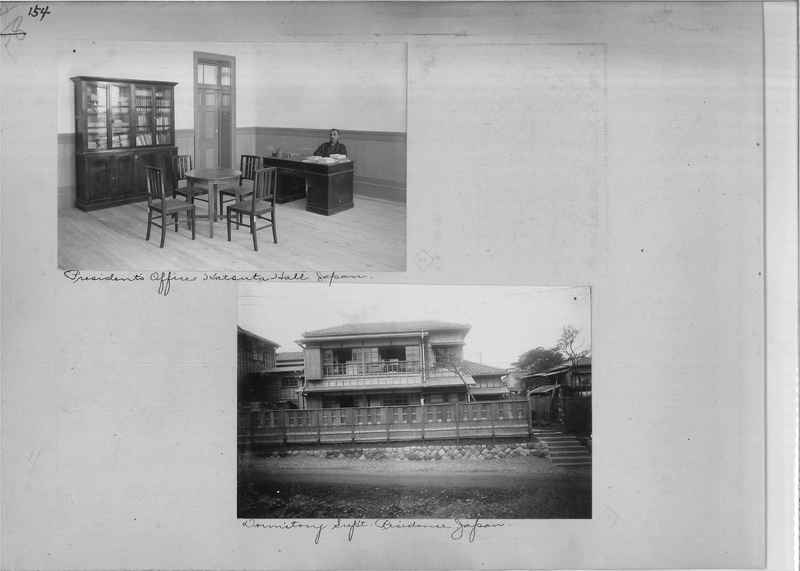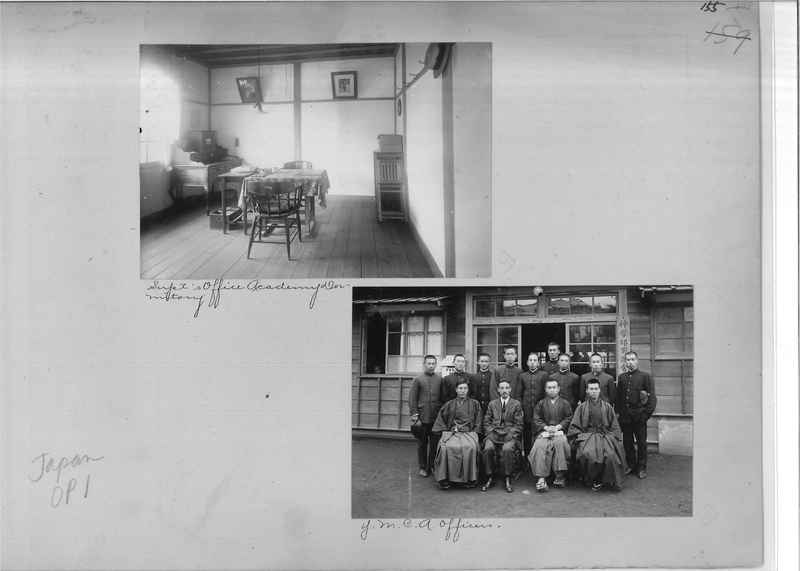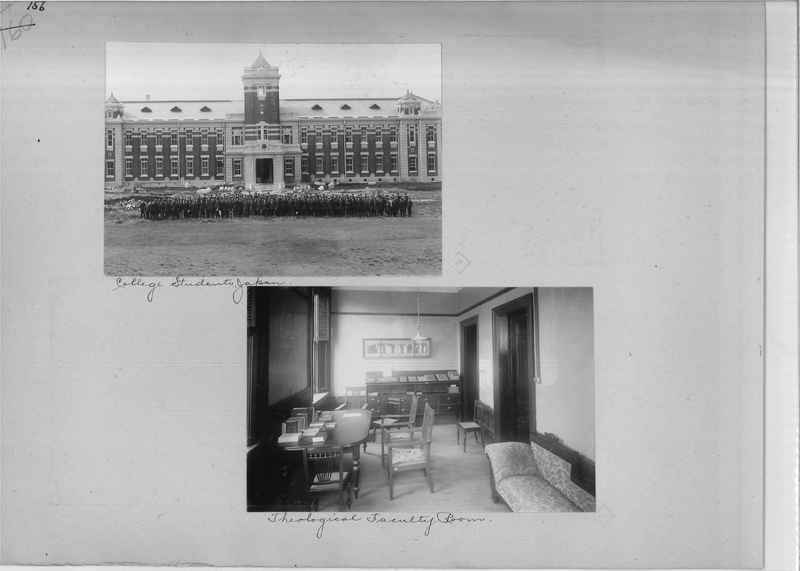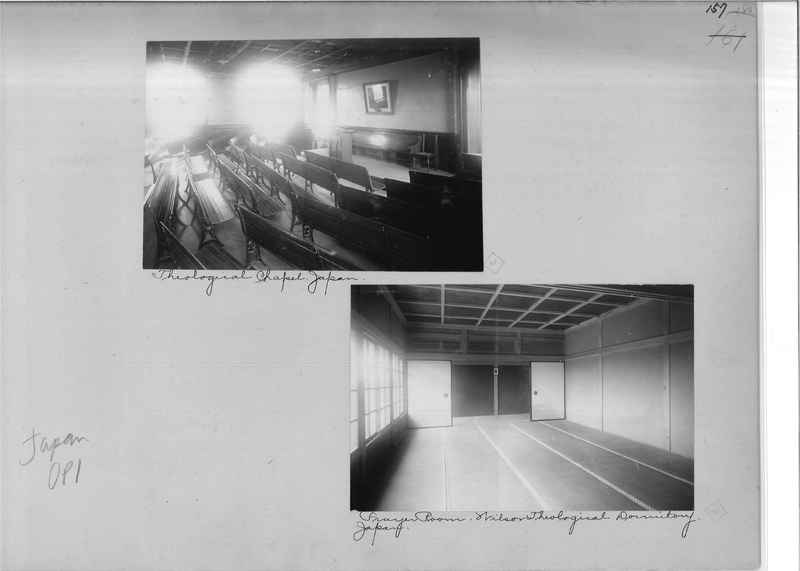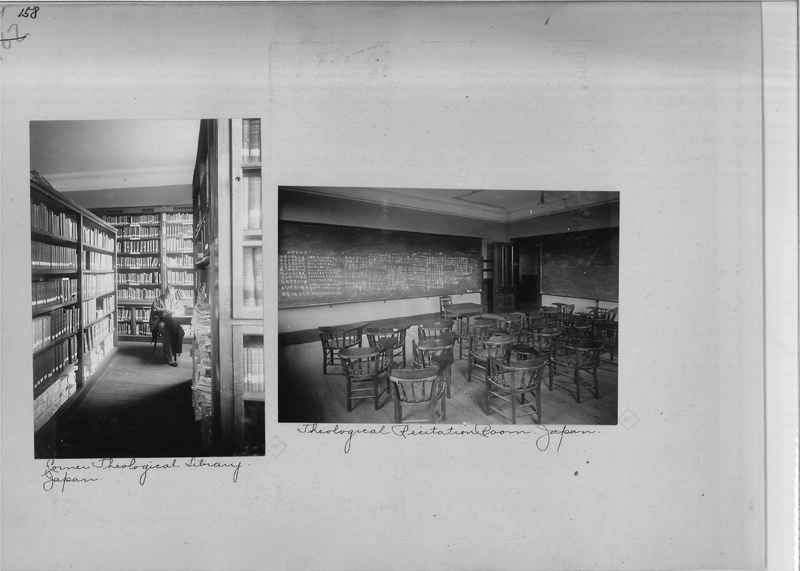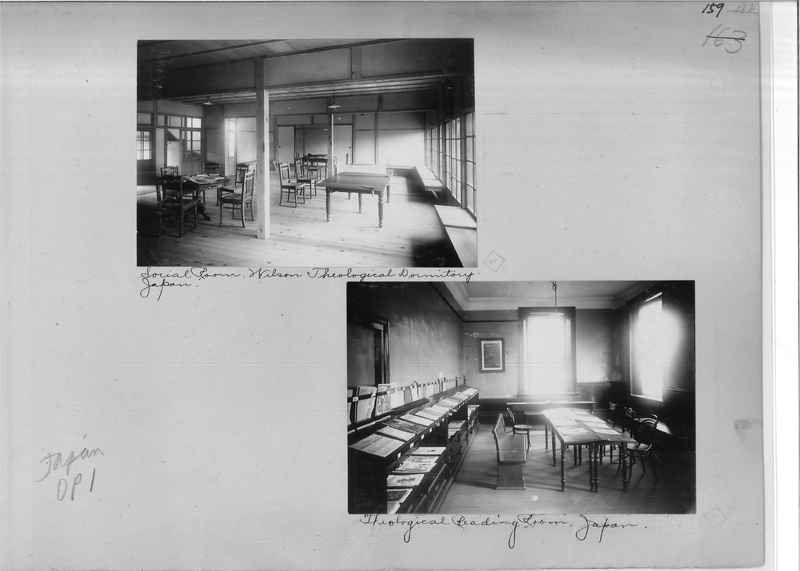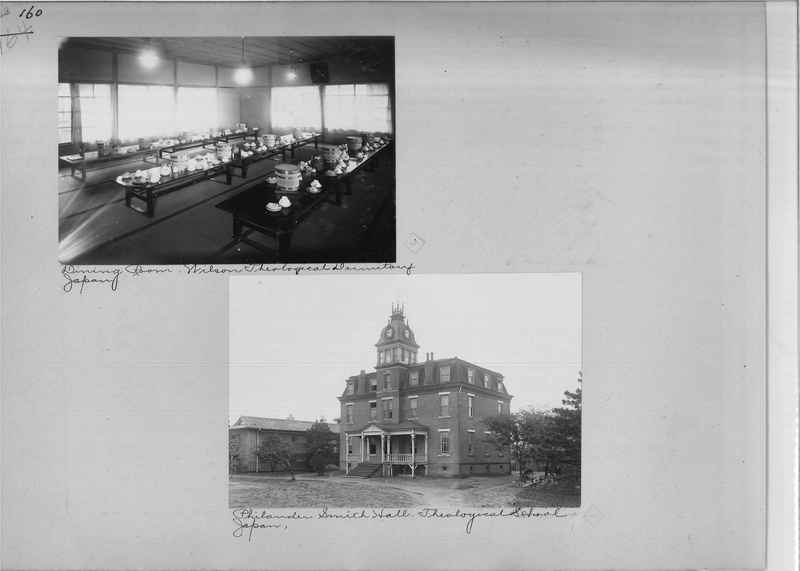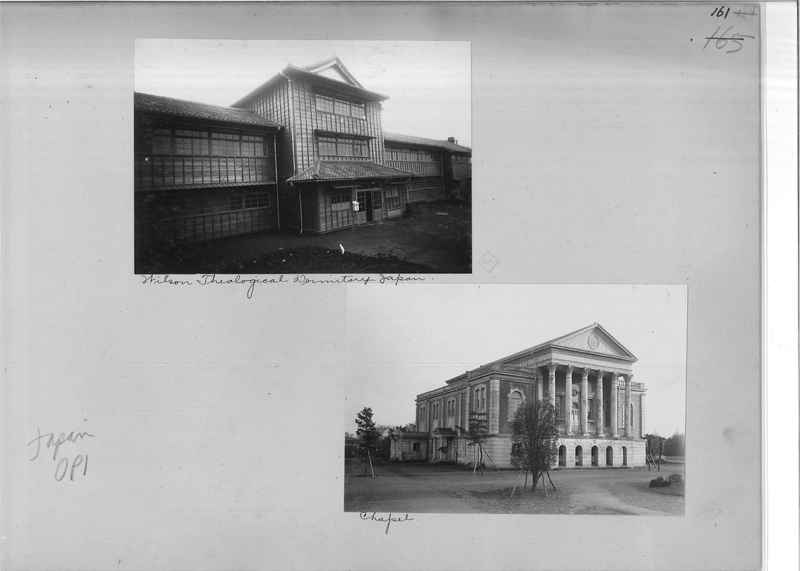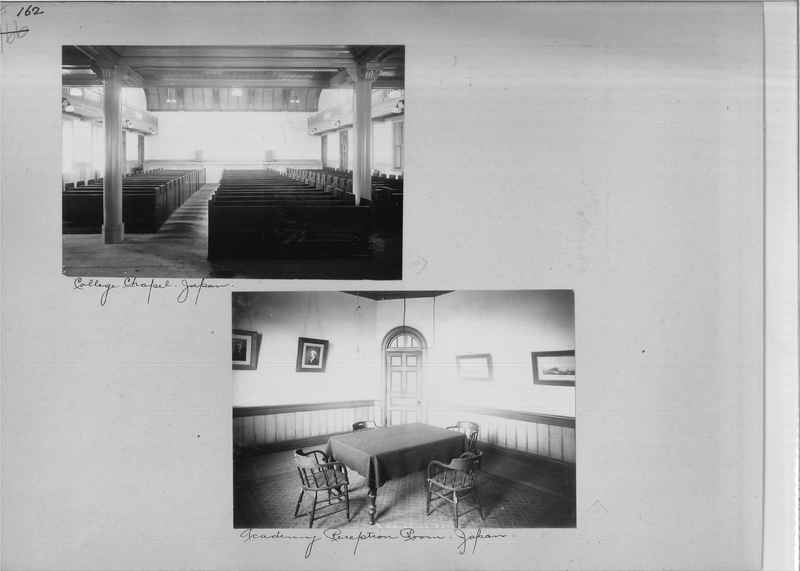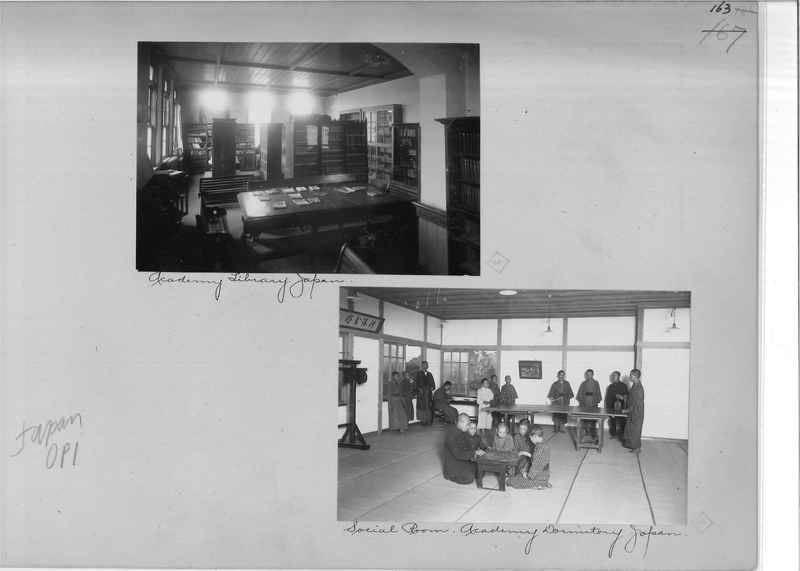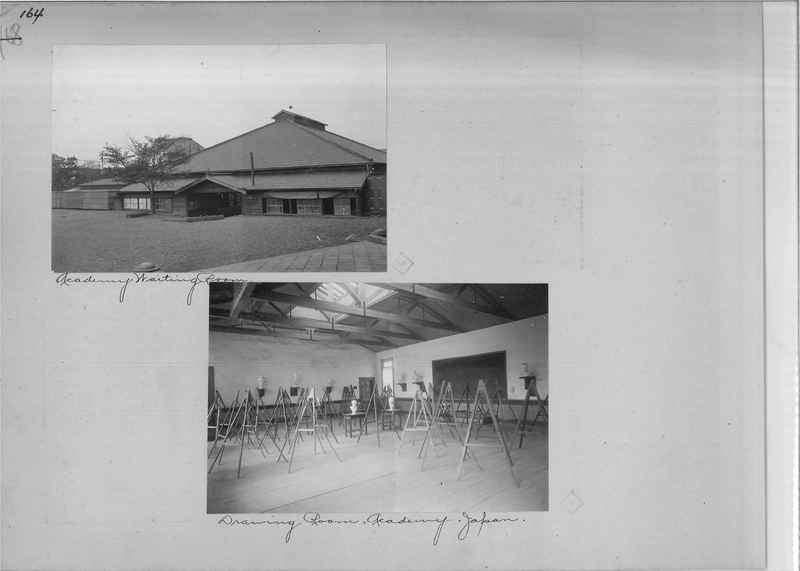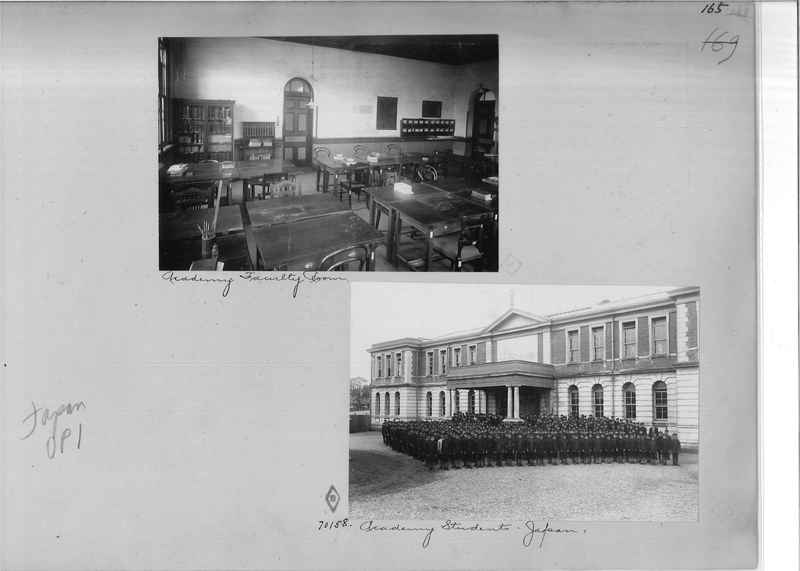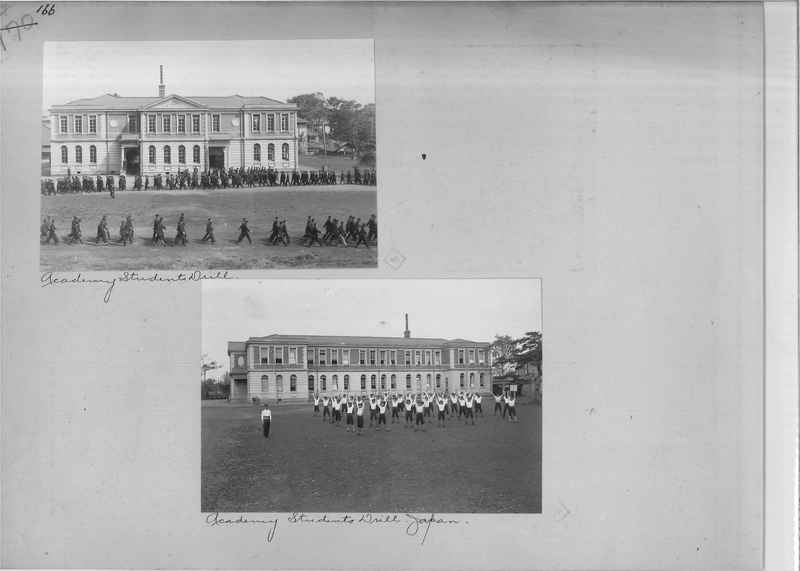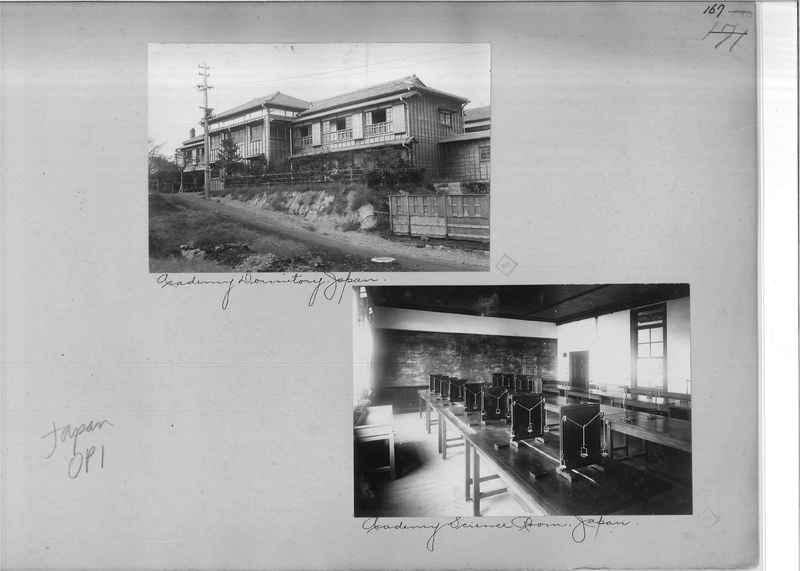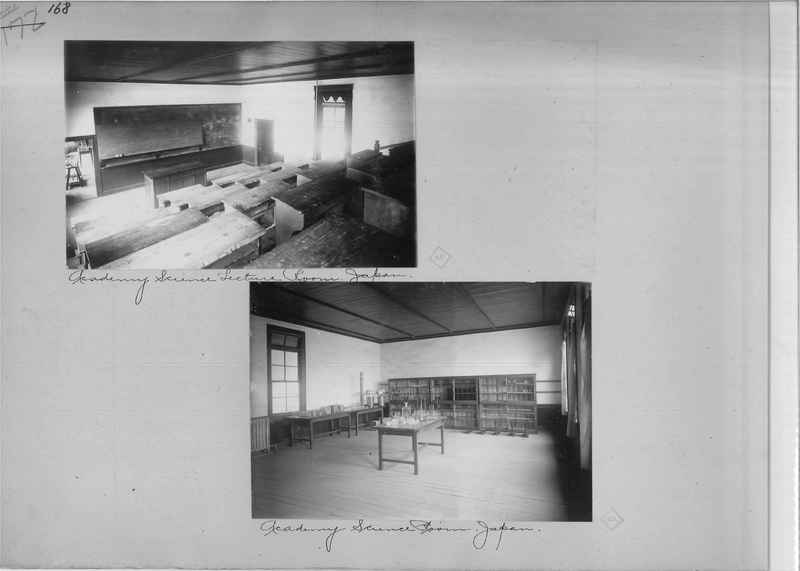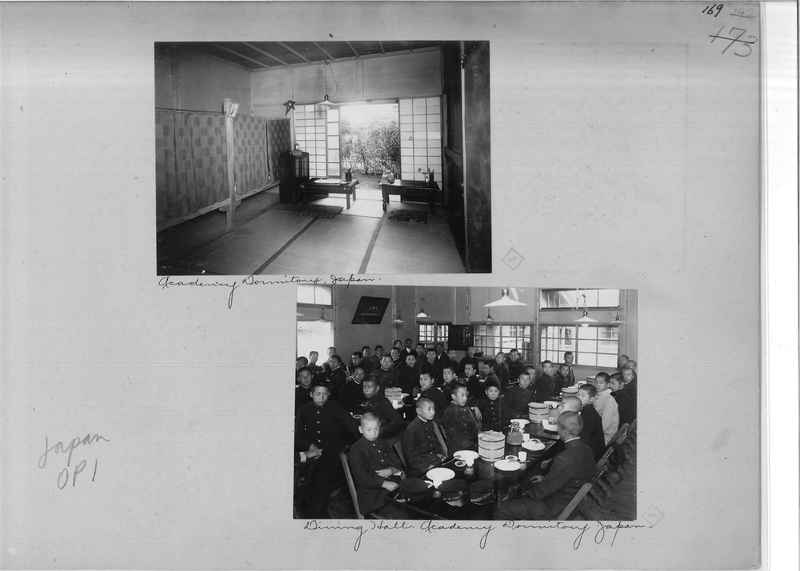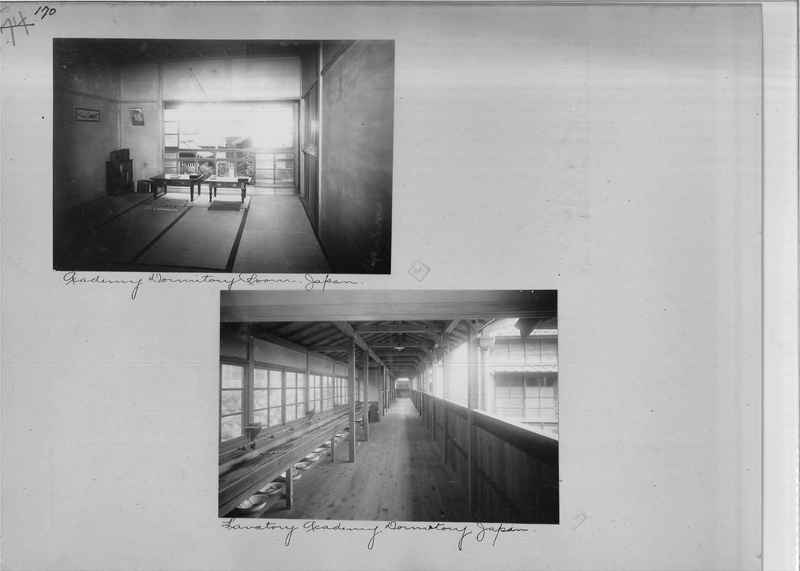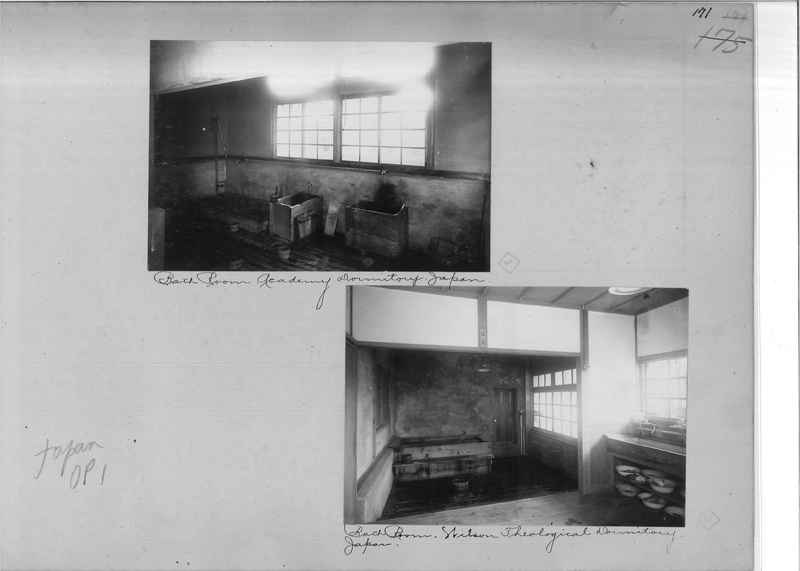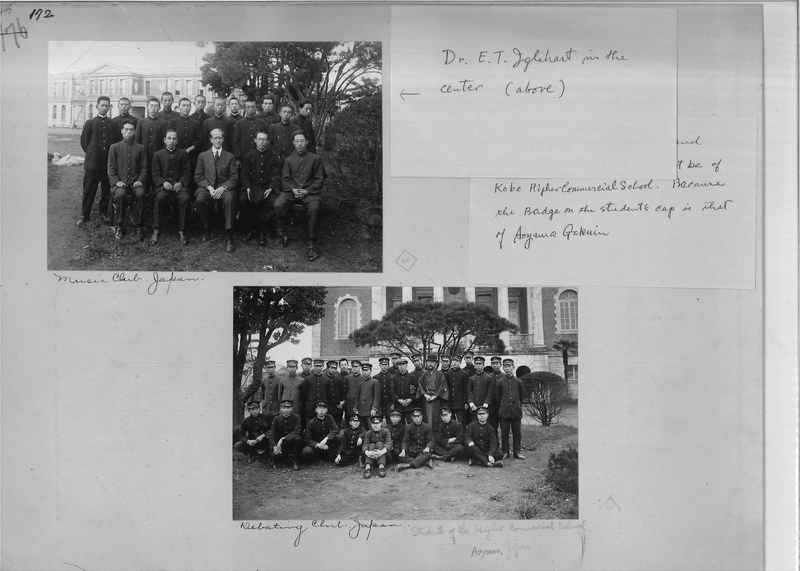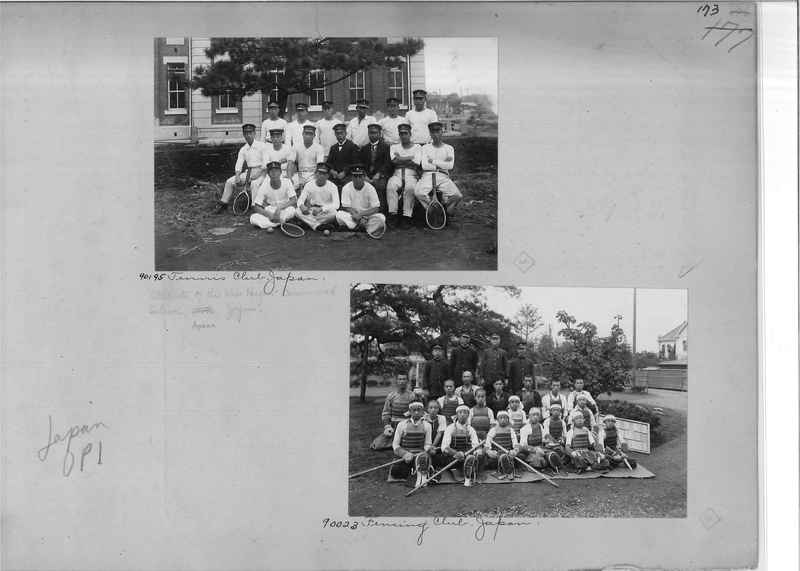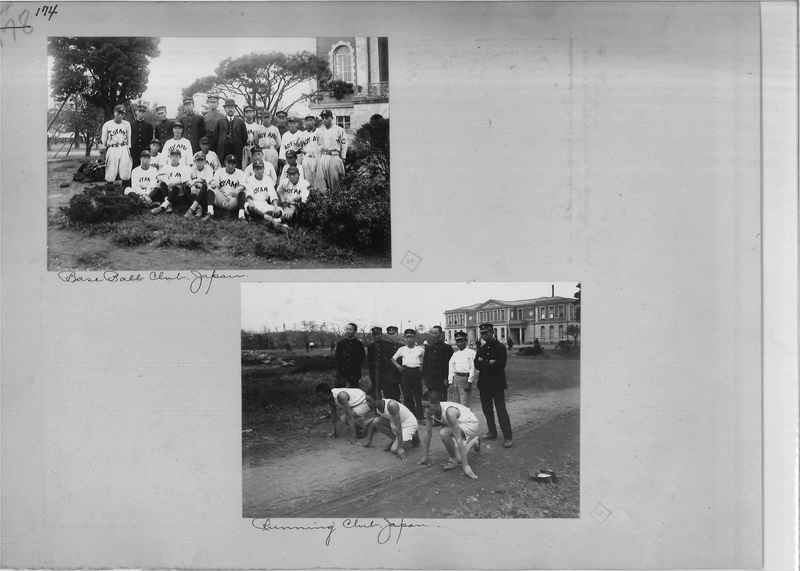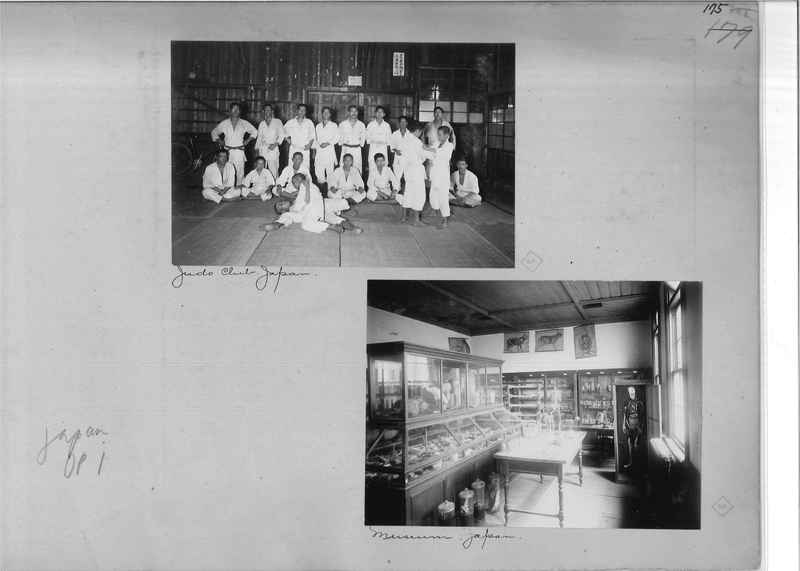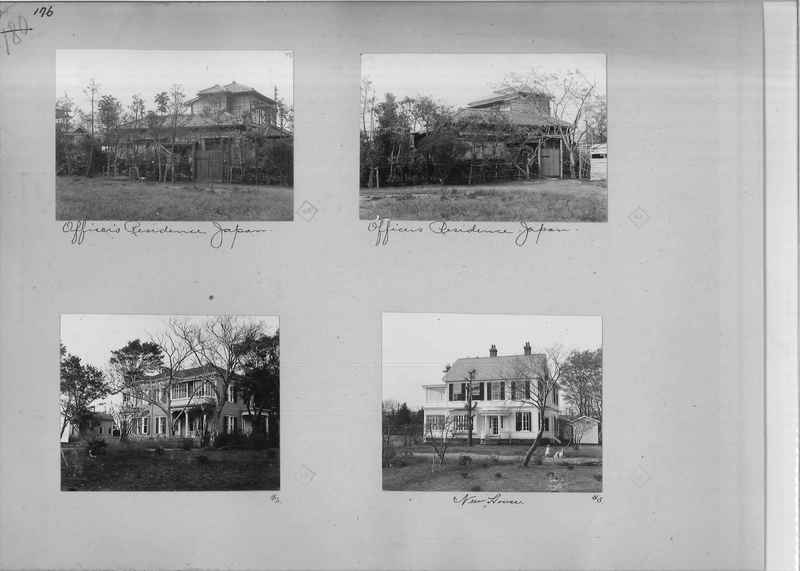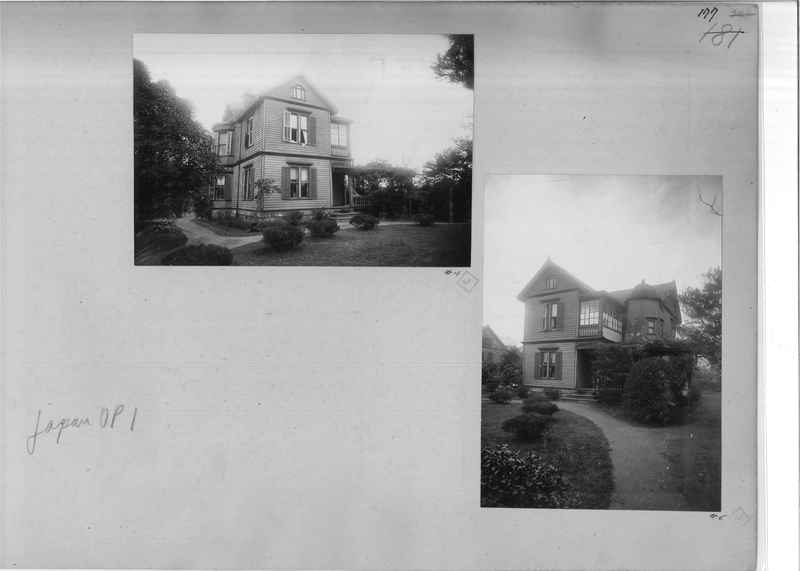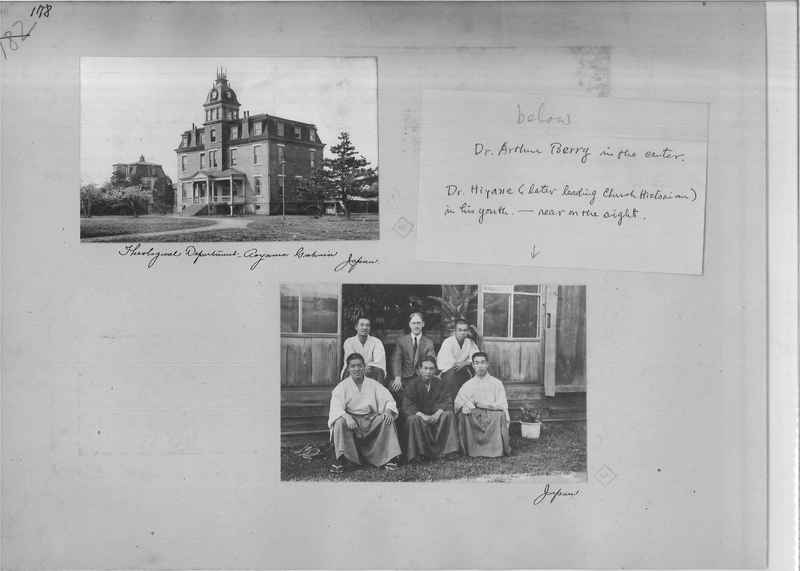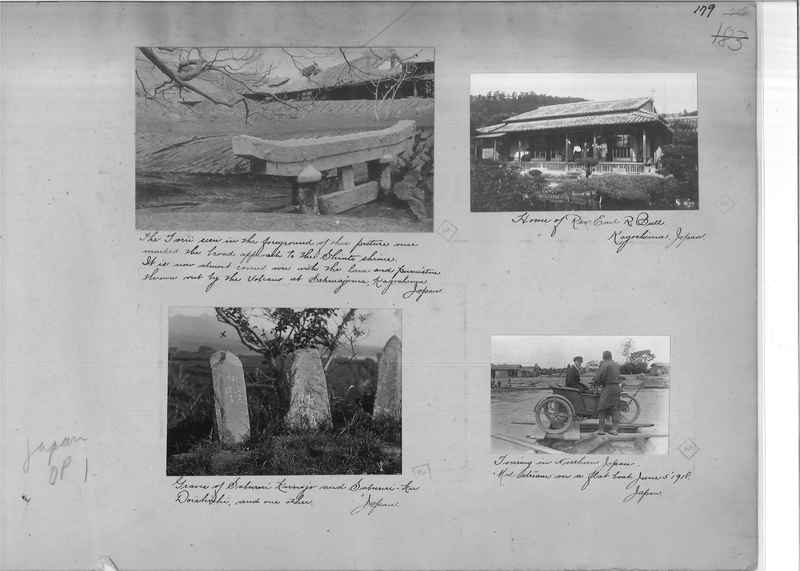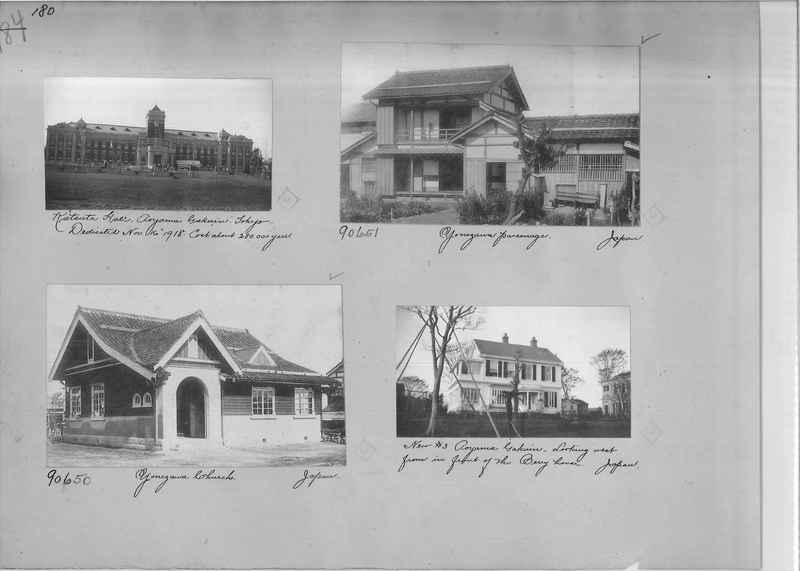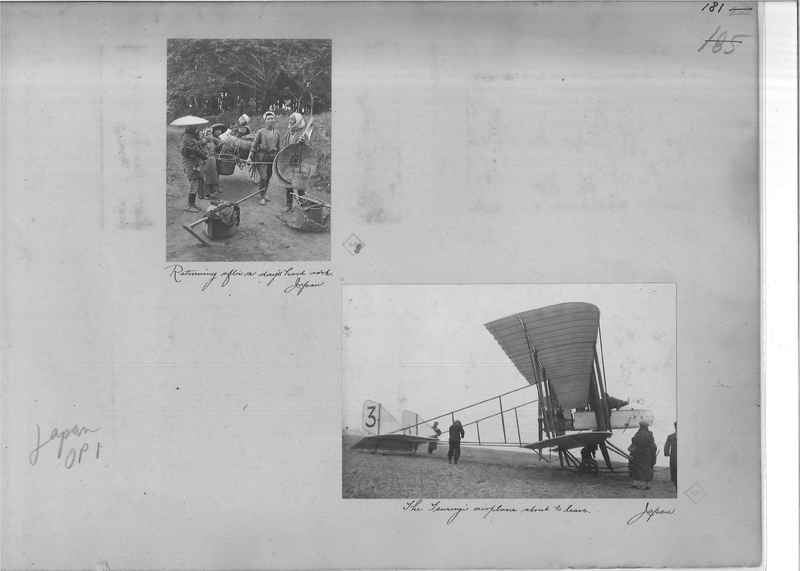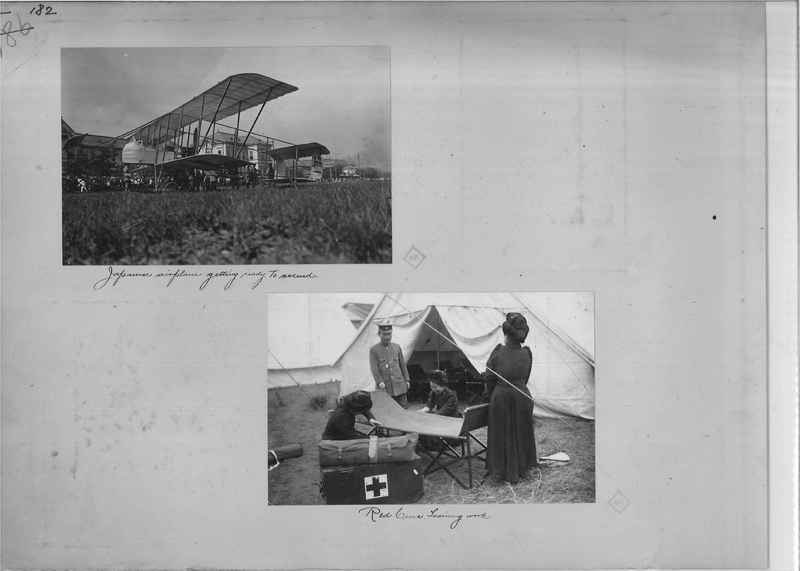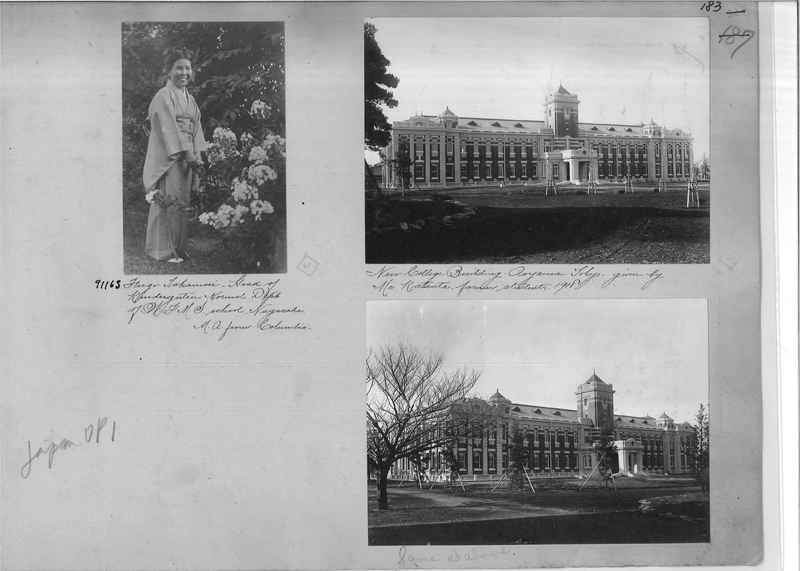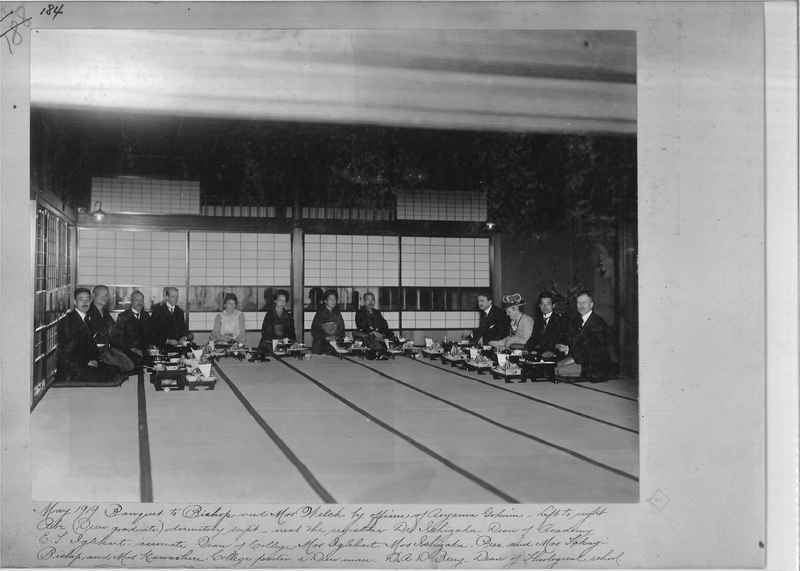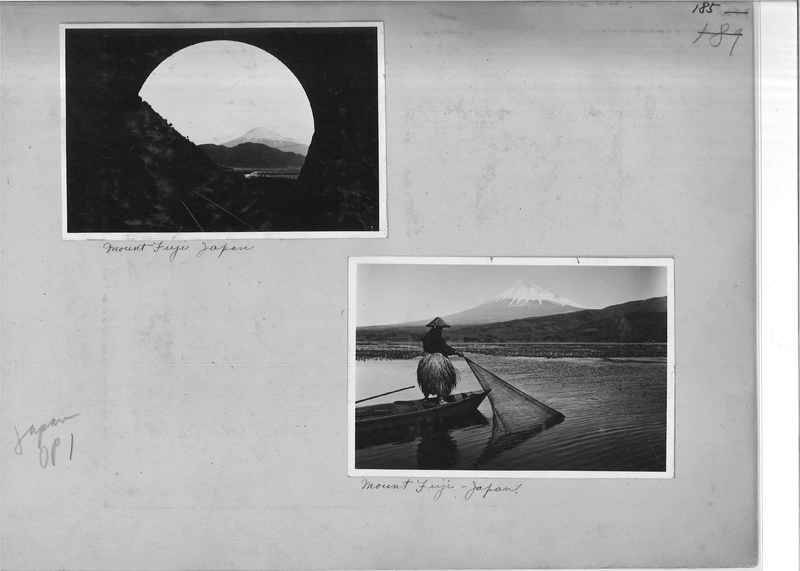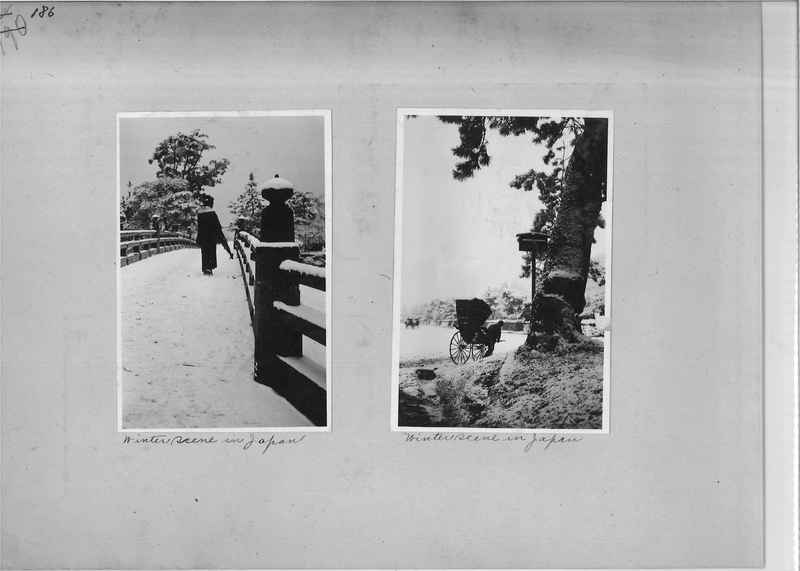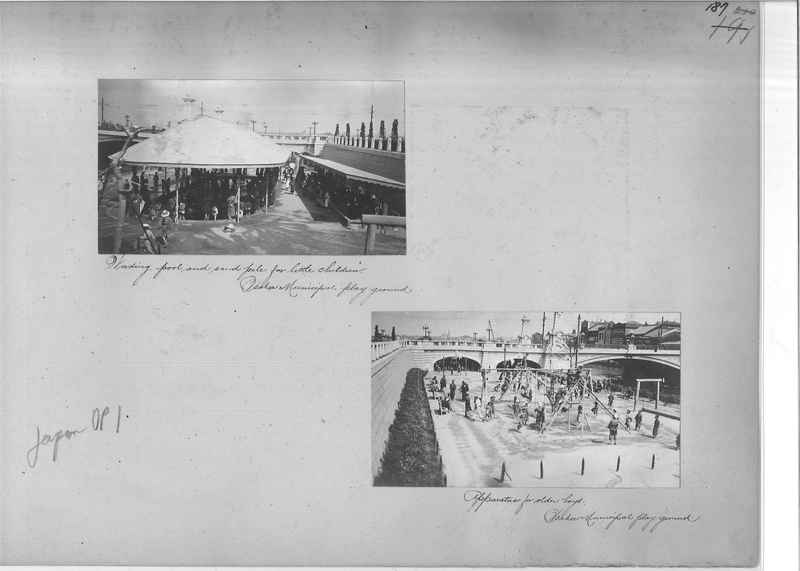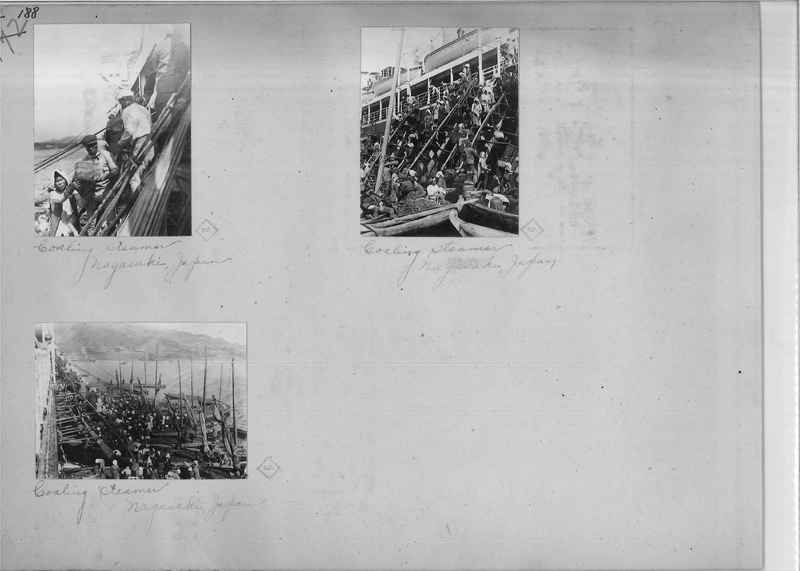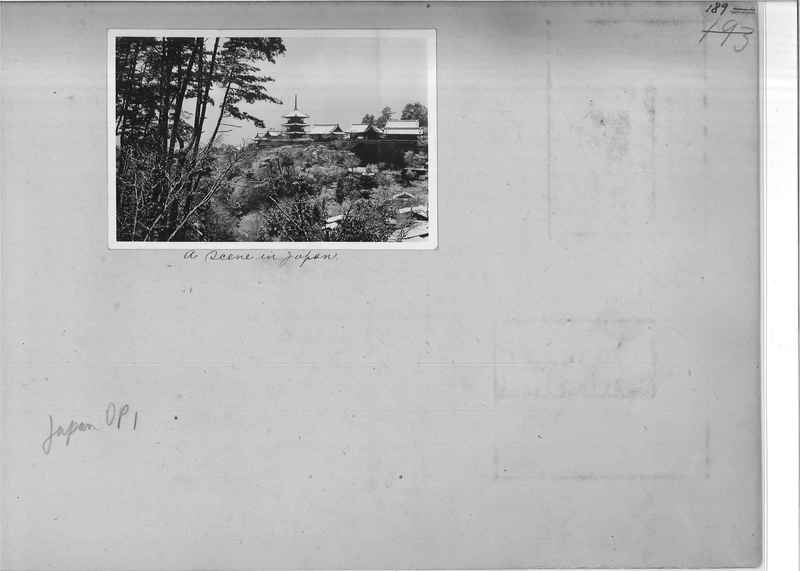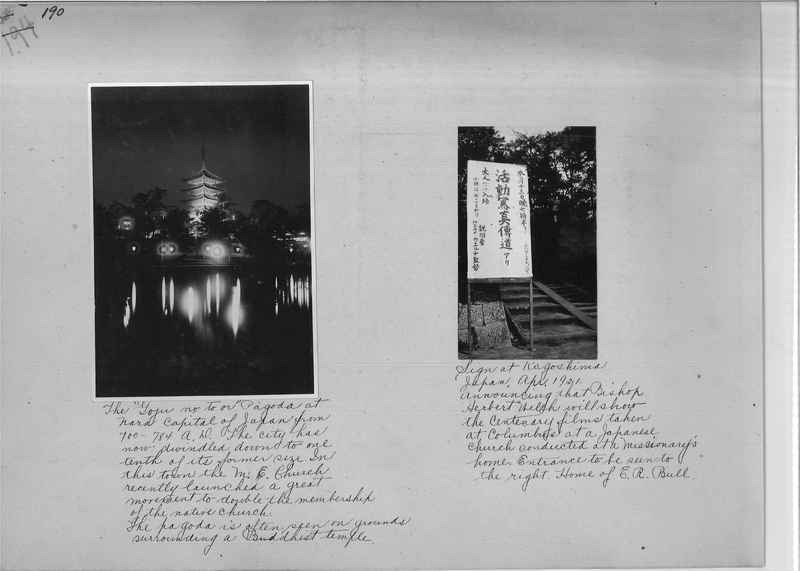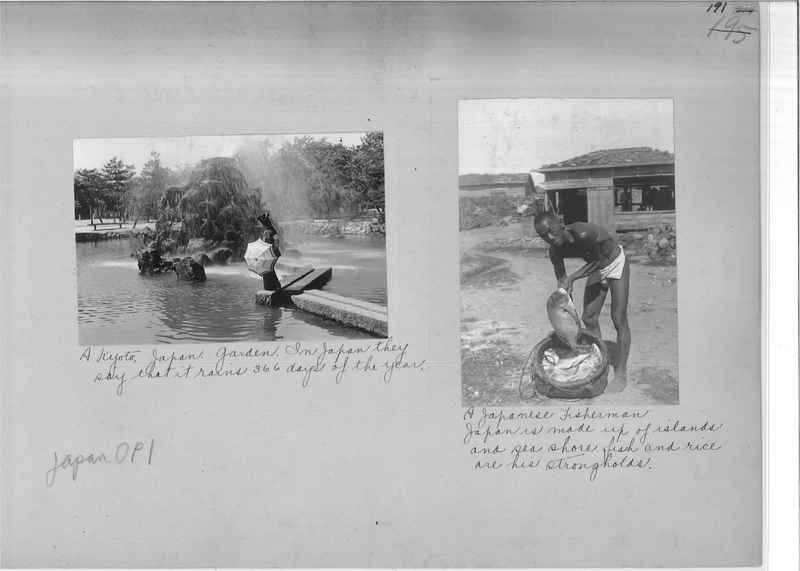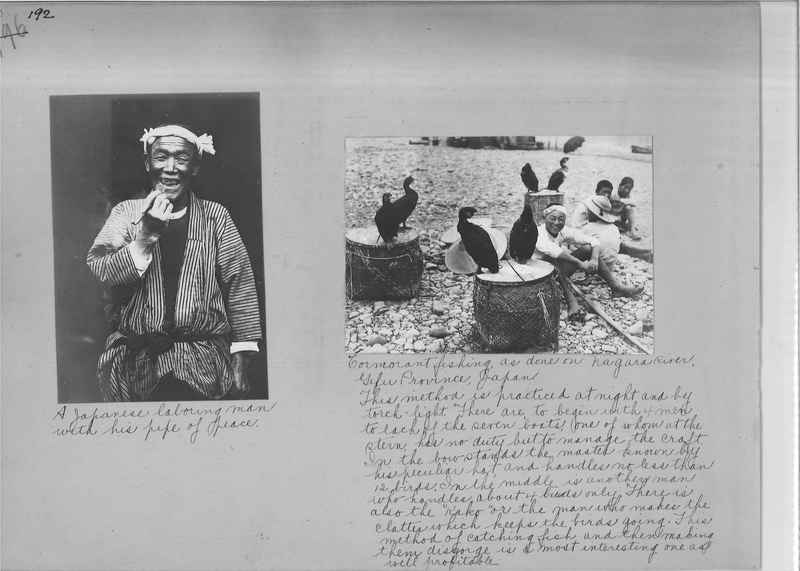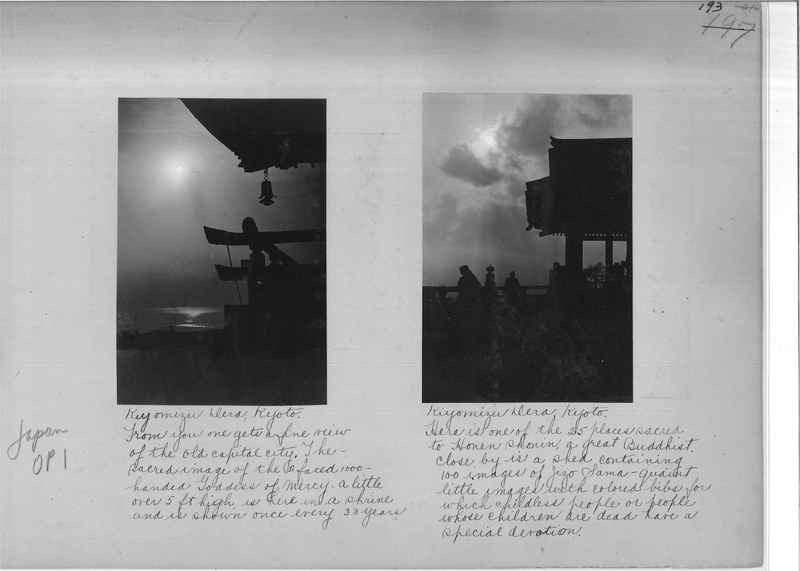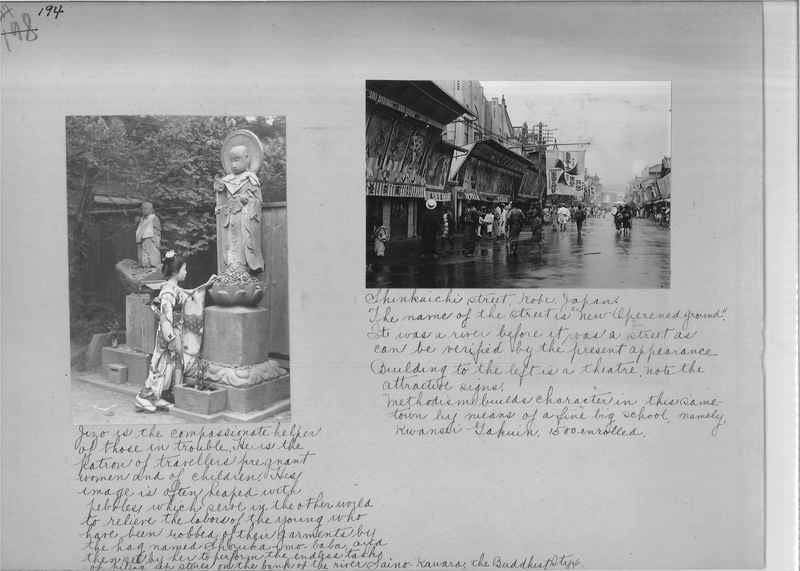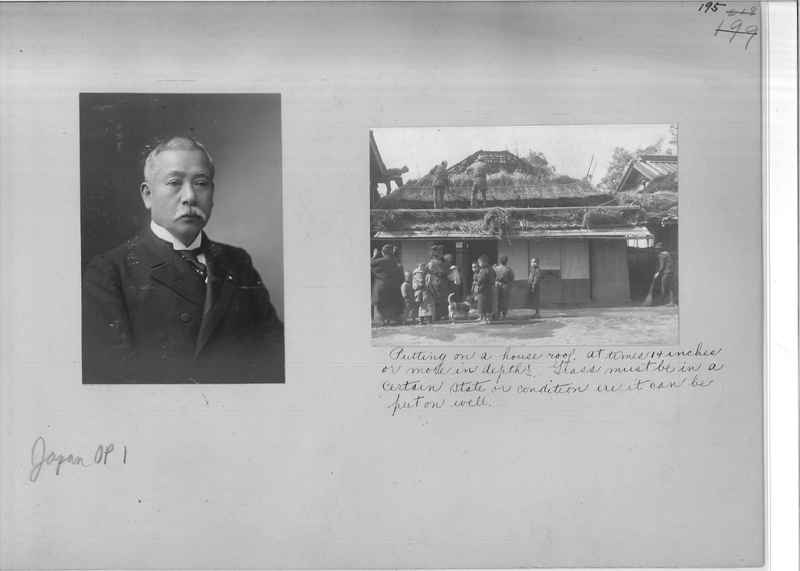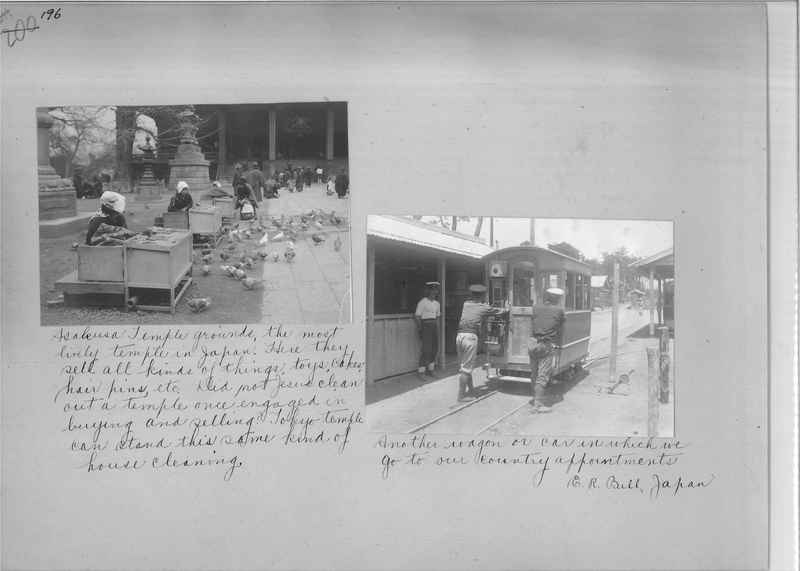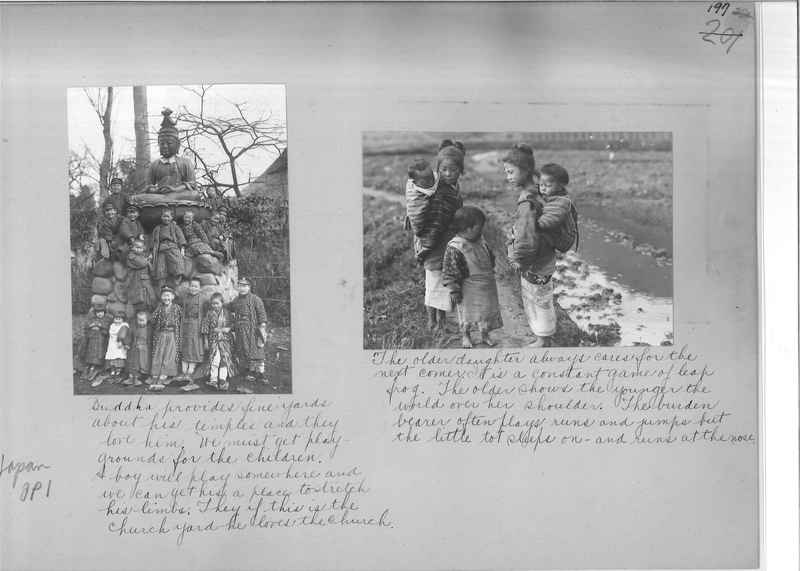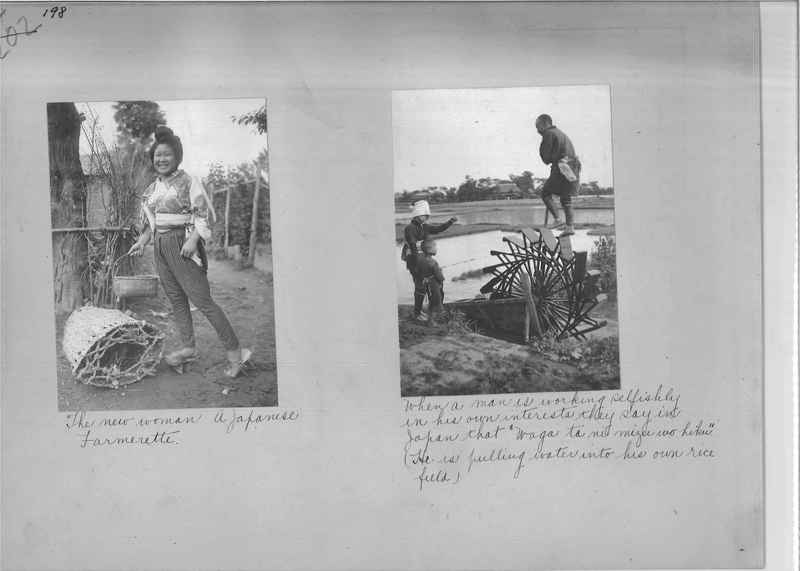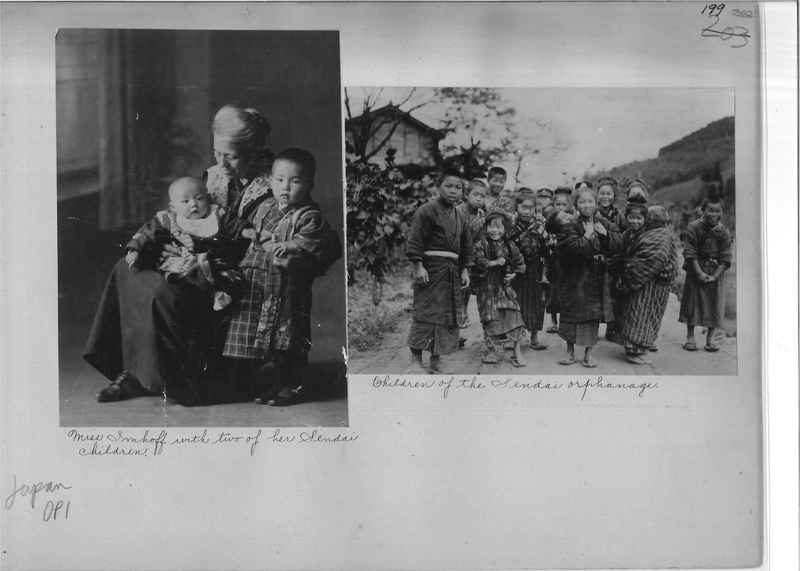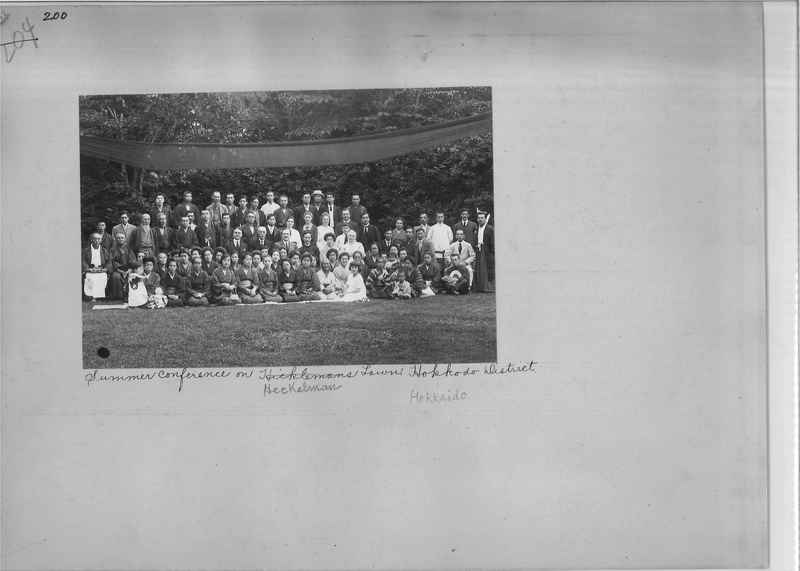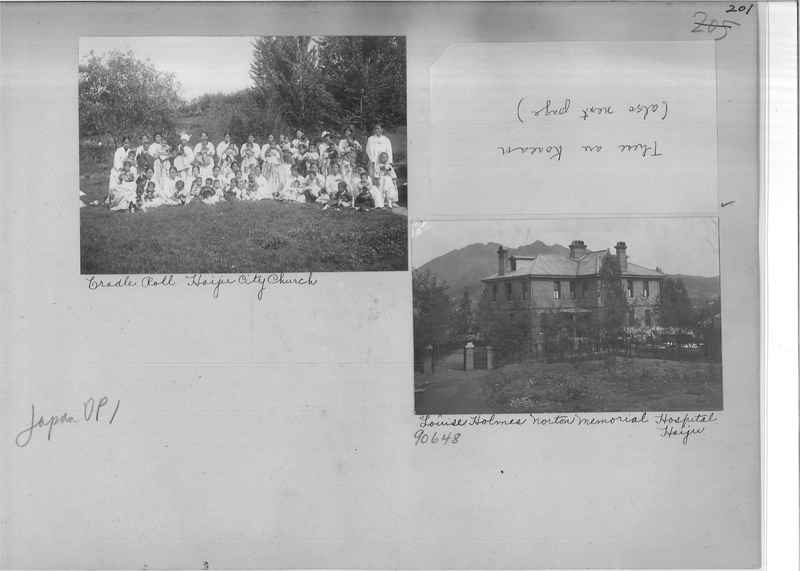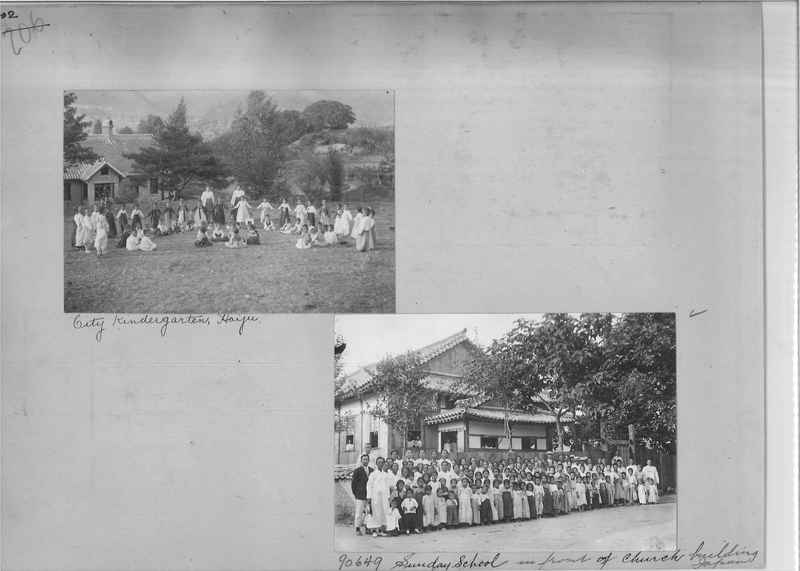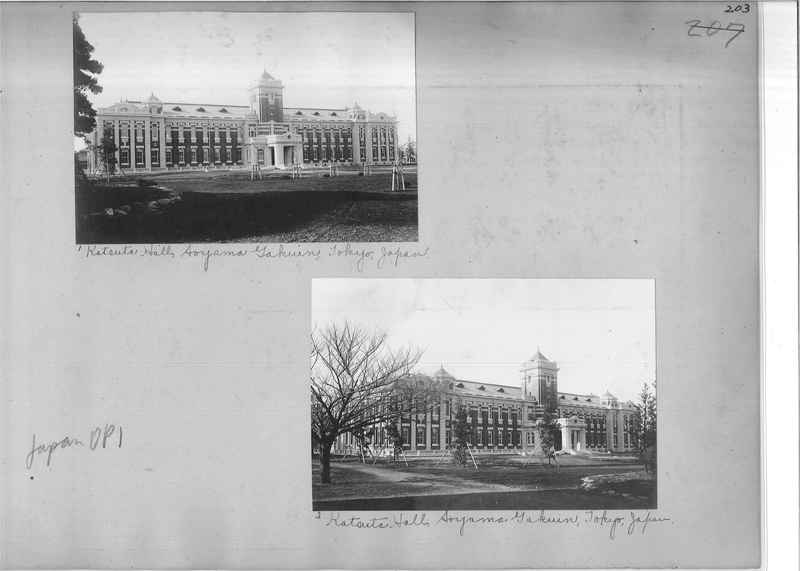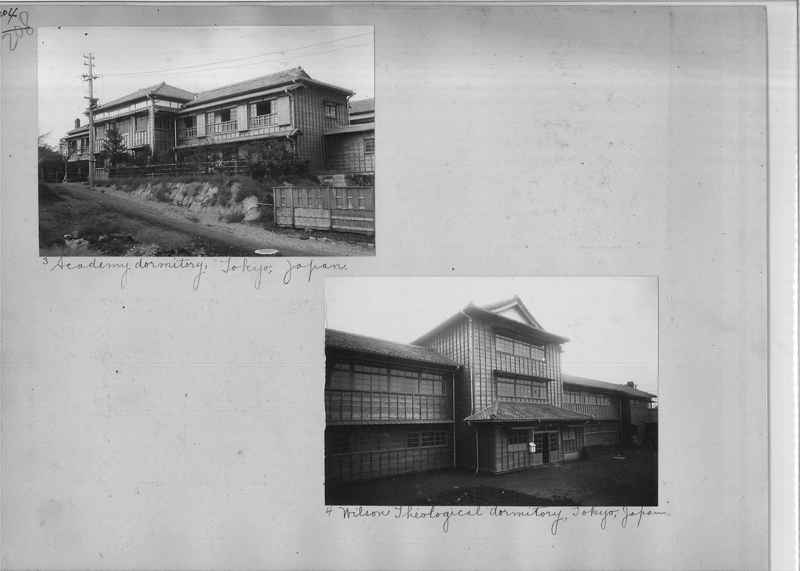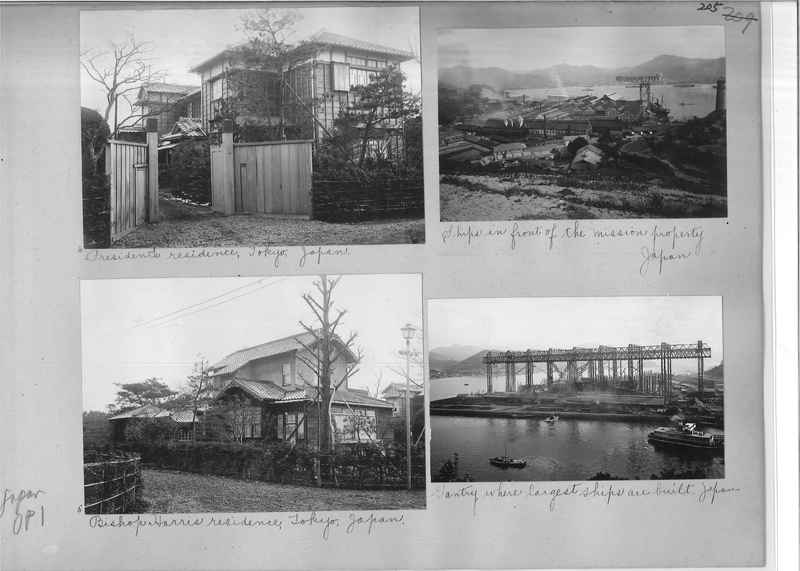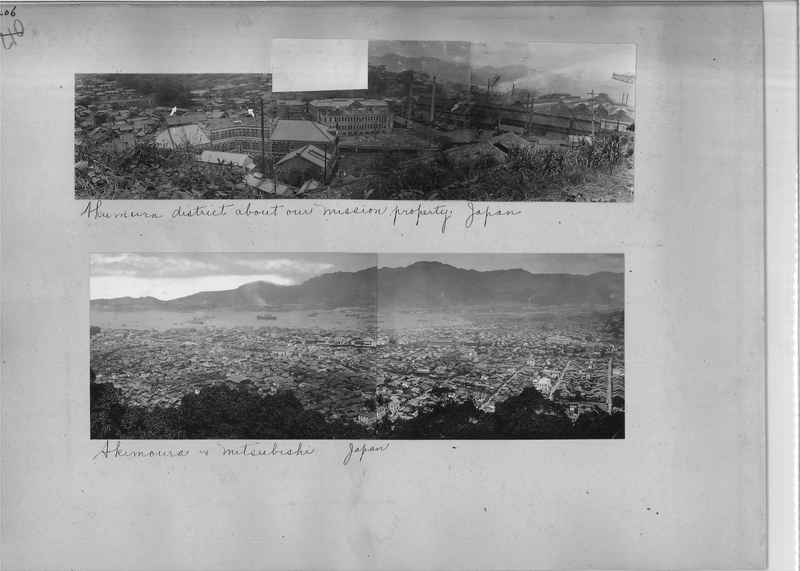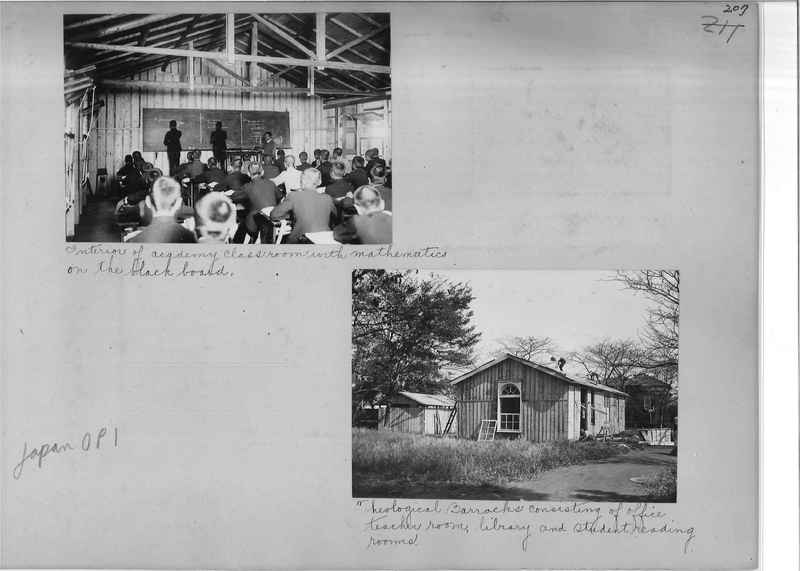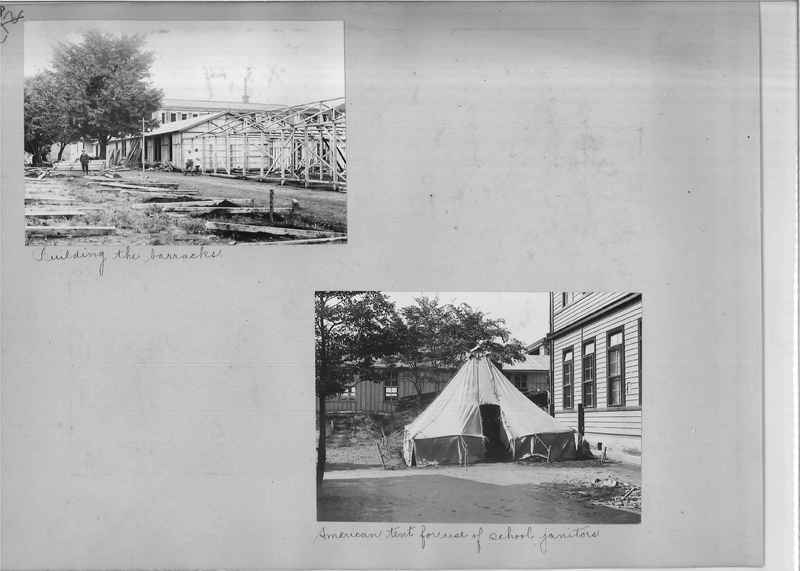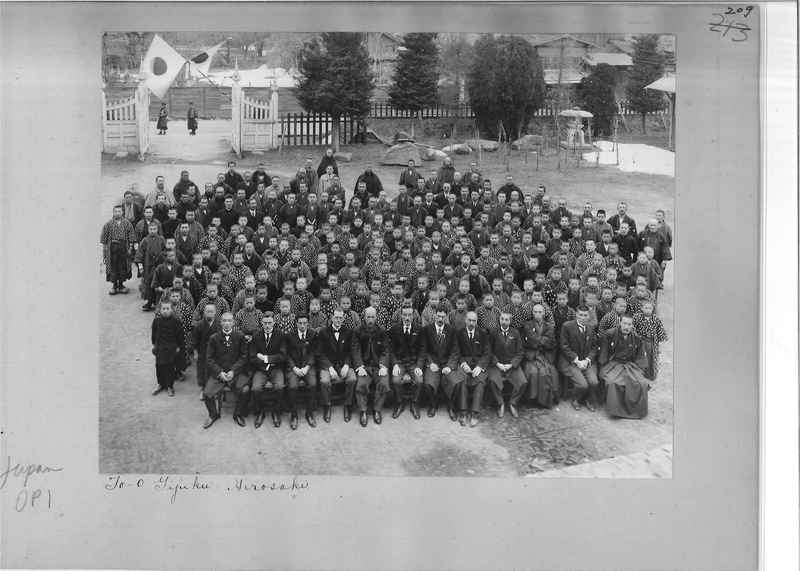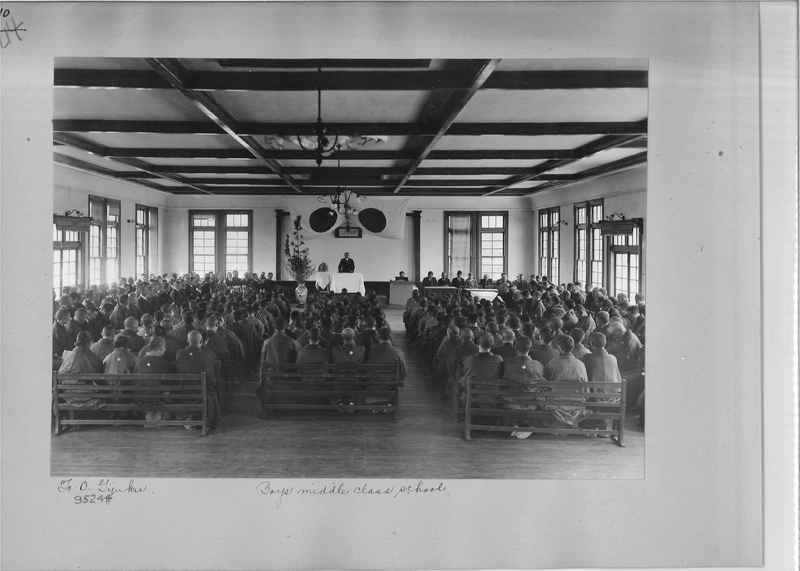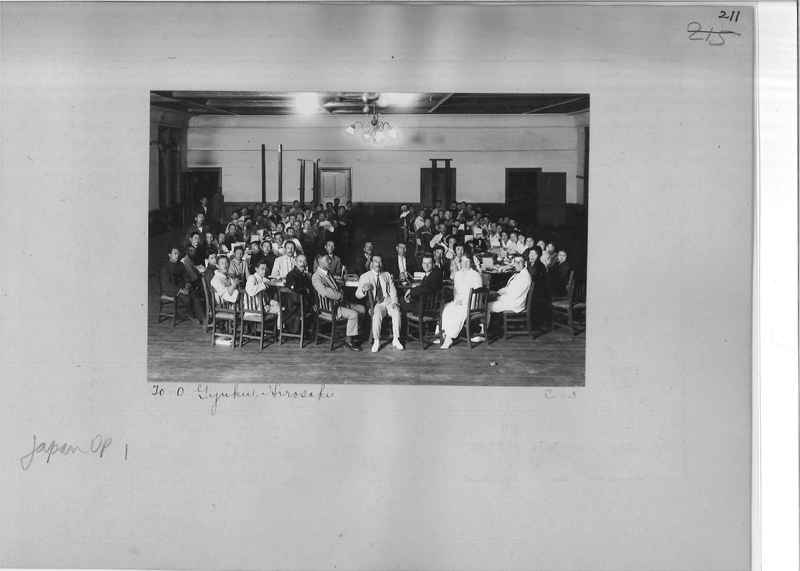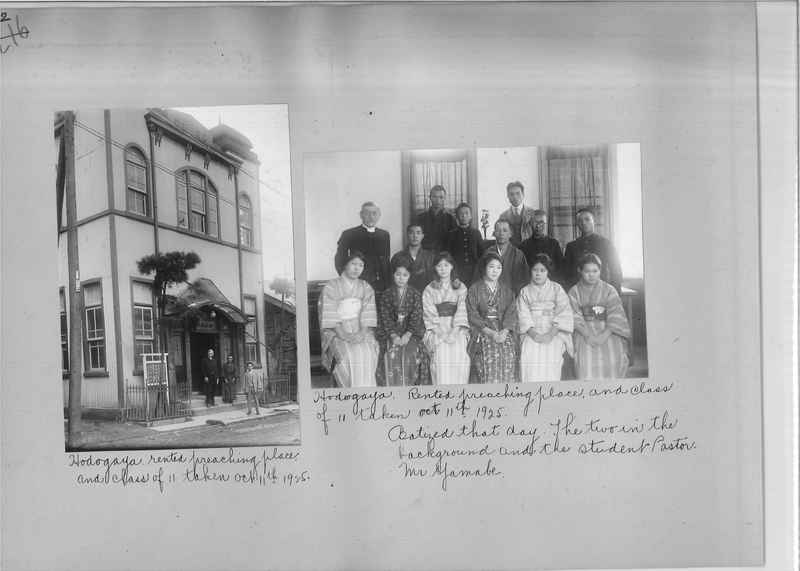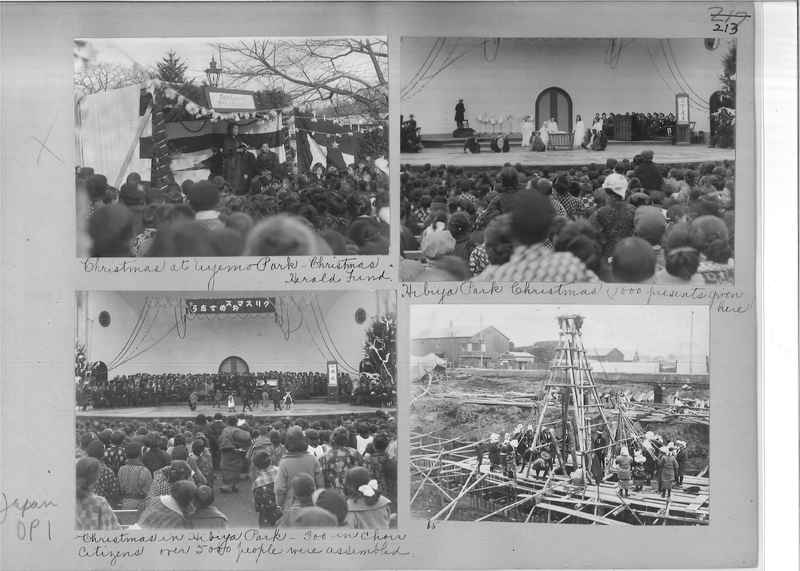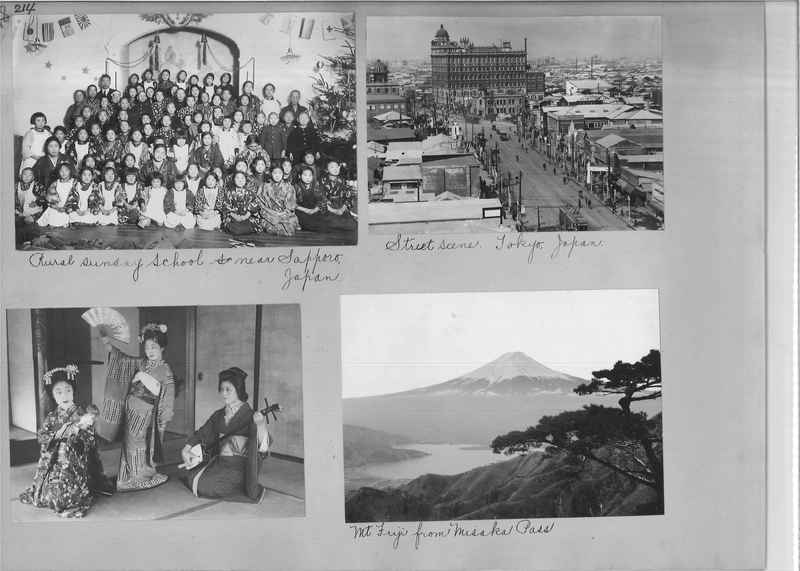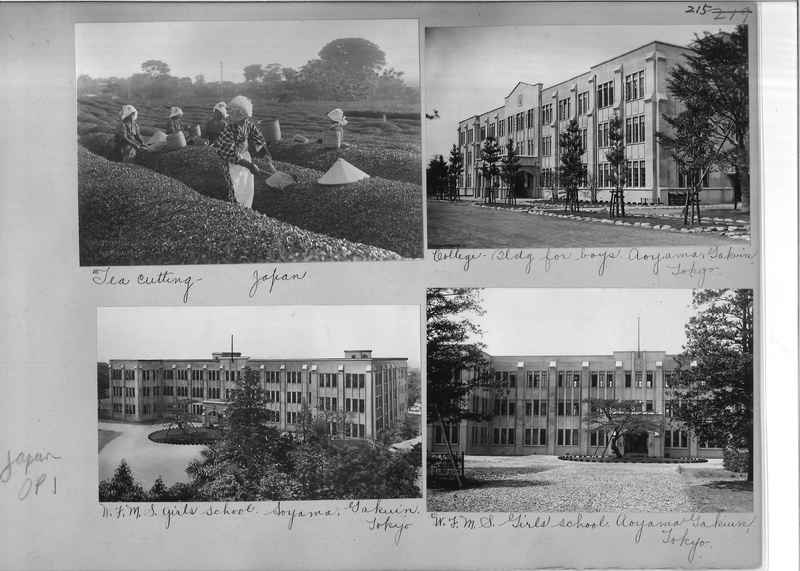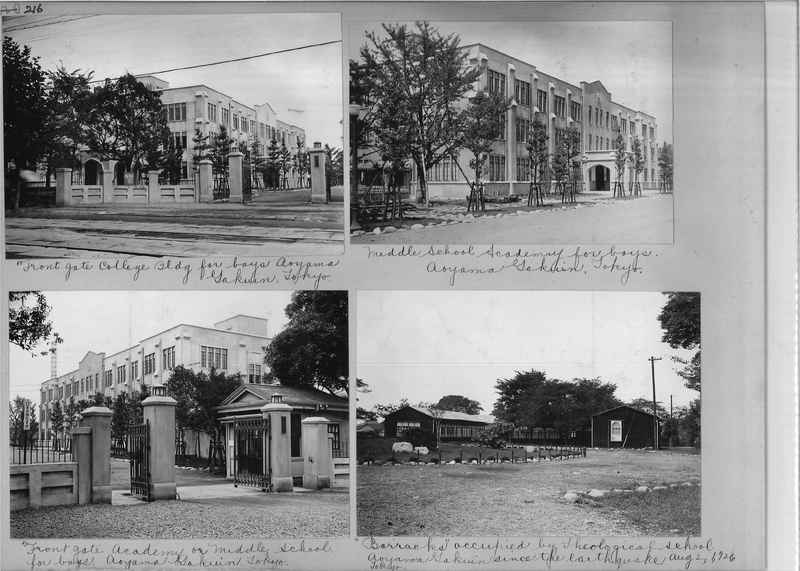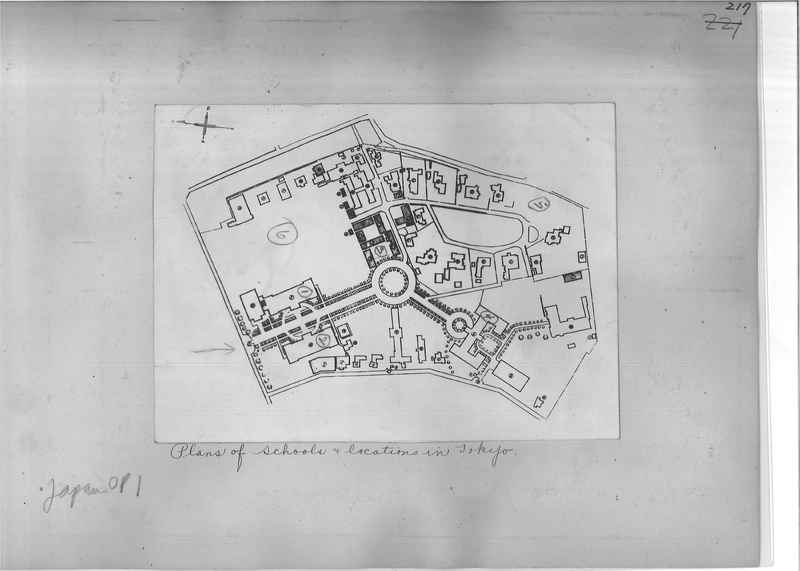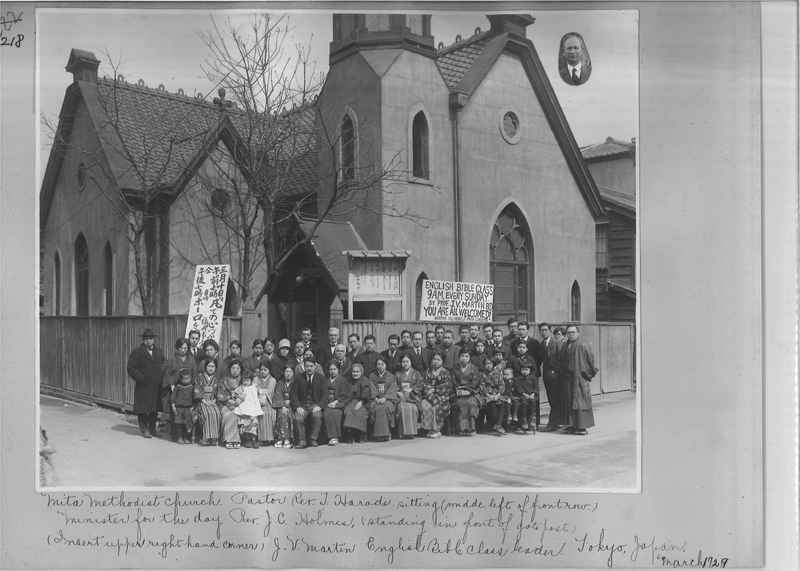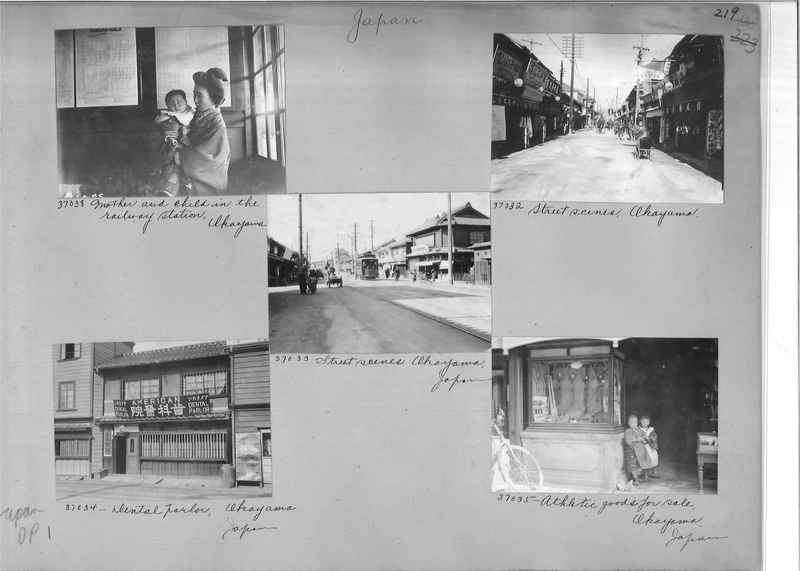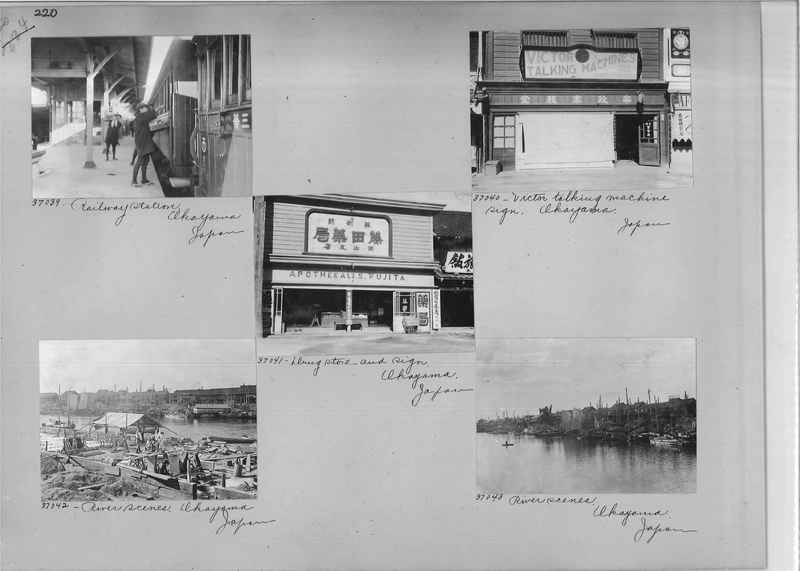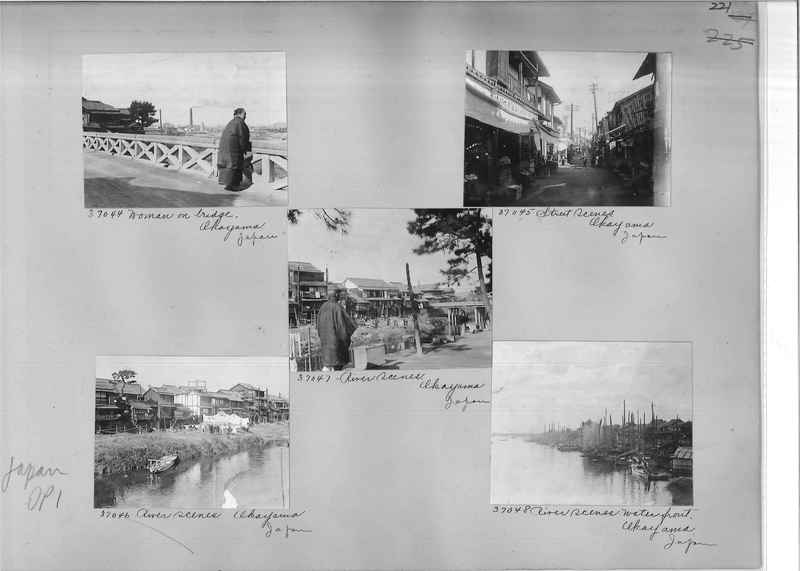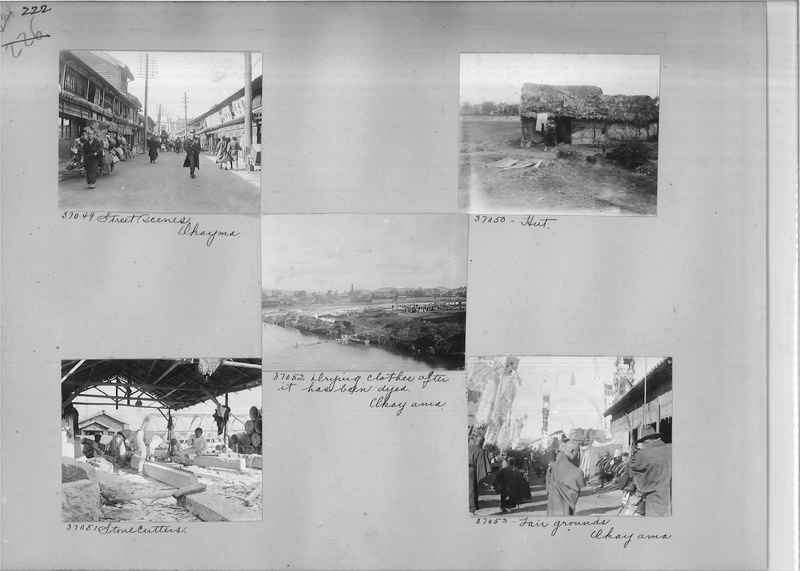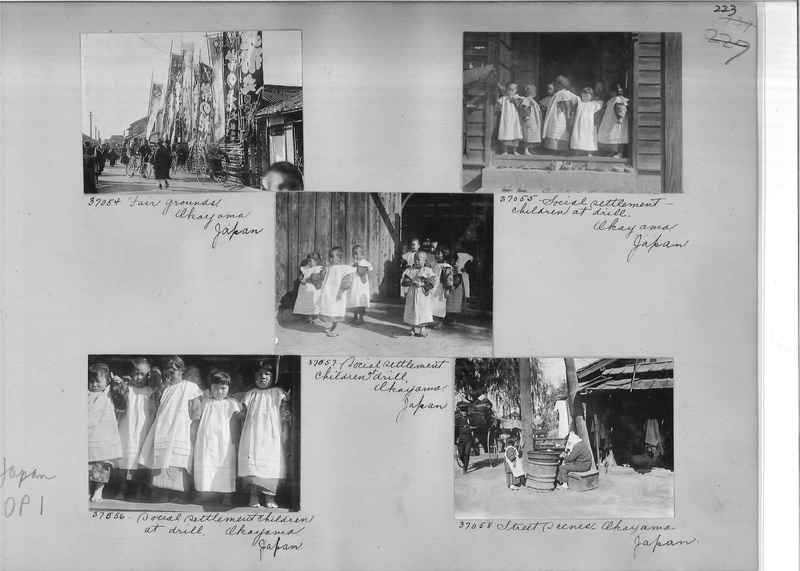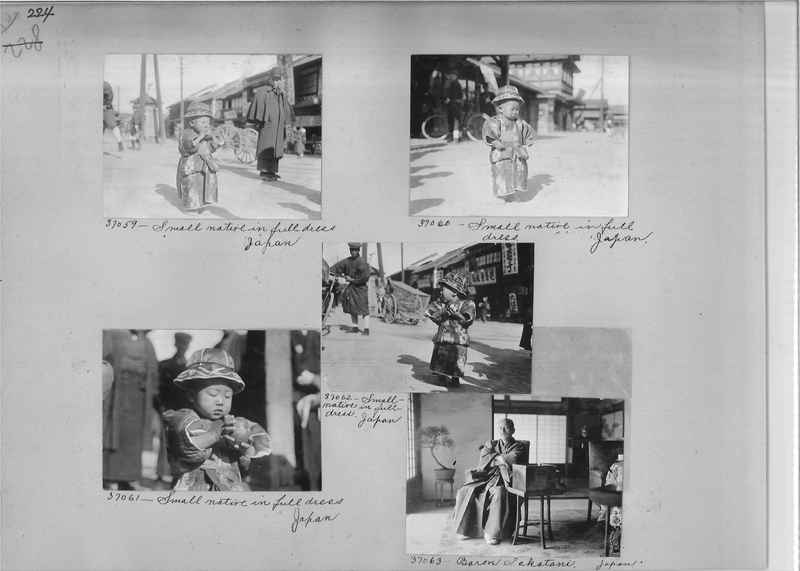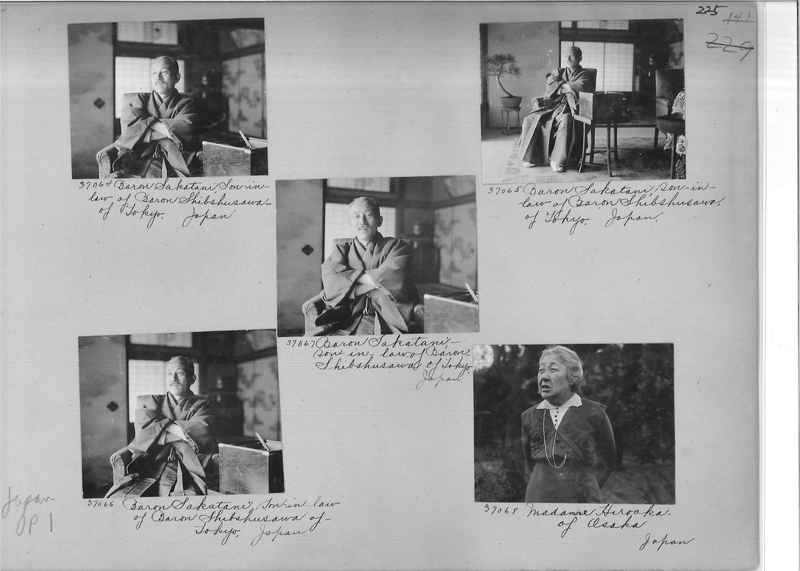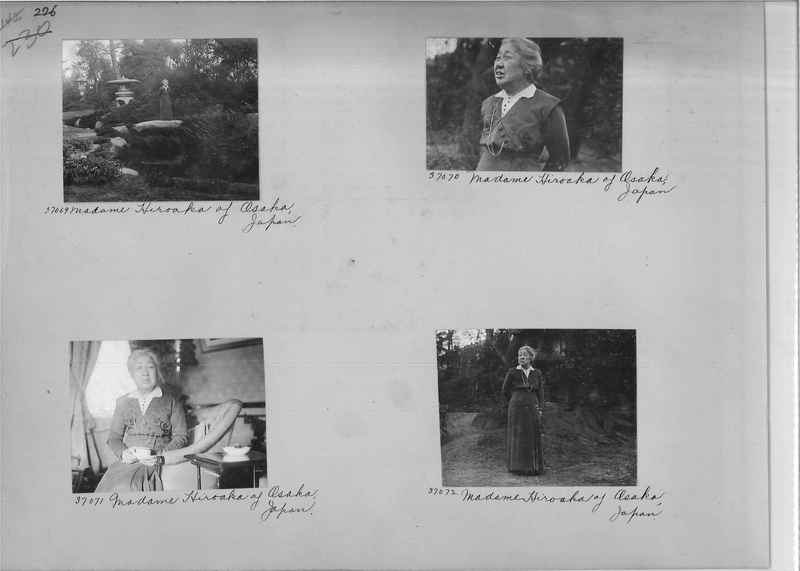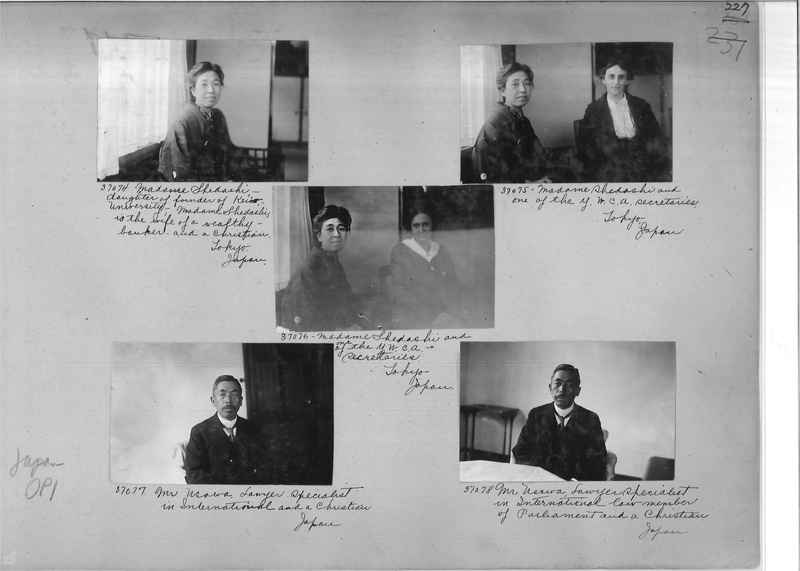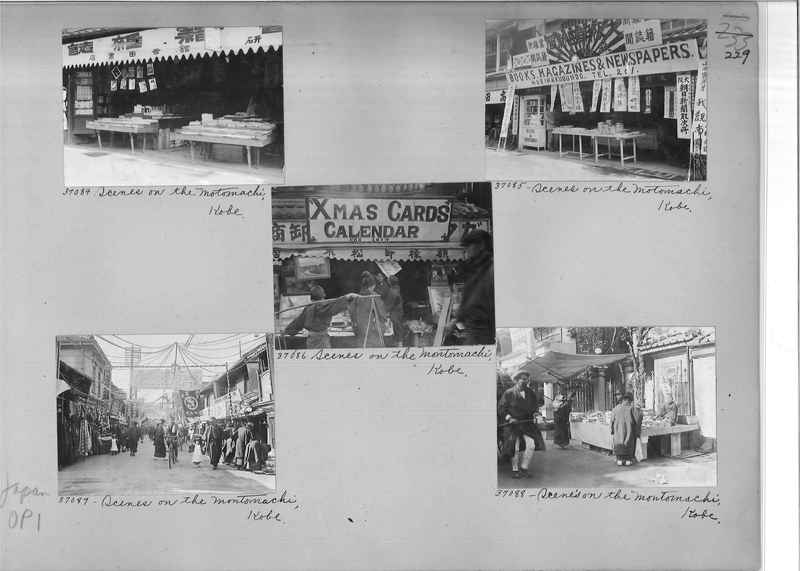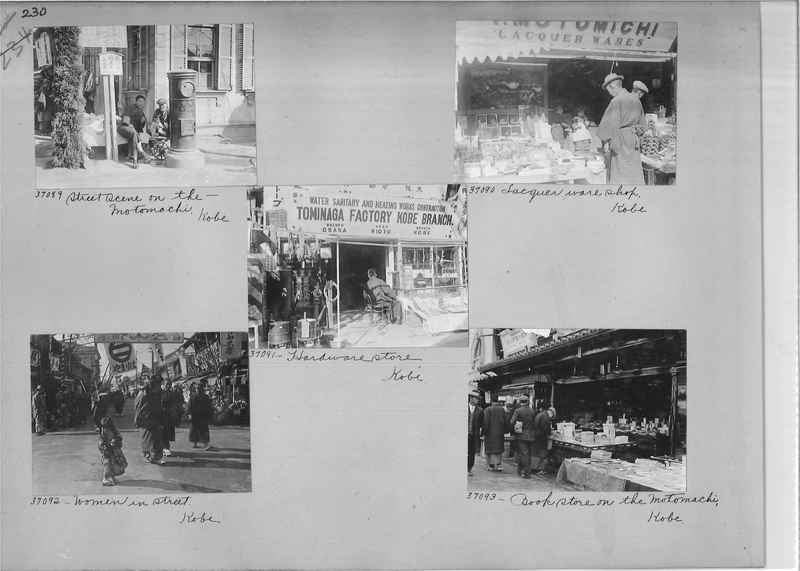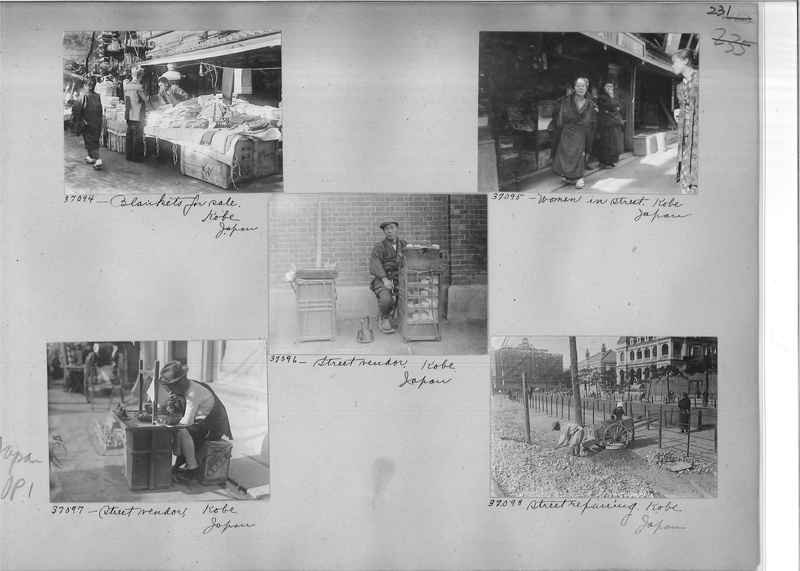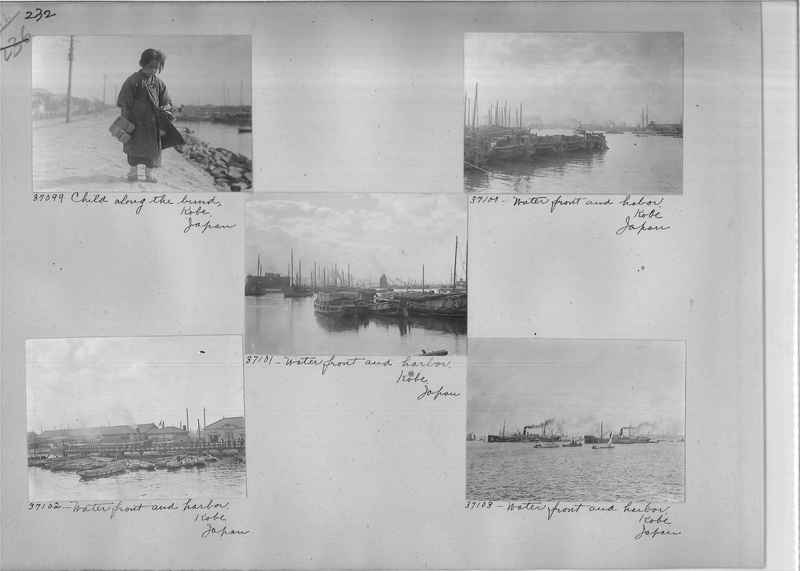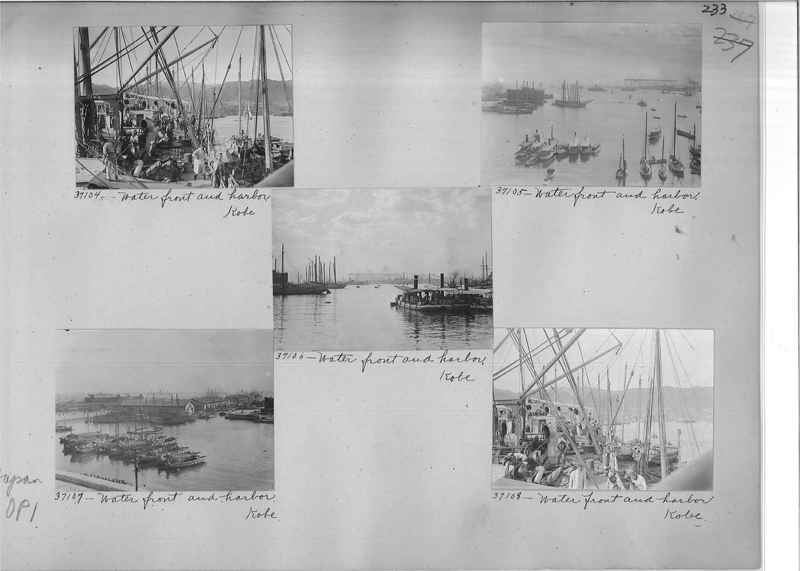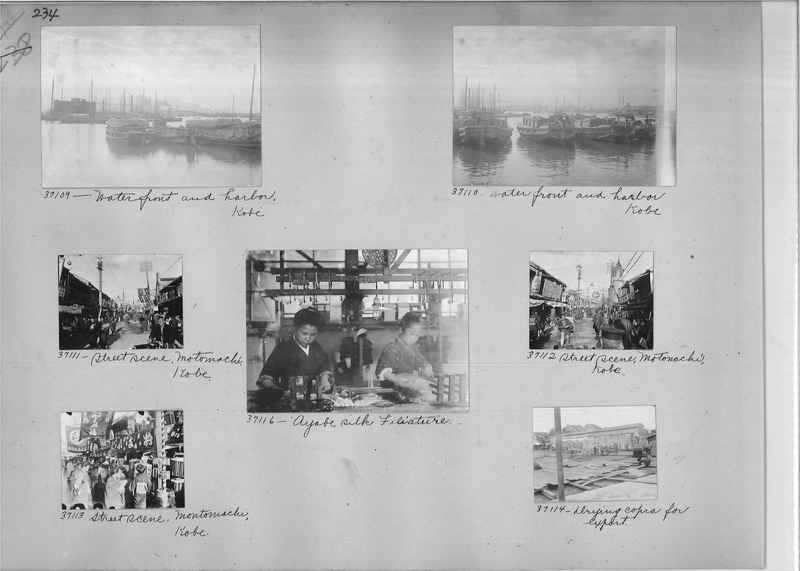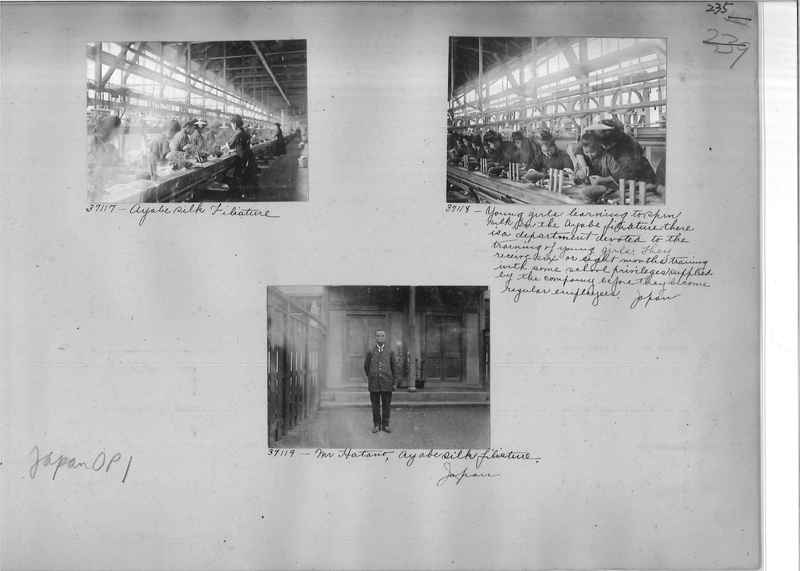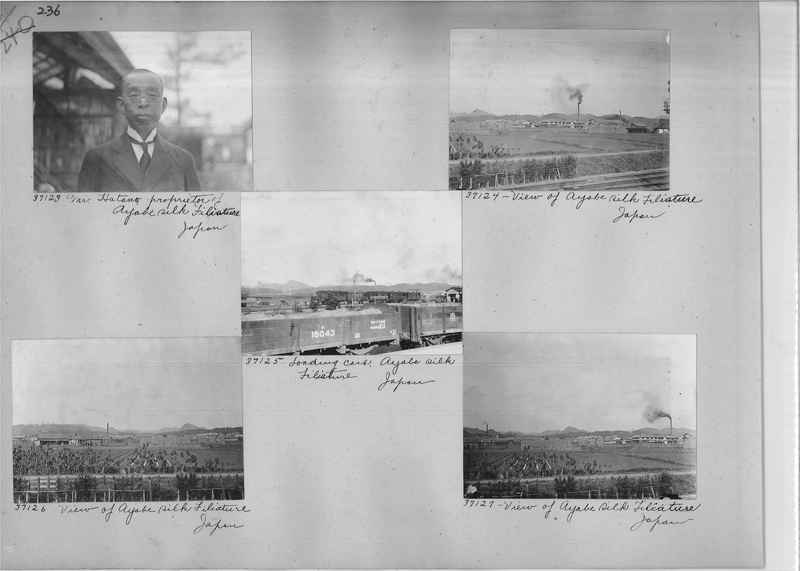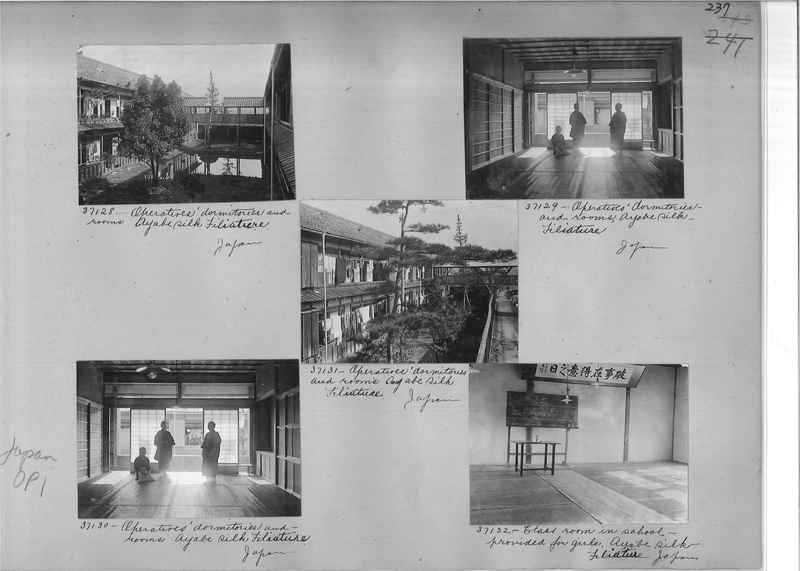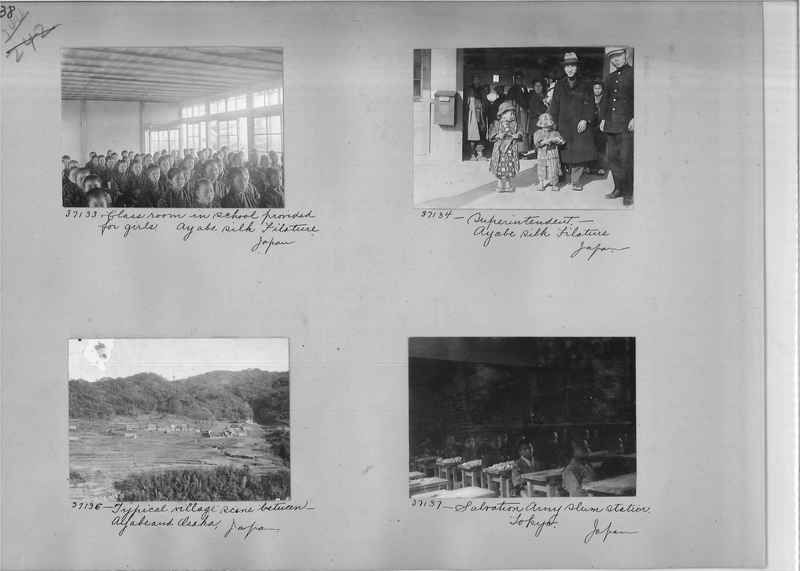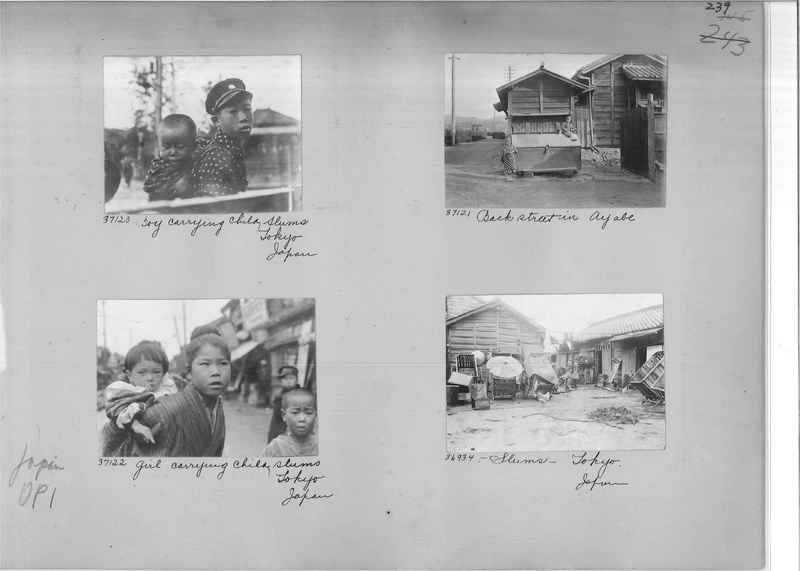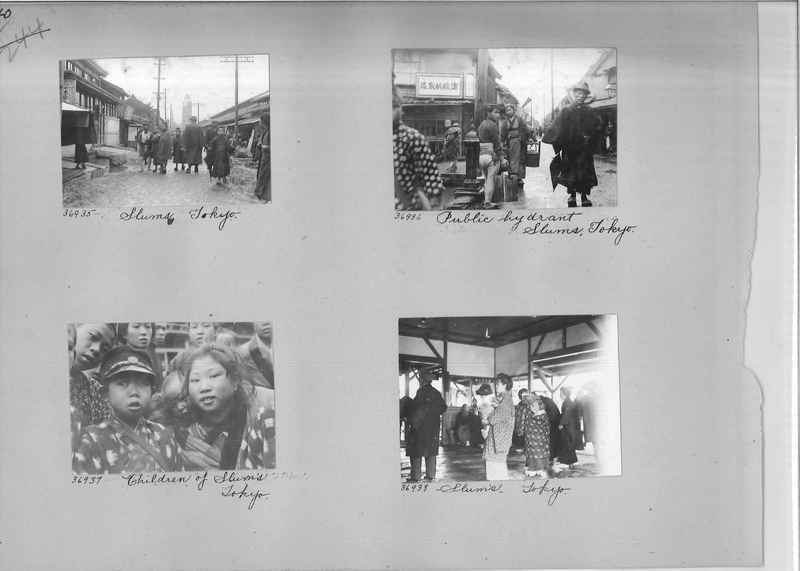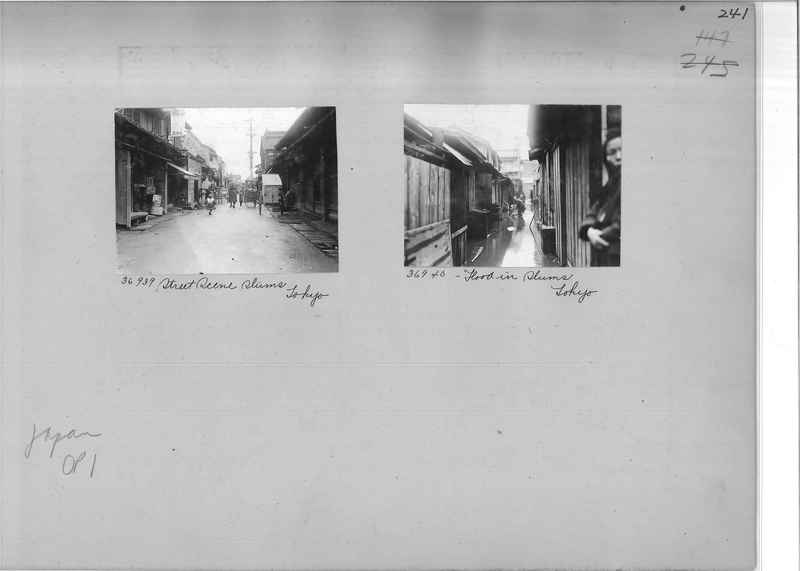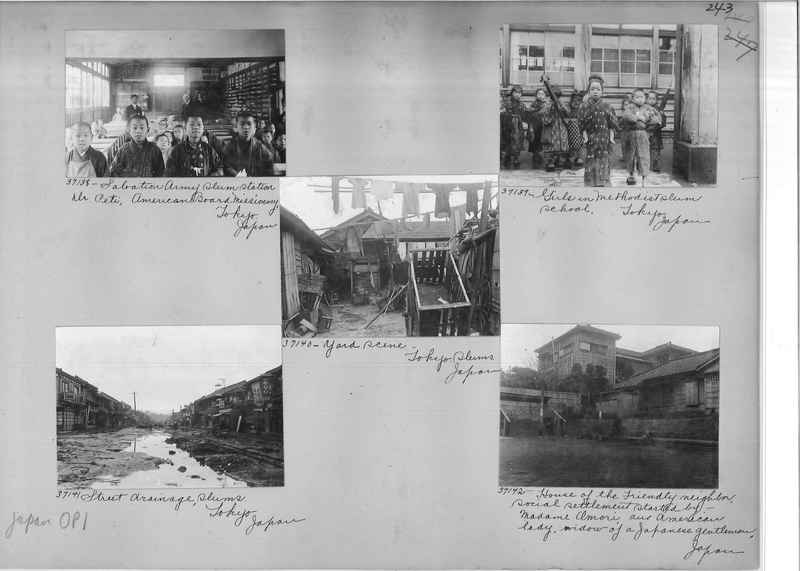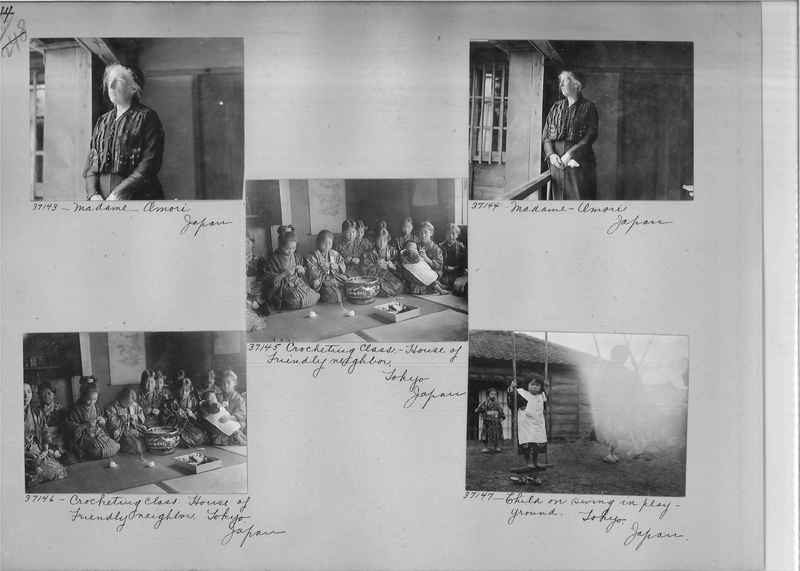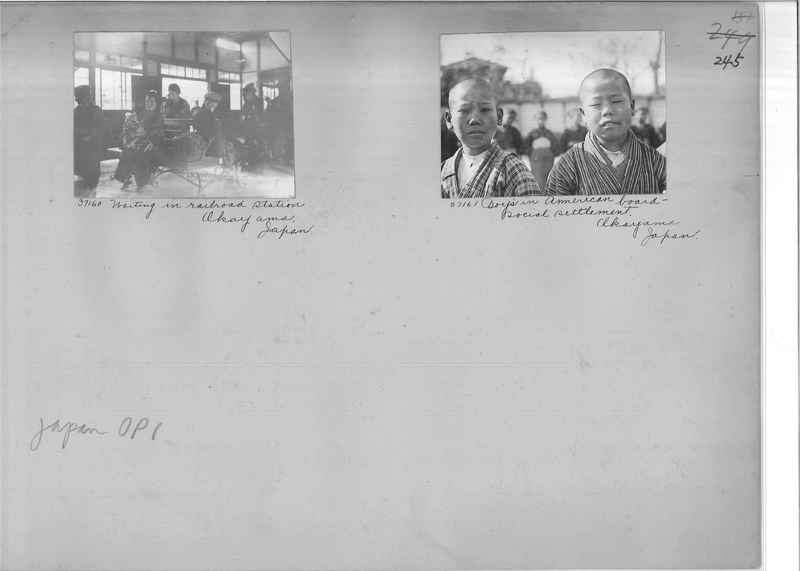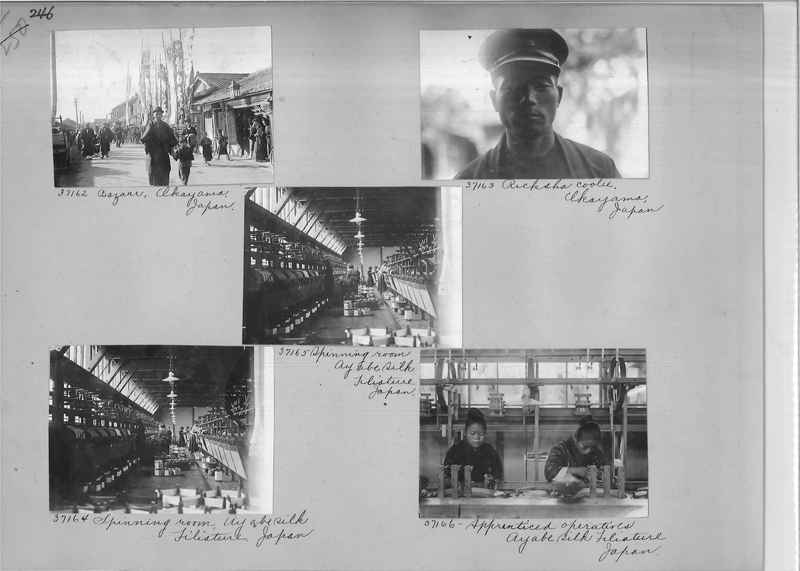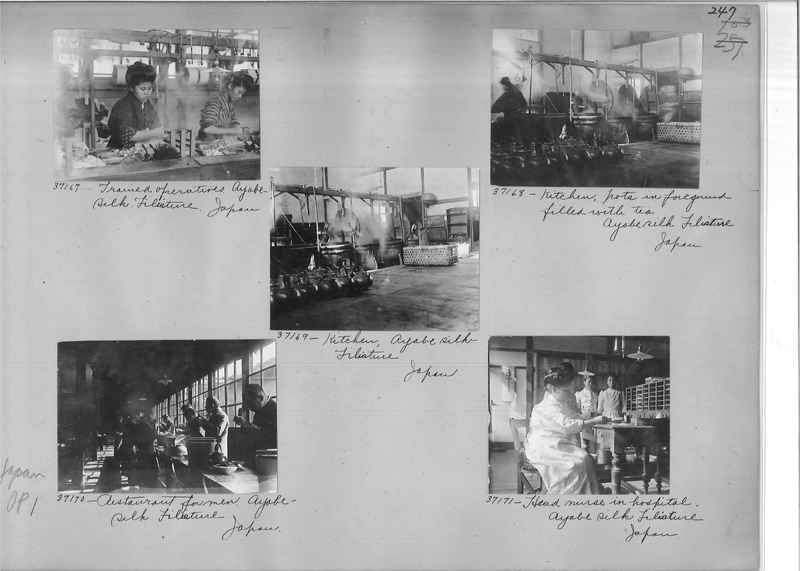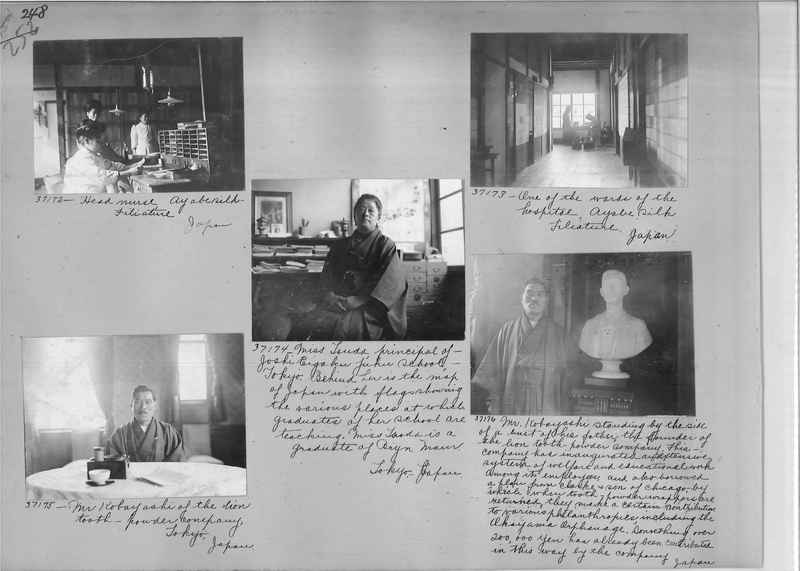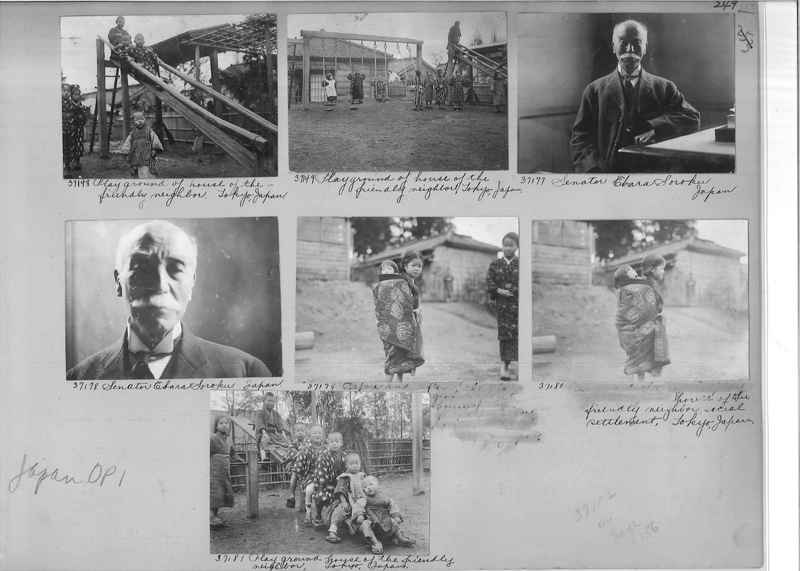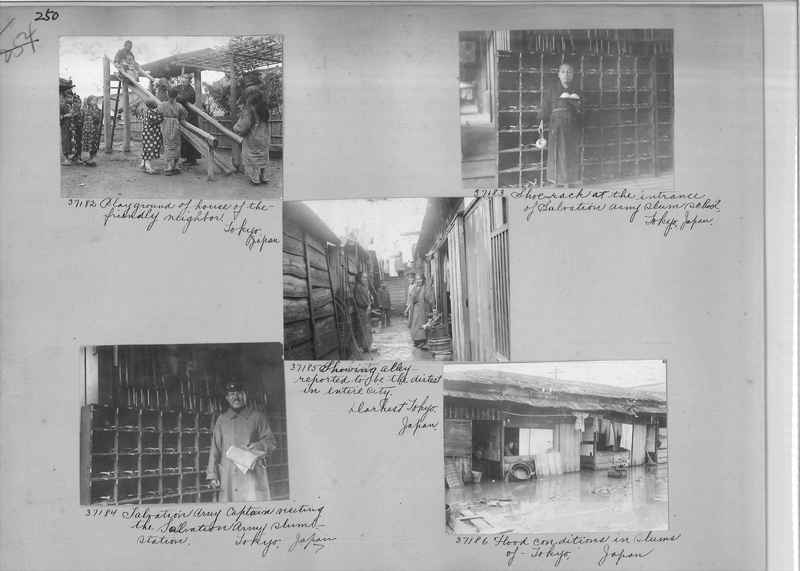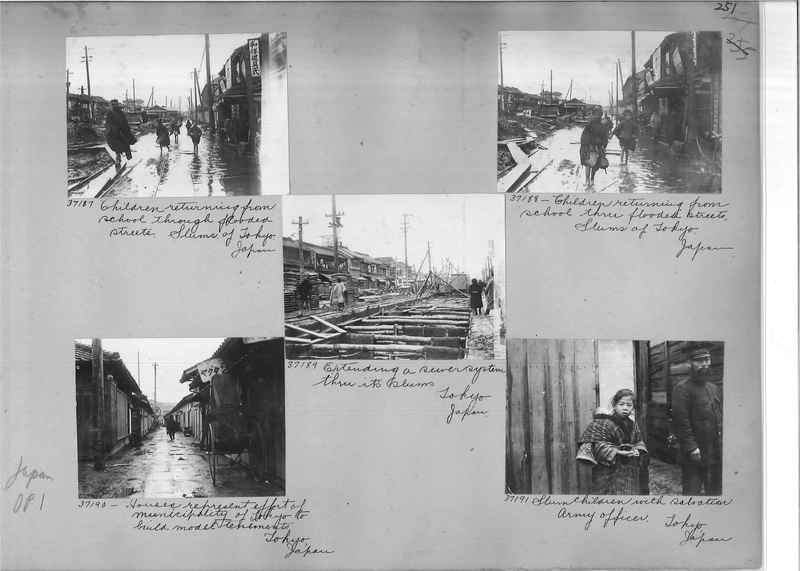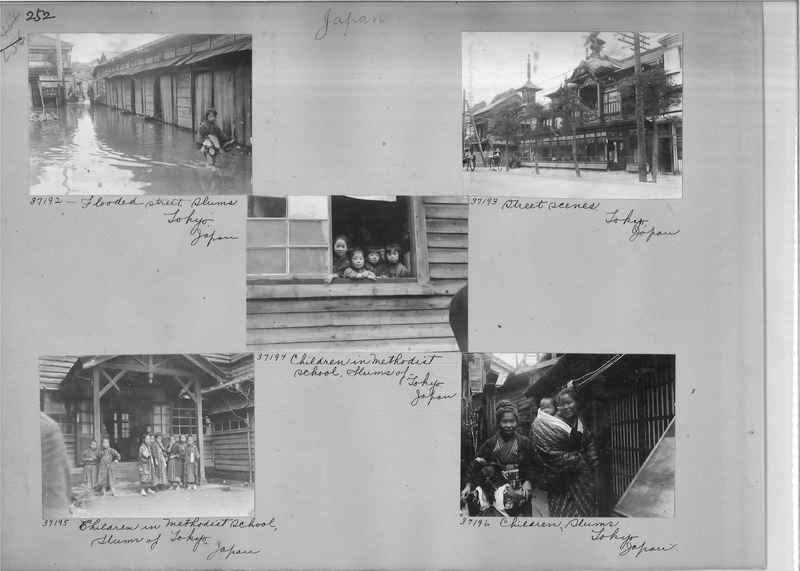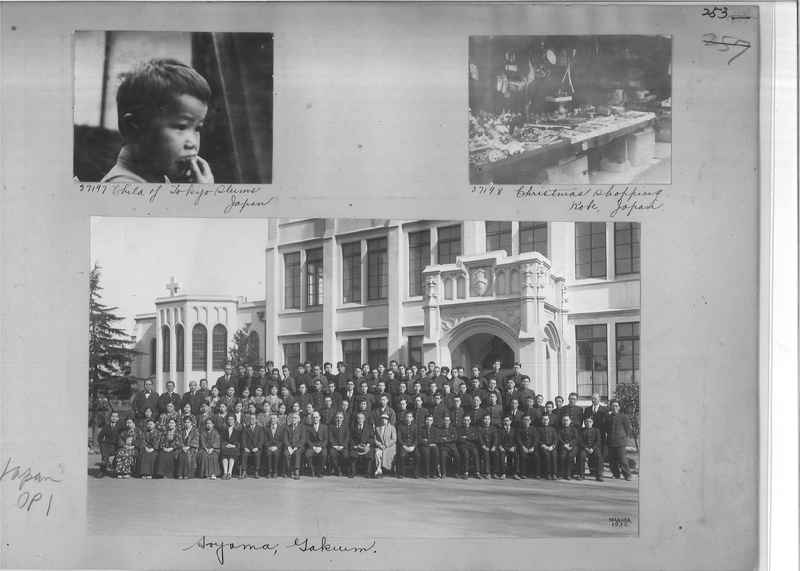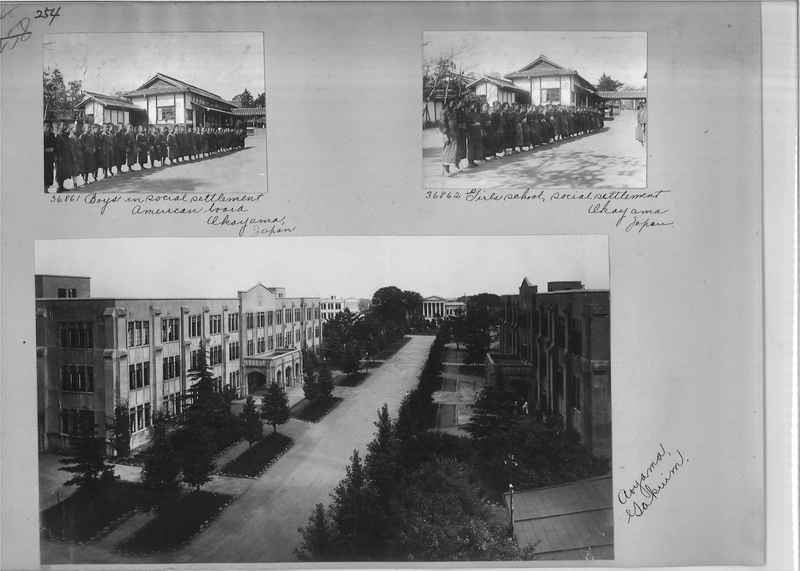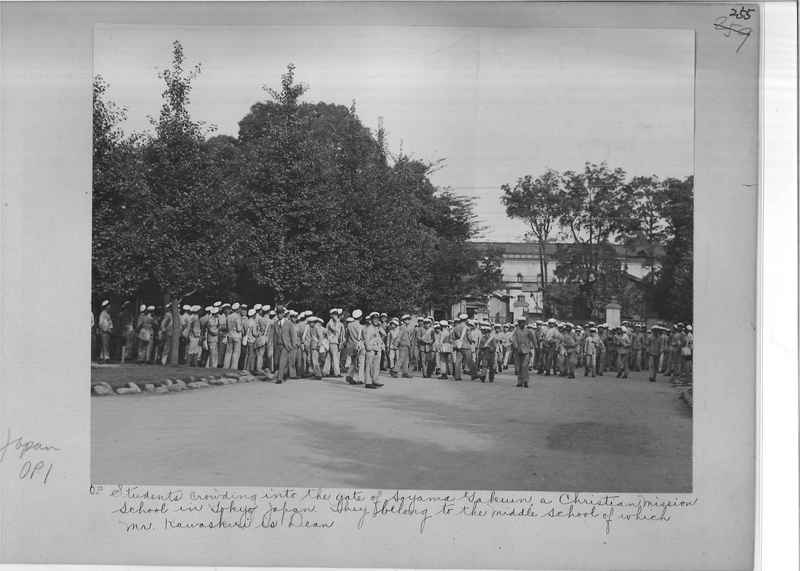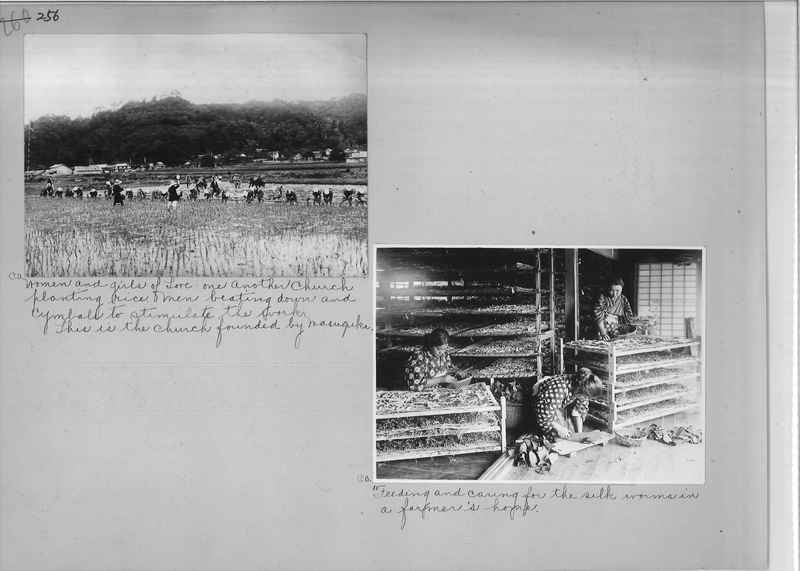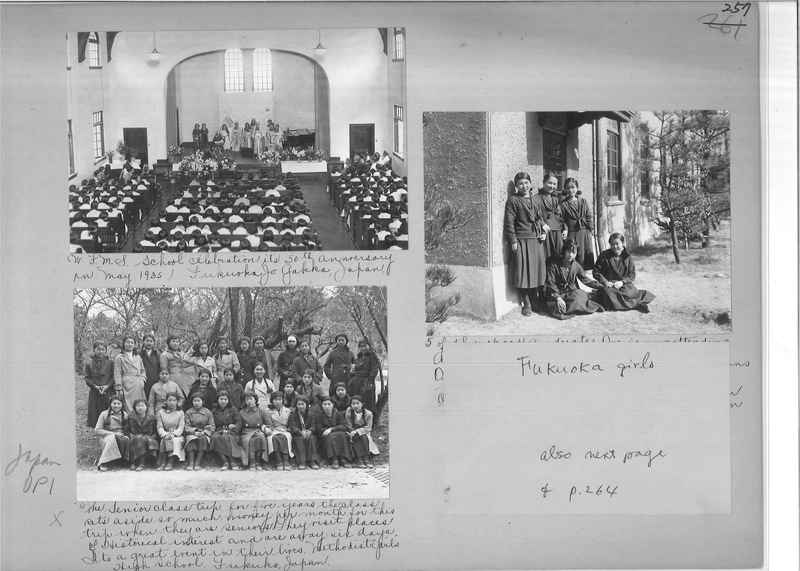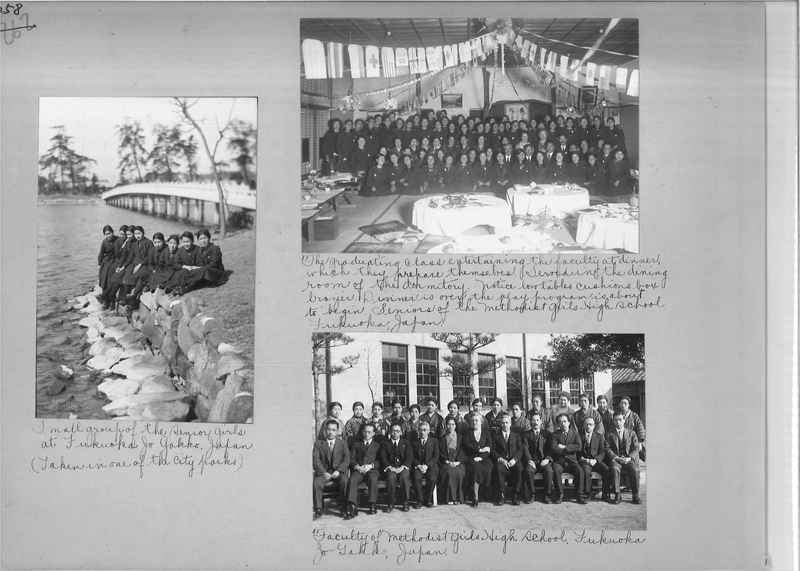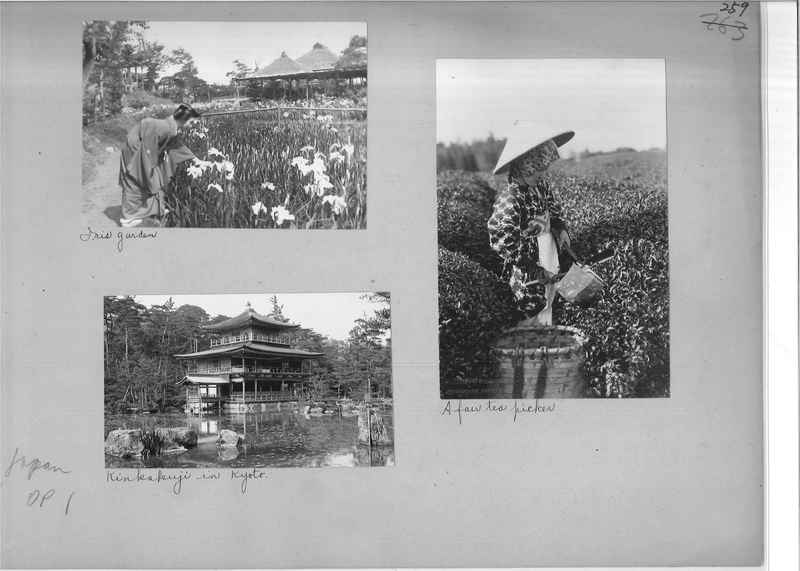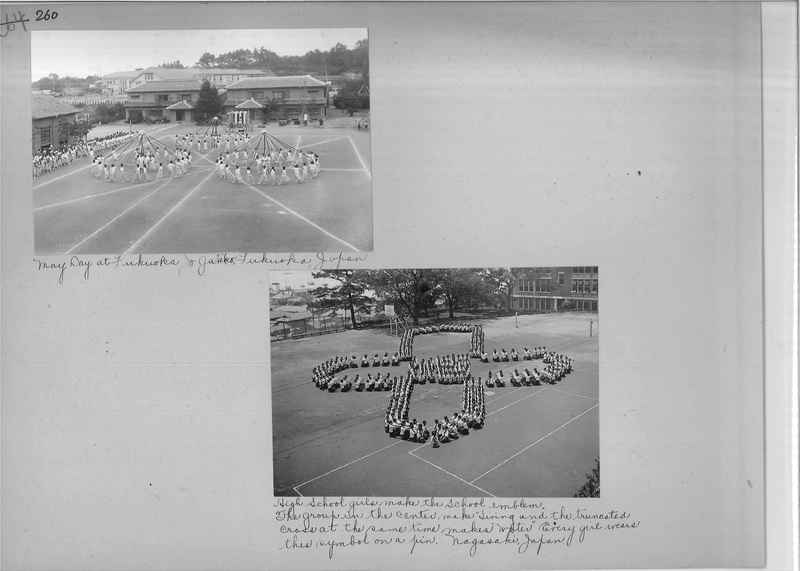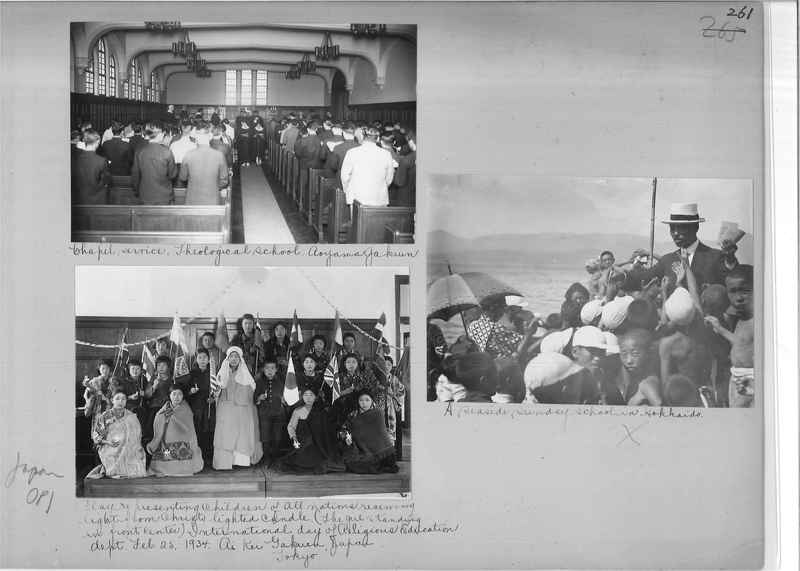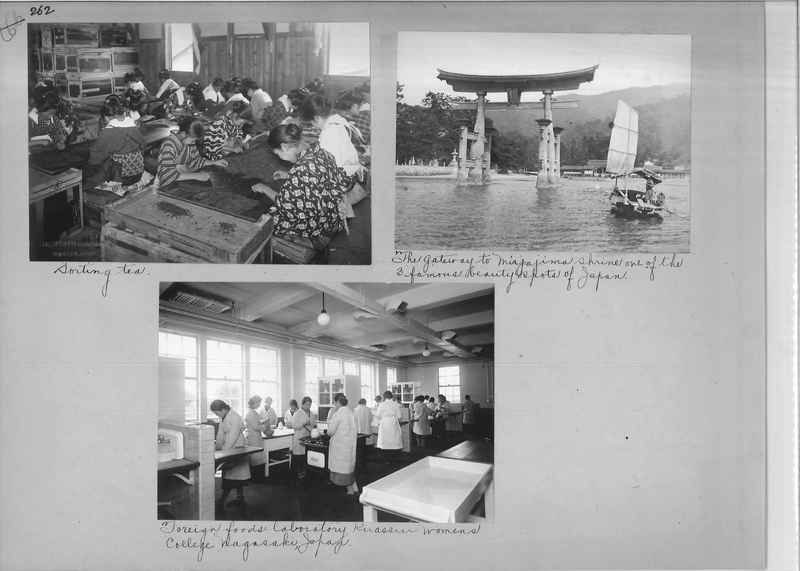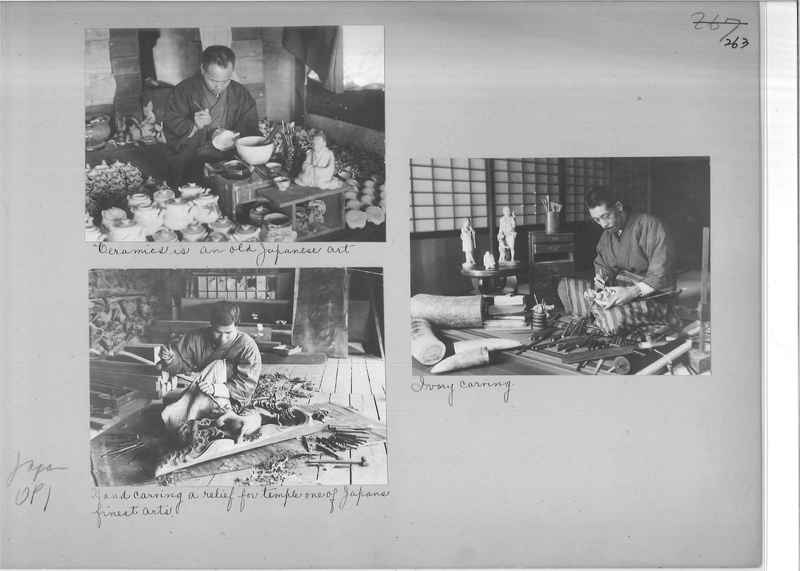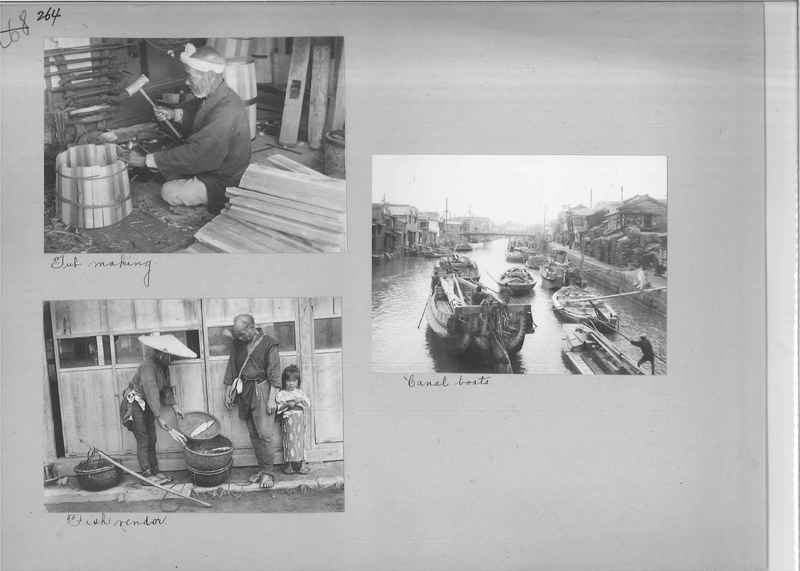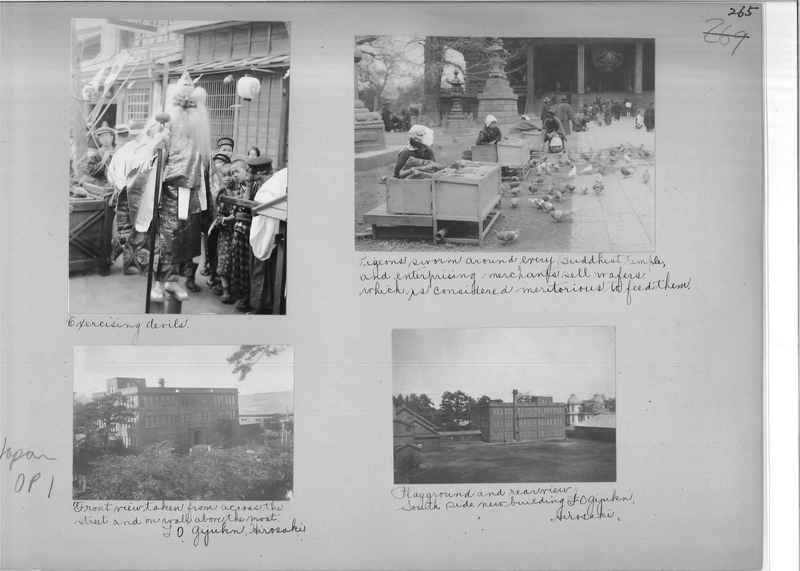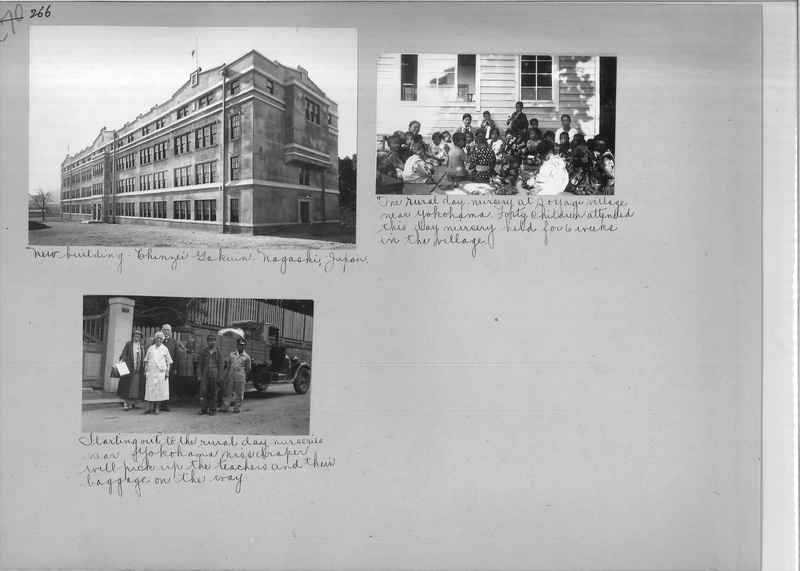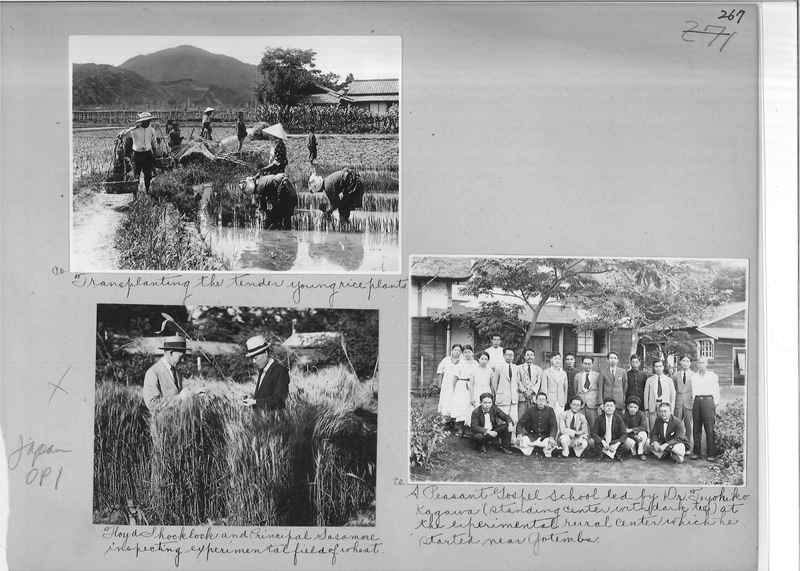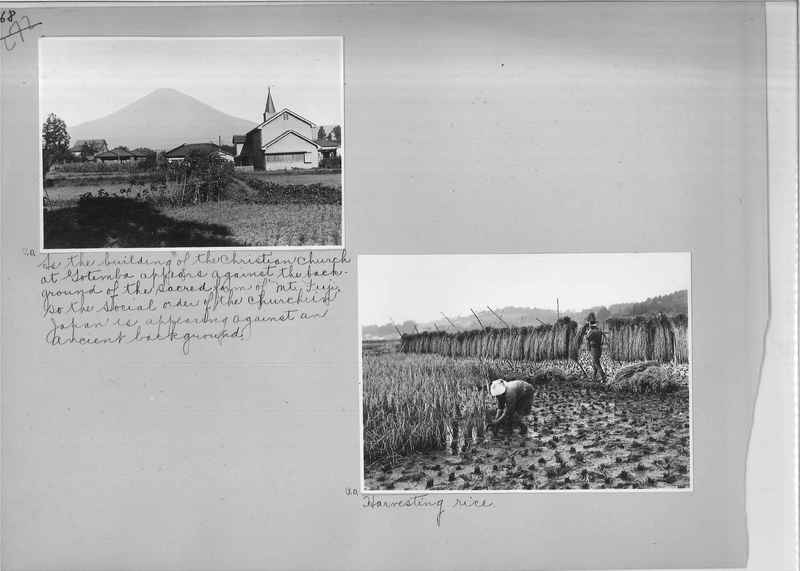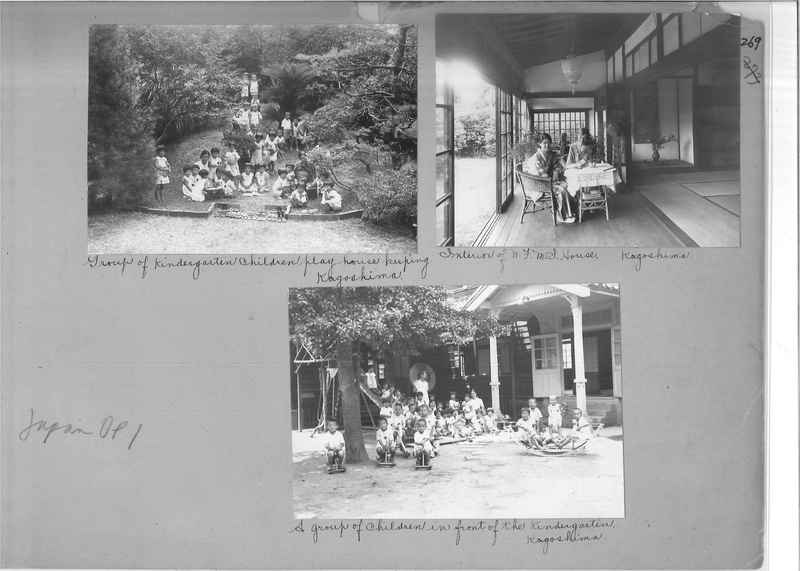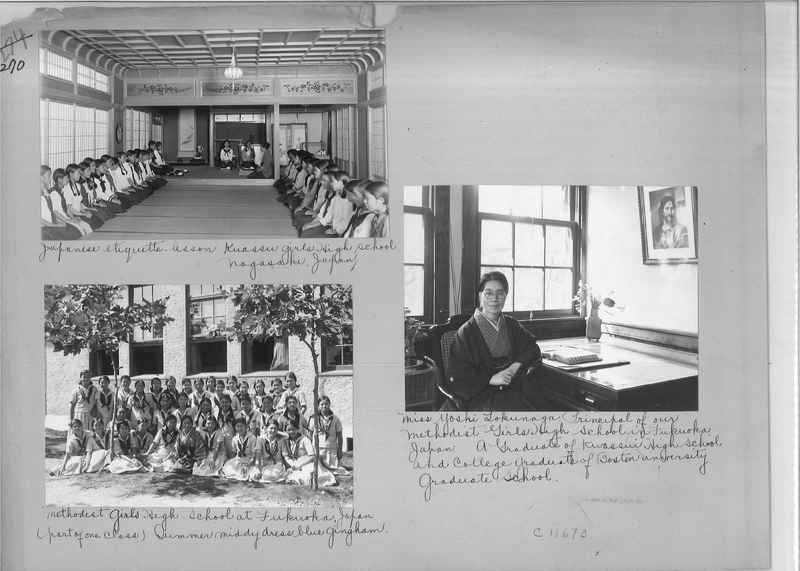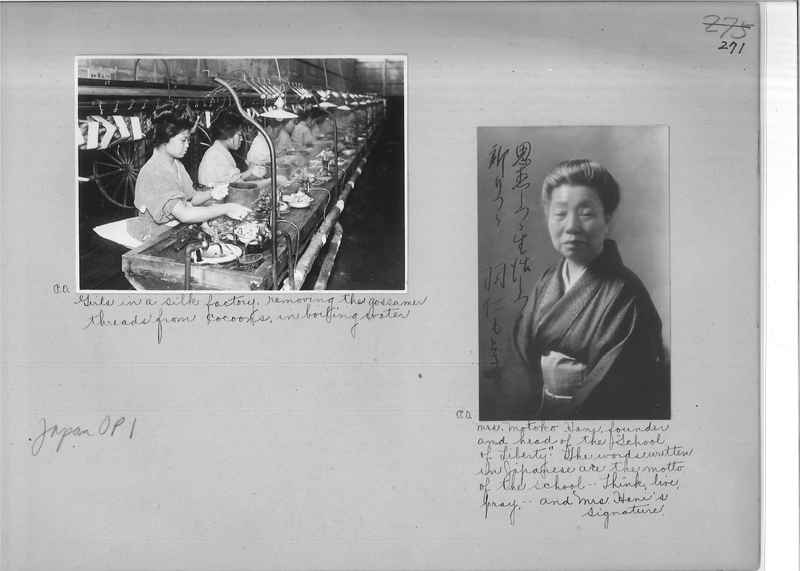Mission Photograph Album - Japan OP #1
Dublin Core
Title
Mission Photograph Album - Japan OP #1
Description
Images related to Methodist mission work in Japan taken under the direction of the Board of Missions between the 1900s and late 1920s
Date
1910-1920s
Creator
Board of Foreign Missions of the Methodist Episcopal Church
Subject
Japan
Missions
Rights
Permission for use must be obtained from the General Commission on Archives and History. Contact e-mail is research@gcah.org
Publisher
The General Commission on Archives and History of The United Methodist Church. The United Methodist Archives and History Center. Madison, New Jersey
Identifier
Mission Photograph Albums - Japan OP #1
Scriptus
Status
Completed
Percent Completed
100
Items in the Mission Photograph Album - Japan OP #1 Collection
Mission Photograph Album - Japan - O.P. #01 Page 0001
JapOP1-1:1 Group taken at Fortieth Anniversary of Founding Methodist Episcopal Mission at
Nagasaki.
Mission Photograph Album - Japan - O.P. #01 Page 0007
JapOP1-7:1 "On the Road," Mr. Will Schwarts, Mr. Elder, and Mrs. Bull in
the basha.
JapOP1-7:2 A snake-breeder's front window in Nagoya City. This snakes is
the mamushi, the only poisonous snake in Japan. It is bred by this man by
thousands to be used as medicine. When grown it is put into a bottle such
as those here used. Alcohol enough to fill the bottle is pured in and
after standing for a time it is used for both external and internal
maladies. This is Nagoya in the 20th century.
Mission Photograph Album - Japan - O.P. #01 Page 0009
JapOP1-9:1 Ginza Methodist Church, Tokyo, Japan.
Mission Photograph Album - Japan - O.P. #01 Page 0010
JapOP1-10:1 Triumphal arch erected in Nagoya to commemorate the fall of
Tsingtan - a midnight view.
JapOP1-10:2 Procession of geisha, of whom there are 2,000 in the city of
Nagoya - a part of the demonstration made to celebrate the fall of Tsingtan.
Mission Photograph Album - Japan - O.P. #01 Page 0011
15024a A corner of the Ginza (main street), Tokyo.
15185 Sendai Xu Orphanage.
Mission Photograph Album - Japan - O.P. #01 Page 0012
15186 Sendai Xu Orphanage.
15187 Sendai Xu Orphanage.
Mission Photograph Album - Japan - O.P. #01 Page 0013
15188 Sendai Xu Orphanage.
15189 Sendai Xu Orphanage.
Mission Photograph Album - Japan - O.P. #01 Page 0014
15190 Sendai Xu Orphanage.
15191 Sendai Xu Orphanage.
Mission Photograph Album - Japan - O.P. #01 Page 0015
15192 Sendai Xu Orphanage.
15193 Sendai Xu Orphanage.
Mission Photograph Album - Japan - O.P. #01 Page 0016
15194 Sendai Xu Orphanage.
15195 Sendai Xu Orphanage.
Mission Photograph Album - Japan - O.P. #01 Page 0019
15341 Loading coal, Nagasaki.
15342 Loading coal, Nagasaki.
Mission Photograph Album - Japan - O.P. #01 Page 0020
15343 Loading coal, Nagasaki.
15344 Class in public school, Japan.
Mission Photograph Album - Japan - O.P. #01 Page 0021
15345 Japanese school children at an exhibition.
15346 Kindergarten games, Japan Public School.
Mission Photograph Album - Japan - O.P. #01 Page 0022
15349 Silk reeling, Japan.
15350 Handweaving, Japan, silk industry.
Mission Photograph Album - Japan - O.P. #01 Page 0024
15347 Traveling shoemaker, Japan.
15348 Postman taking mail from train to office.
Mission Photograph Album - Japan - O.P. #01 Page 0026
90021 Sunday School Teacher-Training Institute. Karuizawa, Japan. July
11-25, 1916.
Mission Photograph Album - Japan - O.P. #01 Page 0027
JapOP1-27:1 Eruption of Sakurajima.
JapOP1-27:2 Eruption of Sakurajima.
Mission Photograph Album - Japan - O.P. #01 Page 0028
JapOP1-28:1 Eruption of Sakurajirua.
JapOP1-28:2
Mission Photograph Album - Japan - O.P. #01 Page 0042
64490 Kindergarten, Women's Foreign Missionary Society Hakodate, Japan. Built 1913. Opening of the
new building.
Mission Photograph Album - Japan - O.P. #01 Page 0043
28747
JapOP1-43:2 Street in Fukuoka, Japan. Fish pedler (Photo taken by A.D.
Berry)
Mission Photograph Album - Japan - O.P. #01 Page 0045
Elkington #10 Tea growing in Japan.
Elkington #44 Harbor of Nagasaki, Japan.
Elkington #67 Nikko, Japan. The Sacred Pond.
64663, Elkington #75 A view of Nara, Japan.
Mission Photograph Album - Japan - O.P. #01 Page 0046
Elkington #76 A Japanese cabitnet in a Kyoto warehouse. One such costs
Yen 10,000.
Elkington #78 A reception room in Dr. Nitobe's house.
Elkington #84 Dr. and Mrs. Nitobe's house, Tokyo, Japan. (Mrs. Nitobe is
a sister of Joseph Elkington of Philadelphia, Pa.)
Mission Photograph Album - Japan - O.P. #01 Page 0047
Elkington #89 A glimpse of the Nikko from the railroad.
Elkington #91 A corner of Dr. Nitobe's drawing room in Tokyo.
Elkington #95 Two sacred mountains north of Nikko, from the Imperial
Bridge, over which the Emperor alone may pass.
Mission Photograph Album - Japan - O.P. #01 Page 0048
Elkington #96 Entrance tower to Temple of Ten Sects of Buddhists at
Kamakura, Japan.
Elkington #79 Temple in Japan.
Elkington #98 A Japanese garden attached to a temple in Kasama, 75 miles
north of Tokyo.
Mission Photograph Album - Japan - O.P. #01 Page 0049
40810 Kindergarten building, Women's Foreign Missionary Society Built 1913. Hakodate, Japan.
Mission Photograph Album - Japan - O.P. #01 Page 0050
40811 New kindergarten building, Women's Foreign Missionary Society Hakodate, Japan. Built 1913.
Mission Photograph Album - Japan - O.P. #01 Page 0051
JapOP1-51:1 Dedication service. Kindergarten building, Women's Foreign Missionary Society
Hakodate, Japan. Built 1913.
Mission Photograph Album - Japan - O.P. #01 Page 0053
JapOP1-53:1 A sketch of the outer gate of the City of Shuri Loo Shoo on
the day when Commodore Perry, in 1854, visited the King in his own island
city.
JapOP1-53:2 At the chrysanthemum show.
Mission Photograph Album - Japan - O.P. #01 Page 0054
JapOP1-54:1 Beating the shells off from the beans. They strike in
rotation.
JapOP1-54:2 The Broadway of Japan.
Mission Photograph Album - Japan - O.P. #01 Page 0055
JapOP1-55:1 The avenue lined with stone lanterns, Nara, Japan.
JapOP1-55:2 "Kei ten ai jin," the famous motto of General Saigo Takamori,
one of the greatest men of Satsuma, Kyushu, Japan. (Meaning love men and
reverence Heaven) This was written by Gen. Saigo himself and is one of the
treasures of Kagoshima, where he lived and died.
Mission Photograph Album - Japan - O.P. #01 Page 0056
JapOP1-56:1 Festival in the village of Katena Loo Choo Islands. (Note the
straw roofs of the houses) Methodism has a very promising work here.
JapOP1-56:2 On an evangelistic tour in Kyushu, Japan. The owner of the
machine is Rev. Clark, Mryazaki, Kimura Seimatsu. "The Billy Sunday" of
Japan is to his right.
Mission Photograph Album - Japan - O.P. #01 Page 0057
JapOP1-57:1 Funeral at Rev. E.R. Bull's of a boy 18 years of age. His
mother and father and sister were baptized in the home of Rev. Bull,
Kagoshima, Japan. All the services of this new church, even funerals are
held in the home of the missionary. The casket was about 36 inches square,
as the dead was buried sitting in Japanese fashion.
JapOP1-57:2 Mrs. Bull's singing class (wife of Rev. E.R. Bull) of
Kagoshima, Japan. The students are from the city middle school for girls
and from the private middle school of Baroness Shimadzu. A number from
this class have been baptized.
Mission Photograph Album - Japan - O.P. #01 Page 0058
JapOP1-58:1 The Y.M.C.A. Hall in the plant of the Fuji Tea Co. Shizuoka,
Japan.
JapOP1-58:2 Teh ladies of the Methodist Church, Naha Loo Choo Islands
(Note the difference between the native Loo Chooans and Japanese ladise.
In rear at right Church and the two story parsonage, Naha. There is a debt
of $1,250 on this property with 10% interest on the loan.)
Mission Photograph Album - Japan - O.P. #01 Page 0059
JapOP1-59:1 The Sunday School in front of the Y.M.C.A. Hall, Fuji Tea Co.
Shizuoka, Japan.
JapOP1-59:2 A room ready for the guests. The home of Baron Junsho in
Shuri Loo Choo Islands.
Mission Photograph Album - Japan - O.P. #01 Page 0060
64491 An old woman cooking her simple meal on "hibashi" (a square earthen
fire-box in which charcoal is burned.)
64870 Eating meals on the floor without tables or chairs. Note the rice
in the large wooden affair by the right side of the mother.
Mission Photograph Album - Japan - O.P. #01 Page 0061
JapOP1-61:1 A far eastern wash-basin.
JapOP1-61:2 A lad and his toys.
69724 Two at sleep. Note the wooden pillows which they claim are better
than ours filled with feathers.
Mission Photograph Album - Japan - O.P. #01 Page 0062
78464 Wrapped together like one two-headed child they live. The older
sister shows the one who followed her the world over her shoulder, thus
making it a perpetual game of leap frog. If the older sister runs on
plays, the head of the little one bobs as perpetually as the clock pendulum.
JapOP1-62:2 Two visitors enter the sick room. Note one carries his
Japanese lantern, "We are so sorry that it hurts."
Mission Photograph Album - Japan - O.P. #01 Page 0063
JapOP1-63:1 Children at play in front of a Shinto Shrine. The yard almost
always to be found in front of the Shrine and Buddhist Temple furnishes the
children of Japan their best palyground, which makes it the most natural
thing in the world for the child to step into the temple, or the Sabbath
School, conducted by the priests on Sundays. We Christians can give the
Japanese churches funds, in order that they can success fully complete with
the temples. Kindergartens, playgrounds, and gymnasiums must not be
neglected in order to win the youth of the Far East.
60009 Another group in the yard surrounding the shrine.
Mission Photograph Album - Japan - O.P. #01 Page 0064
64229 "I would like to see that monkey at his antics," says the young
Japanese lassie.
96943 Getting her fortune told.
Mission Photograph Album - Japan - O.P. #01 Page 0065
JapOP1-65:1 Iris in bloom at Horikiri. Best in early June.
JapOP1-65:2 In Greek mythology this thought is to be found, namely as the
rainbow unites earth and heaven, in like manner is iris the messenger of
the gods and men.
JapOP1-65:3 In Greek mythology this thought is to be found, namely as the
rainbow unites earth and heaven, in like manner is iris the messenger of
the gods and men.
JapOP1-65:4 Same as above.
67408 Flowers in Japan.
JapOP1-65:6 The hydrangea. Thirty species are to be found in Japan,
mountains of India, and in North America.
Mission Photograph Album - Japan - O.P. #01 Page 0066
82514 Flowers in Japan.
55287 Who would not propose a walk where the wisteria roof is of purple?
Mission Photograph Album - Japan - O.P. #01 Page 0067
JapOP1-67:1 Wisteria flowers over a walk. Three girls, one with Japanese
amagasa (umbrella).
64230 Kameido in Tokyo, where, "The Perfectly Free and Heaven Filling
Heavenly Divinity," is worshipped. These wisteria blossoms make Kameido
one of the show places of the captital.
JapOP1-67:3 A garden enlivened by purple wisteria.
JapOP1-67:4 A dwarf wisteria tree.
Mission Photograph Album - Japan - O.P. #01 Page 0068
JapOP1-68:1 At the chrysanthemum show.
JapOP1-68:2 At the chrysanthemum show.
Mission Photograph Album - Japan - O.P. #01 Page 0069
JapOP1-69:1 A lotus pond.
JapOP1-69:2 A lotus pond.
JapOP1-69:3 A lotus pond.
Mission Photograph Album - Japan - O.P. #01 Page 0070
JapOP1-70:1 A lotus pond.
JapOP1-70:2 Grinding sugar cane in Loo Choo. Methodist Episcopal Mission house on top of
hill.
Mission Photograph Album - Japan - O.P. #01 Page 0071
JapOP1-71:1 Two Loo Chooan girls carrying live pigs on their heads.
JanOP1-71:2 Loo Chooan lady in ceremonial dress.
JanOP1-71:3 A seller of vegetables. The house wife examining the goods.
Mission Photograph Album - Japan - O.P. #01 Page 0072
64935 Loo Chooan old lady. Note the single hairpin which may be of wood
brass, or silver, according to the caste of the lady. Part of her garments
are made of the fine strands of the banana leaf.
JanOP1-72:1 Loo Chooan old man. Note his hair and the solitary pin.
Mission Photograph Album - Japan - O.P. #01 Page 0073
JanOP1-73:1 An ordinary Loo Chooan home made of grass and bamboo. In this
may be pigs or goats to keep the owner company.
JanOP1-73:2 The outer gate of the City of Shuri, the old capital of Loo
Choo. This shows its condition in 1918.
Mission Photograph Album - Japan - O.P. #01 Page 0074
JanOP1-74:1 A Loo Chooan woman grinding beans. Note when she pulls the
string the upper movable piece revolves and thus grinds the beans in the
hollow center.
JanOP1-74:2 Catching the deadly "Habu" snake in the Loo Choo Islands,
Japan.
Mission Photograph Album - Japan - O.P. #01 Page 0075
1870 A jar in which the Loo Chooan dead are buried.
62701 Two out for a "riki" ride.
JanOP1-75:3 Japanese pilgrim returning from a visit to the top of peerless
Fuji. The nine care takers in charge of as many rest stations on the
ascent, burn on the walking sticks the names of their stations to show that
the trip has actually been made. The ascent is usually made between the
15th of July and 15th of Sept. as c***s fear taking the trip as long as
there is any snow on the grass. In former years women were debarred from
ascending to the top of all these sacred peaks. In some localities the
rule is still enforced. The height is 12,365 ft. Last eruption took place
between Dec. 16, 1707 and Jan. 22, 1708.
Mission Photograph Album - Japan - O.P. #01 Page 0076
JanOP1-76:1 Two pilgrims on the famous road nearing Nikko probably
proceeding to the most beautiful shrines in Japan and to the graves of
Ieyasu and Iemitsu.
81973 Three girls by a lantern. Note the reflections, so noticeable in
Japan.
JanOP1-76:3 Japanese fencing.
Mission Photograph Album - Japan - O.P. #01 Page 0077
JanOP1-77:1 An athletic stunt in Japan. The round bun must be eaten
without touching it with the hands, at the completion of which the
contestant passes on to another task which awaits him.
JanOP1-77:2 On certain festival days the boys build shrines which they
carry and during the day try to destroy those of the neighboring village
boys, but preserve their own intact.
Mission Photograph Album - Japan - O.P. #01 Page 0078
JanOP1-78:1 A gala day in town.
JanOP1-78:2 Boys dressed for holiday sports.
JanOP1-78:3 Japanese stores.
Mission Photograph Album - Japan - O.P. #01 Page 0079
64494 The candy man doing business.
JanOP1-79:2 A Loo Chooan festival. At Naha, the new capital of Loo Choo.
Mission Photograph Album - Japan - O.P. #01 Page 0080
JanOP1-80:1 A line of bashas in Loo Choo Islands. These are the carriages
in which the missionary travels when doing country work. The springs are
practically worthless.
JanOP1-80:2 Japanese at their "Newport" bathing place.
JanOP1-80:3 Beautiful fall near Kyoto.
JanOP1-80:4 One of the most exciting things in Japan is to go down the
river at Kyoto or Kumagawa of Kyushu. Few sports have more thrills than
running the rapids of these swift river.
Mission Photograph Album - Japan - O.P. #01 Page 0081
55286 Fuji between two trees.
68803 Fuji from a fall.
Mission Photograph Album - Japan - O.P. #01 Page 0082
44874 Mt. Fuji. The height in 12,365 ft. The last eruption took place
bet. Dec. 16, 1707 and Jan. 22, 1708.
JanOP1-82:2 Surely the Gods left all their masterpiece in Japan. Viewing
a fall at the end of a hard climb.
JanOP1-82:3 Mt. Asama in action. This volcano has been very active for
years.
Mission Photograph Album - Japan - O.P. #01 Page 0083
JanOP1-83:1 Reiheiishi Kaido, Nikko. The highway lined with ancient
cryptomerias for twenty miles. So called the Mikado used to travel along
it, bearing gifts from his Imperial master to be offered at the mausoleum
of Ieyasu.
Mission Photograph Album - Japan - O.P. #01 Page 0084
JanOP1-84:1 Showing the edge of the hot lava flow, Sakurajima Kyushu,
Japan. Eruption Jan. 12, 1914. The lava still is steaming in July 1918.
69543 A repair of the wooden shoes worn by Japanese. Note the height of
the shoe, which is made for raining days.
JanOP1-84:3 Making tile which covers the vast majority of houses.
Mission Photograph Album - Japan - O.P. #01 Page 0085
64492 The silk thread being made in a private home.
64493 Making tea in the home.
Mission Photograph Album - Japan - O.P. #01 Page 0086
JanOP1-86:1 Making straw shoes for the c***s of Japan. Note how he uses
his toes.
C4983 Mending the nets by the sea shore.
Mission Photograph Album - Japan - O.P. #01 Page 0087
69644 The Bonito fish being separated according to grade in Loo Choo.
JanOP1-87:2 Captain W.H. Hardy, one of the two survivors of the Perry
Expedition to Japan in 1853-4 as he appeared when visiting our Aoyama
Gakuin, Tokyo.
Mission Photograph Album - Japan - O.P. #01 Page 0088
JanOP1-88:1 Captain W.H. Hardy shaking hands with Baron Shibusawa while
Count Okura looks on. Capt. Hardy came to Japan in 1853-4 with Commodore
Perry and revisited Japan in 1918.
JanOP1-88:2 Statue of Il Kamon No Kami, signer of the first treaty which
opened up Japan to foreign intercourse. Erected in Yokohama.
Mission Photograph Album - Japan - O.P. #01 Page 0089
69452 Breaking ground for rice planting.
67464 Even the wife gives the ground personal attention.
69653 Transplanting the young plants.
69654 Setting the young plants out in rows.
69655 Same as previous.
Mission Photograph Album - Japan - O.P. #01 Page 0090
JanOP1-90:1 Screening the rice.
JanOP1-90:2 The husband works the fan which blows the hulls away while the
grain of the rice falls into a separate pile below.
JanOP1-90:3 Loosening the hulls from the grain.
JanOP1-90:4 About ready for the market; tying it up.
Mission Photograph Album - Japan - O.P. #01 Page 0091
JanOP1-91:1 By pulling the rice straws through the fine toothed comb-like
affair, the grain rice falls into the basket below the frame.
JanOP1-91:2 Farmer and family returning from the rice field.
JanOP1-91:3 Another process through which the rice grain goes. Fuji in
rear.
Mission Photograph Album - Japan - O.P. #01 Page 0092
JanOP1-92:1 General meeting of employees. Address President G. Harasaki.
3,000 employees present, Fuji Tea Co.
JanOP1-92:2 Wire rope walker. Amusements for the benefit of the employees
of Fuji Tea Co.
Mission Photograph Album - Japan - O.P. #01 Page 0093
JanOP1-93:1 Separating tea according to grade. Fuji Tea Co. Shizuoka,
Japan.
JanOP1-93:2 Tea factory of Fuji Tea Co., Shizuoka, Japan.
Mission Photograph Album - Japan - O.P. #01 Page 0094
JanOP1-94:1 Tea factory of Fuji Tea Co., Shizuoka, Japan.
JanOP1-94:2 Tea factory of Fuji Tea Co., Shizuoka, Japan. Mr. G.
Harasaki's patent re-fining machines shown.
Mission Photograph Album - Japan - O.P. #01 Page 0095
JanOP1-95:1 First process of packing tea, Fuji Tea Co., Shizuoka, Japan.
JanOP1-95:2 Weighing and nailing up boxes of tea, Fuji Tea Co., Shizuoka,
Japan. This company carries on various kind of welfare work. (See
Christian Movement) They take the nature of a night school, lectures base
ball contests, tennis tournaments, picnics for all the employees.
Mission Photograph Album - Japan - O.P. #01 Page 0096
JanOP1-96:1 Girls preparing the envelopes in which the tooth powder is
sold.
JanOP1-96:2 A school in the Lion Tooth Powder Co. plant. On left side
they are studying the Japanese Reader. The one standing is reading. The
girls to the right of the aisle are studying arithmetic.
Mission Photograph Album - Japan - O.P. #01 Page 0097
81925 Sewing classes in Lion Tooth Powder Co. plant.
JanOP1-97:2 Factory of Gunsei Seishi Kwaisha, Ayabe.
Mission Photograph Album - Japan - O.P. #01 Page 0098
69650 Electric power house of the Kurashiki Mills.
69651 Making thread in the Kurashiki Mills.
Mission Photograph Album - Japan - O.P. #01 Page 0099
JanOP1-99:1 Bird's eye view of the Kurashiki Mills.
JanOP1-99:2 Girl's dormitory of the Kurashiki Mills.
Mission Photograph Album - Japan - O.P. #01 Page 0100
JanOP1-100:1 Winding the silk thread in Kurashiki Mills.
JanOP1-100:2 Hospital in connection with the Gunsei Seishi Kwaisha, Ayabe,
Japan. Mr. Hatano, President.
Mission Photograph Album - Japan - O.P. #01 Page 0101
JanOP1-101:1 Dormitories for Workmen, Gunsei Seishi Kwaisha, Ayabe.
62384 Dormitories for Women, Gunsei Seishi Kwaisha, Ayabe.
Mission Photograph Album - Japan - O.P. #01 Page 0102
JanOP1-102:1 Other welfare buildings, Gunsei Seishi Kwaisha, Ayabe.
69505 Factory meeting of the Fuji Boseki Company, Oyama Shizuoka Province, Japan. In 1903, the Japan Meth. Church started two small preaching places here with fair success. In April, 1917 Baron Morimura and a reformed criminal, Y. Kochi (a man of wonderful experience and power) came to this village and held meetings which resulted in the conversion of the Company's
manager Mr. Watanabe. This has resulted in the whole factory being opened up to Christian work. From Nov. 1917 to May 1918, Rev. Hiroshi Serizawa had sold 1,300 copies of the Sacred Word, witnessed the conversion of 150, and had 200 inquirers come forward. His church which has been largely developed from among the employees of this company, carries on a Y.M.C.A.,
a Temperance Society and other forms of Christian Work.
69505 Factory meeting of the Fuji Boseki Company, Oyama Shizuoka Province, Japan. In 1903, the Japan Meth. Church started two small preaching places here with fair success. In April, 1917 Baron Morimura and a reformed criminal, Y. Kochi (a man of wonderful experience and power) came to this village and held meetings which resulted in the conversion of the Company's
manager Mr. Watanabe. This has resulted in the whole factory being opened up to Christian work. From Nov. 1917 to May 1918, Rev. Hiroshi Serizawa had sold 1,300 copies of the Sacred Word, witnessed the conversion of 150, and had 200 inquirers come forward. His church which has been largely developed from among the employees of this company, carries on a Y.M.C.A.,
a Temperance Society and other forms of Christian Work.
Mission Photograph Album - Japan - O.P. #01 Page 0103
69647 Miss Tomi Faruta, Conference Evangelist for Women's Foreign Missionary Society in Eastern
Japan.
69221 Madame Hirooka Osako, Osaka, Japan. One of the richest women of
Japan; member of the famous Mitsui family, an evangelist who has toured
Japan many times preaching with earnestness the Gospel of Christ. She
writes, "There is no way to awaken the world of women, but to zealously
give them the religion of Christ."
69648 Baron Kanda and his family at home.
Mission Photograph Album - Japan - O.P. #01 Page 0104
44133 Kamematsu Oki Omuta, Kyushu, Japan - a converted Christain.
64945 Col. Hirayama Haruhisa, Student of Aoyama Theological School, Tokyo,
aged 46 years. Desires to become a preacher of Meth. Church. Works as an
evangelist with tongue and pen. Holder of Order of the Golden Kite was
wounded in Russo-Japanes War. Was General Staff Officer in headquarters of
General Kuroki. Was retired in 1916 from standing army. He believes that
it was because of his Christian Faith. Now appointed by the Japanese
Y.M.C.A. with Dr. Nitobe on the commission to carry funds and a message of
cheer and fellowship to the soldiers of the Allies in France.
69222 Baron Morimura Ichizaemon, Tokyo. Writes, "Altho I have gained
wealth and fame as a foreign trade merchant in my 82 years, I believe that
the most successful step I have ever taken was when I became Christian at
the age of 80." The Baron in many times a millionaire. He was baptized
recently by a convered murderer Y. Kochi. This criminal spent 23 years in
prison, was converted and has been for many years one of the great
evangelistic forces in Japan.
69649 Nagao Hampei, Tokyo, at his office desk in the offices of the
Imperial Railroad. His testimony; "Faith without works is dead." - Feb. 6,
1918, Tokyo.
Mission Photograph Album - Japan - O.P. #01 Page 0105
62027 Baron E. Shibusawa, Tokyo.
69504 Miss Uta Hayashi, Osaka, Japan. Great Temperance worker, enemy of
the Japanese Red Light Districts; and upbuilder of homes for girls.
JanOP1-105:3 Mrs. Yajima Kaji (to the left holding the back of the chair) -
Decorated with the Order of the Crown, Sixth Order, by order of the
Empress. Great Temperance worker.
Mission Photograph Album - Japan - O.P. #01 Page 0106
JanOP1-106:1 Hampei Nagao, Superintendent of the Central Division of the
Imperial R.R. and a strong leader of the Temperance Hosts. June 1918.
55541 Ebara Soroku, member of the House of Peers. In May 1918 this grand
old man of Christianity had his 77th birthday. At that time a number of
his prominent friends presented him with a gift of $100,000 for the Ebara
Educational Fund. Mr. Ebara has given so much of time and money to
Christian Education that he has reduced himself to a comparatively poor
man. Ten years ago he took up a school which was being disposed of and has
made it one of the most popular in Tokyo. He is the possession of the
decoration called " The Sacred Treasure: Third Order" but he is often found
riding in the third class railroad cars on his way to hold some
evangelistic service.
Mission Photograph Album - Japan - O.P. #01 Page 0107
69503 Hon. Ando Taro, Christian, decorated by the Emperor and leader of
Temperance Work of any note in Japan. Publisher of the National Temperance
Magazine "Kuni No Hikari" (Light of the Country). Note page 1, 2, and 3 in
the magazine Kuni No Hikari, Mar. 1, 1917, telling of the church built and
given to Japan Meth. Church.
69219 Vioscount Kentaro Kaneko, born in Kyushu, graduate of Harvard
University in 1878, with a degree of L.L.D. Chief Secretary to House of
Peers, Vice Minister, Minister of Agriculture and Commerce, Minister of
Justice and now President of the American Japanese Association. One of the
lovers of America. While in New England he searched every church in Boston
seeking to find the truth but when he left the hub, a graduate from
Cambridge, his mind was in confusion and discord. He now believes that
Buddhism is a superior philosophy but that Christianity is superior as a
life. This great statesman is constantly doing all he can, to extent the
influence of Christianity.
Mission Photograph Album - Japan - O.P. #01 Page 0108
77569 Dr. V. Uzaki, President of Chinzei Boys School, Nagasaki, Japan and
his wife and children. Considered by Many to be the most capable man in
all Japanese Methodism.
64940 Umikichi Yoneyama, Tokyo Director of the Mitsui Bank. Donor of
$1,000 towards the new home built by Japanese friends for Bishop Merriam C.
Harris, Aoyama, Tokyo. Student in Aoyama Gakuin in 1884-85.
Mission Photograph Album - Japan - O.P. #01 Page 0109
69658 Baron Kanda Naibu, Tokyo. Emeritus Prof. of Tokyo Higher Commercial
School, member of House of Peers. Born in 1857. Proceeded to U.S.A.
Studied in America until 1884. After graduation at Amherst Mass. was
appointed Professor in Tokyo Imperial University. Holder of 3rd rank and
2nd order of Order of Rising Sun Decoration. He cherishes the memory of
American life having spent his youth among the best of educated New England
people. Further, "The necessity of belief of some sort is being felt more
and more by all educationalists in Japan. Aoyama Gakuin should develop
into a Christian University of the liberal type, and not an old fashioned
mission school. This kind of Christian education should be encouraged and
expanded."
69659 Hon. Nemoto Sho, Tokyo. "The Neal Dow" of the Japanese Temperance
Movement; Prominent Christian. Wearer of Imperial Decoration; for many
years a fighter on behalf of righteousness in the Imperial Diet. A
Methodist.
69660 Baron Sakatani Yoshiro, Tokyo. New Financial Adviser to the Chinese
Government. He writes:"Although I am not a Christian, I believe that
Christianity is the best religion in the world at present and I very much
approve of its doctrines."
Mission Photograph Album - Japan - O.P. #01 Page 0110
64941 Kunisawa Shimbei, Vice President of South Manchurian Railway,Dairen. Alumnus of Aoyama Gakuin, Tokyo, and perhaps holds the highest positon of any Alumnus of Aoyama. Aoyama, of which Methodism is justly proud, could accept only 200 out of 390 in the MIddle School Dept. in 1918. Why cannot every boy be given what he wants? Dr. Goucher paid $6,000 which was then about the same figure in Yen, for the 25 acres in the fall of 1882. Was it not a good investment? $500,000 could be obtained for it today. The Goucher faith much continue.
64942 Ume Tsuda with the statement in her own hand writing as follows;"Only by Christian Education can the women of Japan be elevated and saved."
90206 Liet. Colonel Yamamuro Gumpei, Tokyo. In 1915 received the decoration of Legion of Honor in recognition of his 20 years of labor with the Salvation Army of Japan. Born in 1872 in Okayama Province. In 1887 came to Tokyo with 8 cents in his pocket. Converted at an open air meeting. Hearing of Joseph Niijima and Doshisha at Kyoto, he went to Kyoto, entered, studied amid great difficulties, graduated and labored with Mr. Ishii in his great work for orphans in Okayama. Was introduced to the Salvation Army Officers from England in 1895, and started to work with them. Author of "The Common People's Gospel," now in its 128th thousand and scores of other books and tracks. In Aug. 1917 visited the Japanese on the Pacific Coast holding 48 meetings in 15 centers, bringing 850 to the foot of the Cross.
64942 Ume Tsuda with the statement in her own hand writing as follows;"Only by Christian Education can the women of Japan be elevated and saved."
90206 Liet. Colonel Yamamuro Gumpei, Tokyo. In 1915 received the decoration of Legion of Honor in recognition of his 20 years of labor with the Salvation Army of Japan. Born in 1872 in Okayama Province. In 1887 came to Tokyo with 8 cents in his pocket. Converted at an open air meeting. Hearing of Joseph Niijima and Doshisha at Kyoto, he went to Kyoto, entered, studied amid great difficulties, graduated and labored with Mr. Ishii in his great work for orphans in Okayama. Was introduced to the Salvation Army Officers from England in 1895, and started to work with them. Author of "The Common People's Gospel," now in its 128th thousand and scores of other books and tracks. In Aug. 1917 visited the Japanese on the Pacific Coast holding 48 meetings in 15 centers, bringing 850 to the foot of the Cross.
Mission Photograph Album - Japan - O.P. #01 Page 0111
69645 Col. Oshima of Kumamoto, Kyushu. One of the flaming evangelists in
Southern Japan. Retired from active service in the Army of Japan, but very
active in the Army of Christ.
69646 Saburo Shimada, Tokyo. Born 1852 in a humble family attached to the
Shogun, Tokyo. In 1868 he went to Shizuoka where he entered the Military
School at Numanzu. Four years later he went to Tokyo as an assisstant in
the Translating Bureau of the Department of Finance. After two years
there, he went to Yokohama and studied English under Rev. Brown soon
becoming the Chief editor of the Yokohama Daily News. In 1880 he became
the Secretary of the Educational Dept. Two years afterwards the proprietor
and Editor-in-chief of the Tokyo Mainichi, one of the powerful dailies of
the capital. In 1891 he was elected as a member of the Diet from Yokohama
City, four years later becoming the Vice President of the Diet, and in 1895
was mede President of the Diet. There is today no more powreful speaker in
the Diet than this defender of righteousness and leader of Temperance.
64943 Okada Bunji, Chief of the Metropolitan Police Dept., Tokyo. He
writes:"Aoyama Gakuin, Tokyo, is the school which gave me both mental and
scientific refinement in a most thorough manner therefore my heart is full
of gratitude to the school."
Mission Photograph Album - Japan - O.P. #01 Page 0112
JanOP1-112:1 Mr. Ohara, President of the large Hurashiki Silk Mills. For
details of welfare work carried on within his mills, see the Christian
Movement of 1914 and 1915.
JanOP1-112:2 Kobayashi Tomijiro, President of the Lion's Tooth Powder Co.,
Tokyo. (See Christian mevement for 1914 and 15 for details of the welfare
work in his plant.) His yearly donations to charity, amounts up into many
thousands of Yen. His policy:"Christian Love is the girdle of all morals."
77563 Dr. Tokuzo Ohira.
64944 Dr. Nitobe Inazo.
JanOP1-112:5 Dr. Bonroku Arakawa.
Mission Photograph Album - Japan - O.P. #01 Page 0113
77564 Dr. Fujinami. Christian Professor at Imperial University of Japan.
77562 Dr. M. Itagaki. Christian Professor at Imperial University of Japan.
77561 Dr. Takeshi Yano. Christian Professor at Imperial University of
Japan.
77568 Dr. Miono Yamamoto. Christian Professor at Imperial University of
Japan.
Mission Photograph Album - Japan - O.P. #01 Page 0114
69220 Dr. Sato Shosuke. Christian Professor at Imperial University of
Japan.
69657 Dr. Makoto Ishihara. Christian Professor at Imperial University of
Japan.
Mission Photograph Album - Japan - O.P. #01 Page 0115
77559 Dr. Seiishi Hatano, Philosophy. Christian Professor of the Imperial
University.
77560 Dr. Yasukazu Fukada, Aesthetics. Christian Professor of the
Imperial University.
Mission Photograph Album - Japan - O.P. #01 Page 0116
77554 Dr. Satow Sadakishi, Science. Christian Professor of the Imperial
University.
77555 Dr. Hiroi Isamu, Engineering. Christian Professor of the Imperial
University.
77556 Dr. Goto Seitaro, Zoology. Christian Professor of the Imperial
University.
77557 Dr. Naohide Yatsu, Zoology. Christian Professor of the Imperial
University.
77558 Dr. Bunroku Arakawa, Engineering. Christian Professor of the
Imperial University.
Mission Photograph Album - Japan - O.P. #01 Page 0117
JanOP1-117:1 Dr. Morito Tatsuo, Law. Christian Professor of the Imperial
University.
JanOP1-117:2 Dr. Kamikawa Hikomatsu, Law. Christian Professor of the
Imperial University.
JanOP1-117:3 Dr. Nitobe Inazo, Law. Christian Professor of the Imperial
University.
JanOP1-117:4 Dr. Yoshino Sakuzo, Law. Christian Professor of the Imperial
University.
JanOP1-117:5 Dr. Miono Yamamoto, Law. Christian Professor of the Imperial
University.
JanOP1-117:6 Dr. Hatoyama Hideo, Law. Christian Professor of the Imperial
University.
Mission Photograph Album - Japan - O.P. #01 Page 0118
77567 Dr. Takeshi Yano, Padaetrics. Christian Professor of the Imperial
University.
JanOP1-118:2 Dr. M. Itagaki, Physiology. Christian Professor of the
Imperial University.
77563 Dr. Tokuzo Ohira, Bateriology. Christian Professor of the Imperial
University.
77564 Dr. Fujinami, Nosology. Christian Professor of the Imperial
University.
77565 Dr. Kinoshita Shochu, Medicine. Christian Professor of the Imperial
University.
77566 Dr. Makoto Ishihara, Physiology. Christian Professor of the
Imperial University.
Mission Photograph Album - Japan - O.P. #01 Page 0119
JanOP1-119:1 Dr. Iwazumi Ryoji, agriculture. Christian Professor at
Imperial University of Japan.
JanOP1-119:2 Dr. Y. Niijima, Agriculture. Christian Professor at Imperial
University of Japan.
JanOP1-119:3 Dr. S. Nakao, Agriculture. Christian Professor at Imperial
University of Japan.
JanOP1-119:4 Dr. Shigaeo Sasa, Agriculture. Christian Professor at
Imperial University of Japan.
JanOP1-119:5 Dr. Sato Shosuke, Agriculture. Christian Professor at
Imperial University of Japan.
JanOP1-119:6 Dr. Kinzo Miyabe, Agriculture. Christian Professor at
Imperial University of Japan.
Mission Photograph Album - Japan - O.P. #01 Page 0120
JanOP1-120:1 The church congregation in front of the Y.M.C.A. Hall. Fuji
Tea Co., Shizuoka, Japan.
Mission Photograph Album - Japan - O.P. #01 Page 0121
JanOP1-121:1 Picnic or holiday given the employees by Lion Tooth Powder
Co., Tokyo, Japan.
Mission Photograph Album - Japan - O.P. #01 Page 0122
69217 A night service for students in Japan, a part of a special campaign.
Mission Photograph Album - Japan - O.P. #01 Page 0123
JanOP1-123:1 Ancestral Worship.
JanOP1-123:2 Anamori No Inari near Tokyo. Thousands of Toriis which a
sudden burn of piety erected to Inari, the Goddess of Rice also called "Uga-
no-mitama." The fox, whose image is always found in her temple, is her
servant or messenger, though the more ignorant worshippers take that wily
beast for the goddess herself. There is some confusion with regard to the
sex of Inari, who is occasionally represented as a bearded man.
Mission Photograph Album - Japan - O.P. #01 Page 0124
JanOP1-124:1 Approach to a temple in Japan. Note relics of Russo-Japanese
War.
JanOP1-124:2 Approach to Shinto Shrine. Stone lantern on the side.
JanOP1-124:3 A shrine in a cave. Shintoism is a compound of nature
worship and ancestor worship. With moral teaching Shitoism does not
concern itself, "Follow your natural impulses and obey Mikado's decrees."
Such is the sum of its theory of human duty. Preaching forms no part of
its institutions, nor are the rewards and punishments of a future-life used
as incentives to right conduct. The continued existence of the dead is
believed in; but whether it is a condition of joy or pain, is nowhere
declared. from time to time new names are added to the pantheon gods.
Mission Photograph Album - Japan - O.P. #01 Page 0125
JanOP1-125:1 The Shrine where the Kings of Loo Choo have worshipped for
centuries.
JanOP1-125:2 The end of a hard climb. This mother and child have ascend
the mountain to worship. Buddha at a favorite statue cut in the rock.
(Note the worshipping c***)
Mission Photograph Album - Japan - O.P. #01 Page 0126
45470 Binzuru Sama. It is said that Buddha confessed on him the power to
cure all human ills. For this reason believers rub the image of Binzuru on
that part which may be causing them pain in their own bodies, and then rub
themselves in the hope of obtaining relief and thus it comes about that
such images are often found with the limbs partly worn away, and the
features nearly obliterated. Binzuru is a highly popular object of worship
with the lower classes and his image is often to be seen adorned by his
devotees with a red or yellow hood, a bib, and mittens.
JanOP1-126:2 Great Buddha at Kamakura, Japan. "A statue cold set and
moulded in colossal clam." Dates from 1252 A.D. Eyes are of pure gold.
The image is formed of sheets of bronze cast separately brazed together and
finished off on the outside with the chisel. The hollow interior of the
image contains a small shrine, and a ladder leads up into the head. Height
49 ft. 7 in., circum 97 ft. 2 in., Length of Eye 3 ft. 11 in., Length from
knee to knee 35 ft. 8 in.
45840 Jiso, the compassionate Buddhist helper of those who are in trouble.
His image is often heaped with pebbles, which serve in the other world to
relieve the labours of the young who have been robbed of their garments by
the hag named Sho-zuka-no-baba and then set by her to perform the endleess
task of piling up stones on the banks of the river Sai-no-Kawara the
Buddhist Styx. The similarity of the two names Jiso and Jesus is
suggestive but the only connection that both are lovers of children.
Mission Photograph Album - Japan - O.P. #01 Page 0127
JanOP1-127:1 Two Shinto priests carrying their shrine about.
64495 San-ju Sangendo. The Temple of 33,333 images of Kwannon, the
Goddess of Mercy, Kyoto. No two of these images have the same arrangement
of hands and articles held in them. Each image is five feet high and
represents the eleven faced thousand handed Kwannon. The temple dates from
1266 A.D. and is 57 ft. by 389 ft. long.
Mission Photograph Album - Japan - O.P. #01 Page 0128
JanOP1-128:1 Royal Castle of Loo Chooan King, Shuri, Loo Choo Islands.
This building shows the great influence the Chinese had on this old
kingdom, i.e., the large round posts, the preponderance of red, the nature
of the wood engraving, and the numerous dragons on roof and elsewhere. Now
being used by the Japanese Government as a school for boys.
JanOP1-128:2 Sendai Methodist Church.
Mission Photograph Album - Japan - O.P. #01 Page 0129
JanOP1-129:1 Draper Memorial Meth. Church, Mita, Tokyo.
JanOP1-129:2 Nagoya Meth. Church. Built in 1889 by Dr. C.S. Long.
Largest church in City of Nagoya. Spire once on Church was removed because
of earthquakes and typhoons.
JanOP1-129:3 Nishio Methodist Church built in 1897.
Mission Photograph Album - Japan - O.P. #01 Page 0130
JanOP1-130:! Ajiki Methodist Church.
JanOP1-130:2 Hirosaki Meth. Church. Seven mothers of ministers in this
church.
90647 Tipton Chapel, secured in 1896 thru sale of book marks and gift by
Mrs. Sterling Ky. Nagoya, Japan.
Mission Photograph Album - Japan - O.P. #01 Page 0131
JanOP1-131:1 Kumamoto Methodist Church, Kumamoto, Kushu, Japan. Finest
Meth. building in Island of Kushu.
JanOP1-131:2 Kudan Meth. Church, Tokyo, Japan. Second Meth. Chuch in
Tokyo.
JanOP1-131:3 Draper Meth. Memorial church, Mita, Tokyo, Japan. In honor
of Father and Mother of Dr. Gideon F. Draper.
Mission Photograph Album - Japan - O.P. #01 Page 0132
JanOP1-132:1 Toyohashi Methodist Church.
62016 Awase: Rev. E.R. Bull, missionary in charge of work in Loo Choo Islands, Japan. The crowd has assembled about an old stone shrine where the ancestors of these islanders have worshiped their forbears for centuries. Last year, Rev. Bull preached to 2,000 in the public square of this town and the citizens called a second meeting in the city club house and asked for a second service. They promised to give the use of the club house as a church if work were started there. A gift of $50 has been received from the Blair Co. Industrial Home (Williamsbury, Penn) and by getting a preacher's salary from other sources. A young Evangelist was sent to Awase for one year. This special gift will last for one year only. We trust that some one will help continue the work in Awase, Loo Choo.
62016 Awase: Rev. E.R. Bull, missionary in charge of work in Loo Choo Islands, Japan. The crowd has assembled about an old stone shrine where the ancestors of these islanders have worshiped their forbears for centuries. Last year, Rev. Bull preached to 2,000 in the public square of this town and the citizens called a second meeting in the city club house and asked for a second service. They promised to give the use of the club house as a church if work were started there. A gift of $50 has been received from the Blair Co. Industrial Home (Williamsbury, Penn) and by getting a preacher's salary from other sources. A young Evangelist was sent to Awase for one year. This special gift will last for one year only. We trust that some one will help continue the work in Awase, Loo Choo.
Mission Photograph Album - Japan - O.P. #01 Page 0134
12250 Interior of Day School of Hepe Chang Church, Southen City, Peking.
JanOP1-134:2 Commencement exercises, Peking.
JanOP1-134:3 Dormitory and Gamble Memorial.
Mission Photograph Album - Japan - O.P. #01 Page 0135
JanOP1-135:1 Awase: Rev. E.R. Bull, missionary in charge of work in Loo Choo Islands, Japan. The crowd has assembled about an old shrine where the ancestors have worshiped for centuries. Last year, Rev. Bull preached to 2,000 in the public square of this town and the citizens called a second meeting, and asked for a second service. They promised to give use of the club house as a church if work were started there.
64939 Christians in Awase, Loo Choo Islands. Rev. Earl R. Bull, Methodist missionary, preached to 2,000 people in public square of this village in 1917. There are now (1918) 50 strong Christians in this village and in Kuba which is close by. (See previous picture, and page.)
64939 Christians in Awase, Loo Choo Islands. Rev. Earl R. Bull, Methodist missionary, preached to 2,000 people in public square of this village in 1917. There are now (1918) 50 strong Christians in this village and in Kuba which is close by. (See previous picture, and page.)
Mission Photograph Album - Japan - O.P. #01 Page 0136
44881 A missioanry in a tent meeting. One of a service of seven day's
meetings, in Kagoshima Kyushu, Japan. Tent furnished by Dr. Torrey, Los
Angeles, Calif. Usually 400-500 children at meetings following the closing
of the day schools. Located in the heart of the city. Speaker, Rev. E.R.
Bull. Mr. Aoki of the Evangelist Band of Japan was soloist and also an
effective speaker to children.
JanOP1-136:2 Church and Kyudosha (Inquirers) at Kushikino, Kagoshima Ken
(Province), Japan. A mission appointment which is about 2 years old. Some
of this village walked last Christmas to Sendai Church to see their
Christmas exercises at Sendai and not being able to return on the train
walked back to their home town, singing Christian songs, arriving at 4 a.m.
Dec., 26.
Mission Photograph Album - Japan - O.P. #01 Page 0137
JanOP1-137:1 Kindergarten, Tipton Chapel, Nagoya. Dr. Spencer, standing.
69216 The Inner Circle Bible Class. Osaka Y.M.C.A. Seventeen baptized
from this class in four years. Leader, Geo Gleason.
Mission Photograph Album - Japan - O.P. #01 Page 0138
JanOP1-138:1 Bible class in session in the home of Mrs. Earl R. Bull,
missionary.
JanOP1-139:2 Open air tent meeting in Japan.
Mission Photograph Album - Japan - O.P. #01 Page 0139
69218 Open air services at Kamakura, once capital of Japan.
70449 Col. Yamamura holding an open air service at Ueyno Park, Tokyo. 13
seekers. Held June 1st, 1918.
45842 Dr. John. R. Mott addressing a student mass meeting in Osaka Y.M.C.A.
Mission Photograph Album - Japan - O.P. #01 Page 0140
14894 Union Sabbath School Rally, Hibiya Park, Tokyo, April of 1912.
Mission Photograph Album - Japan - O.P. #01 Page 0141
60302 One of the largest Buddhist Sabbath School in Japan. Note the
temple in the rear. Note the priests in the rear to the left.
Mission Photograph Album - Japan - O.P. #01 Page 0142
60303 Kagoshima, Kyushu Meth. Church Sabbath School. In the rear is the
large new shrine built to the Shimadzu family, who have ruled Satsuma for
hundreds years. This congregation has been for some years one of the
twenty nine self supporting Methodist Churches in Japan. It has eight
Christians. Doctors of medicine in its membership. June 1918.
Mission Photograph Album - Japan - O.P. #01 Page 0143
JanOP1-143:1 Kindergarten children presenting then Thanksgiving Offerings
for the Orphans in Orphanage connected with Kwassui Girl's School,
Nagasaki, to Miss Elizabeth Russell, Superintendent, who is 82 years old
and still very active in the work.
Mission Photograph Album - Japan - O.P. #01 Page 0144
JanOP1-144:1 The largest Bible class in Japan. The teacher is Miss Myra
B. Moon of Aoyama Gakuin, Tokyo. Usual attendance is 150. Twenty three
were baptized between Jan. and May of this year. A more detailed
description of the work and organization of this class appeared in the
Japan Evangelist within the past 10 months.
Mission Photograph Album - Japan - O.P. #01 Page 0145
JanOP1-145:1 Methodist Church Congregation in the park at Naha, Loo Choo
Islands. This church established in 1892 by the Home Mission Society of
the Japanese Methodist Church at Naha is the mother of all work in Loo
Choo. Number of active Christians in the whole Loo Chooan District was 774
in March 1918. This church pays $12.50 monthly on the Pastor's salary and
also all other expenses. Present pastor, Mr. Kimura. (Naha is the capital
of the province and therefore has many prominent Japanese Officials and
teachers.)
Mission Photograph Album - Japan - O.P. #01 Page 0146
45469 A Christian funeral in the rice fields of Kyushu. Note the bier and
its covering and the ripe rice. Words of Scripture are printed on the
banners attached to the tall poles. This was the first Christian funeral
in that section of the Island of Kyushu. A new interest has been awakened
in newspaper. Evangelism in Japan and instruction carried on by mail, the
group of inquirers usually joining to study the Gospel agree to call a
Christian minister in case of death. In this case the deceased was
studying Christianity by correspondence when visited by the "Hand of Death."
Mission Photograph Album - Japan - O.P. #01 Page 0147
JanOP1-147:1 The Oura Catholic Church, Nagasaki. This was the first
Catholic building erected in Japan after Japan gave her people the right of
religious liberty.
62391 Fumiye or Sacred Figure used to eradicate Christianity.
64227 A Certificate of Repentance.
Mission Photograph Album - Japan - O.P. #01 Page 0148
64228 Christians on the Bamboo Cross, others being beheaded. One of the
methods of extermination of Christians in 17th Century as practiced at
Nagasaki, Kyusha, Japan. The heads which had been cut off were usually
taken to the city, placed on poles erected in the heart of the city, as
warnings to those living that a like fate awaited those who believed in the
God of the hated foreigners.
JanOP1-148:2 Tomb of one of the Catholic priests placed in prison 200
years ago, and after long confinement passed away. This was but one of the
methods of extermination. (Note the peculiar hat at top of the stone.)
JanOP1-148:3 A sign erected by the Nagasaki Historical Society, Japan,
which states that at this place 250 years ago, 3,300 Christians were
buried. These Christians were killed in the battle at Hara Castle. The
heads were served from the bodies and exposed on bamboo poles erected in
the city. The bodies of the 10,000 killed were buried in three places,
nemely, Shimabara, Amakusa, and here in Nagasaki.
Mission Photograph Album - Japan - O.P. #01 Page 0149
69656 Tomb of 3,333 Christians buried in the Island of Amakusa, Kyushu,
Japan. For the full meaning of the inscription on the stone, see
"Transaction s of Asiatic Society of Japan, Vol. VII, Part III."
Mission Photograph Album - Japan - O.P. #01 Page 0150
JanOP1-150:1 Christian funeral in Japan of the daughter of Dr. Makoto
Ishihara, Fukuoka, Japan, who just previous to this sad experience accepted
Christ and was baptized. Pastor - Rev. Nakamura Kinji, Missionary, Rev.
E.R. Bull.
Mission Photograph Album - Japan - O.P. #01 Page 0151
JanOP1-151:1 Banner of Shiro the Christian General in the Battle of Hara
Castle. (took place April 1638) Only 105 were taken prisoners.
Mission Photograph Album - Japan - O.P. #01 Page 0153
82722 Entrance Gate, Japan.
JanOP1-153:2 Goucher Hall and Chapel. Aoyama Gakuin.
Mission Photograph Album - Japan - O.P. #01 Page 0154
JanOP1-154:1 President's Office, Hatsuta Hall, Japan.
JanOP1-154:2 Dormitory Sup't. Residence, Japan.
Mission Photograph Album - Japan - O.P. #01 Page 0155
JanOP1-155:1 Supt's Office, Academy Dormitory.
JanOP1-155:2 Y.M.C.A. officers.
Mission Photograph Album - Japan - O.P. #01 Page 0156
JanOP1-156:1 College students, Japan.
JanOP1-156:2 Theological Faculty Room.
Mission Photograph Album - Japan - O.P. #01 Page 0157
JanOP1-157:1 Theological Chapel, Japan.
JanOP1-157:2 Prayer Room, Wilson Theological Dormitory. Japan.
Mission Photograph Album - Japan - O.P. #01 Page 0158
JanOP1-158:1 Corner, Theological Library, Japan.
JanOP1-158:2 Theological Recitation Room, Japan.
Mission Photograph Album - Japan - O.P. #01 Page 0159
JanOP1-159:1 Social Room, Wilson Theological Dormitory, Japan.
JanOP1-159:2 Theological Reading Room, Japan.
Mission Photograph Album - Japan - O.P. #01 Page 0160
JanOP1-160:1 Dining Room. Wilson Theological Dormitory, Japan.
JanOP1-160:2 Philander Smith Hall. Theological School, Japan.
Mission Photograph Album - Japan - O.P. #01 Page 0161
JanOP1-161:1 Wilson Theological Dormitory, Japan.
JanOP1-161:2 Chapel.
Mission Photograph Album - Japan - O.P. #01 Page 0162
JanOP1-162:1 College Chapel, Japan.
JanOP1-162:2 Academy Reception Room, Japan.
Mission Photograph Album - Japan - O.P. #01 Page 0163
JanOP1-163:1 Academy Library, Japan.
JanOP1-163:2 Social Room, Academy Dormitory, Japan.
Mission Photograph Album - Japan - O.P. #01 Page 0164
JanOP1-164:1 Academy Waiting Room.
JanOP1-164:2 Drawing Room, Academy, Japan.
Mission Photograph Album - Japan - O.P. #01 Page 0165
JanOP1-165:1 Academy Faculty Room.
70158 Academy Students, Japan.
Mission Photograph Album - Japan - O.P. #01 Page 0166
JanOP1-166:1 Academy Students Drill.
JanOP1-166:2 Academy Students Drill, Japan.
Mission Photograph Album - Japan - O.P. #01 Page 0167
JanOP1-167:1 Academy Dormitory, Japan.
JanOP1-167:2 Academy Science Room, Japan.
Mission Photograph Album - Japan - O.P. #01 Page 0168
JanOP1-168:1 Academy Science Lecture Room, Japan.
JanOP1-168:2 Academy Science Room, Japan.
Mission Photograph Album - Japan - O.P. #01 Page 0169
JanOP1-169:1 Academy Dormitory, Japan.
JanOP1-169:2 Dining Hall, Academy Dormitory, Japan.
Mission Photograph Album - Japan - O.P. #01 Page 0170
JanOP1-170:1 Academy Dormitory Room, Japan.
JanOP1-170:2 Lavatory Academy Dormitory, Japan.
Mission Photograph Album - Japan - O.P. #01 Page 0171
JanOP1-171:1 Bath Room, Academy Dormitory, Japan.
JanOP1-171:2 Bath Room, Wilson Theological Dormitory, Japan.
Mission Photograph Album - Japan - O.P. #01 Page 0172
JanOP1-172:1 Music Club, Japan.
JanOP1-172:2 Debating Club, Japan. (Students of the Higher Commercial
School, Kobe)
Mission Photograph Album - Japan - O.P. #01 Page 0173
90195 Tennis Club, Japan. (Students of the Kobe Higher Commercial School,
Kobe)
90023 Fencing Club, Japan.
Mission Photograph Album - Japan - O.P. #01 Page 0174
JanOP1-174:1 Base Ball Club, Japan.
JanOP1-174:2 Running Club, Japan.
Mission Photograph Album - Japan - O.P. #01 Page 0175
JanOP1-175:1 Judo Club, Japan.
JanOP1-175:2 Museum, Japan.
Mission Photograph Album - Japan - O.P. #01 Page 0176
JanOP1-176:1 Officer's Residence, Japan.
JanOP1-176:2 Officer's Residence, Japan.
JanOP1-176:3
JanOP1-176:4 New house.
Mission Photograph Album - Japan - O.P. #01 Page 0178
JanOP1-178:1 Theological Department, Aoyama Gakuin, Japan.
JanOP1-178:2 Japan.
Mission Photograph Album - Japan - O.P. #01 Page 0179
JanOP1-179:1 The Torii seen in the foreground of this picture once marked
the broad approach to the Shinto Shrine. It is now almost covered over
with the lava and pemiston thrown out by the volcano at Sakurajima,
Kagoshima, Japan.
JanOP1-179:2 Home of Rev. Earl R. Bull. Kagoshima, Japan.
JanOP1-179:3 Grave of Saburori Kunojo and Sabunri-ku Doishichi, and one
other.
JanOP1-179:4 Touring in Northern Japan. Mid-stream on a flat boat. June
5, 1918. Japan.
Mission Photograph Album - Japan - O.P. #01 Page 0180
JanOP1-180:1 Katsuta Hall, Aoyama Gakuin, Tokyo. Dedicated Nov. 16, 1918.
Cost about 280,000 Yen.
JanOP1-180:2 Yonezawa parsonage, Japan.
90650 Yonezawa Church, Japan.
JanOP1-180:4 New #3 Aoyama Gakuin, looking west from in front of the Berry
house, Japan.
Mission Photograph Album - Japan - O.P. #01 Page 0181
JanOP1-181:1 Returning after a day's hard work. Japan.
JanOP1-181:@ The Tsurugi airplane about to leave. Japan.
Mission Photograph Album - Japan - O.P. #01 Page 0182
JanOP1-182:1 Japanese airplane getting ready to ascend.
JanOP1-182:2 Red Cross Training work..
Mission Photograph Album - Japan - O.P. #01 Page 0183
91163 Fuji Takamori, Head of Kindergarten Normal Dept. of Women's Foreign Missionary Society school,
Nagasaki. M.A. from Columbia.
JanOP1-183:2 New College building, Aoyama, Tokyo, given by Mr. Katsuta,
former student, 1918.
JanOP1-183:3 Same as above.
Mission Photograph Album - Japan - O.P. #01 Page 0184
JanOP1-184:1 May 1919 Banquet to Bishop and Mrs. Welch by officers of
Aoyama Gakuin - Left to right, Abe (Drew graduate), dormitory sup't, next
the reregistrar Dr. Ishizaka, Dean of Academy E.T. Iglehart, associate Dean
of college, Mrs. Iglehart, Pres. and Mrs. Takagi, Bishop and Mrs.
Kawashiri, College pastor a Drew man, Dr. A.D. Berry, Dean of Theological
School.
Mission Photograph Album - Japan - O.P. #01 Page 0185
JanOP1-185:1 Mount Fuji, Japan.
JanOP1-185:2 Mount Fuji, Japan.
Mission Photograph Album - Japan - O.P. #01 Page 0186
JanOP1-186:1 Winter scene in Japan.
JanOP1-186:2 Winter scene in Japan.
Mission Photograph Album - Japan - O.P. #01 Page 0187
JanOP1-187:1 Wading pool and sand pile for little children. Osaka
Municipal play-ground.
JanOP1-187:2 Apparatus for older boys. Osaka Municipal play-ground.
Mission Photograph Album - Japan - O.P. #01 Page 0188
JanOP1-188:1 Coaling steamer, Nagasaki, Japan.
JanOP1-188:2 Coaling steamer, Nagasaki, Japan.
JanOP1-188:3 Coaling steamer, Nagasaki, Japan.
Mission Photograph Album - Japan - O.P. #01 Page 0190
JanOP1-190:1 The "Goju no to or," pagoda at Nara Capital of Japan from 700-
784 A.D. The city has now dwindled down to one tenth of its former size.
In this town the Methodist Episcopal Church recently launched a great movement to double
the membership of the native church. The pagoda is often seen on grounds
surrounding a Buddhist temple.
JanOP1-190:2 Sign at Kagoshima, Japan. Apr. 1921, announcing that Bishop
Herbert Welch will show the Centenary films taken at Columbus at a Japanese
church conducted at a missionary's home. Entrance to be seen to the right.
Home of E.R. Bull.
Mission Photograph Album - Japan - O.P. #01 Page 0191
JanOP1-191:1 A Kyoto, Japan, garden. In Japan they say that it rains 366
days of the year.
JanOP1-191:2 A Japanese fisherman. Japan is made up of islands and sea
shore. Fish and rice are his strongholds.
Mission Photograph Album - Japan - O.P. #01 Page 0192
JanOP1-192:1 A Japanese laboring man with his pipe of peace.
JanOP1-192:2 Cormorant fishing, as done on Nagara River, Gifu Province,
Japan. This method is practiced at night and by torch-light. "There are
to begin with 4 men to each of the seven boats, one of whom at the stern,
has no duty but to manage the craft. In the bow stands the master known by
his peculiar hat and handles no less than 12 birds. In the middle is
another man who handles about 4 birds only. There is also the "Kako" or
the man who makes the clatter which keeps the birds going. This method of
catching fish and then making them disgorge is a most interesting one as
well profitable.
Mission Photograph Album - Japan - O.P. #01 Page 0193
JanOP1-193:1 Kiyomizu Dera, Kyoto. From you one gets a fine view of the
old capital city. The sacred image of the 11 faced 1,000 handed Goddess
of mercy, a little over 5 ft. high, is shown once every 33 years.
JanOP1-193:2 Kiyomizu Dera, Kyoto. Here is one of the 25 places sacred to
Honen Shonin, a great Buddhist close by is a shed containing 100 images of
Jizo Sama - quaint little images with colored bibs for which childless
people or people whose children are dead have a special devotion.
Mission Photograph Album - Japan - O.P. #01 Page 0194
JanOP1-194:1 Jozo is the compassionate helper of those in trouble. He is
the patron of travellers pregnant women and of children. His image is
often heaped with pebbles, which serve in the other world to relieve the
labors of the young who have been robbed of their garments by the hag
named, Shozuka-mo-baba, and then set by her to perform the endless task of
piling stones on the bank of the river Saino-Kawara, the Buddhist Styx.
JanOP1-194:2 Shinkaichi street, Kobe, Japan. The name of the street is
"New Opened Ground." It was a river before it was a street as can be
verified by the present appearance. Building to the left is a theatre,
note the attractive signs. Methodism builds character in this same town by
means of a fine big school, namely, Kwansei Gakuin, 1,500 enrolled.
Mission Photograph Album - Japan - O.P. #01 Page 0195
JanOP1-195:1
JanOP1-195:2 Putting on a house roof at times 14 inches or more in depth
1/2. Grass must be in a certain state or condition ere it can be put on
well.
Mission Photograph Album - Japan - O.P. #01 Page 0196
JanOP1-196:1 Asakusa Temple grounds, the most lively temple in Japan.
Here they sell all kinds of things, toys, cakes, hair pins, etc. Did not
Jesus clean out a temple once engaged in buying and selling? Tokyo temple
can stand this same kind of house cleaning.
JanOP1-196:2 Another wagon or car in which we go to our country
appointments. E.R. Bull, Japan.
Mission Photograph Album - Japan - O.P. #01 Page 0197
JanOP1-197:1 Buddha provides yards about his temples and they love him.
We must get playgrounds for the children. A boy will play somewhere and we
can get his a place to stretch his limbs. If this is the church yard he
loves the church.
JanOP1-197:2 The older daughter always cares for the next comer. It is a
constant game of leap frog. The older shows the younger the world over her
shoulder. The burden bearer often plays runs and jumps but the little tot
sleeps on and runs at the nose.
Mission Photograph Album - Japan - O.P. #01 Page 0198
JanOP1-198:1 The new woman. A Japanese farmerette.
JanOP1-198:2 When a man is working selfishly in his own interests they say
in Japan that "Waga ta ni mizu wo kiku" (He is pulling water into his own
rice field.)
Mission Photograph Album - Japan - O.P. #01 Page 0199
JanOP1-199:1 Miss Imhoff with two of her Sendai children.
JanOP1-199:2 Children of the Sendai Orphanage.
Mission Photograph Album - Japan - O.P. #01 Page 0200
JanOP1-200:1 Summer Conference on Heckelman's Lawn. Hokkaido District.
Mission Photograph Album - Japan - O.P. #01 Page 0201
JanOP1-201:1 Cradle Roll. Haiju City Church. (Korea?)
90648 Louise Holmes Norton Memorial Hospital, Haiju. (Korea?)
Mission Photograph Album - Japan - O.P. #01 Page 0202
JanOP1-202:1 City Kindergarten, Haiju. (Korea)
90649 Sunday School in front of church building, Japan. (Korea?)
Mission Photograph Album - Japan - O.P. #01 Page 0203
JanOP1-203:1 Katsuta Hall, Aoyama Gakuin, Tokyo, Japan.
JanOP1-203:2 Katsuta Hall, Aoyama Gakuin, Tokyo, Japan.
Mission Photograph Album - Japan - O.P. #01 Page 0204
JanOP1-204:1 Academy dormitory, Tokyo, Japan.
JanOP1-204:2 Wilson Theological dormitory, Tokyo, Japan.
Mission Photograph Album - Japan - O.P. #01 Page 0205
JanOP1-205:1 President residence, Tokyo, Japan.
JanOP1-205:2 Ships in front of the mission property, Japan.
JanOP1-205:3 Bishop Harris residence, Tokyo, Japan.
JanOP1-205:4 Gantry where largest ships are built, Japan.
Mission Photograph Album - Japan - O.P. #01 Page 0206
JanOP1-206:1 Akumura district about our mission property, Japan.
JanOP1-206:2 Akimoura and Mitsubishi, Japan.
Mission Photograph Album - Japan - O.P. #01 Page 0207
JanOP1-207:1 Interior of academy class room with mathematics on the
blackboard.
JanOP1-207:2 Theological barracks consisting of office, teacher room,
library, and student reading rooms.
Mission Photograph Album - Japan - O.P. #01 Page 0208
JanOP1-208:1 Building the barracks.
JanOP1-208:2 American tent for use of school janitors.
Mission Photograph Album - Japan - O.P. #01 Page 0212
JanOP1-212:1 Hodogaya rented preaching place and class of 11 taken Oct.
11th, 1925.
JanOP1-212:2 Hodogaya, rented preaching place, and class of 11 taken Oct.
11th, 1925. Baptized that day, the two in the background and the student
Pastor, Mr. Yamabe.
Mission Photograph Album - Japan - O.P. #01 Page 0213
JanOP1-213:1 Christmas at Uyemo Park. Christmas Herold Fund.
JanOP1-213:2 Hibiya Park Christmas. 1,000 presents given here.
JanOP1-213:3 Christmas in Hibiya Park. 300 in choir, citizens over 5,000
people were assembled.
JanOP1-213:4
Mission Photograph Album - Japan - O.P. #01 Page 0214
JanOP1-214:1 Rural Sunday School near Sapporo, Japan.
JanOP1-214-2 Street scene, Tokyo, Japan.
JanOP1-214:3
JanOP1-214:4 Mt. Fuji from Misaka Pass.
Mission Photograph Album - Japan - O.P. #01 Page 0215
JanOP1-215:1 Tea cutting, Japan.
JanOP1-215:2 College Bldg. for boys. Aoyama Gakuin, Tokyo.
JanOP1-215:3 Women's Foreign Missionary Society girls school. Aoyama Gakuin, Tokyo.
JanOP1-215:4 Women's Foreign Missionary Society girls school. Aoyama Gakuin, Tokyo.
Mission Photograph Album - Japan - O.P. #01 Page 0216
JanOP1-216:1 Front gate college Bldg. for boys, Aoyama Gakuin, Tokyo.
JanOP1-216:2 Middle school academy for boys. Aoyama Gakuin, Tokyo.
JanOP1-216:3 Front gate academy or middle school for boys. Aoyama Gakuin,
Tokyo.
JanOP1-216:4 Barracks occupied by theological school. Aoyama Gakuin since
the earthquake Aug. 2, 1926.
Mission Photograph Album - Japan - O.P. #01 Page 0217
JanOP1-217:1 Plans of school and locations in Tokyo.
Mission Photograph Album - Japan - O.P. #01 Page 0218
JanOP1-218:1 Mita Methodist Church. Pastor Rev. J. Harade, sitting
(middle left of front row.) Minister for the day Rev. J.C. Holmes,
standing in front of gate post, (insert upper righthand corner) J.V. Martin
English class leader. Tokyo, Japan. March, 1929.
Mission Photograph Album - Japan - O.P. #01 Page 0219
37038 Mother and child in the railway station, Okayama.
37032 Street scenes, Okayama.
37033 Street scenes, Okayama, Japan.
37034 Dental parlor, Okayama, Japan.
37035 Athletic goods for sale. Okayama, Japan.
Mission Photograph Album - Japan - O.P. #01 Page 0220
37039 Railway station. Okayama, Japan.
37040 Victor talking machine sign, Okayama, Japan.
37041 Drug store and sign. Okayama, Japan.
37042 River scenes. Okayama, Japan.
37043 River scenes. Okayama, Japan.
Mission Photograph Album - Japan - O.P. #01 Page 0221
37044 Woman on bridge. Okayama, Japan.
37045 Street scenes. Okayama, Japan.
37047 River scenes. Okayama, Japan.
37046 River scenes. Okayama, Japan.
37048 River scenes, waterfront. Okayama, Japan.
Mission Photograph Album - Japan - O.P. #01 Page 0222
37049 Street scenes. Okayama.
37050 Hut.
37052 Drying clothes after it has been dyed. Okayama.
37051 Stone cutters.
37053 Fair grounds, Okayama.
Mission Photograph Album - Japan - O.P. #01 Page 0223
37054 Fair grounds. Okayama, Japan.
37055 Social settlement, children at drill. Okayama, Japan.
37057 Social settlement, children at drill. Okayama, Japan.
37056 Social settlement, children at drill. Okayama, Japan.
37058 Street scenes. Okayama, Japan.
Mission Photograph Album - Japan - O.P. #01 Page 0224
37059 Small native in full dress, Japan.
37060 Small native in full dress, Japan.
37062 Small native in full dress, Japan.
37061 Small native in full dress, Japan.
37063 Baron Sakatani, Japan.
Mission Photograph Album - Japan - O.P. #01 Page 0225
37064 Baron Sakatani, Son-in-law of Baron Shibshusawa of Tokyo, Japan.
37065 Baron Sakatani, Son-in-law of Baron Shibshusawa of Tokyo, Japan.
37067 Baron Sakatani, Son-in-law of Baron Shibshusawa of Tokyo, Japan.
37066 Baron Sakatani, Son-in-law of Baron Shibshusawa of Tokyo, Japan.
37068 Madame Hiroaka of Osaka, Japan.
Mission Photograph Album - Japan - O.P. #01 Page 0226
37069 Madame Hiroaka of Osaka, Japan.
37070 Madame Hiroaka of Osaka, Japan.
37071 Madame Hiroaka of Osaka, Japan.
37072 Madame Hiroaka of Osaka, Japan.
Mission Photograph Album - Japan - O.P. #01 Page 0227
37074 Madame Shedashi, daughter of founder of Kei University, Madame
Shedashi is the wife of a wealthy banker and a Christian. Tokyo, Japan.
37075 Madame Shedashi and one of the Y.M.C.A. Secretaries. Tokyo, Japan.
37076 Madame Shedashi and one of the Y.M.C.A. Secretaries. Tokyo, Japan.
37077 Mr. Usawa, lawyer specialist in International and a Christian, Japan.
37078 Mr. Usawa, lawyer specialist in International law member of
parliament and a Christian, Japan.
Mission Photograph Album - Japan - O.P. #01 Page 0228
37079 Mr. Usawa, lawyer specialist in International law member of
Parliament and a Christian, Japan.
37080 Madame Yajama, Madame Ochimi Kubushiro, her secretary, and Miss
Azuma Moriya. Japan.
37081 Madame Yajama, Madame Ochimi Kubushiro, her secretary, and Miss
Azuma Moriya. Japan.
37082 Madame Yajama, Madame Ochimi Kubushiro, her secretary, and Miss
Azuma Moriya. Japan.
37083 Nearer view of Madame Yajima, Japan.
Mission Photograph Album - Japan - O.P. #01 Page 0229
37084 Scenes on the motomachi, Kobe.
37085 Scenes on the Motomachi, Kobe.
37086 Scenes on the Motomachi, Kobe.
37087 Scenes on the Motomachi, Kobe.
37088 Scenes on the Motomachi, Kobe.
Mission Photograph Album - Japan - O.P. #01 Page 0230
37089 Street scene on the Motomachi, Kobe.
37090 Lacquer ware shop, Kobe.
37091 Hardware store, Kobe.
37092 Women in street, Kobe.
37093 Book store on the Motomachi, Kobe.
Mission Photograph Album - Japan - O.P. #01 Page 0231
37094 Blankets for sale, Kobe, Japan.
37095 Women in street, Kobe, Japan.
37096 Street vendor, Kobe, Japan.
37097 Street vendor, Kobe, Japan.
37098 Street reparing, Kobe, Japan.
Mission Photograph Album - Japan - O.P. #01 Page 0232
37099 Child along the bund, Kobe, Japan.
37100 Water front and harbor, Kobe, Japan.
37101 Water front and harbor, Kobe, Japan.
37102 Water front and harbor, Kobe, Japan.
37103 Water front and harbor, Kobe, Japan.
Mission Photograph Album - Japan - O.P. #01 Page 0233
37104 Water front and harbor, Kobe.
37105 Water front and harbor, Kobe.
37106 Water front and harbor, Kobe.
37107 Water front and harbor, Kobe.
37108 Water front and harbor, Kobe.
Mission Photograph Album - Japan - O.P. #01 Page 0234
37109 Water front and harbor, Kobe.
37110 Water front and harbor, Kobe.
37111 Street scene, Motomachi, Kobe.
37116 Ayabe Silk Filiature.
37112 Street scene, Motomachi, Kobe.
37113 Street scene, Motomachi, Kobe.
37114 Drying copra for export.
Mission Photograph Album - Japan - O.P. #01 Page 0235
37117 Ayabe Silk Filiature.
37118 Young girls learning to spin silk. In the Ayabe Filiature there is
a department devoted to the training of young girls. They receive six or
eight months training with some school privileges supplied by the company
before they become regular employees. Japan.
37119 Mr. Hatano, Ayabe Silk Filiature, Japan.
Mission Photograph Album - Japan - O.P. #01 Page 0236
37123 Mr. Hatano proprietor of Ayabe Silk Filiature, Japan.
37124 View of Ayabe Silk Filiature, Japan.
37125 Loading cars, Ayabe Silk Filiature, Japan.
37126 View of Ayabe Silk Filiature, Japan.
37127 View of Ayabe Silk Filiature, Japan.
Mission Photograph Album - Japan - O.P. #01 Page 0237
37128 Operatives' dormitories and rooms. Ayabe Silk Filiature, Japan.
37129 Operatives' dormitories and rooms. Ayabe Silk Filiature, Japan.
37131 Operatives' dormitories and rooms. Ayabe Silk Filiature, Japan.
37130 Operatives' dormitories and rooms. Ayabe Silk Filiature, Japan.
37132 Class room in school provided for girls, Ayabe Silk Filiature, Japan.
Mission Photograph Album - Japan - O.P. #01 Page 0238
37133 Class room in school provided for girls, Ayabe Silk Filiature, Japan.
37134 Superintendent, Ayabe Silk Filiature, Japan.
37136 Typical village scene between Ayabe and Osaka, Japan.
37137 Salvation Army slum station, Tokyo, Japan.
Mission Photograph Album - Japan - O.P. #01 Page 0239
37120 Boy carrying child. Slums, Tokyo, Japan.
37121 Back street in Ayabe.
37122 Girl carrying child. Slums, Tokyo, Japan.
36934 Slums, Tokyo, Japan.
Mission Photograph Album - Japan - O.P. #01 Page 0240
36935 Slums, Tokyo.
36936 Public by drant. Slums, Tokyo.
36937 Children of Slums, Tokyo.
36938 Slums, Tokyo.
Mission Photograph Album - Japan - O.P. #01 Page 0241
36931 Street scene slums, Tokyo.
36940 Flood in slums, Tokyo.
Mission Photograph Album - Japan - O.P. #01 Page 0243
37138 Salvation Army Station. Dr. Peti, American Board Missionary, Tokyo, Japan.
37139 Girls in Methodist slum school. Tokyo, Japan.
37140 Yard scene, Tokyo, Japan.
37141 Street drainage, slums, Tokyo, Japan.
37142 House of the Friendly neighbor, social settlement started by Madame Omori, and American lady, widow of a Japanese gentleman, Japan.
37139 Girls in Methodist slum school. Tokyo, Japan.
37140 Yard scene, Tokyo, Japan.
37141 Street drainage, slums, Tokyo, Japan.
37142 House of the Friendly neighbor, social settlement started by Madame Omori, and American lady, widow of a Japanese gentleman, Japan.
Mission Photograph Album - Japan - O.P. #01 Page 0244
37143 Madame Omori, Japan.
37144 Madame, Omori, Japan.
37145 Crocheting class, House of Friendly neighbor. Tokyo, Japan.
37146 Crocheting class, House of Friendly neighbor. Tokyo, Japan.
37147 Child on swing in playground. Tokyo, Japan.
Mission Photograph Album - Japan - O.P. #01 Page 0245
37160 Waiting in railroad station. Okayama, Japan.
37161 Boy's in American Board, social settlement. Okayama, Japan.
Mission Photograph Album - Japan - O.P. #01 Page 0246
37162 Bazaar, Okayama, Japan.
37163 Ricksha c***. Okayama, Japan.
37165 Spinning room Ayabe Silk Filiature, Japan.
37164 Spinning room, Ayabe Silk Filiature, Japan.
37166 Apprenticed operatives, Ayabe Silk Filiature, Japan.
Mission Photograph Album - Japan - O.P. #01 Page 0247
37167 Trained operatives. Ayabe Silk Filiature, Japan.
37168 Kitchen, pots in foreground filled with tea. Ayabe Silk Filiature,
Japan.
37169 Kitchen, Ayabe Silk Filiature, Japan.
37170 Restaurant for men. Ayabe Silk Filiature, Japan.
37171 Head nurse in hospital. Ayabe Silk Filiature, Japan.
Mission Photograph Album - Japan - O.P. #01 Page 0248
37172 Head nurse, Ayabe Silk Filiature, Japan.
37173 One of the wards of the hospital. Ayabe Silk Filiature, Japan.
37174 Miss Tsuda, principal of Joshi Eigakujuku school, Tokyo. Behind her
is the map of Japan with flags showing the various places at which
graduates of her school are teaching. Miss Tsuda is a graduate of Bryn
Maur. Tokyo, Japan.
37176 Mr. Kabayashi standing by the side of a bust of his father, the
founder of the Lion Tooth-powder Company. This company has inaugurated an
extensive system of welfare and educational work among its employee, and
borrowed a plan from Clarke and Son of Chicago, by which, when tooth-powder
wrappers are returned, they make a certain contribution to various
philanthropies, including the Okayama Orphanage. Something over 200,000
Yen has already been contributed in this way by the company, Japan.
Mission Photograph Album - Japan - O.P. #01 Page 0249
37148 Playground of house of the friendly neighbor, Tokyo, Japan.
37149 Playground of house of the friendly neighbor, Tokyo, Japan.
37177 Senator Ebara Soroku, Japan.
37178 Senator Ebara Soroku, Japan.
37179
37180 House of the friendly neighbor social settlement, Tokyo, Japan.
37181 Playground, house of the friendly neighbor, Tokyo, Japan.
Mission Photograph Album - Japan - O.P. #01 Page 0250
37182 Playground of house of the friendly neighbor. Tokyo, Japan.
37183 Shoe rack at the entrance of Salvation Army slum school, Tokyo,
Japan.
37185 Showing alley reported to be the dirtest in entire city. Darkest
Tokyo, Japan.
37184 Salvation Army captain visiting the Salvation Army slum station.
Tokyo, Japan.
37186 Flood conditions in slums of Tokyo, Japan.
Mission Photograph Album - Japan - O.P. #01 Page 0251
37187 Children returning from school through flooded streets. Slums of
Tokyo, Japan.
37188 Children returning from school through flooded streets. Slums of
Tokyo, Japan.
37189 Extending a sewer system thru its slums. Tokyo, Japan.
37190 House represent effort of municipolity of Tokyo to build model
tenements. Tokyo, Japan.
37191 Slum children with Salvation Army officer. Tokyo, Japan.
Mission Photograph Album - Japan - O.P. #01 Page 0252
37192 Flooded street, slums. Tokyo, Japan.
37193 Street scenes. Tokyo, Japan.
37194 Children in Methodist school, slums of Tokyo, Japan.
37195 Children in Methodist school, slums of Tokyo, Japan.
37196 Children, slums. Tokyo, Japan.
Mission Photograph Album - Japan - O.P. #01 Page 0253
37197 Child of Tokyo slums, Japan.
37198 Christmas shopping. Kobe, Japan.
JanOP1-253:3 Aoyama Gakuin.
Mission Photograph Album - Japan - O.P. #01 Page 0254
36861 Boys in social settlement. American Board, Okayama, Japan.
36862 Girls school, social settlement. Okayama, Japan.
JanOP1-254:3 Aoyama Gakuin.
Mission Photograph Album - Japan - O.P. #01 Page 0255
JanOP1-255:1 Students crowding into the gate of Aoyama Gakuin, a Christian
Mission School in Tokyo, Japan. They belong to the middle school of which
Mr. Kawashiri is Dean.
Mission Photograph Album - Japan - O.P. #01 Page 0256
JanOP1-256:1 Women and girls of Love-one Another Church planting rice.
Men beating down and cymbals to stimulate the work. This is the church
founded by Nasuquki.
JanOP1-256:2 Feeding and carrying for the silk worms in a former's home.
Mission Photograph Album - Japan - O.P. #01 Page 0257
JanOP1-257:1 Women's Foreign Missionary Society School celebration its 50th anniversary in May 1935.
Fukuoka Jo Gakko, Japan.
JanOP1-257:2 Fukuoka girls.
JanOP1-257:3 The Senior class trip for five years the class sets aside so
much money per month for this trip when they are seniors. They visit
places of historical interest and are away six days. It's a great event in
their lives. Methodist Girls High School. Fukuoka, Japan.
Mission Photograph Album - Japan - O.P. #01 Page 0258
JanOP1-258:1 Small group of the senior girls at Fukuoka Jo Gakko, Japan.
(Taken in one of the city parks.)
JanOP1-258:2 The graduating class entertaining the faculty at dinner,
which they prepare themselves. Served in the dining room of the dormitory.
Notice low tables cushions box brazier. Dinner is over, the play program
is a about to begin. Seniors of the Methodist Girls High School. Fukuoka,
Japan.
JanOP1-258:3 Faculty Methodist Girls High School. Fukuoka Jo Gakko, Japan.
Mission Photograph Album - Japan - O.P. #01 Page 0259
JanOP1-259:1 Iris garden.
JanOP1-259:2 A fair tea picker.
JanOP1-259:3 Kinkakuji in Kyoto.
Mission Photograph Album - Japan - O.P. #01 Page 0260
JanOP1-260:1 May Day at Fukuoka Jo Gakko, Fukuoka, Japan.
JanOP1-260:2 High school girls make the school emblem. The group in the
center make Living and the truncated cross at the same time makes "water."
Every girl wears this symbol on a pin. Nagasaki, Japan.
Mission Photograph Album - Japan - O.P. #01 Page 0261
JanOP1-261:1 Chapel service, theological school. Aoyama Gakuin.
JanOP1-261:2 A seaside Sunday School in Hokkaido.
JanOP1-261:3 Play representing children of all nations receiving light
from Christ lighted candle. (The girl standing in front center)
International day of Religious Education Dept. Feb. 25, 1934. Ai Kei
Gakuen, Tokyo, Japan.
Mission Photograph Album - Japan - O.P. #01 Page 0262
JanOP1-262:1 Sorting tea.
JanOP1-262:2 The gateway to Miyajima Shrine one of the 3 famous beaty
spots of Japan.
JanOP1-262:3 Foreign foods laboratory Kwassui womens College. Nagasaki,
Japan.
Mission Photograph Album - Japan - O.P. #01 Page 0263
JanOP1-263:1 Ceramics is an old Japanese art.
JanOP1-263:2 Ivory carving.
JanOP1-263:3 Hand carving a relief for temple one of Japanese finest arts.
Mission Photograph Album - Japan - O.P. #01 Page 0264
JanOP1-264:1 Tub making.
JanOP1-264:2 Canal boats.
JanOP1-264:3 Fish vendor.
Mission Photograph Album - Japan - O.P. #01 Page 0265
JanOP1-265:1 Exercising devils.
JanOP1-265:2 Pigeons sworm around every Buddhist temple and enterprising
merchants sell wafers, which is considered meritorious to feed them.
JanOP1-265:3 Front view taken from across the street and on wall above the
moat. To-o Gijuku, Horosaki.
JanOP1-265:4 Palyground and rear view. South side new building. To-o
Gijuku, Hirosaki.
Mission Photograph Album - Japan - O.P. #01 Page 0266
JanOP1-266:1 New building Chinzei Gakuin. Nagasaki, Japan.
JanOP1-266:2 The rural day nursery at Aoyagi village near Yokohama. Forty
children attended this day nursery held for 6 weeks in the village.
JanOP1-266:3 Starting out to the rural day nurseries near Yokohama Miss
draper will pick up the teachers and their baggage on the way.
Mission Photograph Album - Japan - O.P. #01 Page 0267
JanOP1-267:1 Transplating the tender young rice plants.
JanOP1-267:2 Floyd Shocklock and Principal Sasamore inspecting experimental field of wheat.
JanOP1-267:3 A peasant Gospel School led by Dr. Toyohiko Kagawa (standing center with dark tie) at the experimental rural center which he started near Gotemba.
JanOP1-267:2 Floyd Shocklock and Principal Sasamore inspecting experimental field of wheat.
JanOP1-267:3 A peasant Gospel School led by Dr. Toyohiko Kagawa (standing center with dark tie) at the experimental rural center which he started near Gotemba.
Mission Photograph Album - Japan - O.P. #01 Page 0268
JanOP1-268:1 As the building of the Christian Church at Gotemba appears
the background of the sacred form of Mt. Fuji, so the social order of the
church in Japan is appearing against an ancient background.
JanOP1-268:2 Harvesting rice.
Mission Photograph Album - Japan - O.P. #01 Page 0269
JanOP1-269:1 Group of kindergarten children play house keeping, Kagoshima.
JanOP1-269:2 Interior of Women's Foreign Missionary Society House. Kagoshima.
JanOP1-269:3 A group of children in front of the kindergarten, Kagoshima.
Mission Photograph Album - Japan - O.P. #01 Page 0270
JanOP1-270:1 Japanese etiquette lesson. Kwassui Girls High School.
Nagasaki, Japan.
JanOP1-270:2 Miss Yoshi Tokunaga. Principal of our Methodist Girls High
School in Fukuoka, Japan. A graduate of Kwassui High School and college
graduate of Boston University Graduate School.
JanOP1-270:3 Methodist Girls High School at Fukuoka, Japan. (part of one
class) Summer middy dress blue Gingham.
Mission Photograph Album - Japan - O.P. #01 Page 0271
JanOP1-271:1 Girls in a silk factory, removing, the Gossamer theads from
cocoons, in boiling water.
JanOP1-271:2 Mrs. Motoko Hani, founder and head of the "School of
Liberty." The words written in Japanses are the motto of the school.
Think, live, pray. And Mrs. Hani's signature.
